The Story of Emmaline
Chapter 1: CHARACTER GENERATION
-- Intro
We're working on a new MUD called Song of Avaria, using Evennia as a base code. Hopefully, the game will be opening for a public alpha one year from now: January 2024. This is the first in a series of showcases to display the features of our game. In order to properly exhibit the purpose of Song of Avaria, which doesn't always quite fit into the existing molds, we're going to demonstrate gameplay by focusing on the story of a character: Emmaline.
-- Chapter 1: CHARACTER GENERATION
Once you have an account, you can follow an in-game menu to generate your character, or you can use the web application. We're going to use the web application here. Both the in-game menu and the web application provide the opportunity to use automatically-generated characters, but for Emmaline, we're going to design a custom character.
To start making a character with the web application, you log into your account on the webpage and click 'New Character' on the logged-in account dropdown menu.
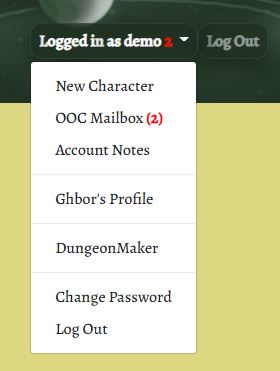
The world of Avaria is loosely modeled off the real world, and the center of the world is a city called Omrazir: a city roughly in the style of 15th-century North Africa, blending elements of Algiers and Alexandria with a dash of classic Arabian folklore. This cosmopolitan capital is home to people from all over the world, but it has its own unique cultures and struggles. I want to make a bard who travels to Omrazir from the more backwater northern continent.

Each continent is made of several geographical and political regions. In the northern continent, Ruvera, there is a Kingdom called Merouen. Emmaline is a bit of a French-sounding name, so I'll make her from Merouen. Now I'm already beginning to mentally piece together some of her backstory...
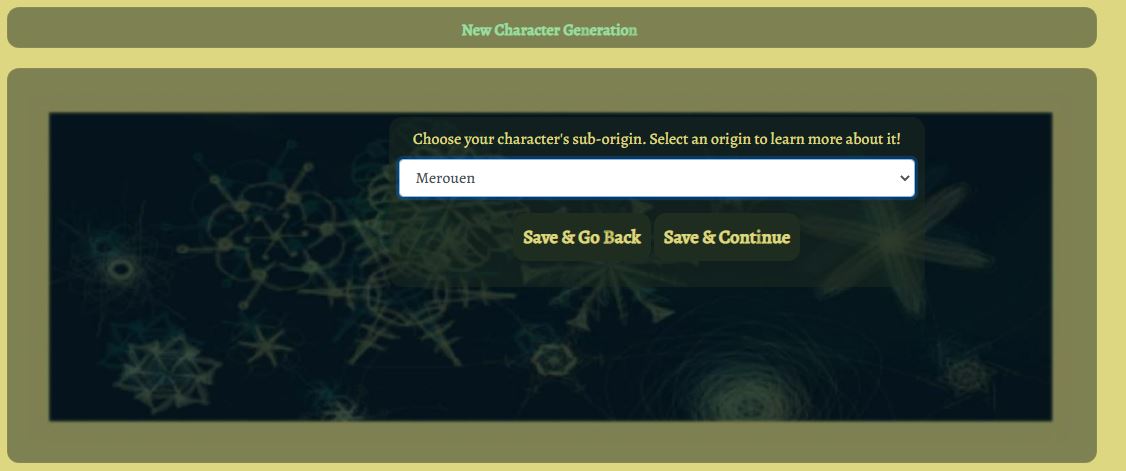
The next step: name, age, and gender. The first and last are easy to decide for this character, but what age should she be?
I want to make her an orphan, so that she'll be raised by a hedge witch who taught her how to read and write. Because she's a common woman with literacy skills, she won't necessarily feel at home in Ruvera, and that will in part guide her course to emigrate to Omrazir. From reading some lore on the wiki, I know there's a large salt marsh in Merouen called the Tidebog.
So, let's say she was the daughter of common merchants, lost in the Tidebog when her parents' caravan was overrun by bandits. If she was seven then, and she was adopted by the hedge witch and educated there, she would have likely been around sixteen to eighteen when she decided that her true passion was song and music. From there, it makes sense for her to have become an itinerant musician. How many years after that would it take for her to realize that no matter where she went in Ruvera, she'd always feel out of place? How long to hear of an exciting and glamorous hub of art and culture where she could perform her music and not worry about prejudice and persecution due to her unusual upbringing?
She will be 24 when her ship docks in Omrazir!
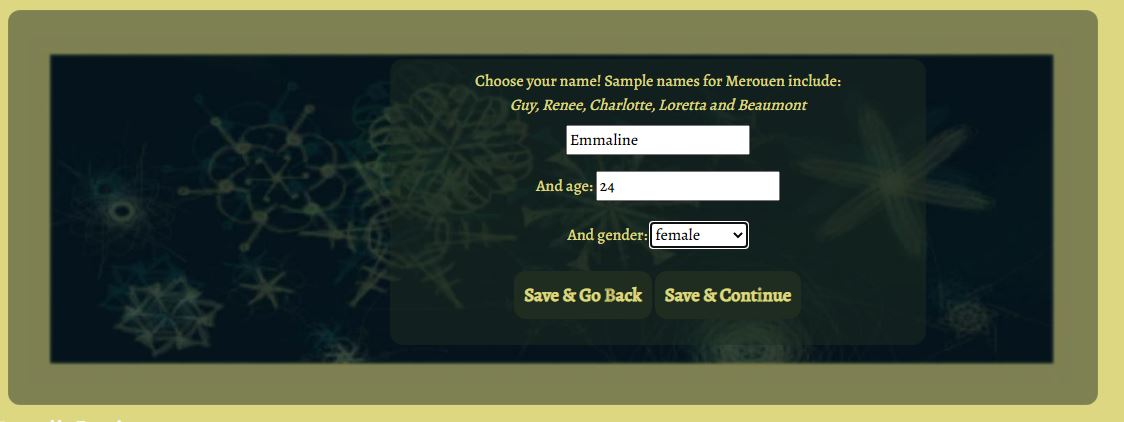
The next step is heritage. Emmaline's heritage doesn't matter in terms of her culture very much, given that she was raised in isolation from society. But heritage is genetic as well, and somewhat governs how a character should thematically appear. In the end I think it's right to make her appear as a typical Meroueni subject, so I made her Cateni: listed as one of the heritages native to Merouen.
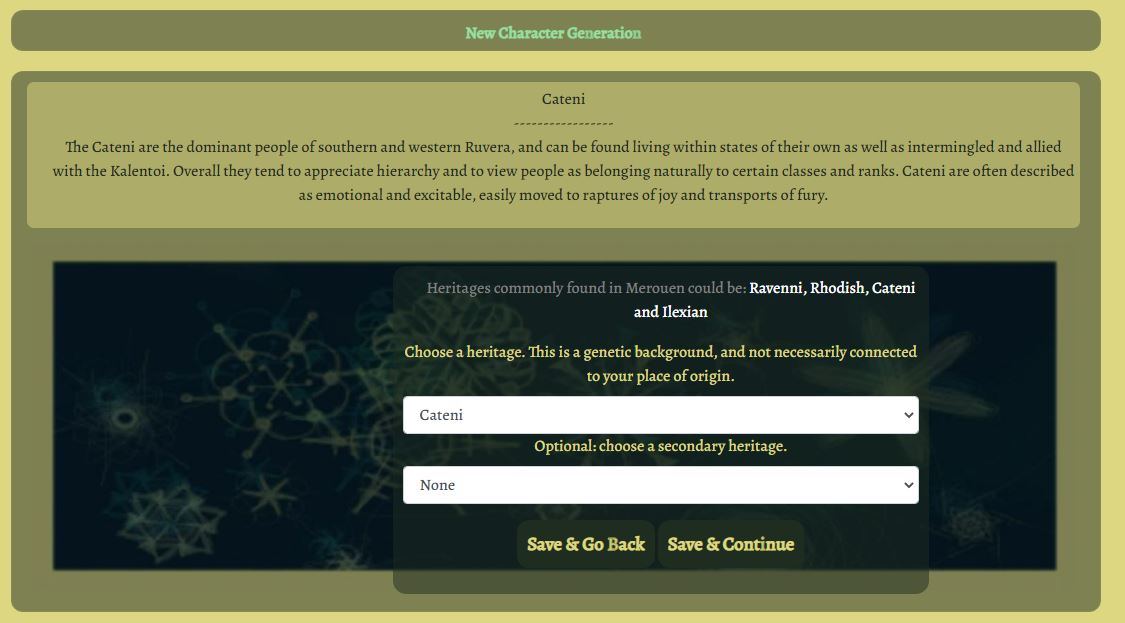
The next step is to choose an archetype. I checked through all the available archetypes and specializations, and couldn't find a bard, which is what I want to make. The closest thing I could find was "reveler" under "Socialite". However, luckily, the archetype doesn't much matter -- it only defines an initial spread of skill points and stats for convenience, which can be entirely rearranged in the next steps. So, I just picked "hedge witch", and I'll rearrange her skills to make her more of a bard when I get to that point. This game allows you to make very unique characters, so herbalist/bard is a perfectly workable combination.
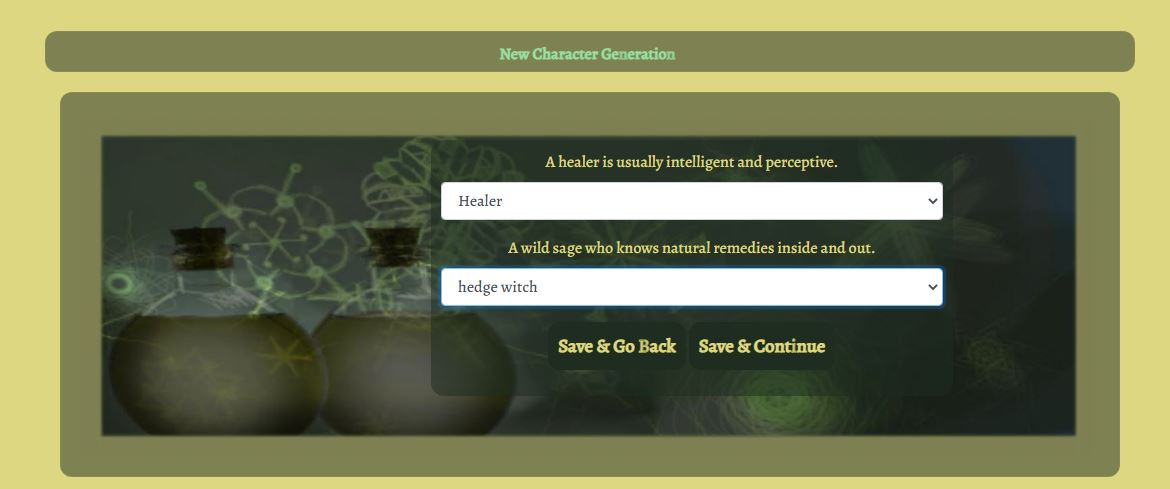
Next, I can see the initial spread of stats that my archetype selection gave me. These stats can be reallocated. Mousing over the stats reveals what aspects of gameplay they influence. Since later on in the game I'll have a chance to swap stats around a bit, I'm not too worried about changing them for now -- they're close enough to the character I have envisioned.

After that, we get to rearrange skills. While the skill system in Song of Avaria is entirely classless and allows you to learn whatever you'd like, there are skill caps that apply for every skill except those you choose to be innate. Choosing these three innate skills defines your character's personality further, and it also provides each character a unique niche. So the skills that showed up initially for Emmaline were defined by my selection of the hedge witch archetype, but I changed them all.
The first two choices were simple: I picked string instruments and vocals, for bardic performances. The last was a bit trickier. I wondered if I should make her an acrobat to further her performing skills, or dissembling to help her act in plays. But in the end I chose street smarts, because I think she should be good at navigating cities, and feel a subconscious pull towards them. It could be another reason that she left her adoptive mother in the Tidebog to become an itinerant bard, traveling the Ruveran continent to perform in various cities for various unappreciative audiences.
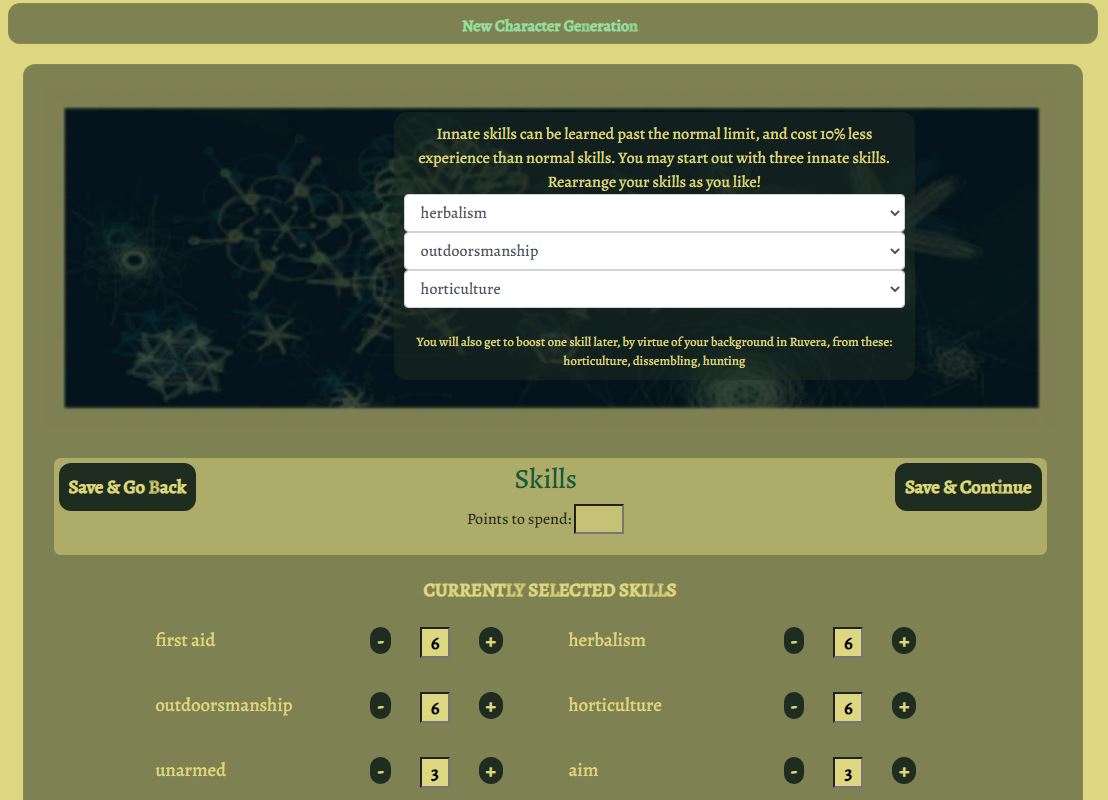
The following step defines Emmaline's background, starting off with a skill boost you can pick due to your origin choice. The answers are currently filled in with auto-generated character details, but they can all be custom-written...
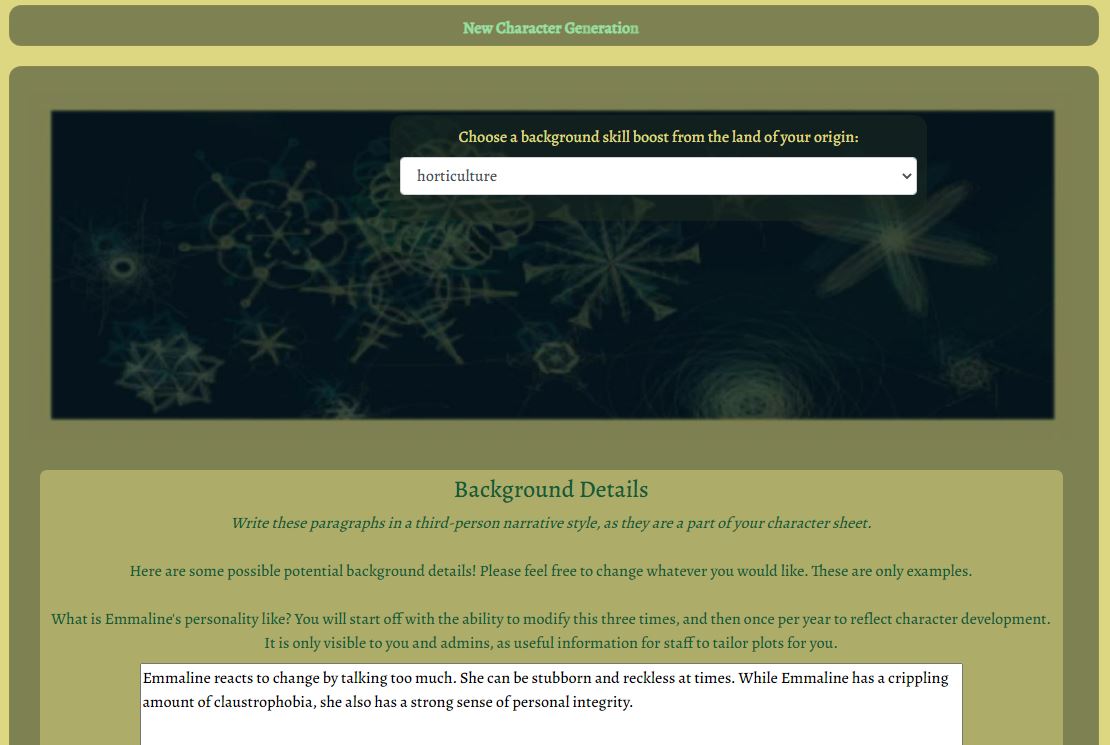
Later on in the game, you can also submit some time-limited edits to personality and backgrounds. As time passes and Emmaline's story develops, I can change these aspects of her in small yet significant ways.
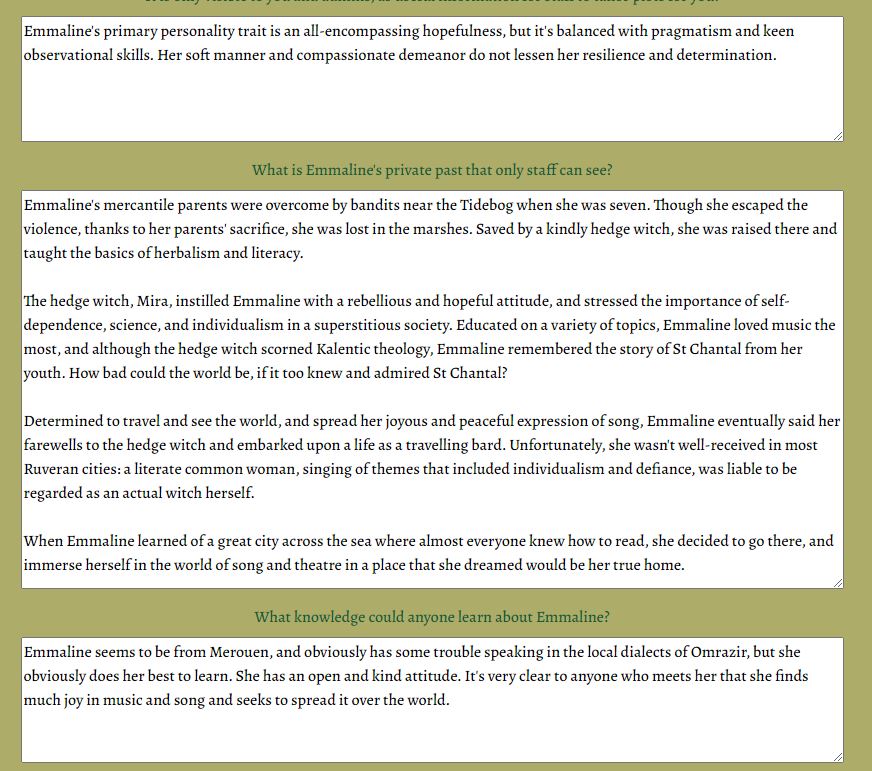
Now the next step is to define the character's appearance. It comes set up with a quick auto-generation feature, and I'm fine with using the generated description -- I selected possible choices from the drop-down menus based on Emmaline's heritage, and then pushed the Generate Descriptions button. She has big ears to hear better! And she's weathered from all her travels. She might like to wear elaborate and eccentric fashions someday, but today she's a poor itinerant bard, so her initial clothing is probably pretty shabby. I did rewrite the short description, because I like to define those myself.
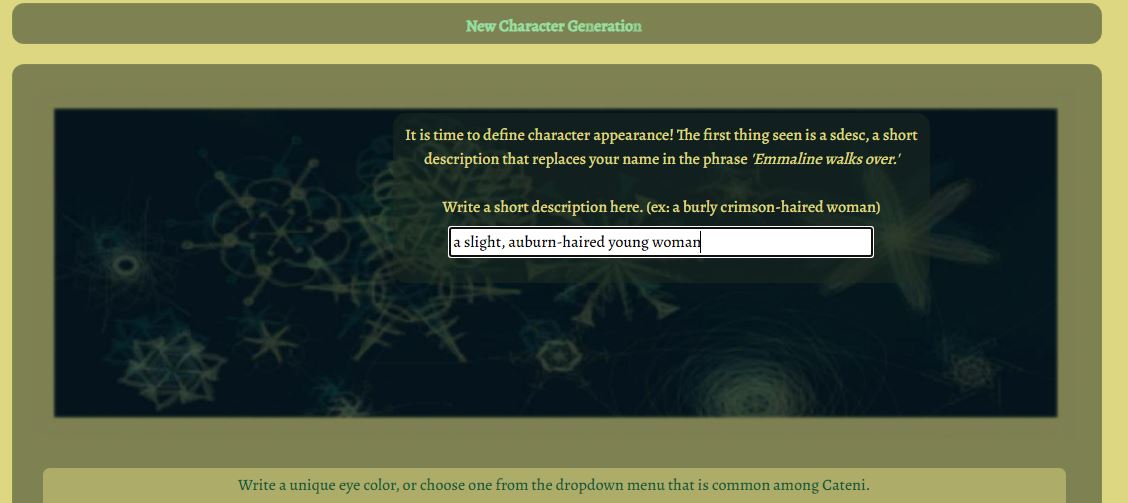
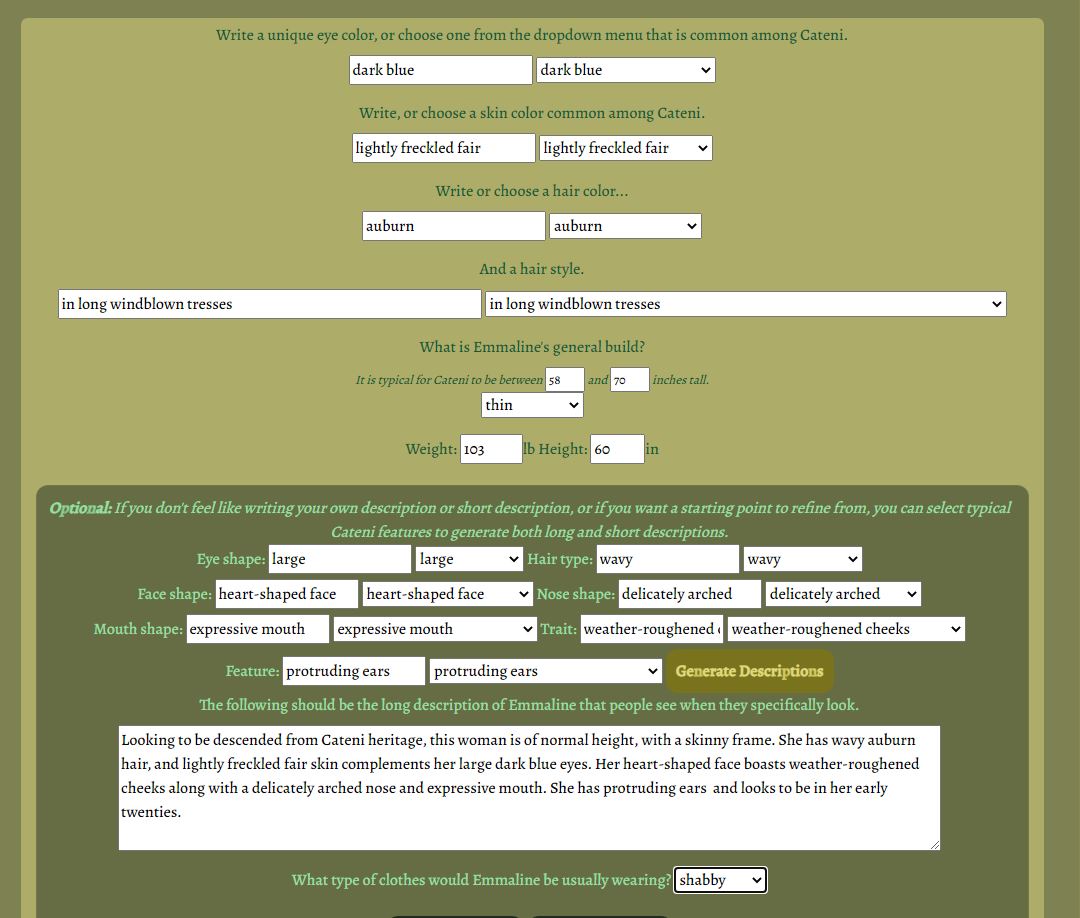
Now we come to the final stage of character generation: optional customizations! These can be automatically generated too, but I want to define them myself. Emmaline's voice is important, after all, and literacy is important to her character.

I skipped over the portion for markings, because I don't have any notable scars or tattoos for Emmaline in my mind. But I added a memento to remind her of the hedge witch who raised her, and bolster her will during tough times.
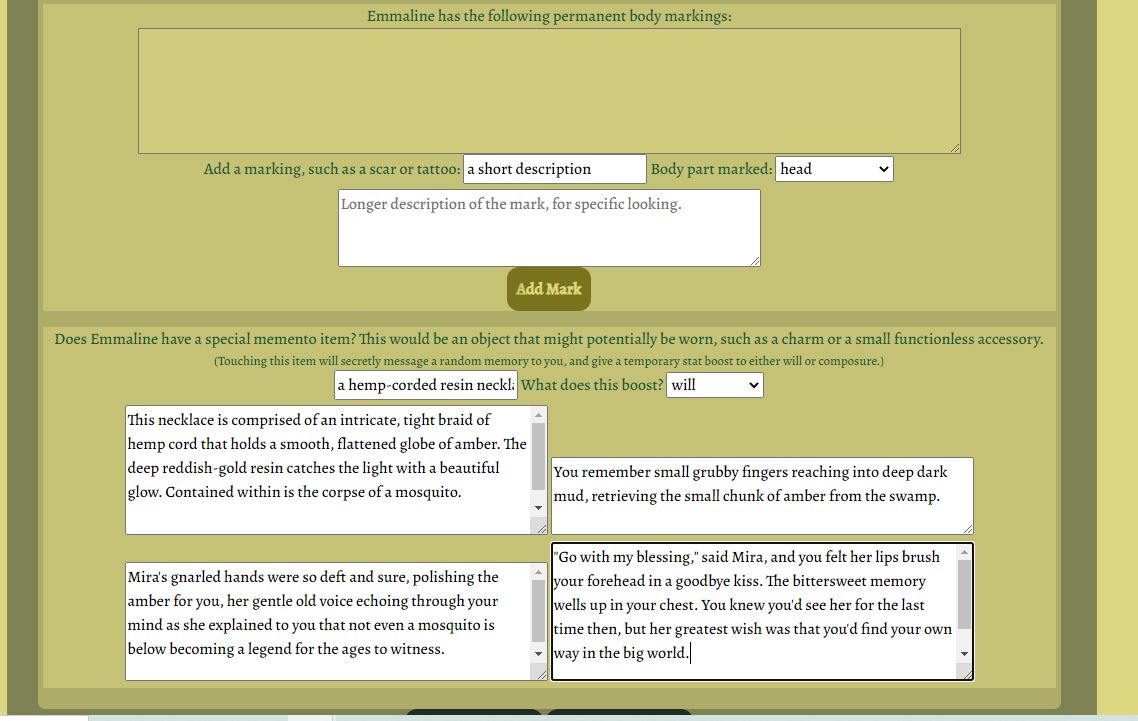
The last step of character generation is a review over the completed sheet, and an optional comment before submitting the application. I put in the comment...
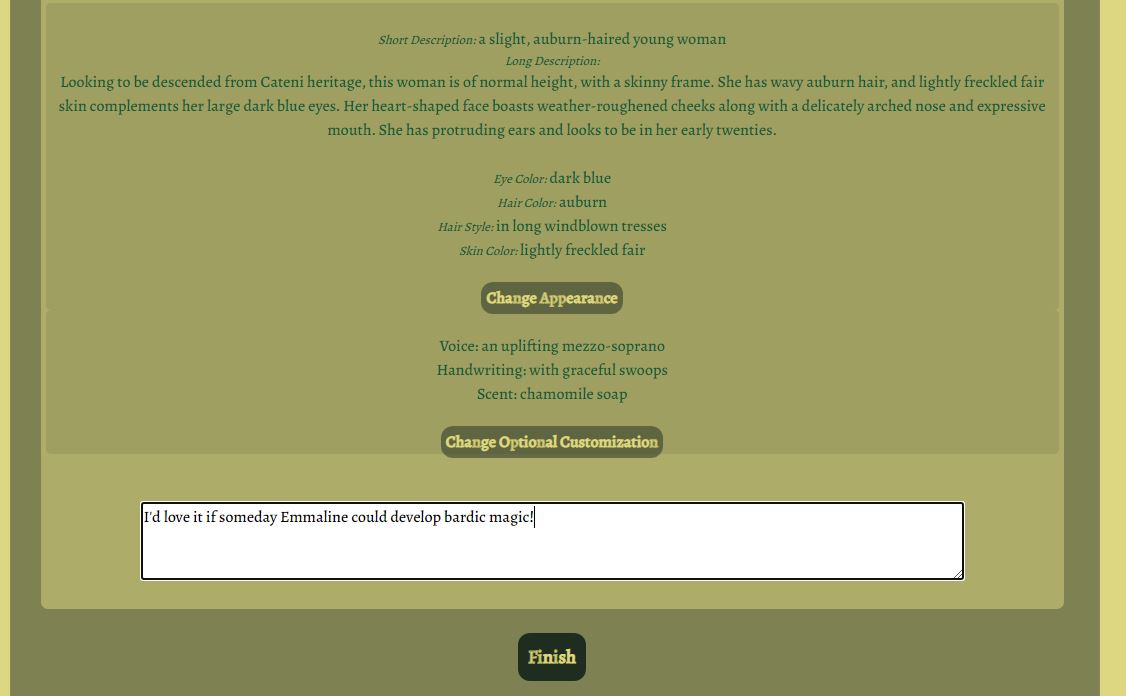
That brings us to the end of Chapter 1, featuring character generation. Here's a look at Emmaline's profile page, with a quick character portrait made on artflow.ai.
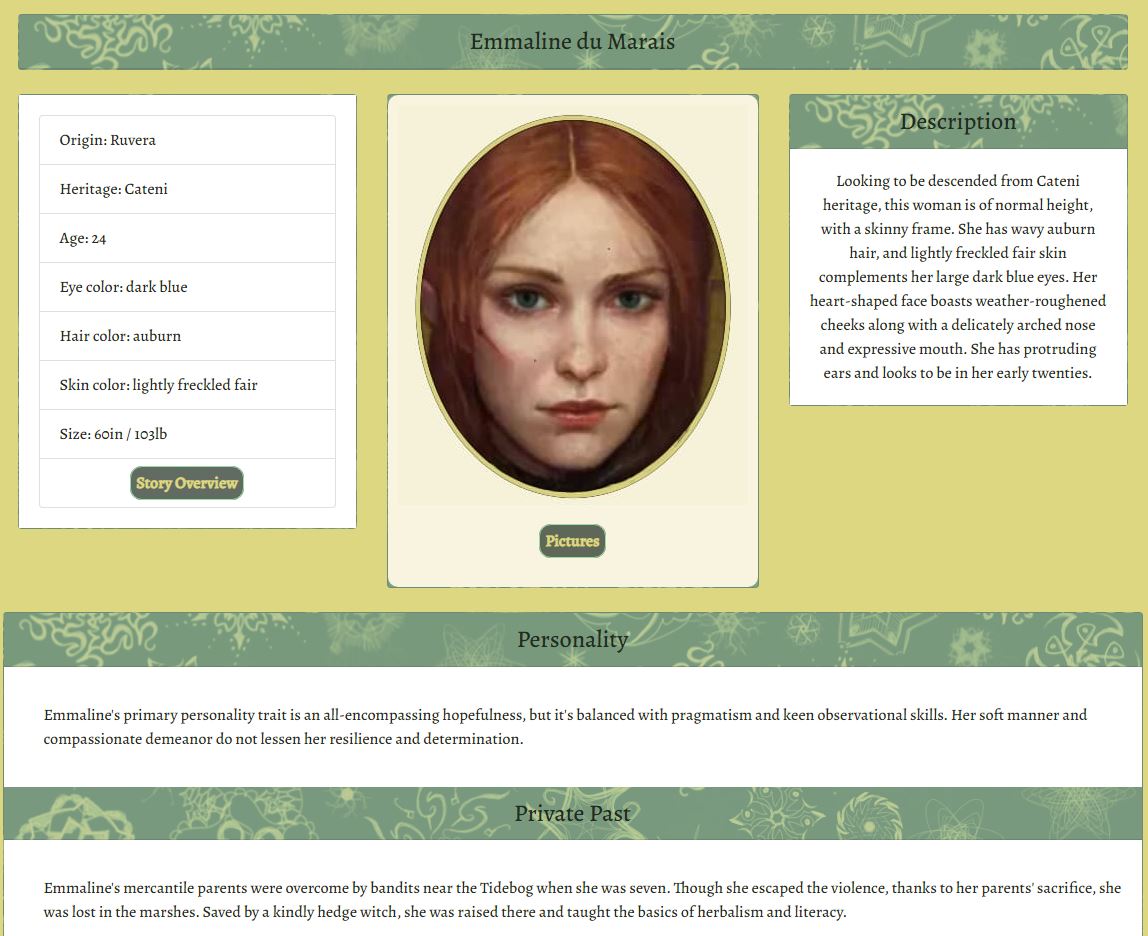
Stay tuned for Chapter 2! Until next time.
Chapter 2: ARRIVAL
-- Intro
We're working on a new MUD called Song of Avaria, using Evennia as a base code. Hopefully, the game will be opening for a public alpha come January 2024. This is the second in a series of showcases to display the features of our game. In order to properly exhibit the purpose of Song of Avaria, which doesn't quite fit into the existing molds, we're going to demonstrate gameplay by focusing on the story of a character: Emmaline.
-- Chapter 2: ARRIVAL
In the last chapter, we went through character generation on the website. Now we're going to log into the game, set up the character how we like, and begin Emmaline's story. We'll start by logging in from the webclient, which can be accessed by clicking 'Play Online' on the website. I enter 'play Emmaline' to connect to Emmaline, and now she is in-game.

The view of a room is organized with the name at the top, often showing an address of sorts with the larger area first, and the local names following after commas. Player-set temporary room arrangements show up after the room description. Outdoor rooms show the weather next. Certain objects and NPCs present are listed after that, and some rooms will then show special sensory lines that can change with the seasons or time of day. Player-characters are displayed after all this, on a distinct row of text. The room descriptions themselves can contain a lot of interesting information that otherwise may not be obvious, such as extra room objects, hidden exits, and more.
You can change some things about how the game world appears in the configuration settings. This includes the colors of important types of objects and different communications, as well as things like whether the game map will show up every time you move between rooms, whether you'll see the next room every time you look at an exit, whether the room description text will show in different gradations of grayscale depending on the amount of light in the area, and so on.
Using the CONFIG command, I'll change the interface to fit what I want -- I'll turn on the UI map, change the colors, and so on.

I haven't bothered with configuring the prompt for now, because I don't mind how it is, but that's configurable as well. There are different prompts for combat and for peacetime, both of which can both be customized, but you can also make both your prompts identical or just remove them entirely.
Now, I'm switching over to Mudlet, because it shows my command inputs and that's helpful for tutorial-style screenshots.
I've finished configuring, but what if my character hasn't been approved yet? There are still a number of ways in which I can occupy myself while I'm waiting. I can wander around in this starting area (called the Faded Zone), and try to get a feel for how the game works. The newbie area has a few quests that teach some of the features of the game, roaming healer NPCs that will fix you if you get injured, a special library of lore, an arena with a gladiator where you can try out combat, a couple zones with different environments to hunt for animals, a little brook to catch fish, a caravanserai where you can rent a room, an opium and gaming den, and a cottage full of crafting supplies to experiment with. Regardless of how you choose to spend your time, nothing that a character does here will transfer to the "real world" of Avaria -- the Faded Zone is part of the realm of dreaming and death, and anything that happenes here is considered to be just a dream.
While I'm hanging out here, let's take a look first at my SCORE (or SHEET). This shows all the base values of my stats and their modifiers and current values, as well as various other details about my character. All of this should look familiar -- it's what I set in character generation before! As staff reviews a new character's sheet they may have some suggestions for changes to make, but there's no need to worry: any such changes to your sheet are part of a process that involves submitting edits to you for approval, and they only go through once approved.
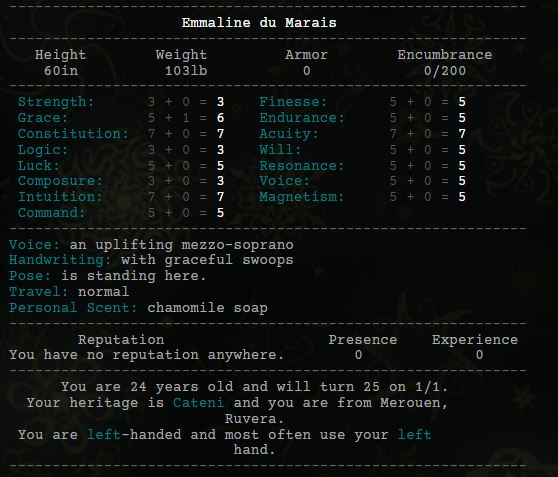
There are other metrics not shown in SCORE, most notably those pertaining to your character's state of health. These metrics will be particularly important to you if you happen to be in combat, but whether you're presently in a fight or not, you can view them by checking HEALTH. Most of these measures can also be configured to show up in your prompt. You'll definitely want to keep an eye on them in combat, because any one of them could factor into whether you end up winning or losing a fight. Although you'll check these metrics most often in battle, some of them are also important outside of a skirmish: for example, fatigue might become a problem if you're running everywhere, and breath is vital while diving.
There is also the SKILLS command to check, which we'll explore further in the next chapter. Song of Avaria's classless learning system preserves a character's capacity to learn anything in accordance with their own story, while also maintaining the idea that each character has their own unique niche and specializations.
Another day we'll learn more about skills. But for now, let's practice moving around! We're in the Faded Zone, a place for not-yet-approved characters to wander and explore without any story consequences. As mentioned above, this strange realm is a genuine part of the game lore, but as the tutorial zone that means anything done here is considered to be just a dream, which you may never remember upon waking into the ordinary world.
Movement in the game usually takes the form of cardinal directions, and for non-cardinal directions, you input GO DIRECTION or ENTER DIRECTION. Let's go through the mist like so.

Now there's a cardinal direction in the next room, and we can use typical cardinal direction aliases to move around if we like.
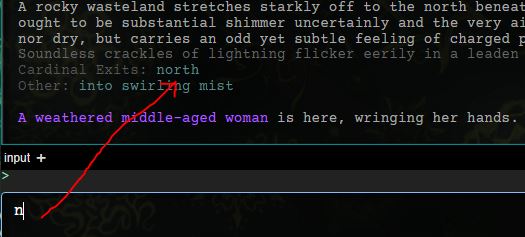
There are a variety of ways to customize the expression of your character's movement between rooms. You can append a one-time emote in parentheses to your movement command, like this:

...or you can set a travel string, which will remain until you set it back to "normal". Both these customization styles can be useful for various situations.

And look -- I received an OOCmail! It says Emmaline is approved as a character. Hooray! I can access the OOCmail either while connected to the game or while logged out. If I'm logged out, I can find it on the SoA website under my account dropdown menu. But for now, we're in-game so I'll take a look at it there.

If staff has made a comment in your approved application, it's usually in response any that you made yourself at the end of the character generation process. My comment in Emmaline's application was that I'd like her to develop bardic magic someday... and the message from the staff is to go ahead and pursue bardic magic whenever Emmaline is ready!
Now, let's wake up from the dream! Entry into the game world happens by leaving the Faded Zone through the vortex at the end of the street. Here is the place in Omrazir where newbies enter the world: a shaded courtyard just off the main throughfare of the city.
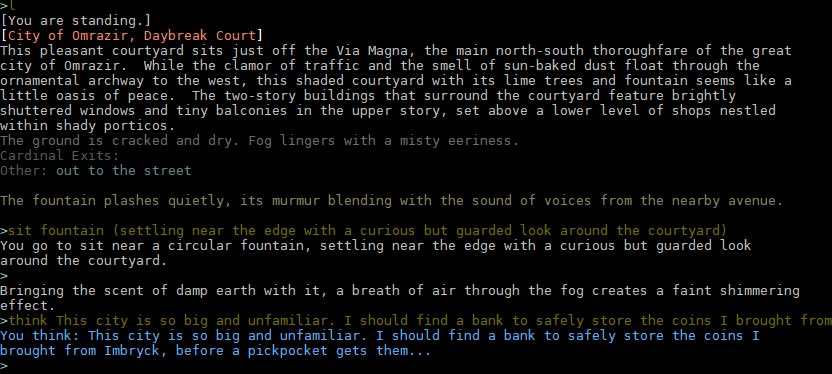
I'm going to imagine that Emmaline is taking a break here, soon after getting off her ship. I've looked at the map of the city that is available on the website, and I know this location is just south of the wharfside area, and would be on Emmaline's way as she walked further into the city. Now she wants to find a local bank to deposit her extra traveling money.
We've decided not to have a speedwalking feature for PCs (player characters), because we prefer that players immerse themselves in the world and see things on their way that their characters would tend to see (including each other!). But what we do have is a quick and handy way to ask directions from VNPCs! (Unlike NPCS, virtual non-player-characters are not actual "objects" in the game world; they're just part of the background bustle of people you'd find in any populated area. But that doesn't make them any less real in terms of the world and its imagined stories.)

You are encouraged to roleplay when you pass another PC in the street -- even if it's just a passing glance, these encounters can be an interesting and immersive vignette that truly situates your character in the setting. And while following the directions, now we've encountered another PC.

Emmaline has run into a customs inspector outside that imposing umberstone structure! The inspector didn't seem to like Emmaline at all, but that's all right. The inspector and Emmaline recorded impressions of one another to start documenting their character relationship. Relationships and their associated impressions are one of the story-focused features of the game that govern earning experience for the sake of character progression. The impression is considered to be out-of-character knowledge, so even though the inspector designated Emmaline a "tourist," we definitely should not take it in-character and loudly proclaim, "I'm not a tourist, I'm here to stay!"
The relationship documentation is made up of two things: the written impression we just saw, and a categorization of type. First, I thought I'd make this inspector an "acquaintance"... but then I figured even that was too close for someone so rude, especially considering that the designated type of a relationship is tied into automatic trust levels. These trust levels are IC but have certain mechanical functions regarding how other characters are allowed to interact with you, such as creating a roundtime delay when another character tries to closely approach yours, or allowing or denying automatic consent for things like whether or not you'd accept a hug. Maybe someday Emmaline will get to know this inspector better.
For now we'll continue to the bank. While playing with other PCs is great, developing your character when you're on your own is an equally valid story experience. And getting a bank account set up is surely some sort of development! A bank account is helpful because money in the bank cannot be stolen by pickpockets (either PCs or NPCs) and you can use banknotes to transfer funds to other PCs if you need to. Once your character has a job, they will receive money regularly deposited to their local bank account.
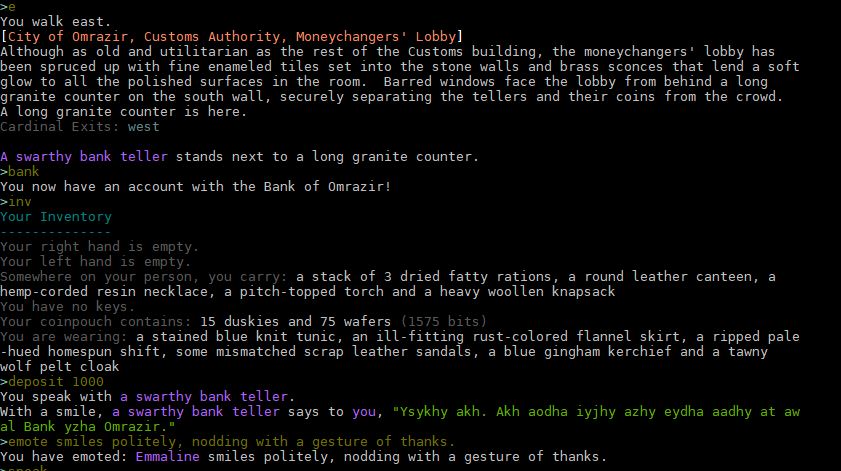
I've decided to keep some money on me, but deposit most of it. Here we also observe the trouble Emmaline is having while trying to communicate with the locals in Omrazir, who mostly speak Sirdabi. She can't even understand the bank teller who takes her deposit!
Clearly, Emmaline doesn't know much Sirdabi at all! However, we can still practice. Languages are learned by hearing and practicing them, which is a process speeded by skill in Linguistics, but anyone can learn a language. It'll just take exposure and use. Luckily, Emmaline will be completely immersed in her new culture here. And if I do want to have a serious conversation with another character, most people speak at least some Ruvic, so that will be a good starting point to try to communicate more complex things.

While depositing coins at the bank, we also noticed some floating objects in our inventory. Usually you can only carry items in one hand or the other, or hold small items in your teeth. But newbie supplies get deposited freely into a 'somewhere on your person' location in a character's inventory, a slot that is not normally usable.
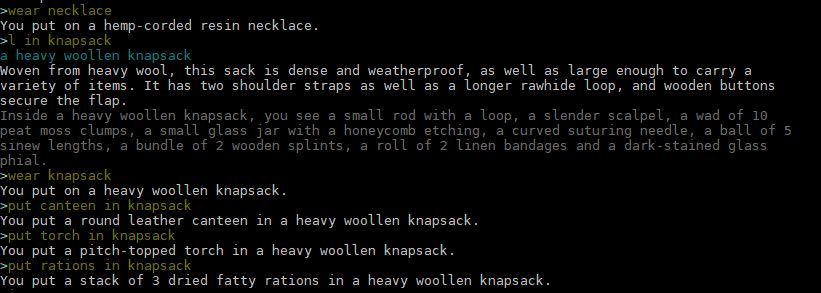
One of those is the memento I wrote for Emmaline in character generation. Another is a mysterious knapsack! When we look inside, we see that it's a sack full of first aid supplies. These were automatically generated for Emmaline because of her skill in First Aid, taught by the hedge witch in her background. Some professional sorts of skills come with supplies in character generation.
When you're placing objects, you don't need to use prepositions in the command, and there are many shortcuts you can use. It will work either way, so you can use whatever syntax makes you most comfortable. You can GET SCALPEL KNAPSACK, PUT SCALPEL KNAPSACK, and also DRAW SCALPEL to wield it and then PUT AWAY SCALPEL to put it back away in the knapsack.
There are two main functional ways of carrying objects -- "holding" and "wielding" (there's also "dragging", but that's more for objects too heavy to actually carry). Emmaline would automatically wield objects in her left hand. That is because I set her handedness as left in character generation, and attacks tend to be more effective from one's dominant hand. If a character is the deceptive type they can even choose to pretend that their offhand is dominant. Emmaline doesn't bother with that, though.
Anyway, what's the next thing to do in a new, unfamiliar city? Emmaline is exhilarated but tired as she leaves the umberstone structure. She looks at the sky. The sun has already set... Omrazir can get a bit chilly at night in the wintertime.
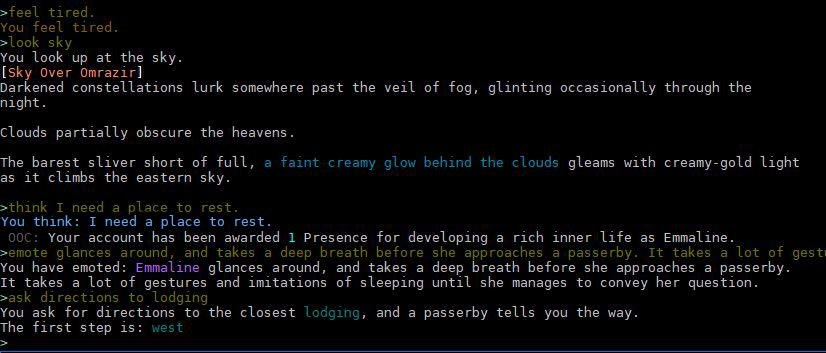
That's the second time in this session that I've been awarded Presence for roleplaying as Emmaline. Presence is a metric that rewards engagement with the world, and those points can be invested in different things. We'll get into it more later, but you can earn Presence just by playing the game in an immersive way, even if you're all by yourself.
For now, we'll ask directions to "lodging," and follow the path until we get to the Night Winds Caravanserai, the premiere lodging solution for all travelers to Omrazir! (Or maybe that's just an advertisement.)
As a side note, renting a room establishes that room as yours until you check out. If you're lax in paying rent, you will not lose the room, you will simply not be able to access it until you pay rent again. This is to make sure players do not feel stressed about logging in just to pay rent. We want to respect the time of our players and be understanding about the necessary prioritization of real life.
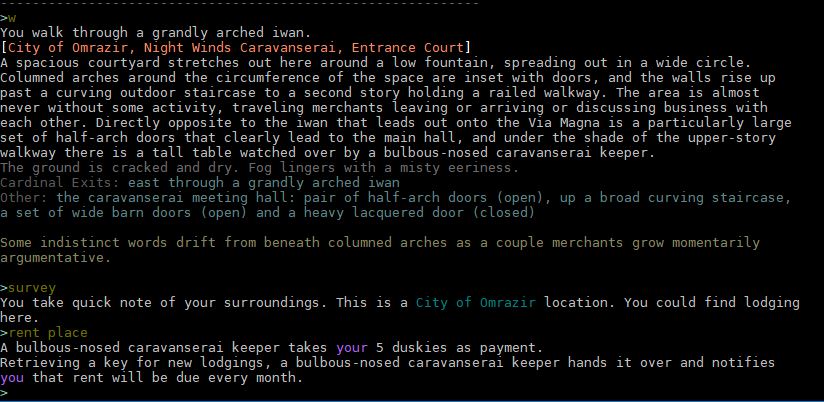
You can use the SURVEY command, in addition to reading room descriptions, to find out if your current location is one in which you can rent a room. Once you know that, it's as simple as inputting RENT ROOM/PLACE/LODGING or whatever, and you'll be given the key to a room. That room is not always immediately adjacent -- you'll need to read and look around to find out which way to go to get to your room.
In this case (and most cases), the caravanserai has private rooms on the upper story. We'll go up there and just put in GO TO MY ROOM in order to be linked to Emmaline's room. If someone else wanted to visit Emmaline, they'd come up to the same place and put in GO TO EMMALINE'S ROOM. (The command also works without the 'to' part.)

There's furniture mentioned in the room description, but how much of it is really there as a room object, for us to interact with? Many objects that you see in room descriptions can be interacted with, and a number of different interactions are possible, such as sit, crouch, lean, stand, and so on. Further, some objects can be manipulated by trying to push or pull or turn them, and the spatial relationship of objects can become important during a fight.
We can check VICINITY ROOM or PLACES to get an overview of all the obvious objects in the space.
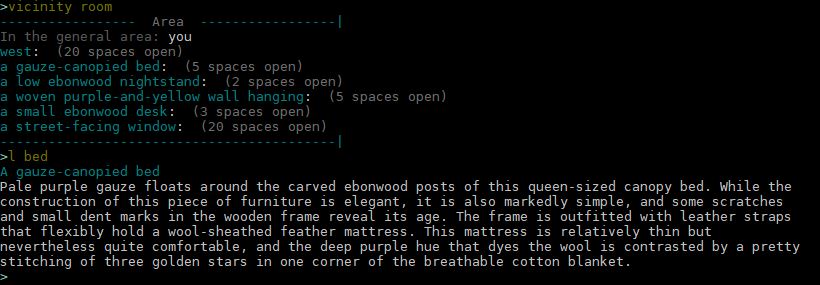
It's nice; the room comes with some furniture. Emmaline can put things on her desk and look out her window. This window appears to face the street out front, while other rooms in the caravanserai have views that face the interior courtyard. That's lucky for Emmaline! She could watch the street outside the caravanserai, and observe people passing by in the morning. Windows can be closed or open, you can shout through them, throw things and shoot through them, and even jump out of them (if they're big enough, and you're willing to risk yourself that harm).

For now, Emmaline doesn't want to jump through any windows. She's exhausted! All she wants to do is sleep on that nice bed she looked at earlier. Here are some examples of interacting with a room object. We can do it without any extra emote at all, or we can do it with a clause written in parentheses, or we can replace the emote entirely.

Good night, Emmaline. Until next time! We'll be showcasing the story system next, which will cover more ways to earn experience and learn new skills.
Chapter 3: STORY
-- Intro:
We're working on a new MUD called Song of Avaria, using Evennia as a base code. Hopefully, the game will be opening for a public alpha one year from now: January 2024. This is the third in a series of showcases to display the features of our game. In order to properly exhibit the purpose of Song of Avaria, which doesn't quite fit into the existing molds, we're going to demonstrate gameplay by focusing on the story of a character: Emmaline.
-- Chapter 3: STORY
In the last chapter, we went through a few basic commands, and Emmaline established a bank account in Omrazir before checking into a room at the Night Winds Caravanserai. Now we're going to log back in and attempt some character progression in terms of gaining experience and learning more skills.

The time ratio in Song of Avaria is 1:1 with real life, so Emmaline has been in Omrazir for a month now. Though we haven't logged in since the last time, we can say that she's spent some time acclimating herself to the city, but hasn't been able to find her place here yet. Every day she visits the common hall in the caravanserai, a built-in restaurant and gathering place, and tries to find people she can speak with in order to learn how she can advance her talents in the area. She also sings for copper follies (the smallest local coin) every day to pay for her supper.
This is an example of an offscreen habit, a convention we've established to help deal with the inescapable fact that while a MUD is a persistent world, the player-characters within it are not always online. What they're doing when you're not logged in is up to you, and this information can be found in-game were another character to ask around about Emmaline. Similarly, eating, drinking, and sleeping are not maintenance chores that you will typically need to do while online. However, if your character is pointedly not doing any of these things for any reason, you can specify that in your lifestyle as well. The LIFESTYLE and HABITS commands are interchangeable in order to accommodate familiar usages by players.

Our goal today is to get some experience and learn a skill. In Song of Avaria, experience is earned through roleplay -- but not just any interaction between characters. It's earned through progressing your character's personal story, which can even be done entirely alone if need be. So, before we have Emmaline wake up from what is likely just a nap, I'm going to set up a first story arc for her.
A story arc is a documented plotline that often begins with an event, a hook, or a character goal. It doesn't even need to start out as anything elaborate, just something that is meaningful to your character. Story arcs can be set up in-game through the STORY command, but they can also be accessed and edited from the website, which is what we'll do for the purposes of this demonstration. The story section of a character's profile is reached on the website by clicking the dropdown menu for your account, selecting a character sheet to look at, and then clicking on the "Story Overview" button.
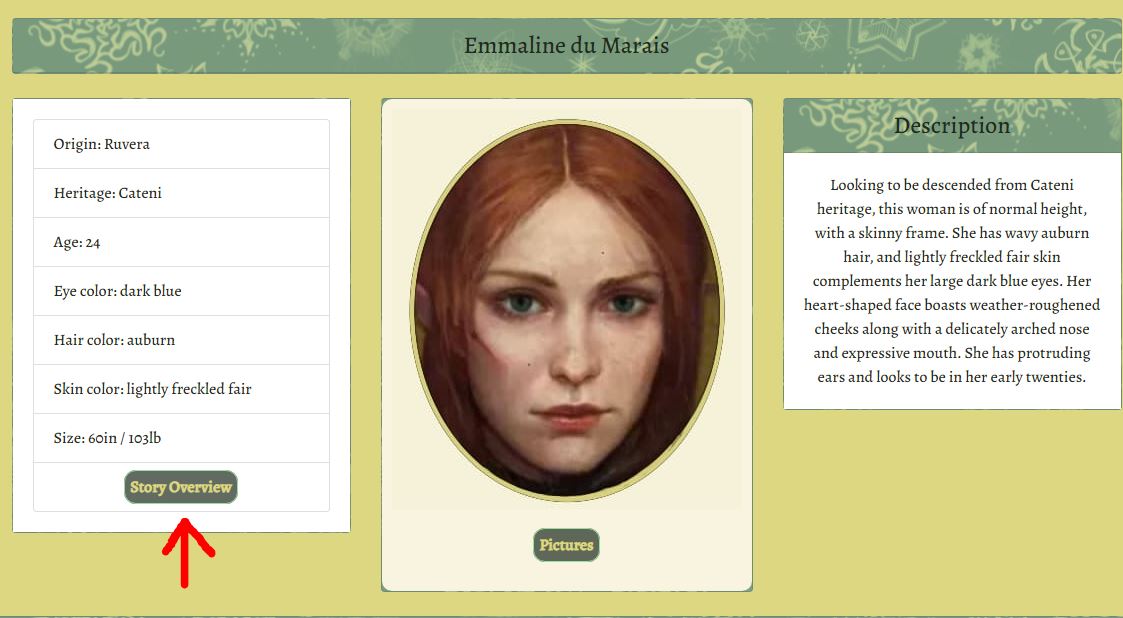
This button brings us to the story panel. Here on the right we can see a list of previous logs. The game will automatically log all roleplay for you, but if you do not save these logs they will be purged after a hundred days. In the center you'll see records of character dynamics: each relationship you have with another character is documented here, showing a list of your impressions of them and their responding impressions of you. On the left is what we're looking for: Story Arcs. Below that are recorded dreams, visions, and hallucinations, which can be sent by staff in response to your story arcs, or you can also write them yourself as part of a character's story.
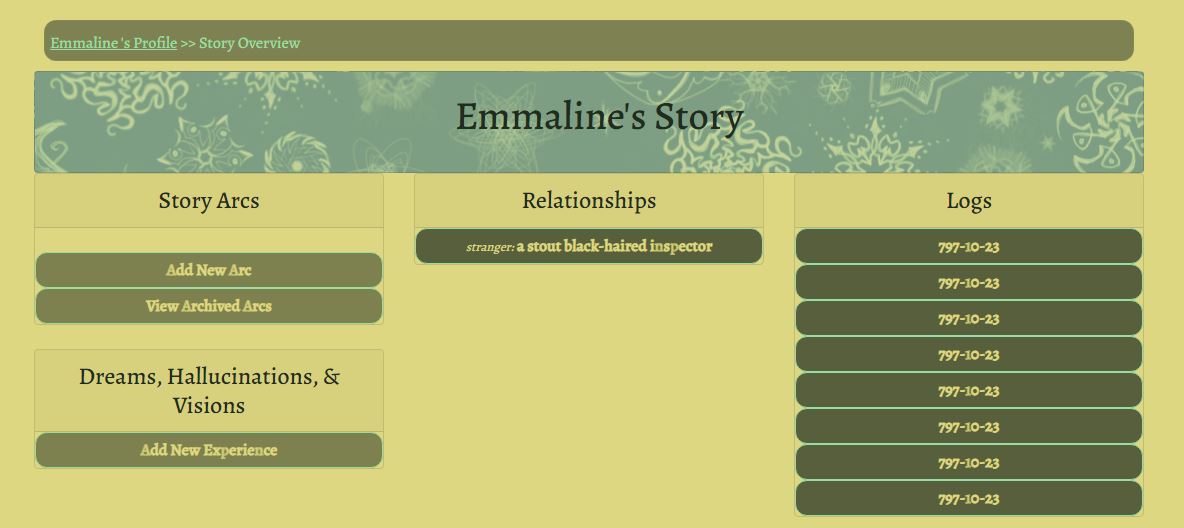
For now we'll click "Add New Arc". We're prompted for a name and description. I'm putting in "Hope for the Future" as the name, because Emmaline is a very positive and idealistic character, and despite all her struggles, her view of the world is colored by hope. Rather than being worried about finding her place in Omrazir, she's hopeful and excited about what the unknown future holds in terms of her daydreamy goals.
In the description, I'll write a brief summary of Emmaline's hopes: "Having just arrived in Omrazir, Emmaline is looking forward to an exciting future. She's managing to scrape by for now by simply singing for coppers, but that won't last forever. Emmaline hopes to find a place for herself in the city, and a fellowship of likeminded friends." Then I press Save, and return to the story panel with the new story arc neatly in place.
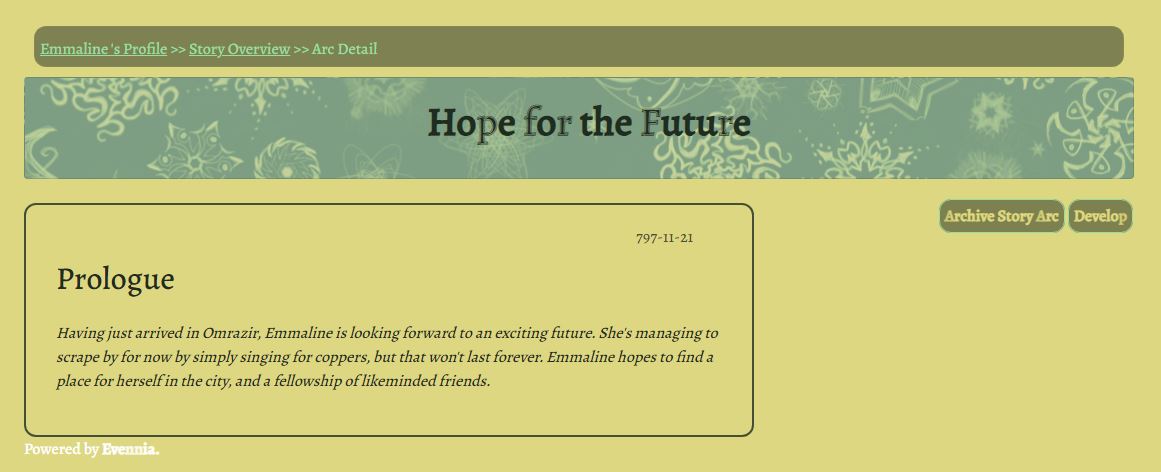
Now, we've already got a bit of story under our belts in terms of this arc, so we can develop it further. In order to do that, I'm going to take the log of Emmaline's arrival in Omrazir, and title it like so.

Now that it's titled, it is automatically saved in the system and will not be purged. We can also attach it to a development of our story arc, along with the impression from that unfriendly inspector. Do you remember the one who gave Emmaline a dirty look outside the umberstone building where she went to deposit her coins in the Bank of Omrazir? That's the one character whom we've got an impression of for our first story arc development.
Meanwhile, we're still logged in, and Emmaline is still napping in her room at the Night Winds Caravanserai. If we glance over at that window, we'll see that for the two things we've done so far -- starting a new story arc, and retitling a log -- we've earned some experience already. Take note that these gains are capped: you can earn them only so many times per day or week. This helps to prevent the most active players from swiftly overtaking more casual ones in terms of experience gain, and also helps protect against potential abuse of the system.

Now I will click on "Develop" in order to add a chapter to our story arc. We have the following form to fill out: a name, a summary, and a number of possible attachments including relationships, logs of events, or dreams. Because we haven't played much yet, we don't have a lot of options to choose from, but there's still plenty here to set up an initial chapter in Emmaline's story.
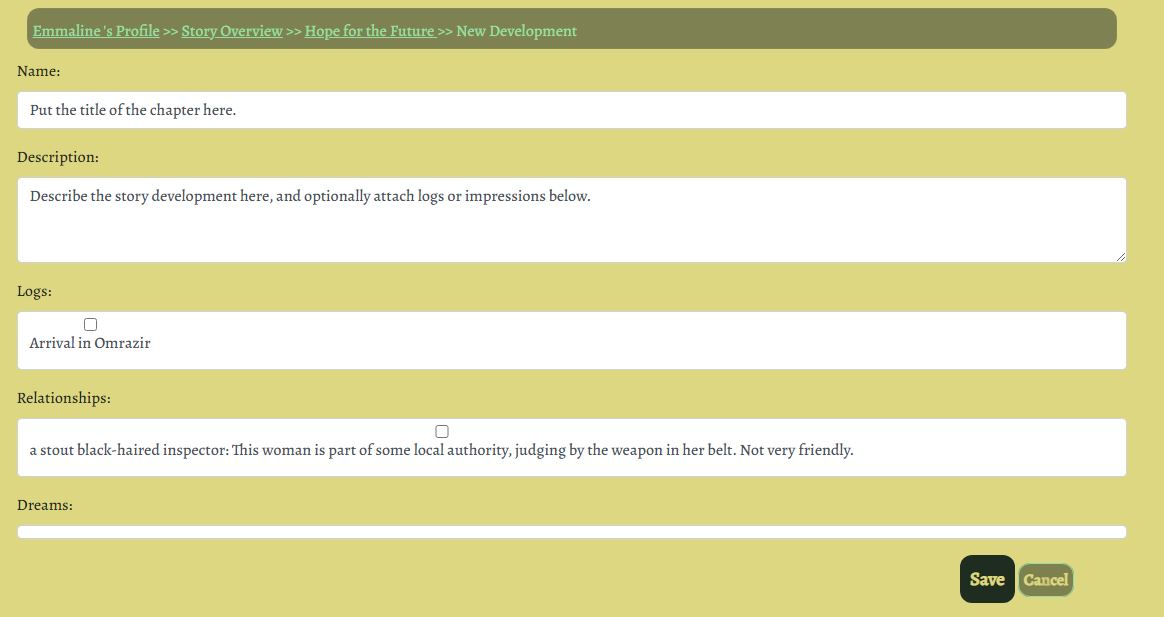
After saving this chapter, we've earned some more experience! Looking at our story arc now shows us the new development we just made. If we need to edit it, we can do that, but if something new happens later we can make a new chapter.
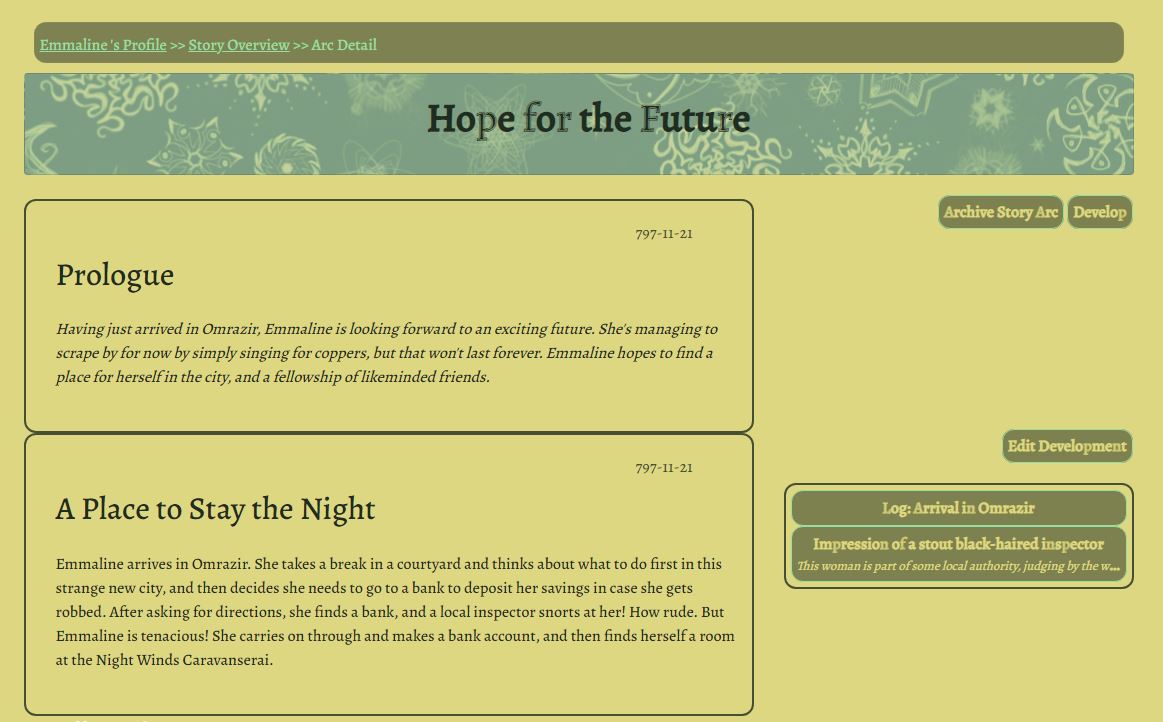
So let's go make something new happen! Emmaline wakes up, yawns and stretches, straightens her clothing, and heads out of her room to go downstairs to the caravanserai's common hall. This is a public area with many VNPCs, or virtual non-player characters -- people considered to be going about their ordinary business in the background. There's also a menu with food items on it that patrons can order. We'll say that Emmaline has already sung for a crowd earlier in the day, and now she just wants to have some supper.
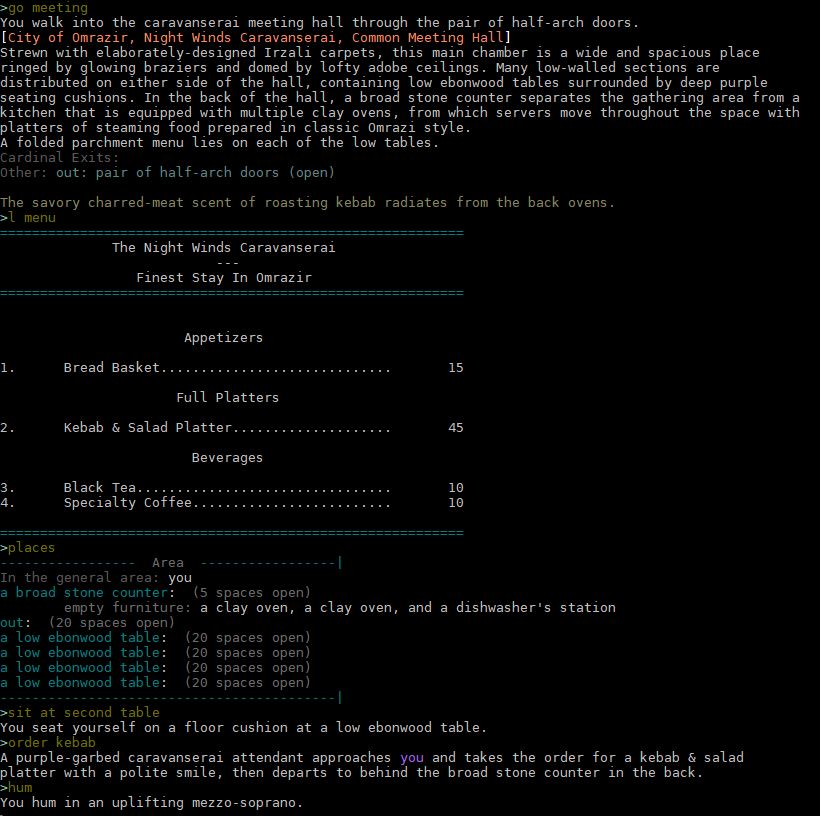
When you order from a menu, it takes a little time for your food to be prepared. This time varies depending on the sort of establishment -- as you might imagine, street food often tends to be quicker to prepare. This short delay gives you some time to roleplay if you already are, or just some time to wait and possibly encounter another person.

This time, while Emmaline is waiting for her food, she sees a poet come into the Common Hall! Brazenly, this fellow immediately launches into a performance. Of course, Emmaline is very happy and excited to see this. She wants to strike up a friendship, or at the very least, an acquaintanceship. Meanwhile, Emmaline's food is delivered in the middle of the poet's lengthy performance, but she's too distracted to pay attention to it just yet.
(Here is a text version of the roleplay log for anyone who finds the images difficult to read.)
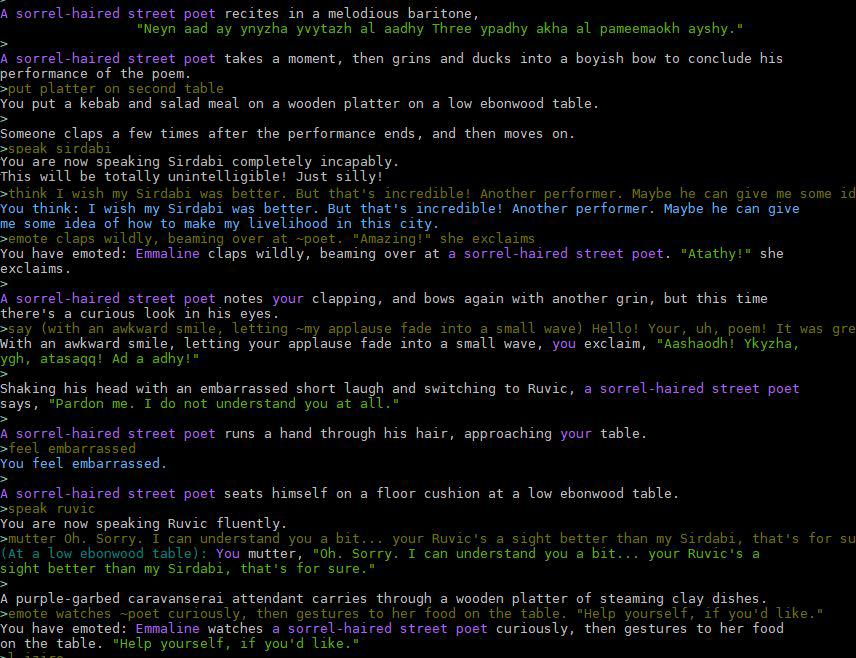
We have a number of socials like NOD, FROWN, LAUGH, and many others, because even though free-form writing is what's preferred for roleplay, we want to emphasize that it's also fine to have short emotes and be concise in your writing. This way, people can interact and communicate in an immersive, real-time fashion, and are able to respond to one another in a way that's spontaneous and feels natural. But there are no character limits to emotes either, which can allow you to release your creativity to its fully verbose extent when in small and thoughtful scenes, if that's what you and your RP companions feel like.
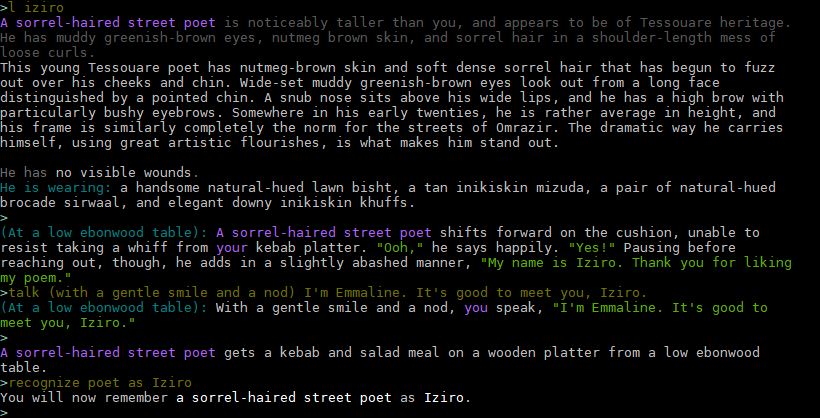
While usually what you'll see of another person is their short description (sdesc), you can use the RECOGNIZE command to see them by another name or phrase. It may or may not be their true name, and it could just be something like "That Annoying Street Poet Guy", but it's a tool you can use to better organize who you know and what you know them by.
Also note that Emmaline and Iziro are now sitting at the same table. The table is a vicinity or place, and occupying the same one together allows people to speak in more quiet conversation to each other, which is less likely to be overheard by others around them. It's not necessary to speak quietly like this, but it can be helpful, especially if an area is crowded. People occupying different vicinities will still be able to see the actions of your character, so you don't need to double-emote to display to the rest of the room whatever should be visible there. However, the actions performed at a vicinity will be shaded out and easily ignored by others elsewhere in the room, and the speech at that vicinity will appear to them as full of ellipses representing a conversation that's only imperfectly overheard.
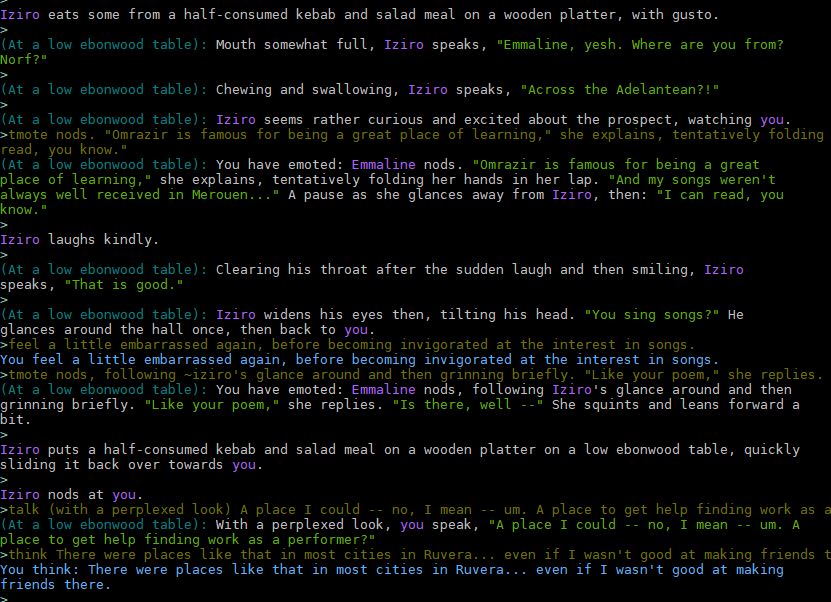
Again, we favor the concept of relatively quickly-paced roleplay writing, with gaps in between emotes to allow interruptions, replies, or misunderstandings. This makes for much more natural dialogue between characters -- in fact, it's also just fine to use the SAY command without additional embellishment. If you're pausing during typing because you're not sure exactly what to say, it's likely that your character might pause there too. Here, Iziro totally misunderstood what Emmaline was going to say, but it makes for a nice narrative moment and shows more of each of their personalities.
Note the room echoes -- this is a crowded place, and there is a lot of movement happening in the background. While not every building has special echoes coded in, we seriously strive to establish an immersive atmosphere and these sorts of environmental echoes are fairly commonplace.
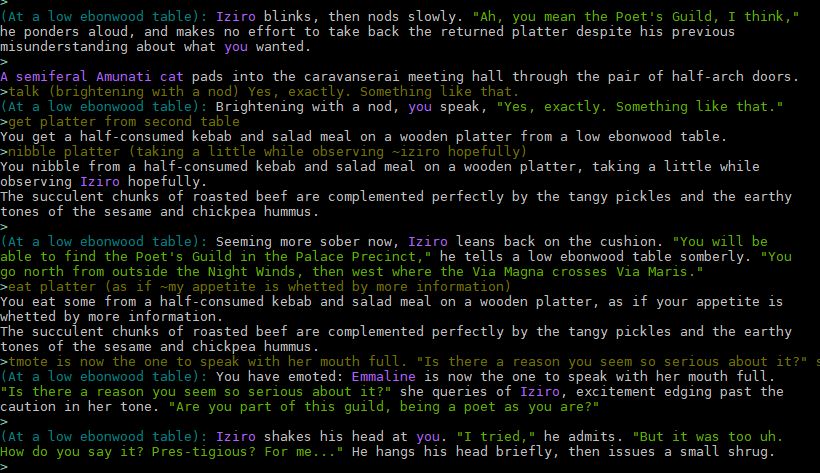
While Iziro and Emmaline talk, there's a cat wandering around in the background... this is an NPC. There are plenty of stray and feral cats in the city, and this one in particular is something of a fixture at the Night Winds Caravanserai. Animals can be befriended and tamed, but this one's pretty aloof for now.
Regarding eating, you can consume your food at various rates -- NIBBLE will just have you eat the smallest amount possible, while EAT is more of an ordinary amount, and GOBBLE would finish the whole plate. It's nice to be conscious of these things especially when sharing food. While eating is not a necessary chore, as previously explained, it can still give you the status buff of "feeling comfortably full" and is great for RP (not to mention local flavor).
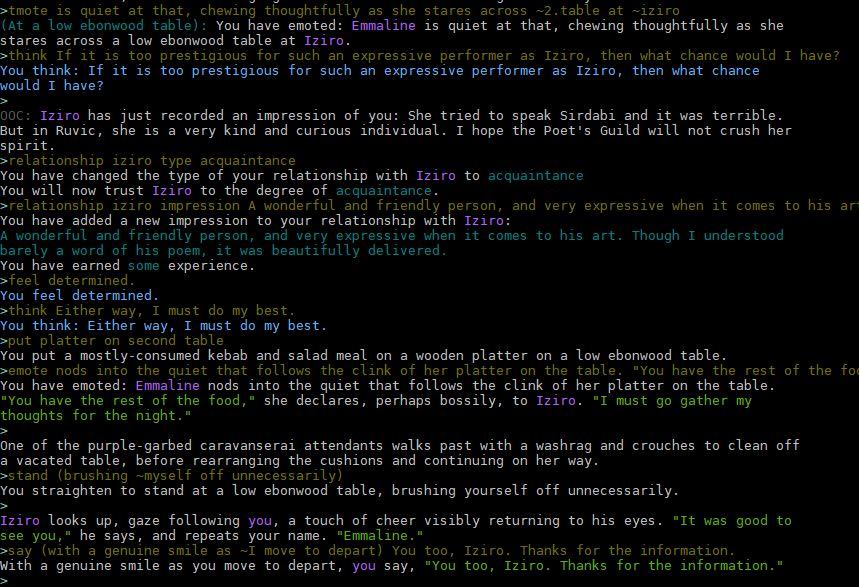
When you have to log off, you can give any manner of in-character reasons that make sense for your character. Here we're saying that Emmaline wants to go gather her thoughts. But we aren't going to quit just yet... we want to go over learning skills before logging out today.
With the experience we gained through developing our story arc, from exchanging character impressions with the street poet, and from the impressions we made with the inspector last month, our total current xp has summed up to a tidy 17 points.
Let's take a look at our skills and think about what we might want to learn. I think Emmaline is mostly disturbed by the language barrier in her new home, and would like to improve her Linguistics skill in order to absorb Sirdabi faster. How much experience will it cost to learn Linguistics? We can check...
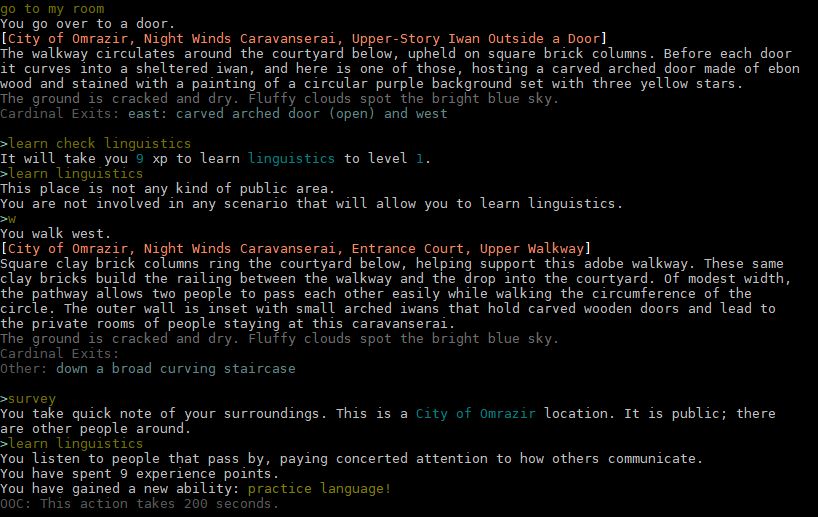
Since we had the required experience, we can learn it, but using LEARN LINGUISTICS points out to us that Emmaline will need to be in a public place if she wants to practice her Linguistics skill with no tutor.
So, we move away from her room to a public area and spend some time learning. This outputs a system emote that anyone can see: Emmaline is obviously learning linguistics. Some skills are not easy to learn in just any situation -- sword skills, for instance, would require you to be wielding a sword before trying to learn those skills on your own. Some skills have no way to learn them without an instructor. You can pay an NPC to teach a skill that they know, or ask another character. Learning from another player character gives both you and them an experience bonus and can be used to create some fun roleplay. For now, though, Emmaline will just think about languages without any help from anyone else.
And putting a point in Linguistics has helped Emmaline to learn a new ability! It is the first ability granted by level 1 of the Linguistics skills. You can use this ability to advance your knowledge of a specific language, so long as you know at least a little. Now Emmaline can specifically practice her Sirdabi, though only once every 24 hours.
Before concluding this showcase, let's take a look at some of Emmaline's other abilities that she started out with as a result of the skills we picked in character generation, and clarify some terminology.
Stat: A stat is an inherent attribute of the character. Everyone has an equal pool of stat points, and these cannot be added to or easily rearranged. After character generation, you can periodically swap one stat point for another stat point to represent the development of your character: for instance, an aging crafter may lose some of their vaunted Finesse to arthritic pains, while gaining in terms of Will due to their growing wisdom, or a redeemed thief may lose some of their own lockpicking Finesse to gain Charisma that will help them make new friends. It's up to you, the player, if and how that happens. Stats can be boosted by modifiers and in-game effects, such as when Emmaline touched her memento in Chapter 2, but you will never just get more points for your pool of stats.
Skill: A skill is something you can check with a dice roll to influence success or failure of generic commands that anyone can perform in-game -- such as trying to hide, swim, climb, sprint far, notice someone's tells, resist someone's grapple, and so on. The cap on skill checks is a hundred, except for contested rolls such as two fighters pushing each other. Every point in a skill basically affords the player an extra 1D10 to toss. This is why innate skills can really give a character a unique niche: because they can almost guarantee rolls closer to a hundred by giving the player a potentially endless number of 1D10s (though with greatly diminishing returns, given the highly expensive increasing experience costs).
Ability: An ability is a special technique that is unlocked through investment in a skill. Although there are some general abilities that everyone may attempt, most abilities are gated behind skill levels. There are even secret unlockable abilities that can be earned in a variety of ways: combinations of skill levels, stat points, earned reputation, or story events. One example is that if you survive the venomous bite of a zsimik, you will not only gain resistance to its venom, but your blood can also thereafter be used to create antivenin for that particular toxin. Another example is that if you have both Education (literacy skill) and Investigation (observational and information gathering skill), you'll gain the ability to do research at libraries.
Stats are displayed in SCORE as shown above. You can find a character's skills under the SKILLS command. You can also check SKILLS ALL to view lists of all possible skills, and not just the ones your character knows. Here's a picture of the SKILLS command output.
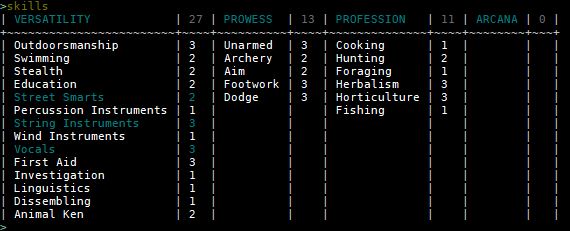
We can see that Emmaline's innate skills are Street Smarts, String Instruments, and Vocals, just as we set them up in character generation. In order to see what all her abilities are, we can use the ABILITIES or AB command.
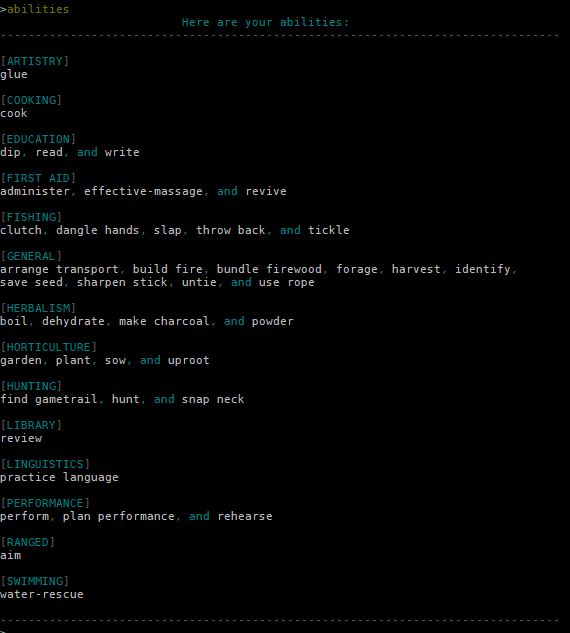
To take a closer look at an ability, you'd enter ABILITY (or AB) followed by the name of the ability. Or if you wanted to see an overview of all abilities in a category, you can check AB followed by the name of the category.
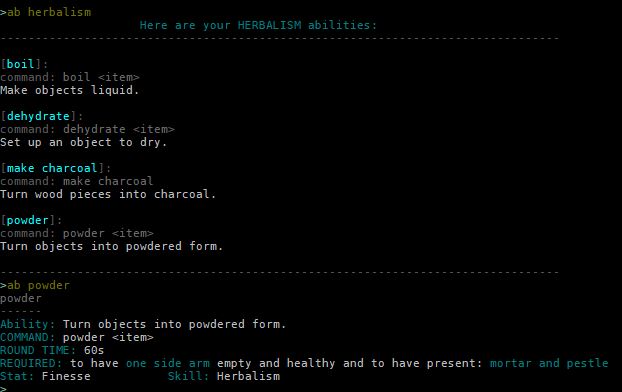
That concludes Chapter 3 in this showcase series, covering the topic of STORY: how you earn experience by roleplaying and documenting your character's life, and then can use that experience to advance skills and gain more abilities. Emmaline's own story is reaching an exciting turning point now, as she has an idea regarding where to go next. The Poet's Guild will be her future destination, but what will she find there? Will she realize all her dreams?
Stay tuned for Chapter 4! Until next time.
Chapter 4: THE POETS' GUILD
-- Intro:
We're working on a new MUD called Song of Avaria, using Evennia as a base code. Hopefully, the game will be opening for a public alpha nine months from now: January 2024. This is the fourth in a series of showcases to display the features of our game. In order to properly exhibit the purpose of Song of Avaria, which doesn't quite fit into the existing molds, we're going to demonstrate gameplay by focusing on the story of a character: Emmaline.
-- Chapter 4: THE POETS' GUILD
In the last chapter, we set up a story arc for Emmaline and developed it alongside ongoing roleplay, illustrating how experience is gained in Song of Avaria, and how character progression occurs. Emmaline heard about the Poets' Guild and now plans to join them, but she anticipates that they are a haughty bunch. We want to clarify here that the game is not centered around the Poets' Guild; they are simply one organization of many. A character might prefer to join the Custom Inspectors or the Lion Guard or a merchant's organization or crafter's chapter or even start their own guild with friends. That's not even to mention that the game is entirely playable as a rogue or lone wolf. The focus of the game is for your character to live their own life, and that can take a vast range of forms.
Anyway -- Emmaline may be hopeful and naive, but she is cautious as well. She has roughly a month until her lack of funds leave her out on the street. Living on the street is something that may suit some characters, and Emmaline has certainly had to rough it during more difficult periods of her life, but she'd prefer to avoid that. Here, Emmaline is thinking that she should have a serious plan to make a good first impression on the Poets' Guild. Thoughts serve as a vehicle to display the inner life of a character: their motivations and hidden agendas as well as more benign and whimsical workings of their mind.

Emmaline goes to the bazaar to find some local garments. The Bazaar of the Nine Winds is located above the river that separates the East and West districts of the city, very close to the caravanserai. It doesn't take much exploring to find a tailor's shop, but it was raining in Omrazir the previous night, and now there are puddles in the street.

However, once there, Emmaline has no idea what to wear. NPC tailor shops have a design book where a customer can look through the designs and available fabrics, as well as trim such as buttons and embroidery and ribbons. But the styles and garments advertised by this shop are foreign to Emmaline. She really wants to make a good impression, but doesn't understand how to spend her money. Some things, after all, are more expensive than others -- and there's no way that she can currently afford the most extravagant options...
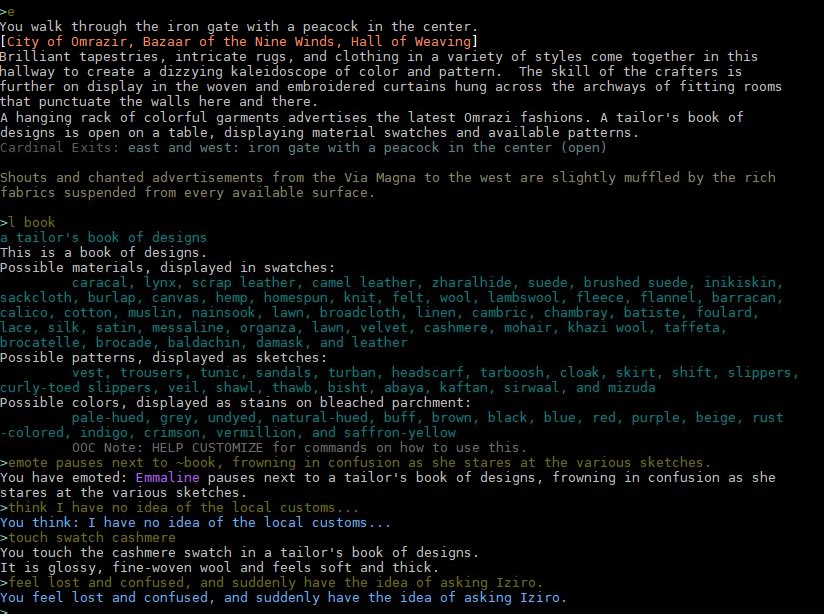
Maybe it's better not to get a bespoke garment after all. That cashmere feels awfully luxurious! Since Emmaline doesn't know that much about the local customs, she looks around for a courier outpost in order to ask her new friend Iziro's advice. In this case, there's a courier booth set up at the main gates of the bazaar.
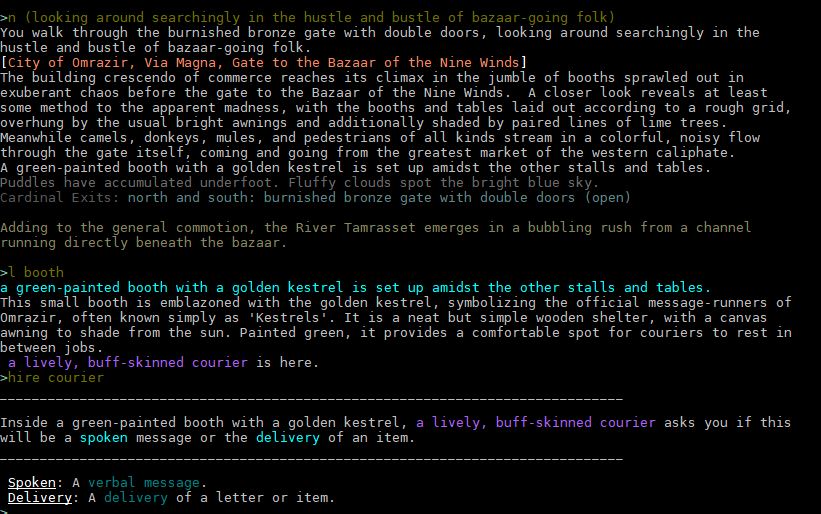
To hire a courier, you can use a single-line command with all the information, such as: COURIER SAY HI TO IZIRO FROM EMMALINE... or, you can just input HIRE COURIER and it will bring up a few questions leading you through a menu of dialogue that will help you to send the courier off on an errand. Surely Iziro will have an idea of the most affordable garments she can buy to make a good impression!

You can send any item, including a letter or a package, with a courier -- as long as it is not too heavy for that courier to carry, of course. You can also send a short verbal message. At this point, Emmaline is sending Iziro a quick question, because she doesn't feel as though she has the time to write him a letter.
When you send a verbal message through a courier, if the intended recipient is not online or is in a private location, the courier will eventually return and tell you they couldn't find the person you sent them to. If you quit during that time, the courier will instead go to the local post office and have a note written to send to the recipient through the IC mail system (which we will showcase another time).
For now, though, we can see that Iziro is around by checking WHERE. Using the WHO command would also work, but it is more of a global command whereas WHERE will show only people in your locale. Emmaline's locale is Omrazir, where Iziro also can be found. Regardless, it takes a short while for a courier to make their way through the city. The delay on sending messages is roughly three minutes, so the minimum that Emmaline will need to wait for a reply is six minutes.
The output of the WHERE command can be considered information that is accessible in-character, because it will not show people who are in private locations. Anyone seen by the WHERE command could be witnessed by VNPCs. If you're with another person, however, you shouldn't roleplay by saying, "I checked WHERE and Iziro is at the Plaza of the People" -- because that is an out-of-character mechanic. You can, however, roleplay something like asking a passing merchant if they've seen any street poet with sorrel hair, and learning that someone like that was seen heading towards the Plaza of the People. Obviously, you can integrate this knowledge into your roleplay however you please, so long as your method is reasonable and immersive.
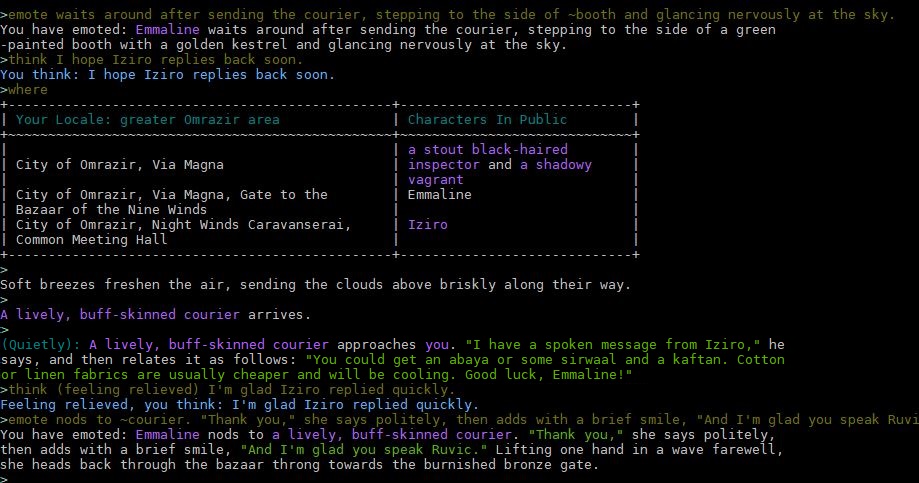
The courier returned to Emmaline with a reply from Iziro! That's very helpful. Now Emmaline will return to buy a garment for herself. If couriers were free, she might send back her thanks to Iziro immediately -- but as it is, they cost a small amount, so she'll talk to him about it later instead, face-to-face. The courier is of course an NPC and will not typically respond to roleplay, but it's nice to emote a bit all the same: after all, the courier might end up getting animated by an admin to respond, and update their affection towards you, and then you'd get a discount! Also, it makes your roleplay log look like a nicer story. Acting immersively is always a plus.
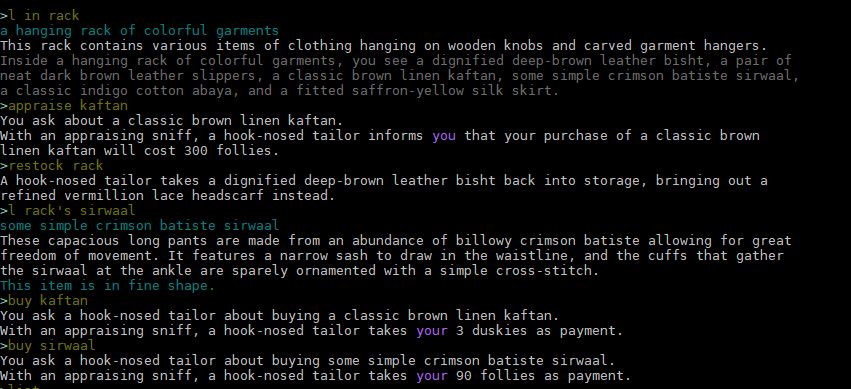
At stores, items for sale tend to be on shelves, tables, display cases, racks, and so on. In order to get more information about an item for sale, you can look at it and also use the APPRAISE command. If you don't like what's in stock currently, you can ask the shopkeep to RESTOCK, in order to check if there's anything in the shop storage that could be cycled out for you.
Other commands that might be useful in a shop are LIST or WARES, which will give you an abstract summary of everything for sale. In order to quickly look at how much money you have, you can check WEALTH -- and earlier, Emmaline withdrew all her coins from the bank so that she would have enough for this fashionable endeavor. She's wearing some rather old-looking sandals, and wonders if she has enough money to buy new slippers, too... but alas, she does not.
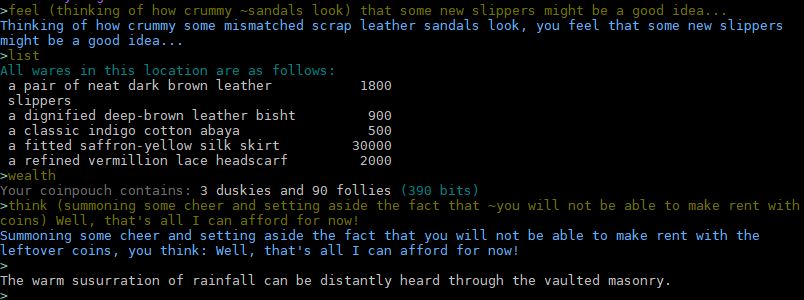
All right, now we have the clothes. And we can see that it's started to rain a little... a warm rain, typical of early springtime in Omrazir. Unbothered, Emmaline goes back to the Night Winds Caravanserai to change. Removing and wearing clothes is pretty simple -- clothes cover body parts, along with any wounds or scars on those parts. You can rearrange clothes to cover or to reveal other clothes or parts, and there are some clothing items that are automatically covered by others. We hope to have made this relatively intuitive and simple, while maintaining a wide range of realistic possibilities in terms of garment use. You can also signify how you want to wear an item when putting it on -- for example WEAR HAT TILTED AT A JAUNTY ANGLE, or WEAR SHIRT WITH ITS SLEEVES ROLLED UP. This will then show up just as you typed it when people look at you.
Note that we have designed the game with various holding locations on your person -- hands, teeth, etc. -- such that you do not have a free-floating inventory. But moving and managing your items is made easier by the fact that you can hold multiple objects in one hand, as long as they do not exceed ten pounds all together. While removing her old clothes, Emmaline ends up holding them all over an arm.
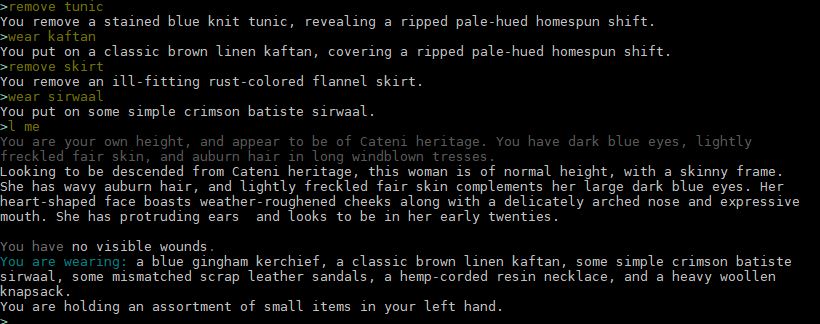
When finished getting dressed, Emmaline puts her old clothes on the bed. Unfortunately, when she steps back out the door from her room, she sees that the warm rain has abruptly turned into a pouring gale! She ducks back in to grab her cloak.
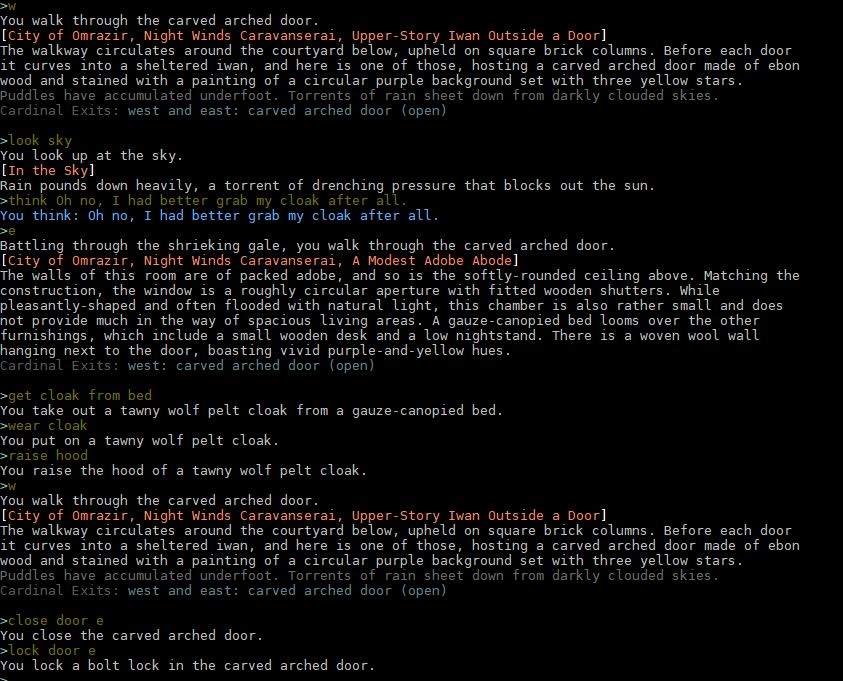
While raising the hood of her cloak will protect Emmaline from the rain, it will also conceal her identity: she will now appear to others as a slight figure wearing a tawny wolf pelt cloak. But that's all right. In a characteristically hopeful manner, Emmaline hopes the storm will stop. Battling through difficult weather takes more endurance, but unless someone is carrying a heavy load and moving quickly, the effects of endurance are fairly negligible. We made this design choice in order to facilitate movement of characters in the world, for the sake of pursuing roleplay. While often the realism of carrying a load and needing to rest can generate spontaneous roleplay on its own, in normal cases it should be rather easy to move around.
Since Emmaline has her waterproof cloak, she's able to keep both her new clothes and herself from getting too wet in the storm. An umbrella would also do the job, but she doesn't have one. She's determined to get to the Poets' Guild, though! Full disclosure: this storm was unplanned on our part for the showcase. However, weather is an important part of Avaria, and it was apparently just as determined as Emmaline to show its face here.
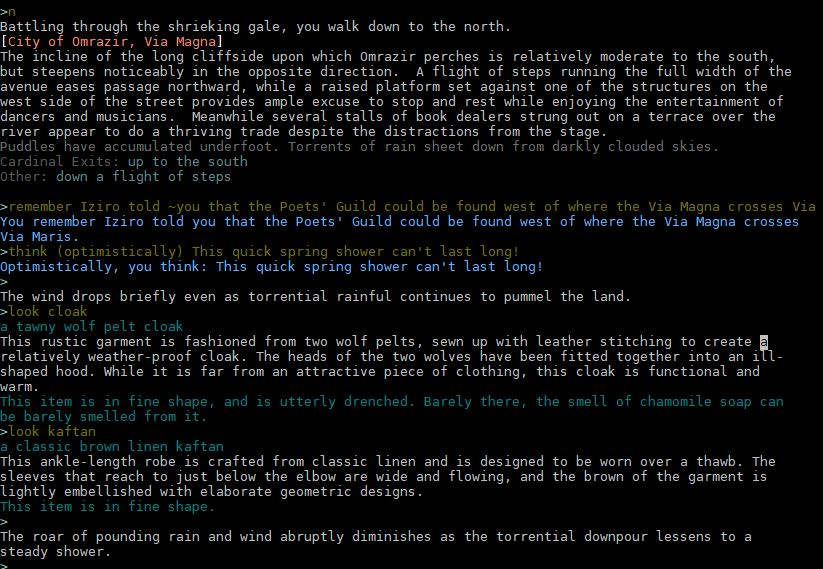
Thankfully, the storm has lessened a bit already. REMEMBER is a command that works just like THINK and FEEL. Iziro told Emmaline where the Poets' Guild building was located before, and she remembers. The Via Magna and Via Maris cross each other in the center of Omrazir, so these large streets are great landmarks to reference. Other streets and neighborhoods intertwine chaotically through the city's terraces, making an enchanting, mysterious, as well as potentially-frustrating (and dangerous in some neighborhoods) place to get lost. There are many small interactive touches in the world, along with unique atmosphere echoes and hidden passages that may be discovered. We want to make a game that rewards exploration and immersion, where you can step into your imagination and simply exist as a character for a while. Many things in the environment are dependent on time, and also on the weather, as can be seen in this sensory description that happens only during the rain.

Eventually, Emmaline arrives at Poets' Place: a distinguished plaza in front of the Poets' Guild. When she tries to enter the building itself, she finds her way barred by an organizational guard. These are NPCS who will block non-members of an organization, or members of too low a rank, from passing through certain entrances. She waits around, a little despondent, hoping to see someone of note. You can change the way you appear in the room with the POSE command, and here we will pose Emmaline waiting. This seems like typical behavior at this location, judging by the room description. As a side note: using thinks and feels can often alert staff storytellers to the fact that a PC is waiting somewhere, unable to continue their story easily without some help.

April 1st in the game world is Pavana 1st, the Avarian New Year. Eventually, we want to have scheduled events for lore holidays, but for now some staff members send a few special echoes to Emmaline's location, depicting the celebrations of surrounding VNPCS. And then, a resplendently-dressed poet walks out! This is an animated NPC. In the beginning, when the game first opens, it is likely that all high-ranking members of various organizations will be NPCs. They will always be accessible in game, and roaming around their turf with their specific set routine, until a staff member animates them. These NPCs are intended to facilitate stories for players, and eventually player characters will take more high-ranking roles. The presence of organizational NPCs, however, should hopefully alleviate the stress of in-game player leadership and give PC leaders a staff-based support structure to lean on if they wish.
(Here is a text version of the roleplay log for anyone who finds the images difficult to read, or who wants to see the full version that doesn't show in just image snips.)

As it happens, this poet appears to be one of the most famous figures in the Poets' Guild. He is on his way to somewhere, and invites Emmaline to join him so that they can speak. She follows, and they walk through the city while conversing. Adding parentheses when you look at someone will produce an emote, while otherwise there is no notification to anyone else that you used the LOOK command. Sometimes, after all, you may be checking what someone looks like for OOC reasons.
Following works in a fairly simple manner. You FOLLOW someone and then whenever they move, you move as well (if you are able to). It is possible to follow in tandem, so that if either person moves, the other moves with them -- but if you get separated, all following ends. If you FOLLOW someone, then it will be easy for them to lose you, but if you CHASE someone, it's more difficult for them to lose you and it requires a skill check. You can stop following by using FOLLOW ME or FOLLOW STOP.
Some exits have delayed traversal times, due to either the method used to move (such as climbing or crawling) or to the nature of the specific location, such as moving along a winding alleyway. To show some subtleties of Emmaline's unfamiliarity with the area, we will use the HMOTE ("hidden" emote) command to show her looking around the markets. This is akin to a whisper in that some people may notice it, if they are close enough or sufficiently observant, but it is likely to go completely unseen. It is a good way to add nuance to a character without being dramatically obvious, and if another person is specifically WATCHing you, they will almost certainly see any hidden emotes.
Despite Emmaline being overwhelmed by an unfamiliar part of the city, Arezou Rufsahni's destination isn't far. The Thieves' Treasure is a rebelliously-artsy drinking establishment on the western side of the city (and not actually a hangout for thieves). Here, it appears that Arezou is meeting a fellow poet. Emmaline introduces herself. Here, you can see the use of INTRODUCE, which is most often used to get local NPCs to recognize you, but also displays an emote that can be useful for players as well.
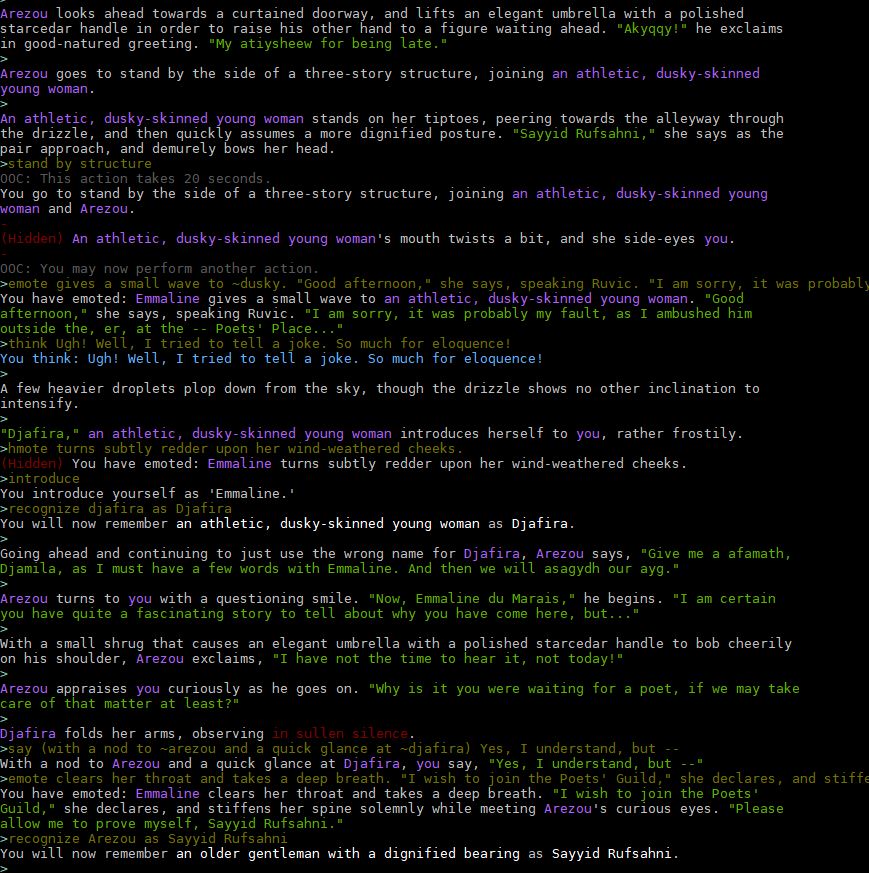
Emmaline reveals her intention to join the Poets' Guild. Djafira is scornful, and barely tries to hide it, but Arezou continues to be intrigued by Emmaline and suggests that she return in one month and audition with a performance in flawless Sirdabi. This is obviously a big challenge for Emmaline, but she accepts.
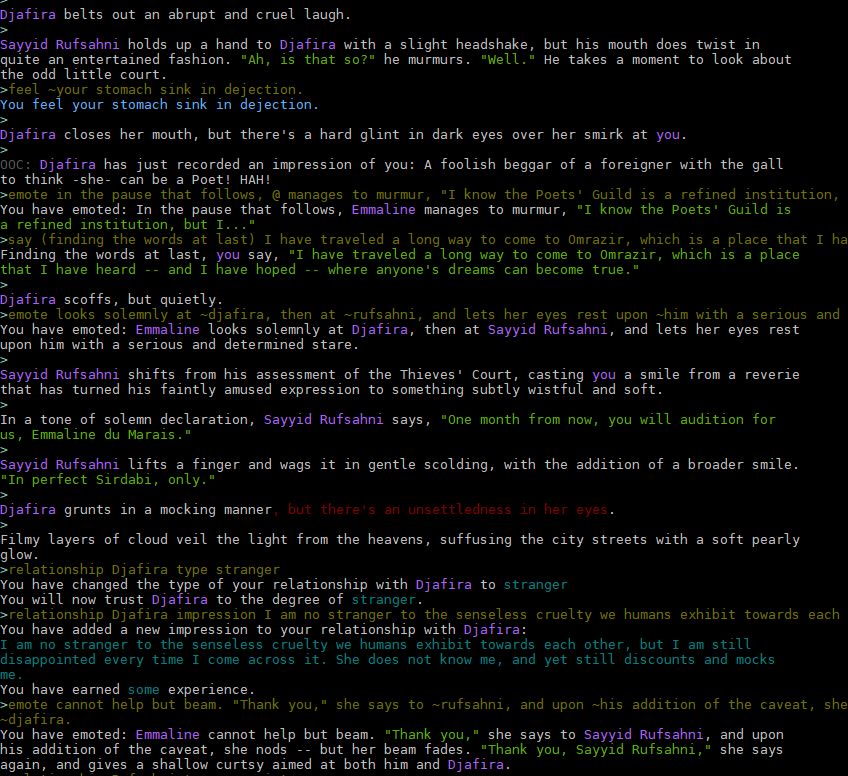
Back at the caravanserai, Emmaline starts to plan a performance. Different professions have their own mechanics; Avaria is not just a game for bards, of course. There are some mechanics that we are unable to explore with Emmaline, such as hunting, sailing, tinkering, mining, animal husbandry, and so on. The game world is vast enough in both lore and mechanics that one character's niche, while perhaps at times overlapping with another's, cannot realistically encompass everything. One professional mechanic that we can demonstrate through Emmaline's story, however, is performance.
There are many performing-type skills (such as acrobatics, dissembling, singing, dance, and the playing of various instruments) that will grant performance abilities. These abilities will allow you to review your repertoire of performances and plan new ones, and then to rehearse, perform, and publicize your performances.
When we check Emmaline's repertoire, using the REPERTOIRE command, we can see that she has no specifically planned and rehearsed performances. Of course, that doesn't mean that she hasn't been performing all this time. Free-form performing through emotes alone is encouraged and welcome, so we'll just say that Emmaline has been winging it.
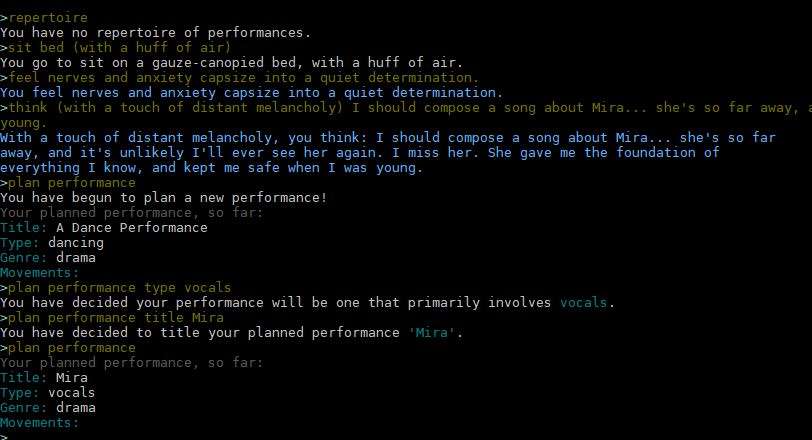
Now, however, she wants to plan a performance. She decides to compose a song in honor of Mira, her guardian and mentor back in Merouen, because while in Ruvera she tried to avoid singing directly about the hedge witch for safety's sake, she feels more secure doing so in Omrazir where such things seem to be more acceptable. Planning a performance entails assigning the main skill that would be used (in this case "vocals"), as well as categorizing the performance with a genre (in this case, we will leave it as "drama"), naming the performance (we named it simply "Mira"), and lining up a series of actions that would be taken in order to perform.
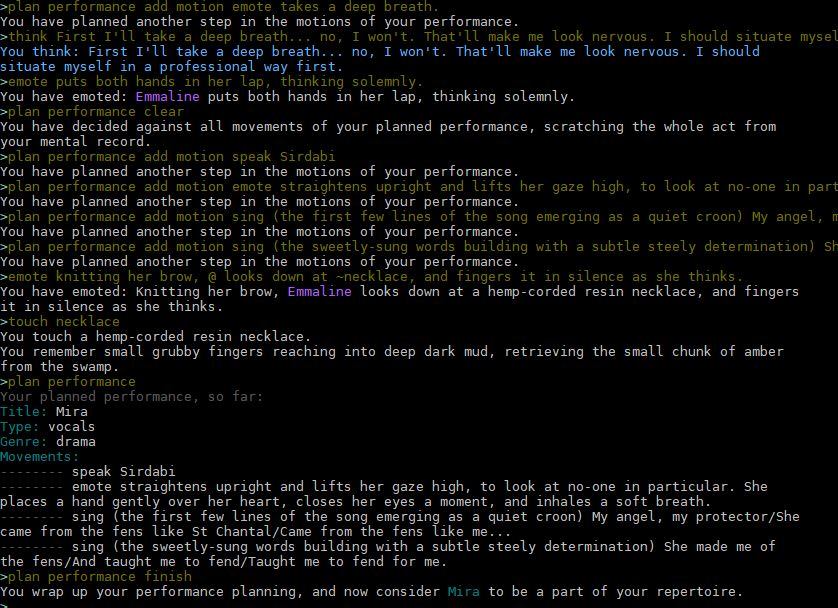
Now we're lining up actions. These are in the forms of commands, so if we want to make sure we're speaking a certain language, we'll put that in there. Using the SING or RECITE commands will allow you to insert forward slashes in order to separate lines in a stanza. These commands will be issued automatically at an evenly-paced rhythm when we start performing (until the performance is finished, or we stop, or are otherwise interrupted). So, we shouldn't make any of these emotes overly long, and if we want a thoughtful pause, we can insert one on its own. Once we're done planning, we can complete the performance, and it now becomes a part of Emmaline's repertoire.
The number of times a performance has been practiced will add to its final score up to a limited bonus, which will determine the reactions of vNPCs in the area. So, when planning a very important performance, it's a good idea to rehearse. After planning some of her performance, Emmaline starts to do just that...

Whoops, there's a knock on the door! At any time when performing or rehearsing, you can stop with the STOP command. This command works for anything that has a delayed outcome or is ongoing. Most doors have peepholes that you can look out through, so Emmaline does that now, using the PEER command. She sees Iziro outside, and then shortly hears him calling.
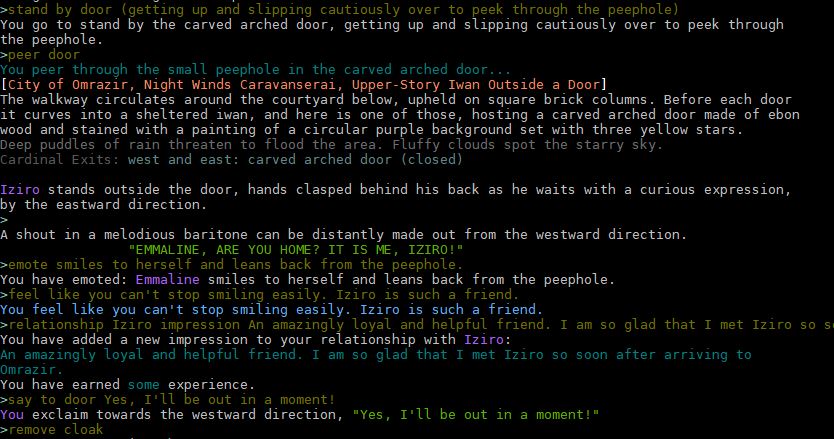
Using shouting commands such as scream/shout/bellow/et cetera will echo your noise through the surrounding rooms, so if you don't want to do that, you can simply address a direction. Here, Emmaline will say something to the door. If someone is not positioned at that direction, they will only be able to hear a vague murmur, but since Emmaline and Iziro are standing directly on opposite sides of the door, they can hear each other easily. Further, since they have already established a relationship, new impressions can be made at any time and there is no need for the direct presence of the other.
We'll leave Emmaline to tell Iziro about her exciting news, and close this chapter in Emmaline's story. Of course, when we get a chance, we'll go ahead and develop her story arc further -- thus earning more experience, which this time we'll probably want to invest in furthering her singing skills. During this next month, Emmaline will be rigorously practicing her Sirdabi, and she will also enlist Iziro's help in learning the language through conversation. She will add more lines to her song -- planning a performance with the same name will override the old one in her repertoire. And she will adjust and rehearse her performance multiple times, growing more and more comfortable with it, until the fated moment where she will audition before the crowd at the vaunted Poets' Guild.
When the next month rolls around, we'll see Emmaline's performance and whether she will be accepted or not. Until then!
Chapter 5: LIVELIHOOD
-- Intro:
We're working on a new MUD called Song of Avaria, using Evennia as a base code. Hopefully, the game will be opening for a public alpha seven months from now: January 2024. This is the fifth in a series of showcases to display the features of our game. In order to properly exhibit the purpose of Song of Avaria, which doesn't quite fit into the existing molds, we're going to demonstrate gameplay by focusing on the story of a character: Emmaline.
-- Chapter 5: LIVELIHOOD
Last month, we left off the story with Emmaline having been tasked by Arezou Rufsahni, a famous poet, to come up with a Sirdabi-language performance in order to audition for the Poets' Guild. She has practiced her Sirdabi until fluent, finished planning her performance, and rehearsed it to herself and to Iziro, who has become a friend. Today, Emmaline will be exploring the city a little more. She still hasn't seen even a quarter of everything there is to see in Omrazir.
Just off the south side of the wharf district, Emmaline discovers an old amphitheater. Many rooms in Avaria contain objects that can be looked at more closely or interacted with. Carefully reading the room description here leads us to try looking at the seating, which appears to have a door beneath. We try to look at this door and manipulate it.
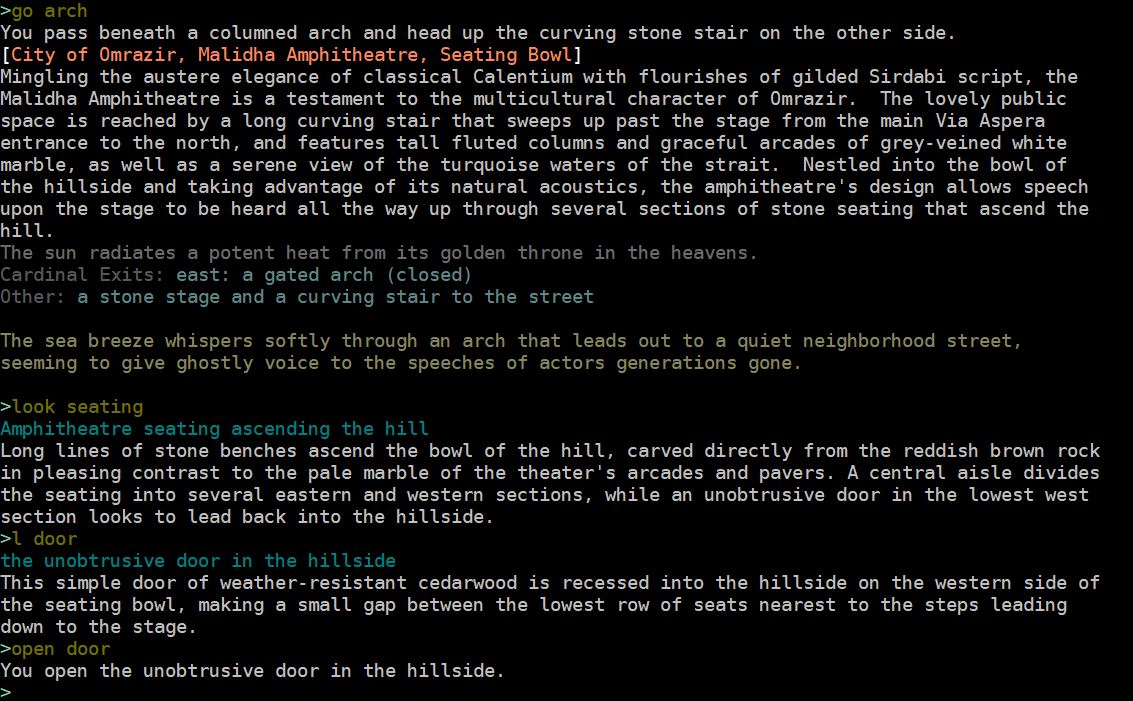
The storage area beneath the amphitheater contains more secrets to be discovered. Emmaline finds that there is a dry well and, feeling adventurous, she decides to try climbing down...
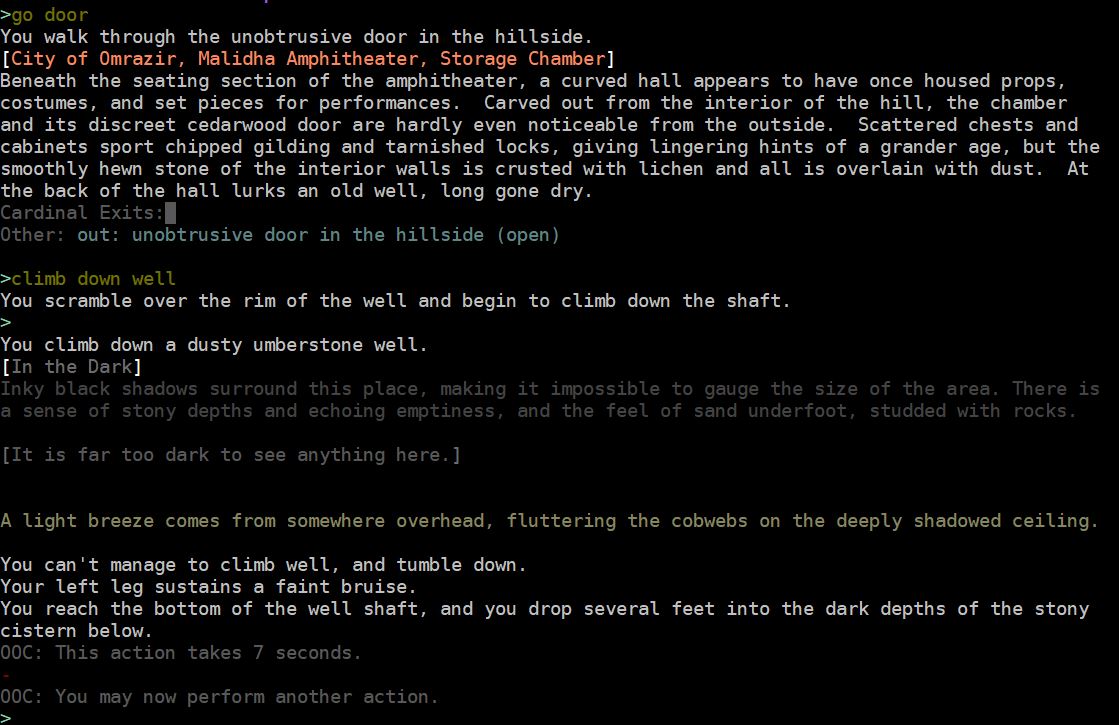
Luckily, it's not a long way to fall. Small bruises and scrapes can be common while exploring a rough environment and generally aren't too serious. It is very dark down here, though. In the dark, it can be much more difficult to see things. Few places are truly dark in the game world, and those that are would typically be secret dungeons or other exploration opportunities rather than well- frequented areas. Even at night, there is usually enough starlight (and lantern light) to be able to see what you're doing. However, weather conditions and time of day do affect available light to the extent that it can be easier to perform stealthy actions in dimmer conditions without others noticing.
Emmaline wants to be able to see the area, so she takes out her torch and lights it. A torch, lantern, fire, or other sort of object can be lit with any combination of flint and steel items, including a single-object firestriker tool. All Emmaline has in her knapsack right now is a flint flake (which can be foraged in most areas) and a scalpel from her medkit, so she uses that. In the torchlight, she's able to see better, and finds a winding tunnel...

The winding tunnel brings Emmaline to a carved chamber where she finds a gap in the wall, and SQUEEZEs through it. Some exits will be cramped, and if Emmaline were any larger, she might not have been able to fit through the gap. Her adventurous exploration has been rewarded by the sight of a luminous underground cavern. She snuffs her torch, then wades into the pool.
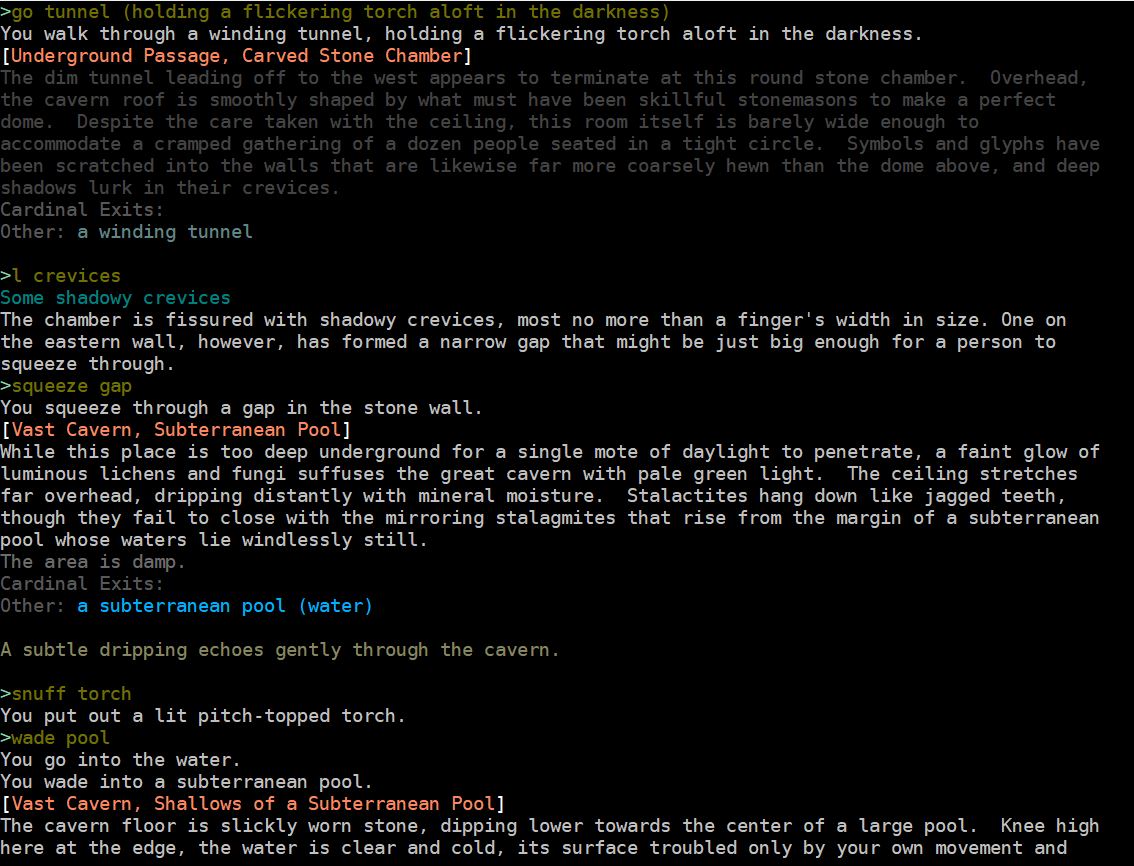
Shallow water can be waded through, but Emmaline will have to swim if she wants to go into the deeper center of the pool. Swimming takes both hands, so Emmaline puts her things away in her knapsack before heading out into the deep water of the cavern pool.
Growing up in the fens, Emmaline is no stranger to water, and she's a relatively decent swimmer. She tries to DIVE. In a location with deep enough water, diving repeatedly will send you increasingly lower through a room's depths. The first dive takes Emmaline before the surface, and the next dive puts her in the higher level of the room below. She could explore further, but the cavern pool is deep and dark. There's no telling how many rooms deep it goes, and Emmaline herself has no way of knowing the water's depth. For now, she decides to resurface for air before she runs out of breath -- drowning is a very real possibility if someone gets too risky with their swimming. She swims up, and rising through the water works the same way -- her first move takes her up to below the water's surface in the cavern pool.
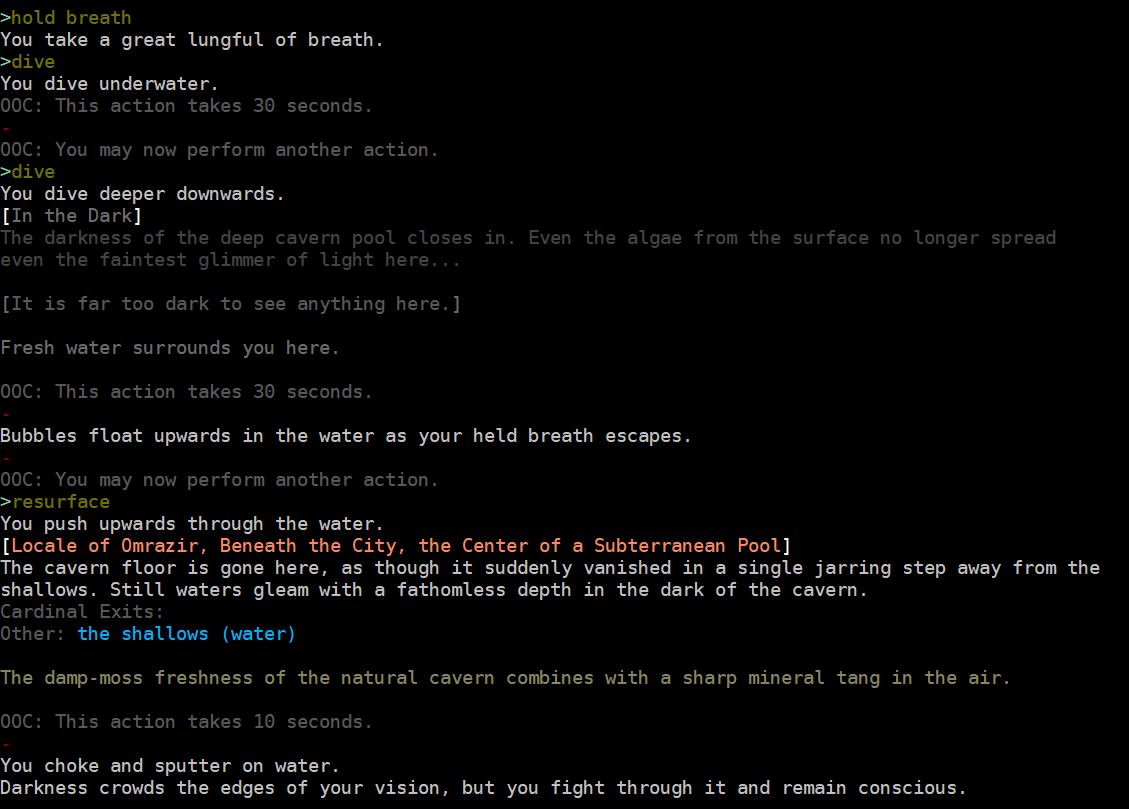
Luckily, Emmaline makes it up to breathable air before she passes out. Back at the stalagmite-lined shore of the cavern pool, Emmaline looks around as she works to catch her breath. Anyone can use the FORAGE ability, but their success will vary according to their Foraging skill. Rocks, moss, and other common junk can be found almost anywhere... and here, Emmaline is able to find a small smooth stone. She tries to skip it across the water.
Note that while Emmaline's breath hasn't been fully caught, the prompt symbol is a sicklier yellow, while once she finishes catching it, the prompt turns pale green again. When she's recovering roundtime from an action, the prompt is a dash, and when she's able to act again it turns into the arrow prompt once more. Prompts can be customized to show numeric values, stars, percentages, or whatever you'd like -- but this is the default version that will show more information in combat, and very simple information when outside combat. We can also see that Emmaline is starting to dry off from being in the pool, and her small bashes and scrapes from falling down the well are healing as she spends some time in the cavern.
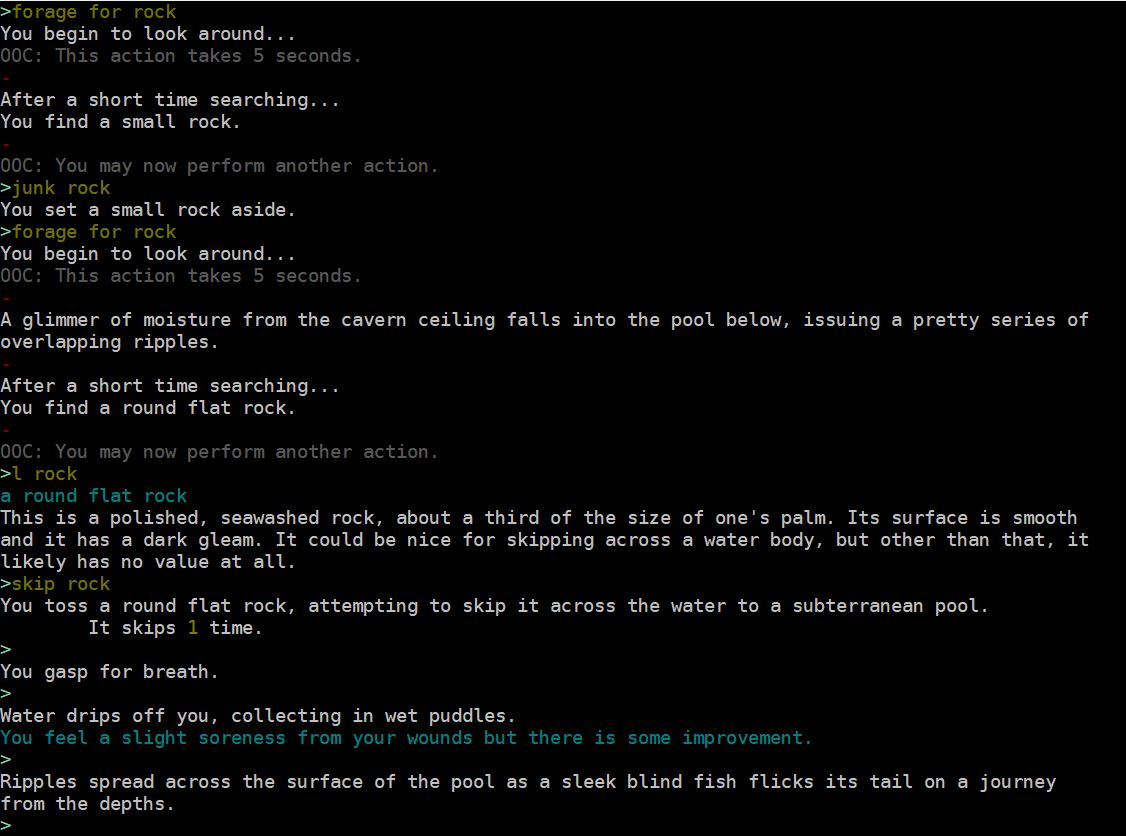
We wanted to include some minigames in Avaria, like skipping stones here, in order to add some simple roleplay activities that characters can get up to together -- or, like Emmaline in this scene, even by themselves. Being on your own can be a bit lonely, though, at least for some people. Emmaline decides to climb back up to the amphitheater.
Exploring underneath the well was a private sort of location: unpatrolled by guards, and not within easy reach of city messengers. However, now that Emmaline is back on the streets of Omrazir, an official courier finds her with a delivery. It's a letter from Arezou Rufsahni! This letter sets up the exact time of Emmaline's audition. Due to the 1:1 ratio of Avarian time with real time, it's relatively easy to coordinate meetings, but there are still some fantasy conventions that correlate with the rough historical period of the setting.
Clocks aren't commonplace yet, let alone watches, so people often refer to time by general hours. The hour of the jackal is around sunset. This means that the hour of the jackal is at a roughly different time every month, as the sun sets at different times throughout the year, earlier in the winter and later in the summer. If someone is unsure about an hour stated IC, they can check HELP TIME or use the LOOKUP
We've tried to design the game so that OOC communication isn't required in order to coordinate IC meetings and events. As in an RPI style game, most roleplay should simply be played out as it happens without coordinating the details in advance, and it's largely non-consensual in that it's not necessary to ask permission before acting upon another character. However, there are some notable exceptions for which coded consent mechanisms have been built into the game, which will be explored in future chapters. Although we prefer people to be immersed in their roleplay like this, that doesn't mean we're opposed to all OOC communication between players, and the game does have an OOCwhisper command as well as forums and OOCmail that allow players to communicate with each other when necessary or desired. This will also be explored in a future chapter. In most cases, though, IC communication should be all that's needed.
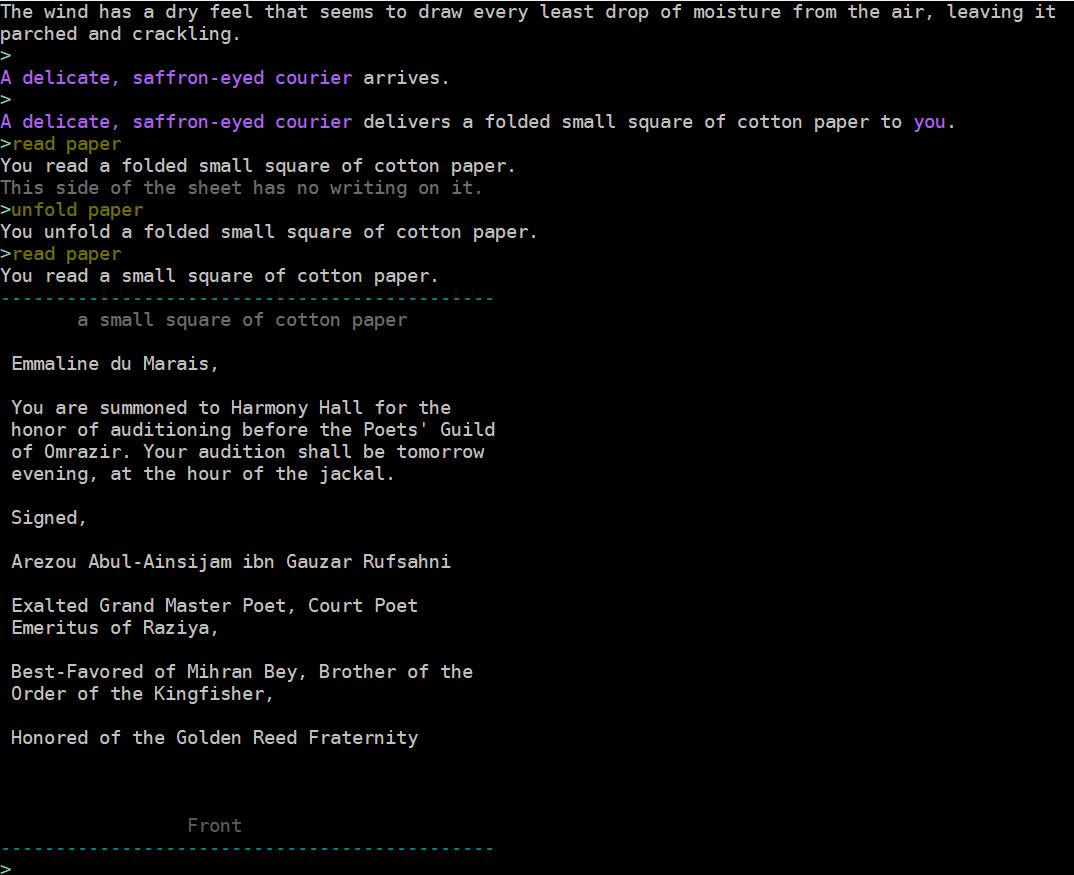
Emmaline reads the letter, then analyzes it. Anyone might develop their own unique handwriting style, and upon analysis of a written work, further details can be gleaned about how it was written. This is part of our philosophy of making things trackable in-character, so it should be fun to solve mysteries and remain immersed both in terms of how your own character's actions may be noticed by other people, and how you are able to investigate the actions of others.
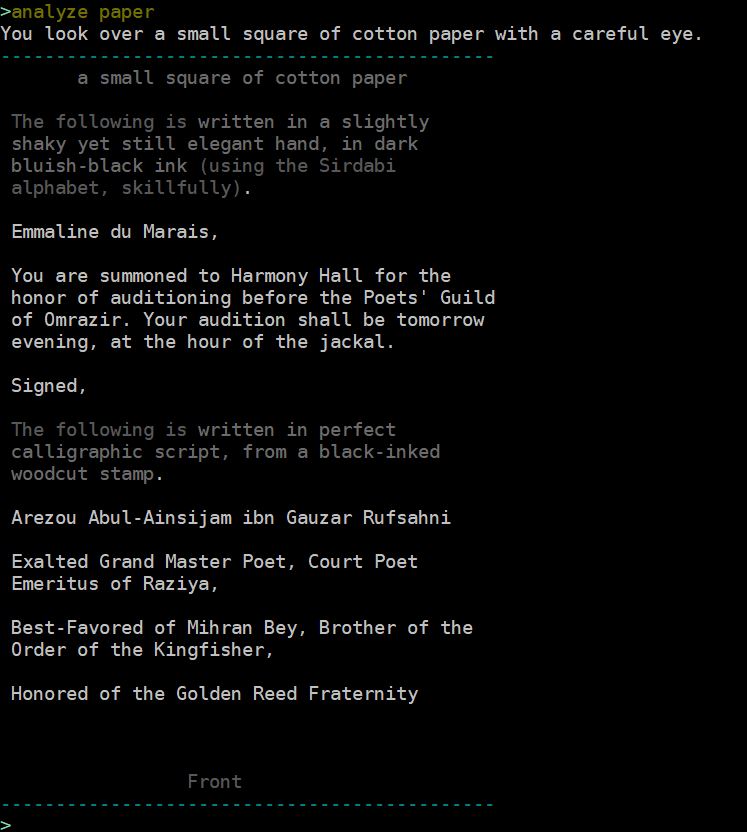
The time requested by Arezou Rufsahni is fine. The next evening, Emmaline shows up at the Poets' Place and is brought into the building to audition. The guards allow Emmaline to pass while she's following a person permitted by the organization, and the VNPCs react to Emmaline's performance.
Emmaline's audition is received well by Rufsahni and the others present, even if they are a little puzzled by the fact that her song was very different in both style and mode of performance from the poems they are used to hearing. There's a sense that they are rather set in their ways and have strong convictions about what constitutes a proper performance, but they are willing to accept Emmaline for now, and are intrigued by her novel ways. Rufsahni invites Emmaline into the guild, with the caveat that she behave publicly in a dignified manner. Djafira is jealous and resentful.
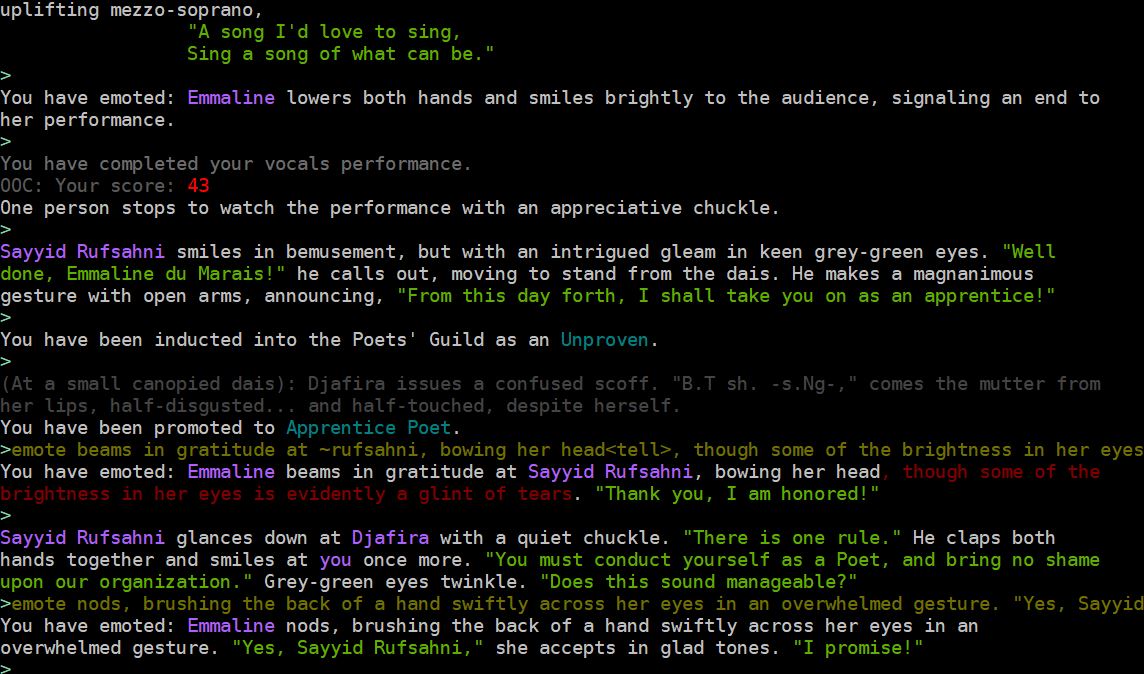
Encapsulating part of the text of an emote within
At any rate, Emmaline departs from the audition in good spirits. She looks around Harmony Hall, the Poets' Guild building, to which she is now permitted entry, to see if she can find a way to earn a better livelihood. Using the SURVEY command in a location will show if jobs can be found in the area, and then JOBS will give information on any job listing available.
A job is a coded way for a player character to make money behind the scenes. Listings can be found in public areas as well as private ones. A tavern might have listings posted for waiters and cooks, while a lumberyard might be looking for day laborers, and so on. Organizations tend to have their own careers as well, often gated within guildhalls behind organizational guards.
Emmaline was hired after APPLYing to become a Poet. Once you are hired, you can see more information about your new livelihood by looking at the JOB display. The coins from paydays will be automatically deposited into your local bank account, and you can quit the job any time. It is only possible to hold down one job in the zone at a time, and if you leave the zone for a long period of time, you will lose the job.
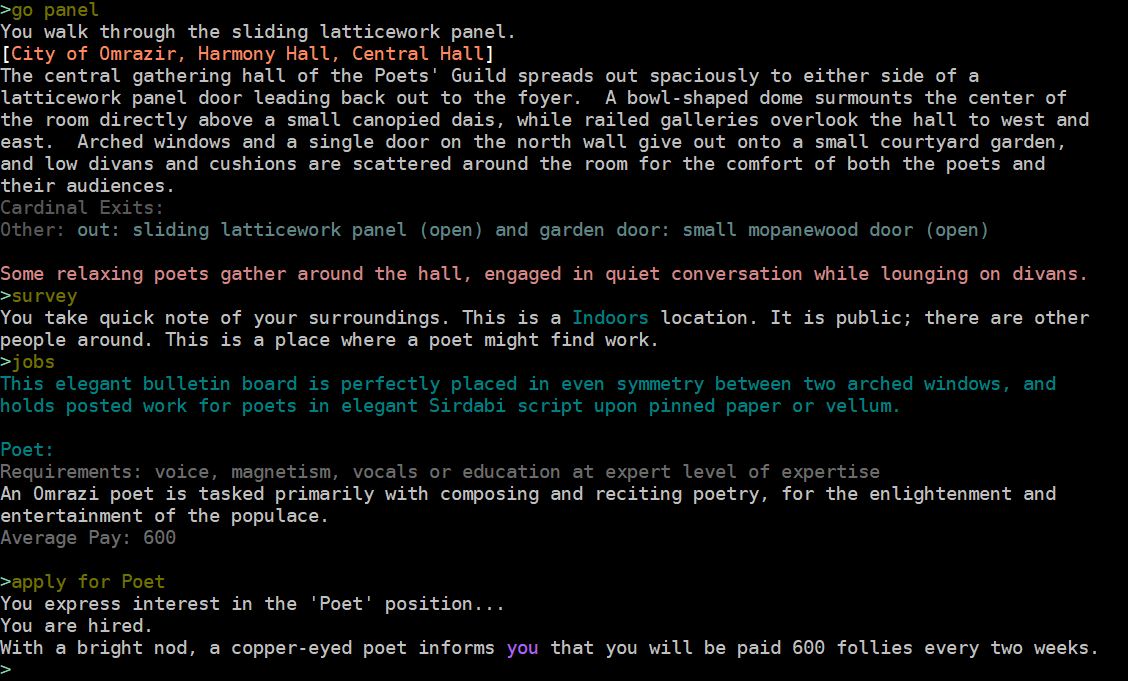
The affection of Emmaline's employer (an NPC, generally, and in this case Arezou Rufsahni) tends to govern her pay for this occupation, within a set range. A workplace provides more than just coin, however. It can be fun to roleplay slice-of-life at the workplace sometimes, and make connections with other player characters through the built-in plot hooks provided by a career. Jobs can sometimes grant a character local titles and reputation, and if someone asks around about Emmaline, they might find out from VNPCs that she works as a Poet at Harmony Hall. Some jobs also have associated errands (or quests) that can be accessed via the WORK command.
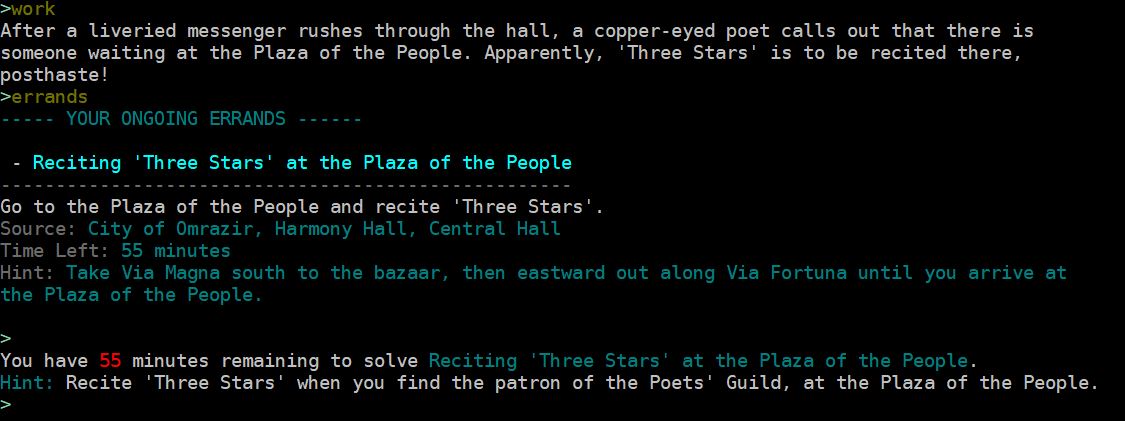
There is no need to actually WORK at a job, but doing so can have some perks. It's an optional thing to do that might increase affection with one's NPC employer, grant some tips, aid in exploring new areas and mechanics, and serve as a catalyst for further roleplay opportunities.
Here, Emmaline is asked to go to a certain location and recite a traditional poem. When an errand is accepted, it tends to have a time limit after which it expires. When WORKing, the errand is considered to be automatically accepted. Hints will show up at intervals until the errand expires. In typical MMORPG lingo, this is a quest, and QUEST in fact works as an alias to access the display about one's ERRANDS. However, most errands are things like simple deliveries, escort tasks, or other such small chores -- so the grandiosity of the word 'quest' doesn't really apply, and it's not generally a word someone would use to describe it IC (except maybe sarcastically). A task deserving of being titled a quest would be something entirely unique and roleplayed specifically by PCs or animated NPCs.
Emmaline's not sure where to find the Plaza of the People, but there are hints from the ongoing errand that give directions (and then later, the lines of the poem). Discovering the way to the plaza, she finds an NPC standing around waiting impatiently and realizes that this must be the person who requested the poem to be recited.
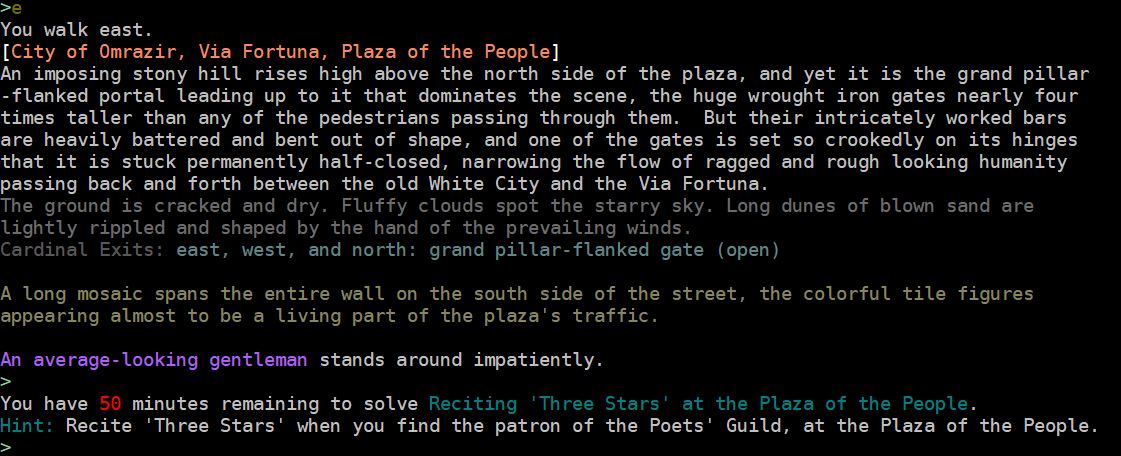
There, Emmaline recites the requested traditional poetry and completes the errand, earning a pleased response from the NPC patron. Now that we've done some work, we see that it's caused Arezou Rufsahni to like Emmaline better (remember, Rufsahni is an animated NPC). This increased affection could lead to a pay boost! So, we also check our JOB display to see what that looks like. It appears as if that increased affection has already led to a raise of 45 follies.
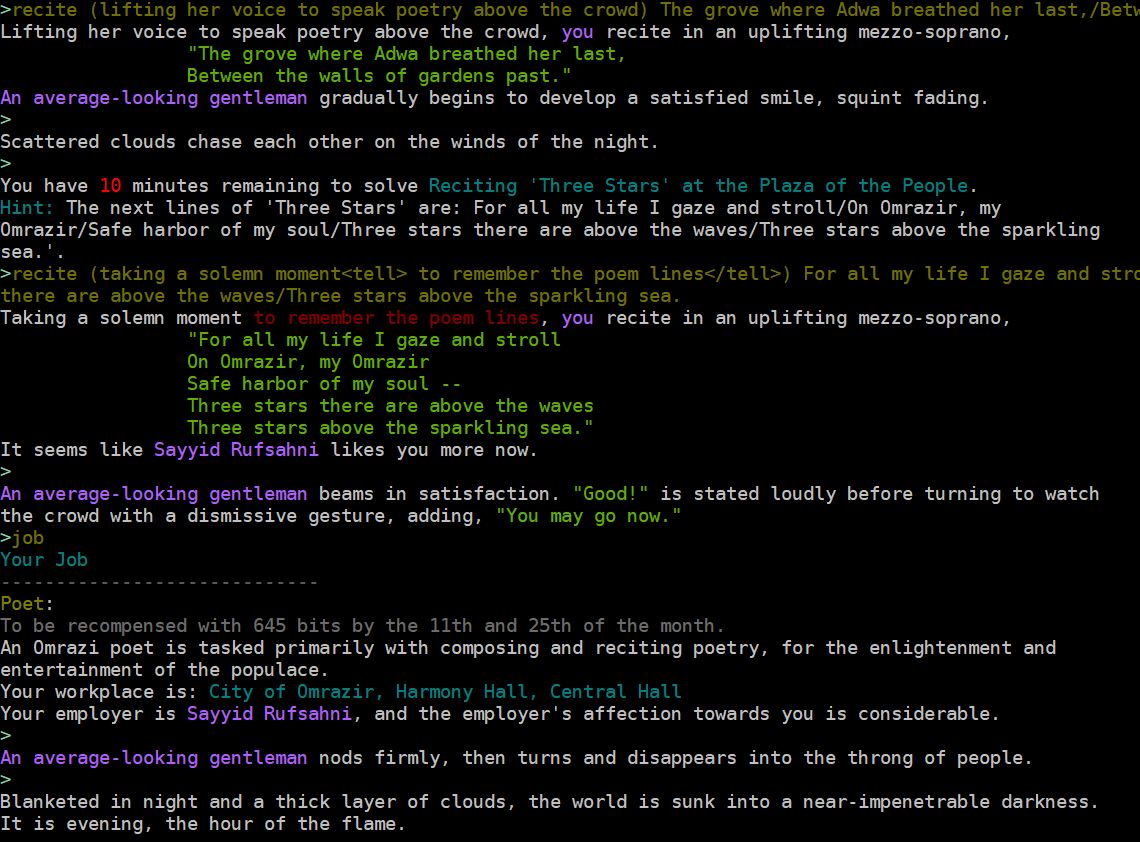
It's a great deal of development for Emmaline to be able to recite the very poem in Sirdabi that she couldn't even understand when Iziro was reciting it at their very first meeting two months ago. As a trivia note, "Three Stars" is a little like an Omrazi city anthem, the official sigil of the city being a tall wave cresting beneath three stars.
After such a long day of exploration, auditioning, and work, Emmaline heads back to the caravanserai. She tries to crouch next to the local stray she's seen so many times before and pet him. When you get close enough to touch someone, whether it's an NPC or a PC, you will incur roundtime if that person does not trust you to a certain level. There are two levels of proximity: immediate proximity, where you can touch someone; and general, where you can hear them speak quietly, such as if you were both sitting at a table together. If you are not close enough and you attempt to do something that requires closer proximity, you will automatically move closer first.
When Emmaline moves to crouch near the cat, she's joining his general proximity... and when she attempts to pet him, she moves into his immediate proximity. At least he hasn't distanced himself from her! Finally, she can try to pet him. Unfortunately, he still does not trust Emmaline enough to allow that..

Luckily, Emmaline stopped by the bazaar on her way back from the Plaza of the People -- and bought a little treat for the cat. Different animals like different kinds of foods, and tend to also have a random favorite food out of their accepted diet. It looks like Emmaline has figured out this semiferal cat's favorite food, and now she is in better graces with the feline. Maybe this time he'll allow some petting!
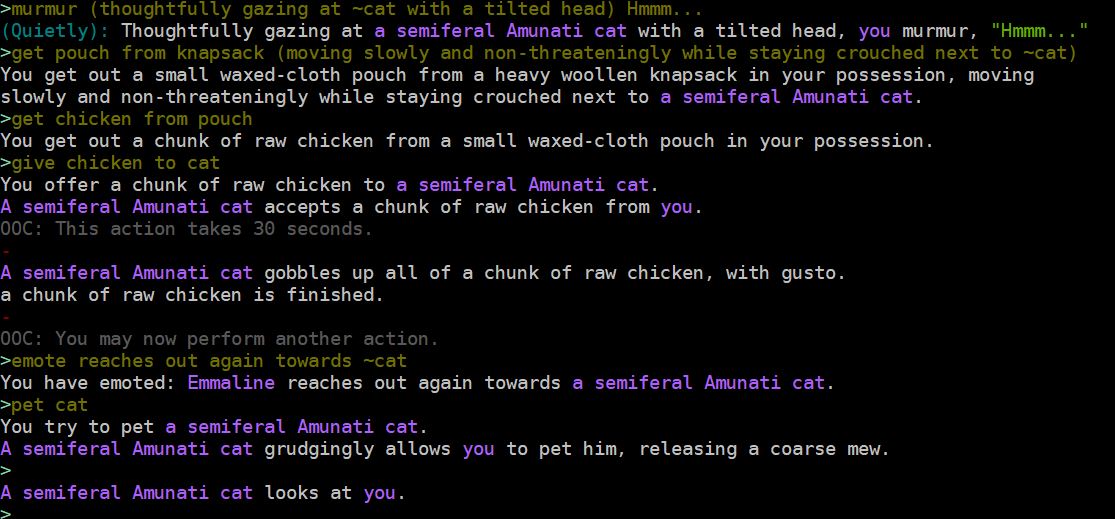
Aww. :) After petting the cat, Emmaline heads up to her room and takes a nap. Although sleeping, much like eating, doesn't need to be done on-screen, it can still be a nice and immersive thing to have in your log. And characters can receive dreams while asleep, after all.
Dreams can be added by the player, but staff can also send dreams to characters. While we're using the website to update Emmaline's story arc, and Emmaline is napping in the background, she suddenly gets a strange dream. This dream appears to have unlocked a new ability!
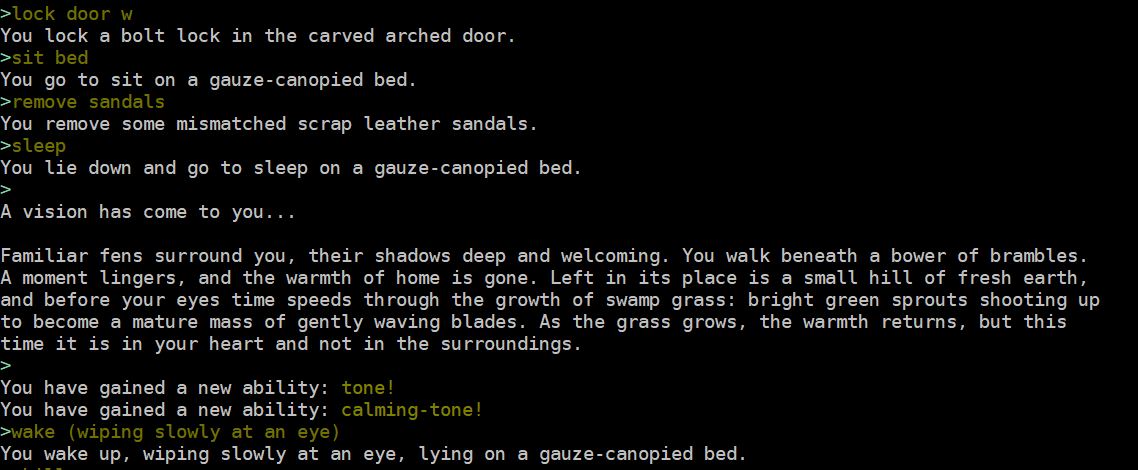
Waking up and checking her abilities and skills, Emmaline finds that she is developing a new skill: Sonomancy! This is one of the skills associated with bardic-style magic, and while there can be many variations on this type of magic, and there are many other types of magic out there in the world, Emmaline is only just beginning to learn. In Avaria, magic is innately regulated by the fact that most people possess something called "Grounding". This means that they are grounded firmly in what they consider reality, and so will have some natural resistance to magic other than that which is commonly accepted as normal. Charms and hexes, weather magic, divination, and a variety of faith-based magics are typically seen as "everyday" sorts of magic. But other, more rare or powerful kinds are generally considered either implausible, or something that simply happens "somewhere else," to other people. In any case, it can be quite traumatic to find out that reality may be something other than what one expects and thereby lose one's grounding. Thankfully, Emmaline has not gone so far as to lose hers just yet. We can check through the MAGIC command.

This new magic ability of Emmaline's appears to be a way to soothe aggressive NPCs (and potentially debuff aggression-related stats in PCs). This could come in very useful in the future! We will have to wait and see.
For now, here is Emmaline's updated story page.
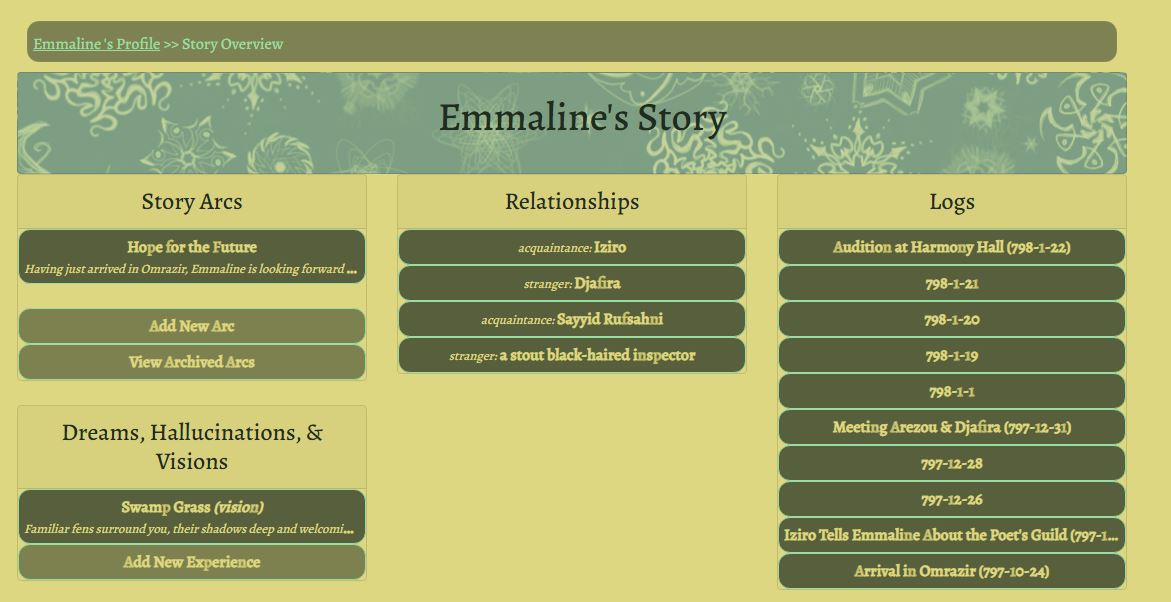
Clicking on a specific relationship will bring up the history of that relationship. Here is how Emmaline's relationship with Iziro started and has evolved so far. While Emmaline has written three impressions of Iziro, he has only written one of her so far, which we can see in the table under "counterimpressions".
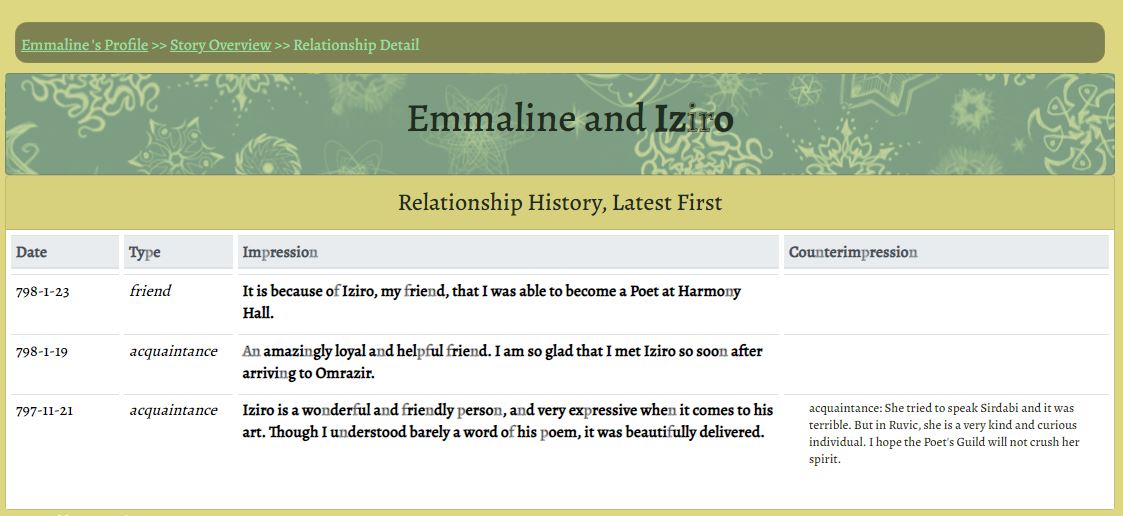
A development in a story arc can encompass as much or as little in terms of a character's story as you'd like. While you get experience for developing a story, it's capped per week to grant experience only a couple of times, so there is no incentive for players to do a great deal of unnecessary updating. We can update at whatever pace feels comfortable to us and meaningful to our character's story, and at this moment, we decided to incorporate several events into one development.
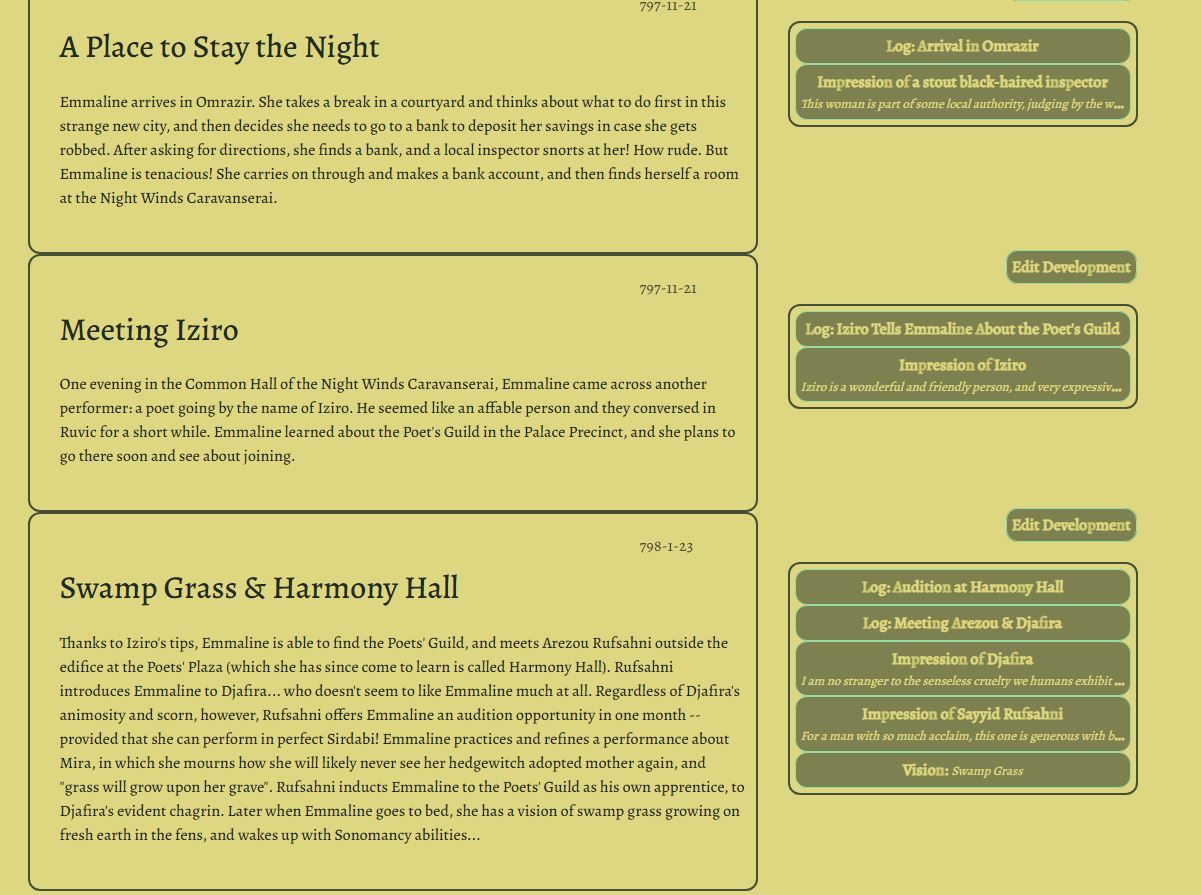
It definitely feels rewarding to be able to keep track of a character's story! Now we're all set for whatever comes next, and here's a hint as to what that may be... Djafira is up to no good, and Chapter 6 will introduce COMBAT.
Until next time!
Chapter 6: COMBAT
-- Intro:
We're working on a new MUD called Song of Avaria, using Evennia as a base code. Hopefully, the game will be opening for a public alpha six months from now: January 2024. This is the sixth in a series of showcases to display the features of our game. In order to properly exhibit the purpose of Song of Avaria, which doesn't quite fit into the existing molds, we're going to demonstrate gameplay by focusing on the story of a character: Emmaline.
- Cool News! A professional web developer who focuses on accessibility took a very thorough look over our site and game, and gave us a great deal of feedback that was incredibly helpful in making the game more accessible to vision-impaired players. Color themes are configurable now; the default one shown here is called "high-contrast". If anyone prefers the old "muted" one, they can switch to it in the settings. We've also added more text-based indicators of things like general wellness and roundtime in the game prompt, or asterisks as delineators for different sections of text, and more quick individual checks on metrics such as encumbrance, armor value, stats, skills, et cetera. Turning Evennia's native screenreader option on (during account creation, or through settings) will now ensure that a visually-impaired person gets a more tailored and comfortable experience. We're looking forward to learning more about accessibility from players in the future, and always hoping to improve the experience for any player.
-- Chapter 6: COMBAT
In our last chapter, Emmaline was inducted into the Poets' Guild, which allowed her to take up a job as a Poet at Harmony Hall. Because of that, she's able to easily make her rent and even bought an oud to improve her stringed instrument skills. Here, she's sitting in the garden of the Poets' Guild and playing her oud. Instruments can be played with a variety of commands, from POUND to STRUM, and each type of instrument will tend to make their own set of noises if played well (or other noises if played badly).
Some instruments (large bells, for example) can make quite loud sounds that will resonate over a number of rooms, much like a shout does. This oud is comparatively quiet. And while an instrument may have its mechanical play command, this is mostly intended for flavor and explorative play rather than as a real roleplay tool -- because it's always much more fun to emote the full expression of your character's music! Of course, one should strive to stay within realistic parameters in terms of describing their playing in relation to their mechanical skill level.
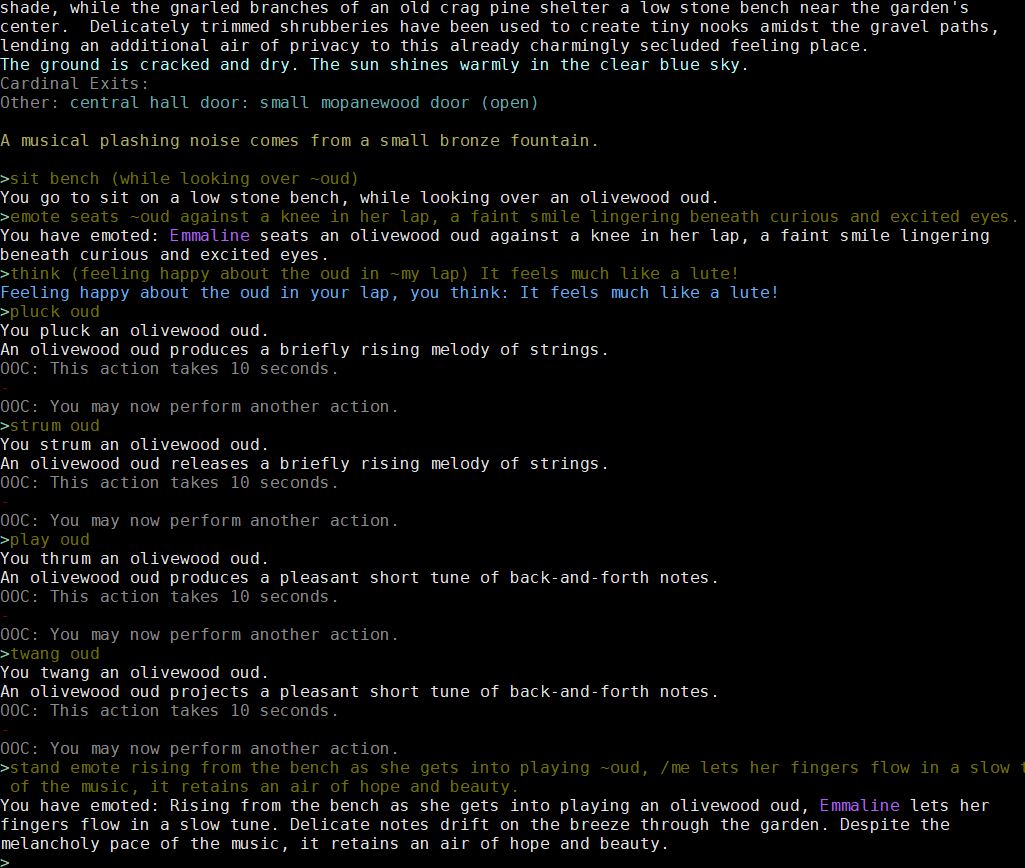
As we play the oud, we can see that Emmaline is relatively skilled at stringed instruments, as the sounds she is making are nice rather than jarring or discordant.
Djafira, the other newly inducted Poet whom we got to know over the last two posts, arrives and comes over to sit on the bench next to where Emmaline is playing. Because Emmaline does not trust the other woman, Djafira incurs roundtime by coming closer to the bench, which is Emmaline's own current vicinity. Roundtime is the convention we use to refer to the fact that some actions take time to complete, and thus you cannot execute another similarly time-consuming action until finished with the first. Djafira might be able to move close to Emmaline, but she cannot perform another action until her roundtime ends. This gives us the chance to move away quickly if we felt that Emmaline did not want to allow Djafira near her. But for now, we'll stay cautiously nearby and see what Djafira wants.
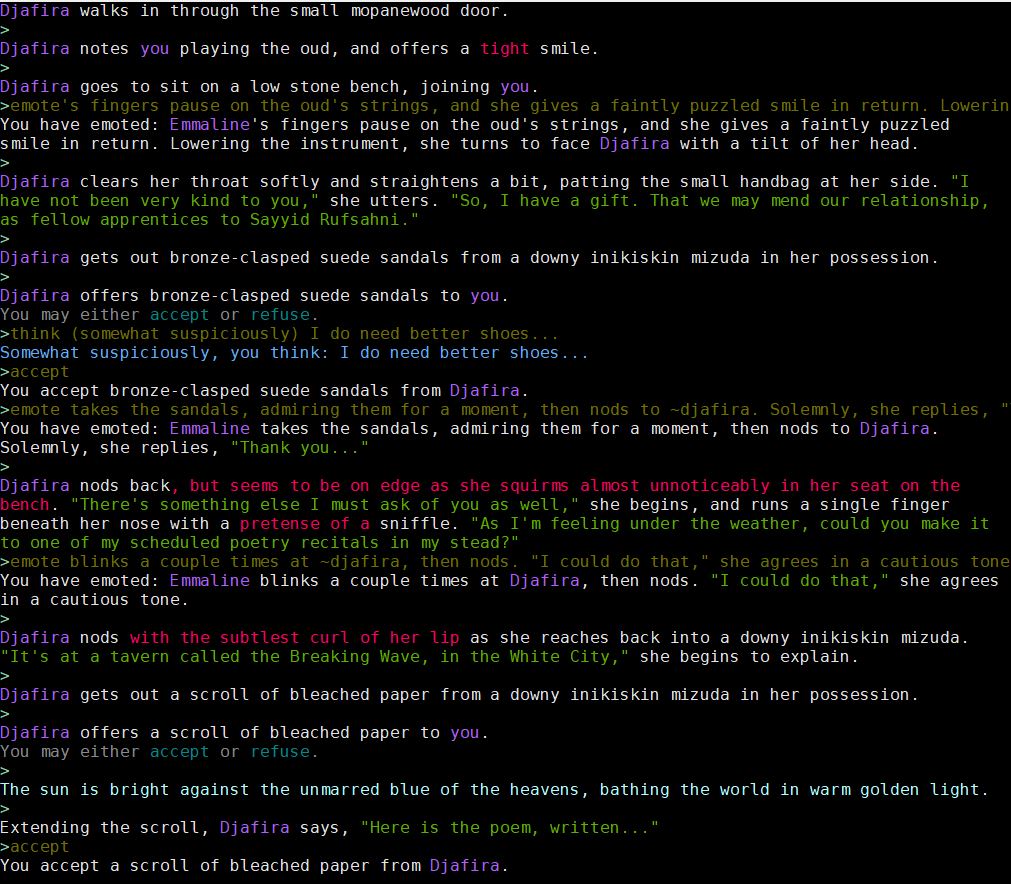
When someone gives you something, unless you trust them to a high degree, you will always have the chance to either ACCEPT or REFUSE the gift. Items can also be TOSSed, and if not caught in this instance (or dodged), they will just bonk off you and fall on the ground.
Since Djafira is trying to apologize for her past enmity, Emmaline accepts the gift. She is still a little suspicious though, because she can see Djafira's tells, and the other woman doesn't truly seem very apologetic. Djafira also asks Emmaline for a favor: she's feeling a bit under the weather, and needs Emmaline to go to a tavern called the Breaking Wave and recite a poem there. She passes over a piece of paper on which the poem is written.
Emmaline agrees to do this favor, puts on her new fancy shoes, and takes the paper.
As a side note: Many of the interactions you see from this point on are with automated NPCs that are operating off the logic in their own behavioral code. We have gone to some lengths to make these behaviors seem relatively organic, but only to the extent that this allows a player to suspend their disbelief in regards to the fact that NPCs are different from PCs. Our NPCs do not possess any real artificial intelligence -- not even to the degree of ChatGPT. They have certain behaviors, tendencies, phrases they might respond to, routines and home turf and activities they may habitually undertake, but they are still just traditional game NPCs. We are still at work adding in more behavior types for NPCs and refining their actions to be more sensible and characteristic.
Back in the story: By the time Emmaline is able to get around to the favor Djafira asked of her, it's late in the evening after sunset. Djafira provided some loose directions to the White City (which would be: "through the pillar-flanked gate north of the Plaza of the People"), but Emmaline soon finds that this particular neighborhood is a confusing maze of a place. Even the overheard ASCII map is intentionally not much help in some of the individual neighborhoods of Omrazir. It is purposefully not too easy to stumble off the main roads in the city, to keep new players from accidentally stepping into an area that may be dangerous.

Finding a fallen stele, Emmaline stands on top of it for a better view of the area. She tries to get her bearings, but it's still difficult to tell exactly where she is. This part of the city legitimately seems decrepit and broken down...
Maybe it's not such a good idea to wear expensive clothes here? Just as Emmaline is having that thought, a random event occurs. Random events are coded events that happen in rooms when PCs are present. Most of the time, it would be something simple and harmless like an atmospheric room echo, but sometimes -- if the situation is right, and the PC seems otherwise unoccupied -- the random event will be more serious.
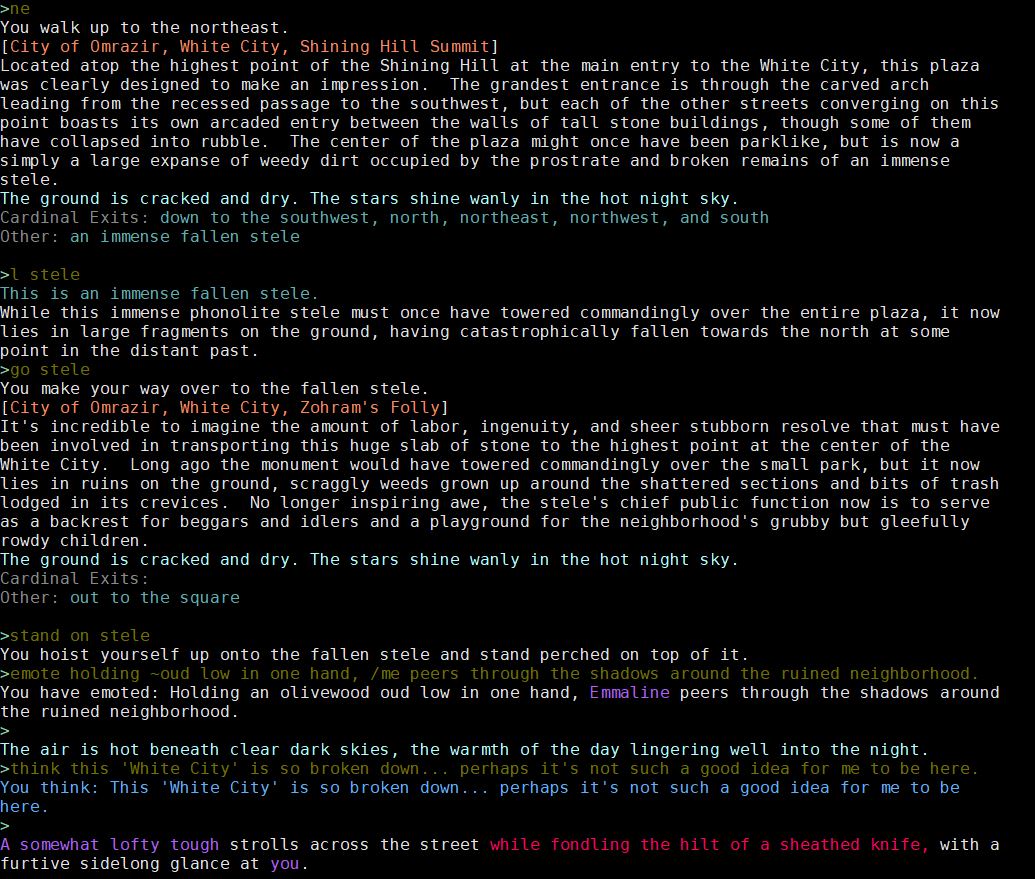
This time, it's very serious. Emmaline is in the White City, a desperately poor and virtually lawless district of Omrazir. Part of the difficulty in navigation here is attributable to the fact that this area is not meant for the inexperienced and unfamiliar. A small gang of thugs is approaching Emmaline, attracted by her expensive fripperies and apparent vulnerability. Combat is initiated -- they are clearly attempting to mug her. This mugging is an automated random event generated by the interplay of conditions.

Distance from others in a fight can affect a variety of things, such as the accuracy and damage of certain attacks, or whether some aggressive abilities can be used at all. There are five ranges of distances from another PC. The first is immediate vicinity, which would be in direct contact with them. Then comes general vicinity, which would mean at the same "place" in the room as them. Next there's location, which would mean being in the same room as them, but not necessarily at the same place. Lastly, there is near line-of-sight (one room away) and distant line-of-sight (two rooms away).
Because these ranges can be quite important strategically, there are many ways to change the distance between yourself and an opponent. You can RETREAT or CHARGE in a direction, you can PUSH people or PULL them, you can TACKLE them, GRAPPLE, or DRAG them. You can move your own self from one place to another, or simply DISTANCE an opponent by moving away.
In the beginning, Emmaline attempts to avoid an altercation by quickly edging away from the incoming locals. However, it doesn't quite help -- they've set determined eyes on her nicer things, and she doesn't belong in this neighborhood.
When combat starts, there is a "Writing Break" that allows the PCs involved to type an emote and/or consider what their character would do in that situation. While immersive method acting is of course our favorite style of roleplay, the out-of-character panic that can often accompany in-character physical conflict can sometimes impact roleplay in a negative fashion. In order to avoid that, combat in Avaria is peppered with "Writing Breaks" every time that anything notable happens: such as the initiation of a fight, a strong blow being dealt, first blood, an attempt to flee, any involved combatant falling to the ground, and so on. Note also how the prompt has changed to display more information.
Holding her oud, Emmaline has the sudden idea to attempt to dissuade the muggers through music. Last chapter we explained the concept of "Grounding", where most people who are still "grounded" in accepted reality know about and accept some types of magic, and might be wary of witches and sorcery, but dismiss a great many other kinds of magic as a fabrication or just something totally unlikely to happen to them. Emmaline hasn't completely lost her grounding yet, as we can see when we check the MAGIC command -- so the idea to play music would still be a rather goofy one in her mind.
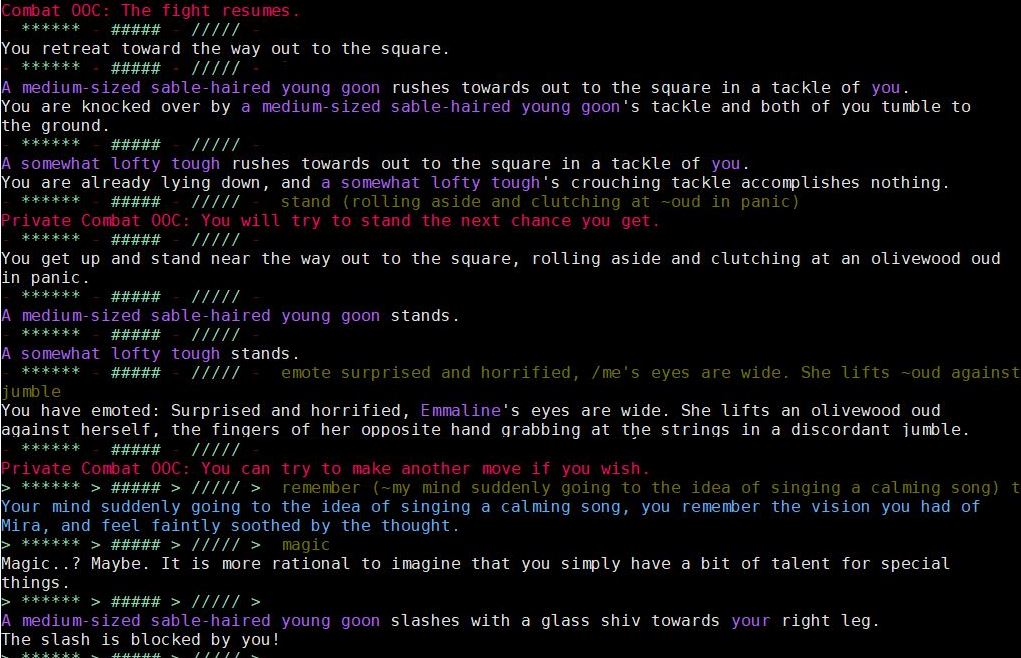
Regardless, this is what she tries to do -- she's desperate enough to try anything. Using her sonomancy ability to project a calming tone, Emmaline begins to sing and play her oud.

In addition to using a calming tone for her song, Emmaline also makes sure to adopt a defensive stance. It's possible to change a character's stance in and out of a fight, and each stance has its own strengths. Using a defensive stance enables someone to do a better job of dodging and blocking.
We also check our TENDENCY here: most games, especially DIKU-based RPIs, have fights that progress in a more automatic fashion. If you prefer that style of gameplay, you can set your character's tendency to be one of a few choices: fight, flight, or freeze. The "measured" tendency seen here is the default: if you have not input a specific command and it is your turn to move, you will just wait. If you had selected, for example, "fight" as a tendency, you would automatically perform a fighting move based off coded tactics similar to the NPCs.

The muggers don't seem to be affected much by Emmaline's song. This is because her very low sonomancy skill, her voice stat, and her will dice roll didn't outweigh their (likely entirely grounded) magic resistance. Dice rolls happen behind the scenes relatively often, and while there is a configuration setting that can be toggled to show combat dice rolls, it is turned off for the sake of immersion in Emmaline's case. These rolls incorporate stats (such as Voice, Resonance, Will, etc) and skills (such as Vocals, Sonomancy, Gnosis, etc). Other factors moderate the dice rolls, like stances, a character's general state of health, range, positions, and so on. At least, thanks to Emmaline's stance, she is able to avoid a lot of damage from the muggers' reckless attacks.
It might be a good idea to flee, but it can be difficult to get away when your opponent is right next to you -- if they're aggressive, then they will have a very good chance of blocking your escape route. Looking at the COMBAT display will give you a good overall view of your general combat metrics, including who else is in your vicinity. These different metrics can all affect the outcome of a fight in various ways.
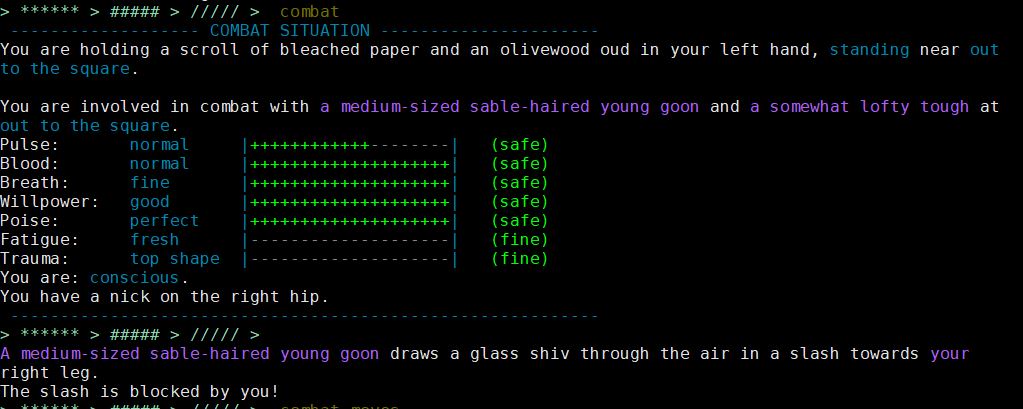
The prompt can also be configured to display many of these metrics. Shown here is the default combat prompt. When the fight was initiated, our regular prompt shifted to the combat version that shows stars and dashes as a small action bar. For visually impaired players this is not very helpful, so if someone has turned on the screenreader, the default prompt will give a health percentage readout and only show important alerts.
Anyway, Emmaline really wants to escape! So, she tries to push one of her opponents away. Actions performed during combat take roundtime. If you want to plan your next move, you can queue up a second move if you're already in combat.

SHOVE is one of the many commands useful for strategically changing positions in a fight. Emmaline manages to push the mugger away from her place in the room. She's standing as far from the stele as possible, hoping to go back out to the square -- but the mugger uses TACKLE to close the distance again very quickly! Bad timing.
Now, three muggers came out of the alleys surrounding Emmaline. So far, the third has just been watching, but now he breaks into the fight as well. A new person joining the fight will trigger a writing break, to allow players time to emote. Sometimes these writing breaks may feel like they last too long, while other times they may be too short for you to write the kind of emote you want.
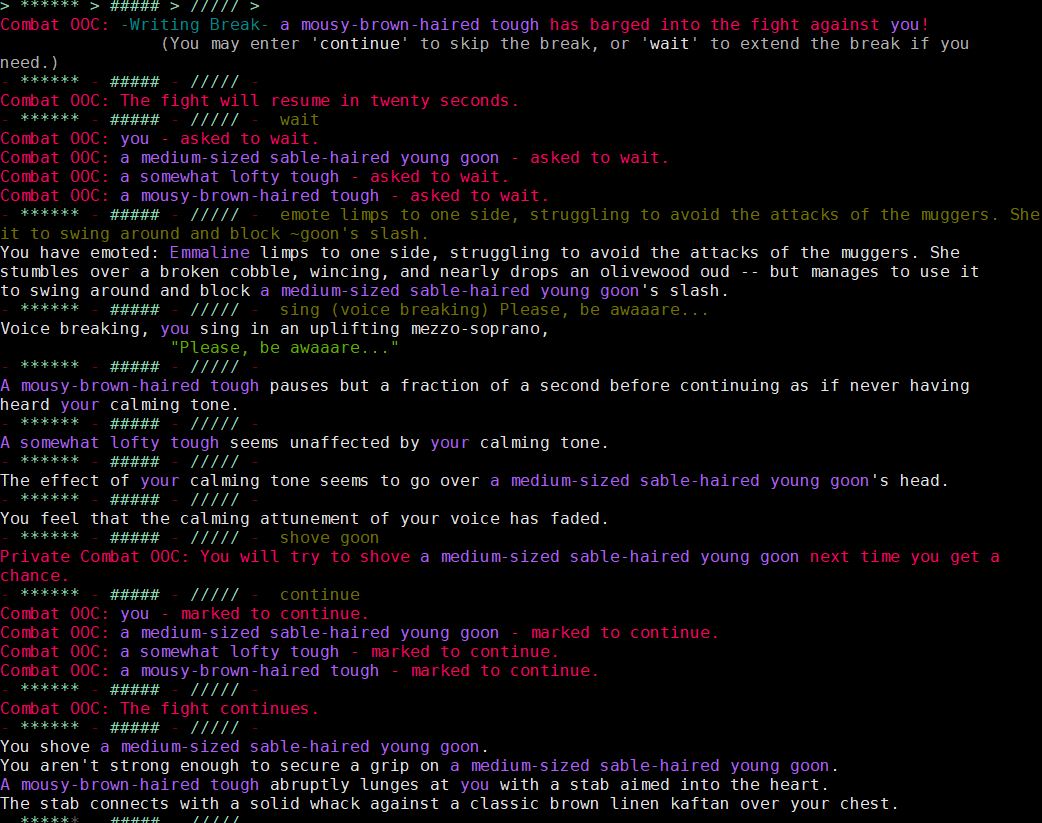
You can input WAIT to extend the writing break (once per break per person), or CONTINUE to end the break and go on with the fight (if everyone has opted to continue). We wanted to write an emote during this break, considering that Emmaline has a nick on her hip from the knife of one of the muggers, and we didn't have enough time to act this out. Since all these opponents are NPCs, they will automatically follow the cues of the PCs in the fight and either try to wait or continue depending on the PC's input.
Although we have plenty of time to write what we'd like, it doesn't appear that the fight is going very well for Emmaline. She's not strong enough to shove away a goon, her calming tone has faded without any success, and one of the toughs tried to stab her right in the heart! Thankfully, her well-made kaftan helped to turn the blow into something less catastrophic. Raiment items can get in the way of attacks to covered body parts, and divert some of the damage to themselves. Different equipment types can divert more damage or stand up to damage better, depending on their material.
Maybe there's something else we can do...
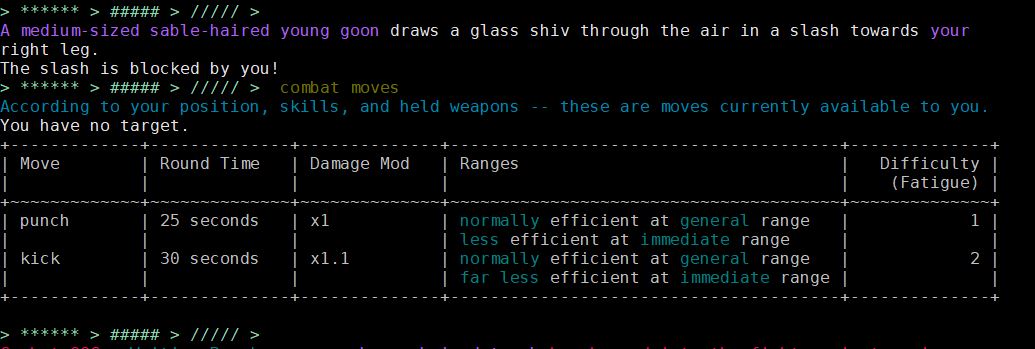
We can look to see what moves might be available to us in a fight, depending on the weapon we're wielding and the abilities we have, by checking COMBAT MOVES. It doesn't seem like Emmaline can do much right now beyond punching or kicking. But what if she wants to whack people with her oud? She can do that much at least. Any wielded object can be used to WHACK someone... but the reason that "whack" doesn't show up in her list of available combat moves is because she isn't actually wielding the oud, she is currently only holding it. Shifting her grip will take a moment - costing her a turn in combat, and causing a short delay before her next move (though we can still freely input the command, and have it executed when our combat roundtime completes).
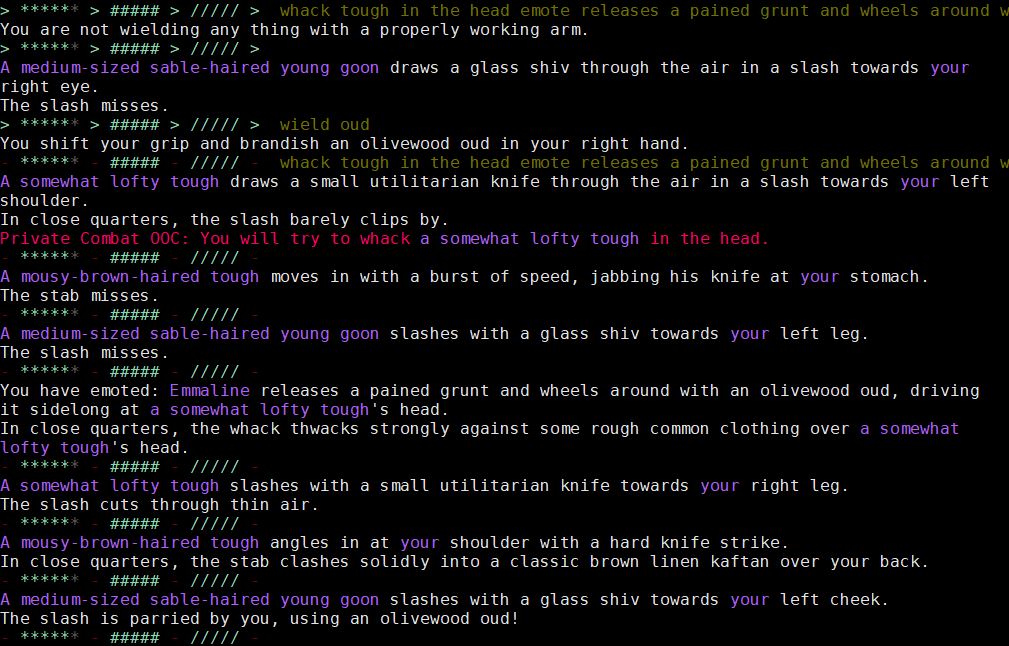
When using an attack in a fight, such as PUNCH, KICK, or WHACK (or other attacks using weapons or abilities, like the SLASH and STAB used by the muggers) you can specify a particular body part of your opponent to aim for. You can also substitute the generic attack emote with a custom-written emote of your own.
Here, Emmaline tries to WHACK the TOUGH IN THE HEAD, while substituting a more flavorful emote for the generic one. She lands a decent blow! Unfortunately, she's surrounded. One minstrel using a musical instrument as a weapon can't honestly defend against three seasoned street bandits.
Having suffered a couple of unlucky hits, Emmaline drops to her knees. Even her kaftan has been ruined by the damage it has taken. Trauma is the metric that governs how injured a character has become. It can cause a character to collapse, like Emmaline has here. The "traumatized" alert will show up in the prompt after Emmaline is struck that hard, signifying that she's in very bad physical shape.

Sadly, Emmaline is not a strong enough fighter, and certainly not advanced enough in bardic magic, to put a stop to this altercation. She tries to get back up in order to flee, but immediately gets knocked down again. Being on the ground, she then tries to crawl away. But crawling takes a bit of time, and time is something she doesn't have enough of. The next strike not only knocks her out, but... she's dying.
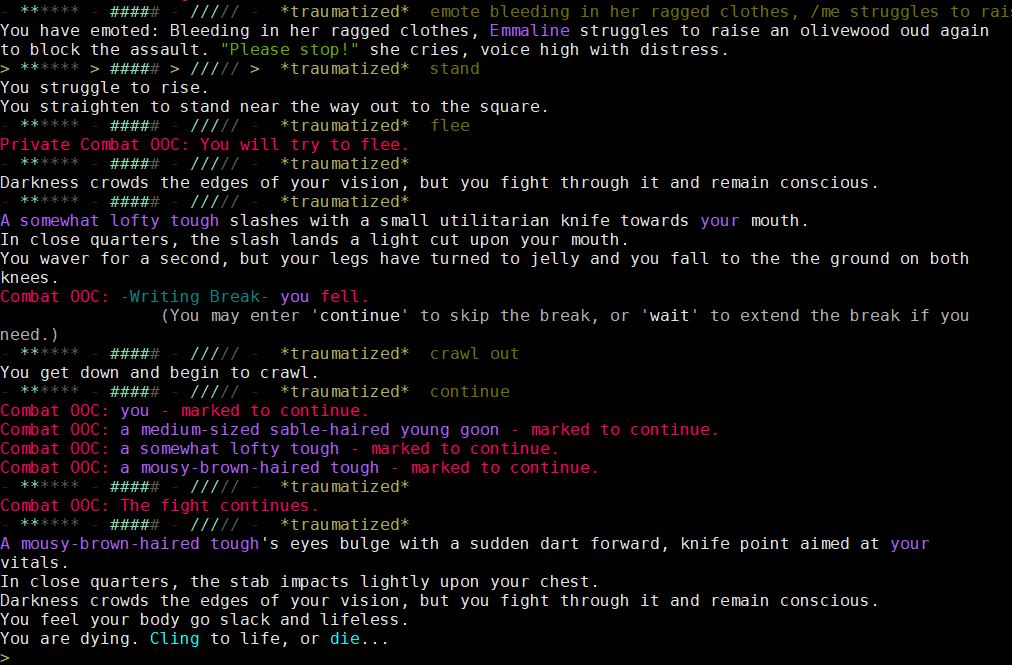
Bleeding as she is and in a hostile and unfamiliar environment, the most likely scenario is that Emmaline is going to die. A player with a character in this condition can still get a (dimmer) sense of what is happening in the room, and is free to write emotes or dreams... but an unconscious character still takes some time to be able to wake up. Some don't wake up at all.
The muggers take Emmaline's fancy clothes and any valuable possessions, leaving her penniless in her raggedy shift. We just got that oud! How disappointing. It's natural to feel a little bit of emotional crossover in immersive roleplaying situations like this, but it's also important for players to be capable of retaining perspective. We want to be clear about where we fall on the consent spectrum so that potential players can understand whether they might enjoy the game or they might not. Some loss is inevitable when there are in-character consequences for conflict and decisions. The game is mostly non-consent in terms of these kinds of consequences, but this also means there can be a lot of engaging story outcomes as a result. We don't want these to truly function as punishments to the player rather than to the character, though they might sometimes feel like setbacks. But it's helpful to keep in mind that every setback can be an opportunity for an inspiring narrative.
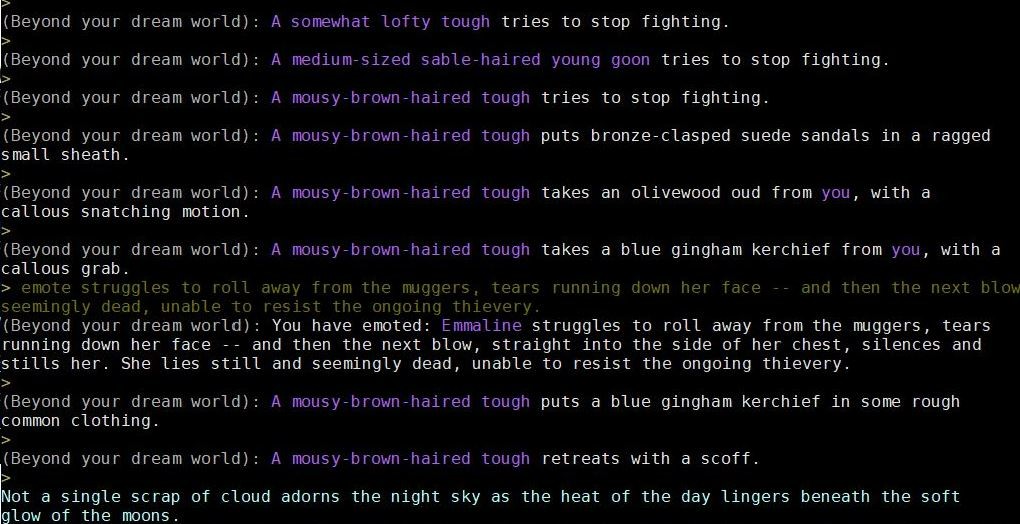
No matter the conflict, character death -- which is generally, though not always, the ending to a character's story -- must usually be consented to in order to happen. When a character "dies", if there is any chance at all that they might miraculously survive, the player will get the choice to either CLING to life or DIE, by entering those commands.
In this scenario, it might be realistic for Emmaline to die. But that would be an unsatisfying end to her story, and that's not what we want. The choice is in our hands, and we CLING to life.
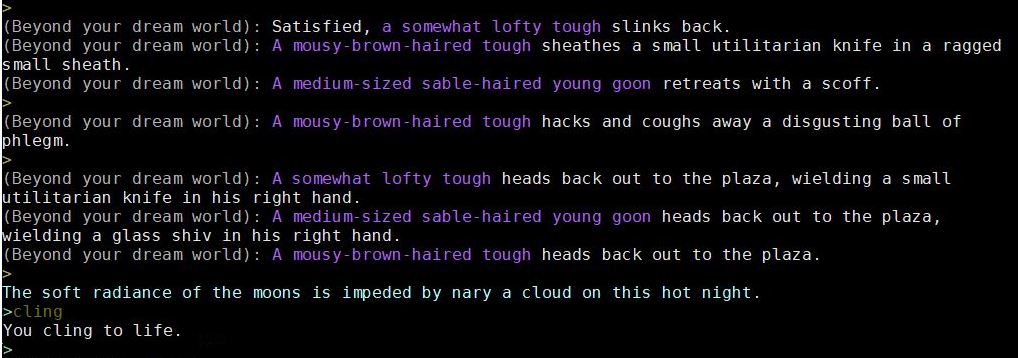
Choosing to die moves characters on to the next world (to become a ghost, and go to the Otherland). Clinging to life allows the dying to continue living, but they will likely be handicapped in one way or another. It may be possible to eventually cure a handicap through stories involving magic or the supernatural, or the long-term efforts of an outstandingly skilled healer. But these consequences are generally impactful and lasting enough that should a character engage in risky behavior, repeatedly having near-death experiences and clinging to life, their story will involve the realistic outcome of their becoming a person who has somehow survived but is broken in many ways. Ultimately, this helps address the potential issue of long-term players becoming nearly invincible in the setting -- while simultaneously providing an opportunity for players who prefer to roleplay character stories comparable in length to a real lifetime, where a player may never see their characters actually die.
For those who do wish to roleplay through the meaningful death of a character, there are still a few different paths they can follow. The character can continue existing as a ghost, or as a distant memory in the Otherland, or they can pass on into the inaccessible final mystery of the afterlife. Reaching these stages of the afterlife can be accomplished by using the MOVE ON command, progressively bringing a spirit through each of these phases of existence until at the very end the character is deleted from the game database. Should one never wish their character to complete the process of moving on, however, they can continue to exist indefinitely in Avaria's Purgatory: the various realms of the Otherland, which can potentially be accessed, with great effort and skill, through the dreams of the living.
The purgatory states can soften the blow of losing a beloved character, and even provide some additional plot twists for both that character and their surviving friends and enemies. The end of a character's story may be a real tearjerker, but hopefully in a good way, not as a traumatic and wrenching blow to the gut. We don't want to brutalize the emotions of any player -- the intention is that playing a game should be an enjoyable experience, with closure in the ending and a feeling of contentment for a story well-played.
But what this ultimately means for Emmaline is that she cannot escape her altercation with the White City thugs scot-free. She is still in a very perilous situation. As we mentioned above, sometimes the injuries that have the ability to cause death can also create severe permanent handicaps in those who choose to live, which might manifest as stat debuffs, loss of limbs, persistent illnesses, and other such tangible physical consequences. Despite clinging to life, Emmaline is unable to return to consciousness immediately. She may very well simply bleed out again.
If we quit the game, she won't die while we're disconnected... but it's still a cliffhanger! Stay tuned for Chapter 7, where we'll showcase healing and further intrigue.
Chapter 7: HEALING
-- Intro:
We're working on a new MUD called Song of Avaria, using Evennia as a base code. Hopefully, the game will be opening for a public alpha five months from now: January 2024. This is the seventh in a series of showcases to display the features of our game. In order to properly exhibit the purpose of Song of Avaria, which doesn't quite fit into the existing molds, we're going to demonstrate gameplay by focusing on the story of a character: Emmaline.
-- Chapter 7: INTRIGUE
Last time, we abandoned Emmaline at a critical juncture: left for dead in the White City after a violent mugging. Despite receiving near-lethal wounds, Emmaline clung to life, and was able to hold on for a few hours...

Every so often, an unconscious character will get a chance to regain consciousness. In this case, Emmaline was not able to do so, as her injuries were extremely severe. She is also still bleeding, which continually worsens her condition.
Eventually however, a kind person passes by and ends up carrying her to a nearby hospital. Through all this we can see his emotes, and even write our own if we want, but we cannot hear anything that is being said. An unconscious character is incapable of eavesdropping on any conversation, even though it's quite possible for the player of an unconscious character to react in other ways and to some extent still roleplay with others in the room.
The person who comes to carry Emmaline to the hospital could have been an NPC generated by the fact that she was dying inside the city limits, without any PCs nearby. Other sorts of automated events can also happen, but in all cases they will strive to avoid clashing with any PC activity, and only exist in case there is no PC activity relevant to the situation. For example, the "good samaritan" event takes into account how many other PCs are currently active in the zone, and delays the potential approach of the helper NPC accordingly, to give other PCs a chance to happen upon the scene first.
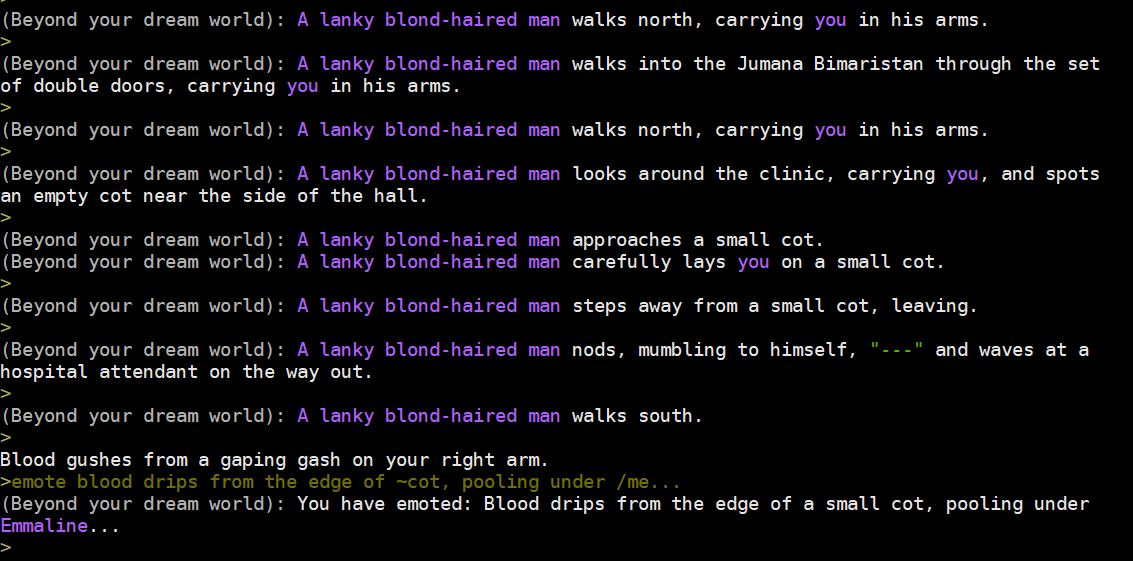
The unknown fellow who brought Emmaline to the hospital lays her on a cot and goes away, knowing that someone will likely come to treat her soon. When carrying another PC, it is possible to put them down in several different ways -- to place them gently, to drop them roughly, or to seat or lay them on local furniture objects.
Emmaline is safely at the hospital now, but if she went untreated, it's possible she could just bleed to death all over again. Should any PCs who work at the clinic be online, or if any active PCs are in the zone with the coded reputation of a healer, the presence of an injured person in the hospital's entry hall will trigger NPCs to automatically send those PCs a courier stating that there is a patient waiting.
However, in the absence of any PCs, an NPC is capable of performing the necessary treatment -- well enough to save a life, though perhaps not well enough to ensure the speediest recovery. We want injury recovery to feel realistic and be easy to roleplay about, and also give medics many roleplay opportunities.
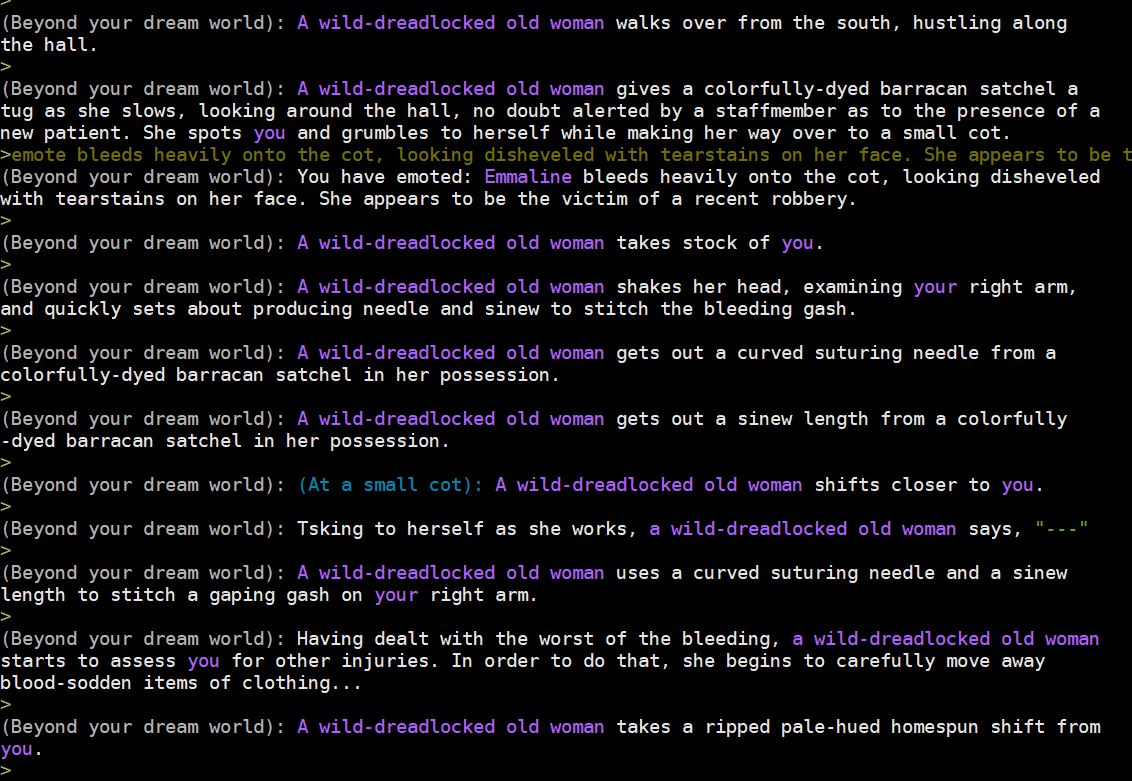
In this case, the person who treats Emmaline happens to be another foreigner to Omrazir. Though there's no chance to exchange names, this roleplayed interaction comes complete with a new relationship. Although the main goal of this healer character is to save Emmaline's life, and she has to leave before Emmaline wakes up, healing roleplay in Song of Avaria can evolve into a long-term dynamic and doesn't exist for solely mechanical reasons. All the coded systems exist for the sake of encouraging organic roleplay!
First, the wild-dreadlocked healer notices the largest wound, which is on Emmaline's arm and thus already revealed due to Emmaline's shift being short-sleeved. For the nick on Emmaline's hip, the healer must uncover the wound by removing Emmaline's shift. If Emmaline were awake, she would be capable of resisting any attempts at treating her in any way, but she is still unconscious.
The first step is to stitch the open wound, however. There are different kinds of wounds, and something like a broken bone or dislocated joint would require other measures. A large enough wound caused by a sharp weapon is going to bleed, however, and the bleeding has to be stopped. Someone could press a hand to it, tie a tourniquet, or cauterize it -- but stitching is the best and longest-lasting method.
The next step is to put some kind of ointment or medication on the wound. Many things can be used here, with varying effects -- alcohol, saltwater, honey, moss. A refined physician might use a carefully-prepared herbal ointment. Different treatments have varying efficacies, and it appears that this particular medic is using honey. A treatment does two things: it speeds up the healing process, and it prevents infection from deeply taking root. It doesn't last forever, but it will last longer if a bandage is put on...
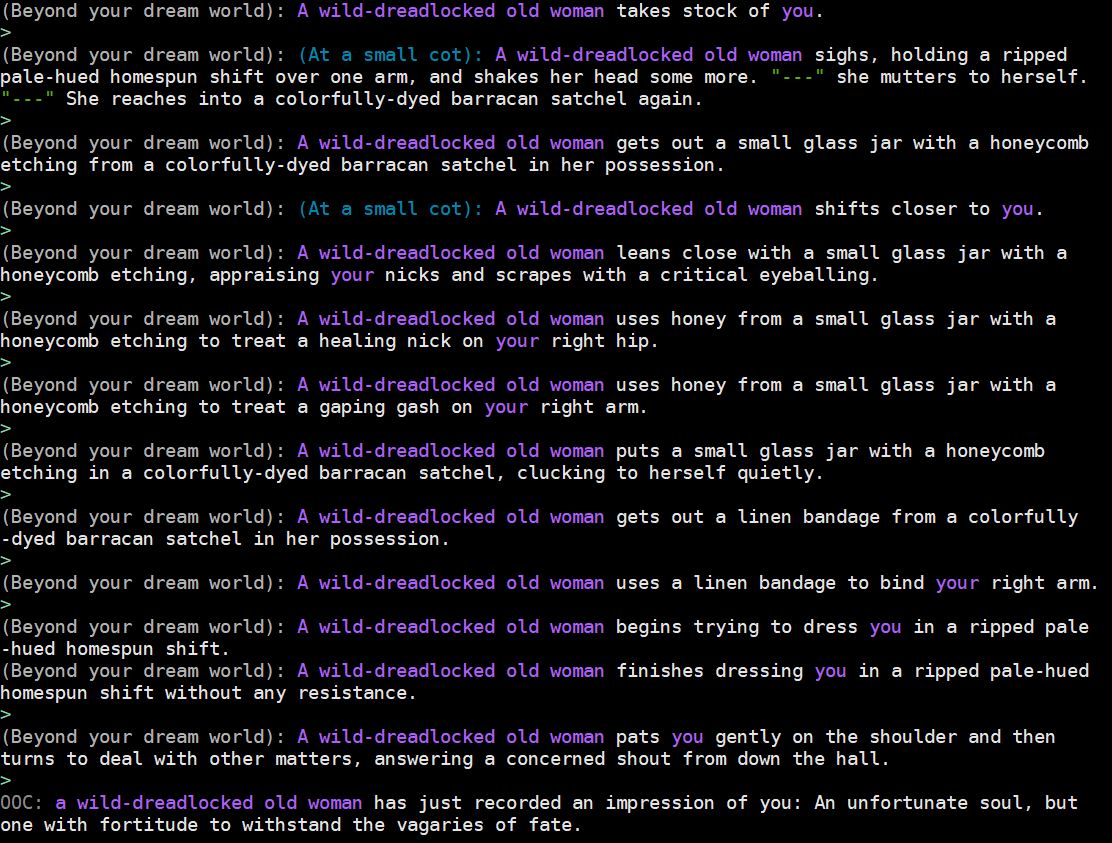
And putting on a bandage is the last step. After Emmaline has been treated the healer departs, and eventually Emmaline is able to wake up. It's possible to check the COMBAT or HEALTH command outside of combat to get a sense of those basic vital metrics, but once fully awake we can use the DIAGNOSE command to take better stock of our condition, and to look more closely at certain wounds if we want.
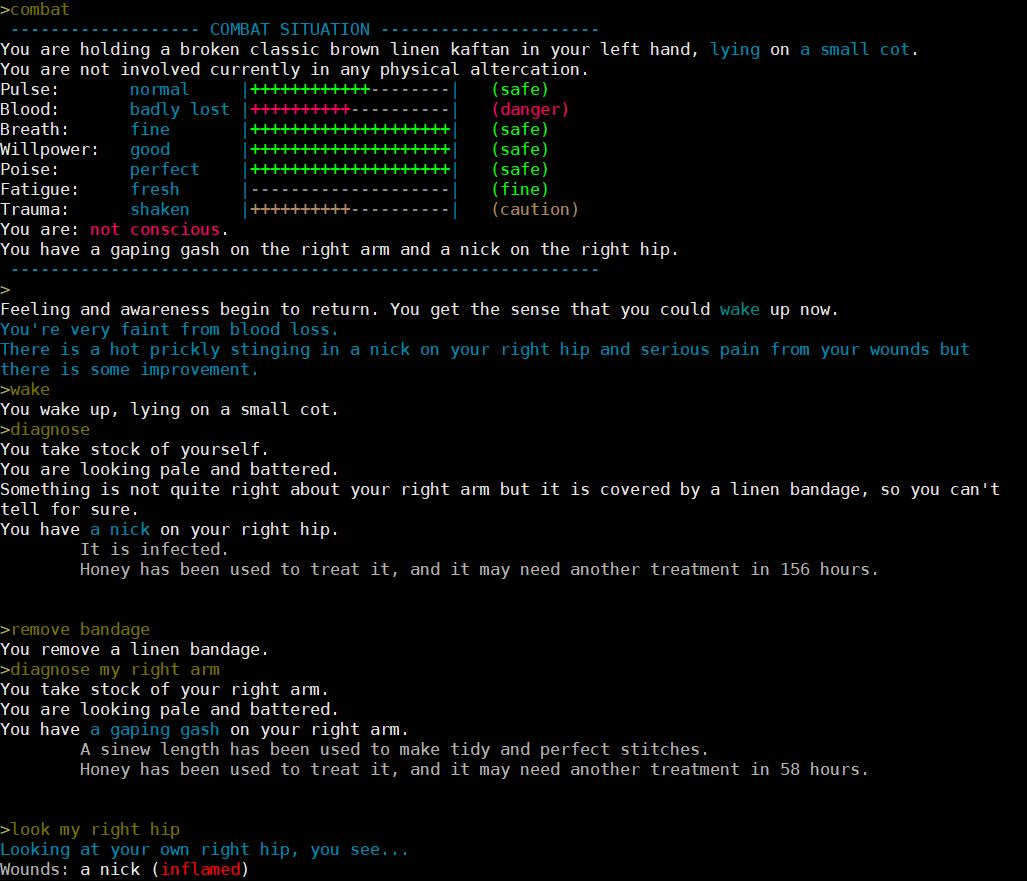
It's possible for injuries to get infected, based on dirtiness levels and the overall constitution of the injured person. Emmaline is fairly dirty because she was bleeding all over herself and the wild-dreadlocked woman did not also help to clean her up. The hospital's a busy place, after all!
However, since the injury is treated with a working antiseptic, the infection will recede soon. If an infection does take hold, then the wound will stop healing and is more likely to leave behind bad scars even if it does eventually heal. Infections are only one of the things that can go wrong with mistreated injuries.
Taking certain actions can put an injured character at risk of complications or setbacks, but right now Emmaline isn't thinking about that -- she is very alarmed and just wants to get back to somewhere that feels familiar and safe. Thankfully, her stitches don't tear when she chooses to get up from her cot and leave the clinic. However, she's too weak to carry everything she has with her... and, in her confusion and anxiety, she's forced to leave her knapsack behind if she wants to move.
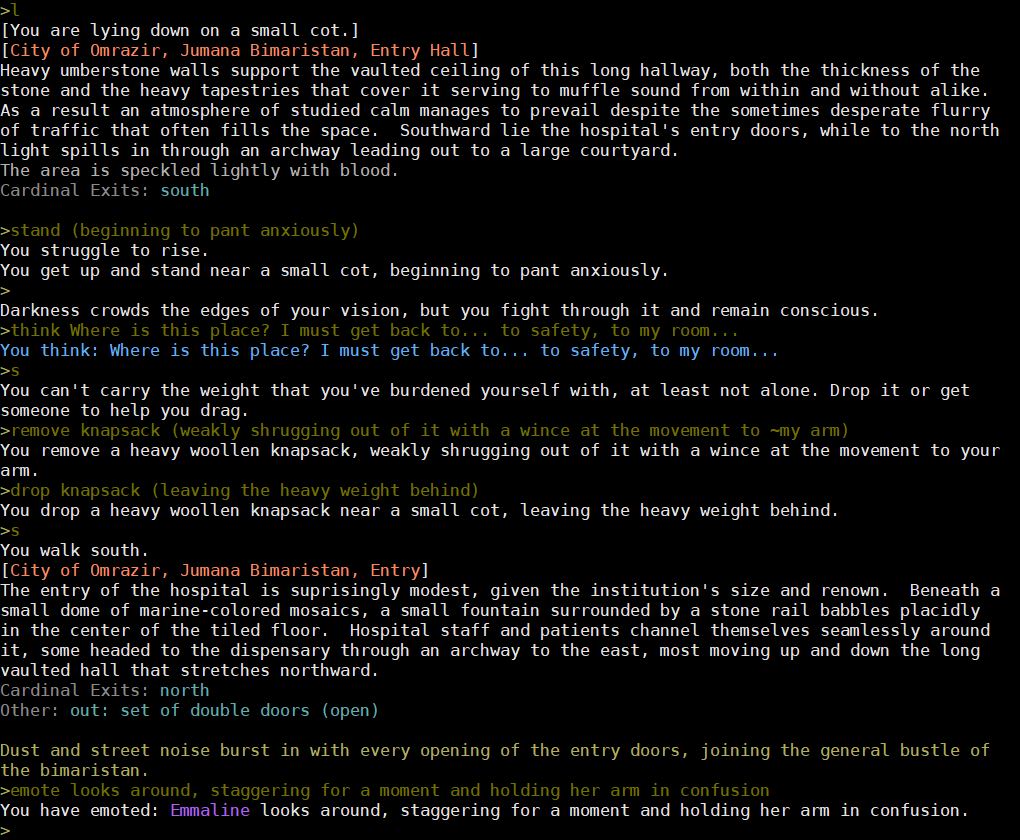
Emmaline manages to get back to the caravanserai she's been staying at, and makes it up to her room. This is a place where she feels more safe and can spend her time recovering from the traumatic incident she's just suffered. She thinks it's likely that Djafira tricked her into venturing into that dangerous neighborhood in expensive clothes that would make her look out of place and vulnerable, and she wants to know the truth for sure. Thankfully she puts the bandage back on her arm, too -- binding wounds will prolong the duration of whatever current treatment is on the injury.
A few days pass, in which Emmaline discusses the situation with her friend Iziro. She asks if there is a force for keeping the law and administering justice in Omrazir, which might be able to keep her safe and find out if Djafira conspired to murder her. Iziro tells Emmaline that the primary local peacekeepers are the Omrazir Customs Authority.
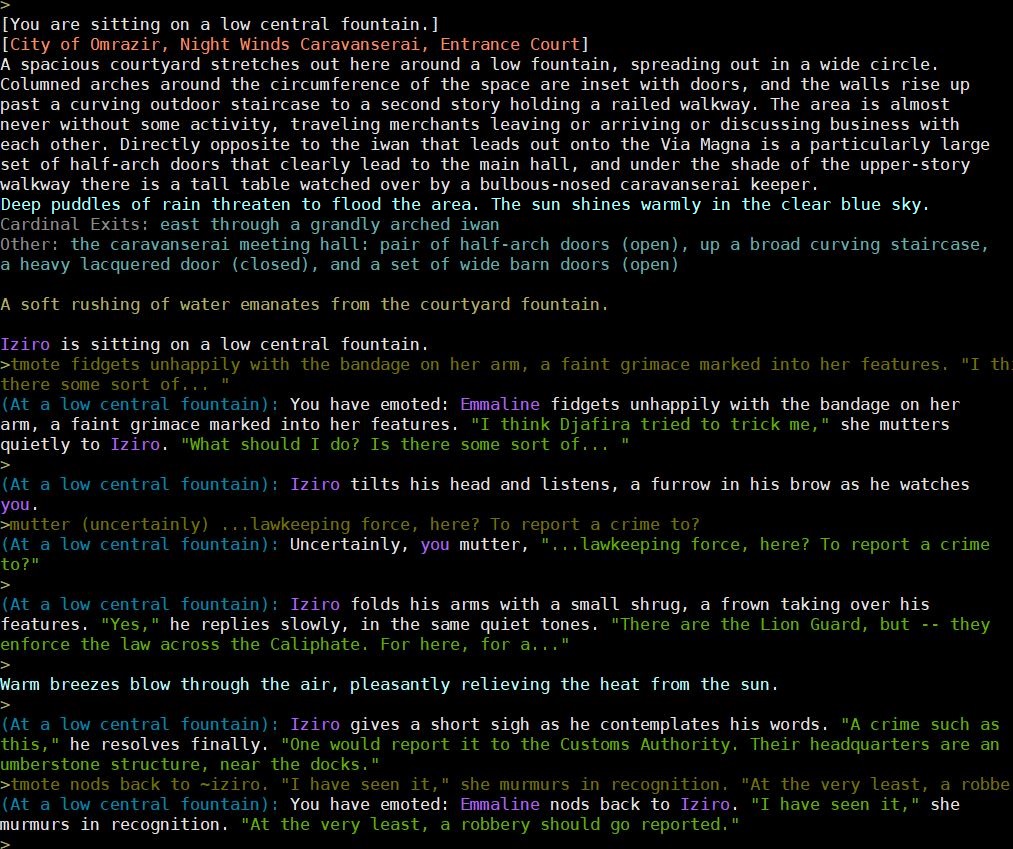
After hearing about the Customs Authority, Emmaline remembers the unfriendly inspector she passed outside the umberstone building near the docks, when she first arrived in Omrazir. That seems so long ago now! The next day, Emmaline is feeling up for a walk, and she makes her way to the remembered building and finds the inspector outside again. She introduces herself and informs the inspector (now known as Waraqa Raqeeb) about her suspicions.

Although Waraqa promises to investigate, Emmaline wants to do a little investigating of her own. She's having trouble understanding Djafira's motives, so she asks around to see if she can learn anything about the other Poets' Guild apprentice.
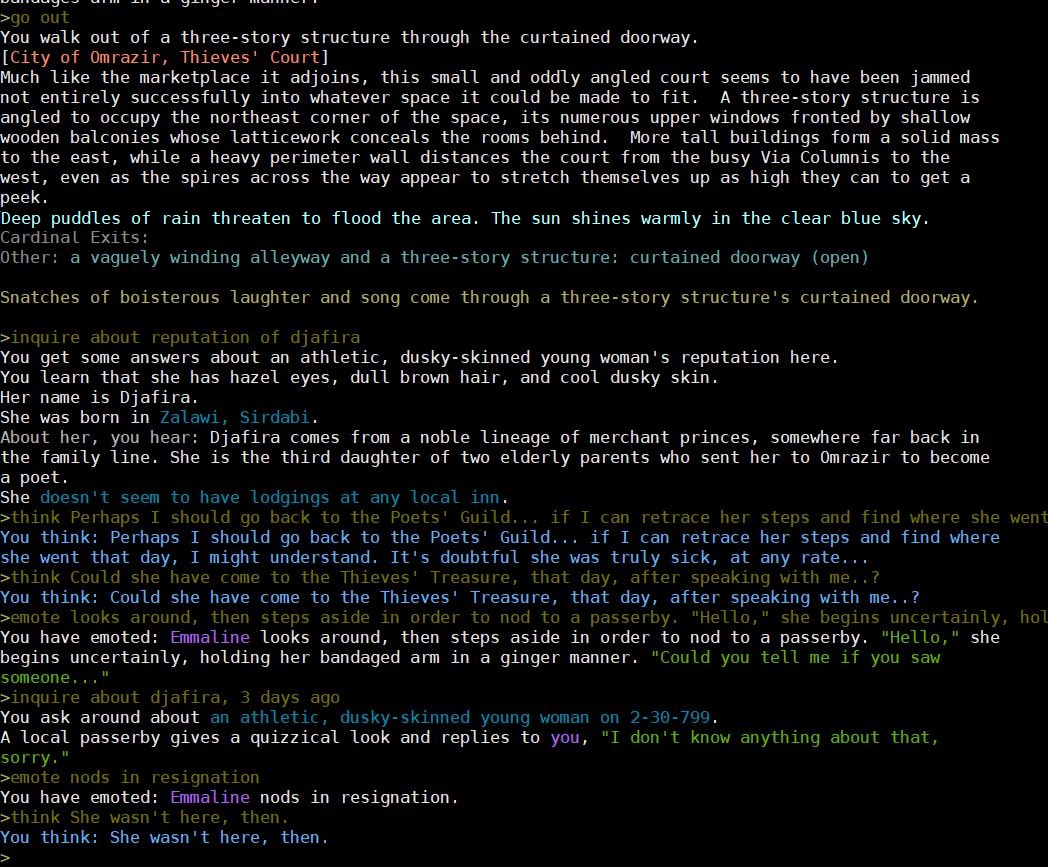
The virtual NPCs in this public area know some basic facts about Djafira that they're willing to share with Emmaline. Someone with a higher magnetism roll might be able to get more information out of the VNPCs, but for now we learn simply that Djafira comes from a relatively well-to-do family. General inquiry about someone will make the local VNPCs relate things that they have witnessed, but inquiring specifically about a person's reputation will return something of a public profile on that person.
Emmaline wants to know much more... she wants to know what Djafira was doing on the night that Emmaline was being mugged. She asks about that specific night, but the virtual NPCs don't seem to know anything.
That doesn't necessarily mean that Djafira wasn't up to something. But it does mean that she probably wasn't in this area. Emmaline decides that if she wants to know where Djafira went, she will have to trace the other woman's movements from the Poets' Guild on the afternoon of that fateful day.
At the guild, Emmaline makes a cursory attempt at looking for tracks in the area. Her Outdoorsmanship skill, which governs tracking, is fairly decent -- but she's still unable to find Djafira's tracks from the previous week. It's been several days, in a busy city environment, and plenty of foot traffic has gone through in the meantime.

A city has something the wilderness doesn't, though, which is a constant VNPC populace. Emmaline returns to her inquiries and begins to ask after more specifics: did anyone see a woman matching Djafira's description on that day? When using the INQUIRE command, it's possible to specify a certain number of days ago. By asking around in this manner, Emmaline is able to retrace Djafira's movements.
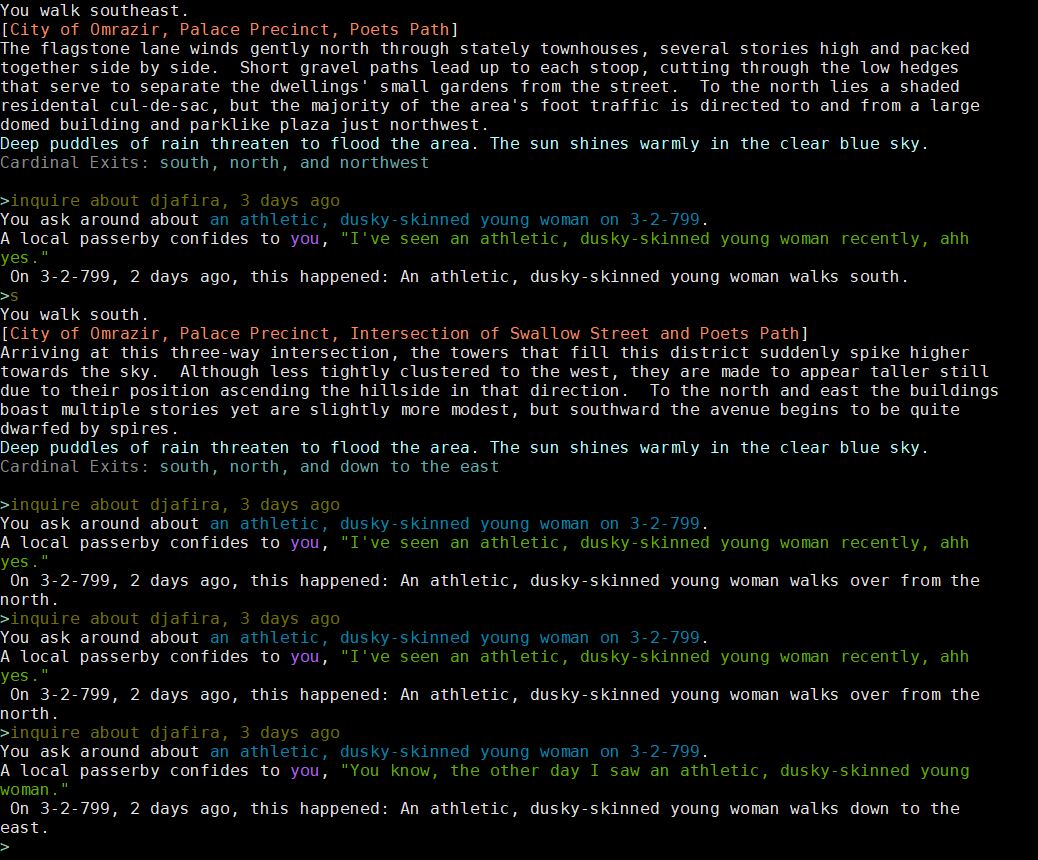
As seen in the image above, the local VNPCs tend to bring up random information, so an investigator may need to be persistent in their inquiries to find out what they're searching for. In this case, we want to know where Djafira went -- not where she came from.
Most emotes don't get captured by the rumor system, because we don't want players to shy away from roleplaying in public areas just because they would prefer it if VNPCs don't repeat everything they say or do. However, system emotes -- such as movement, picking things up, dropping things, joining a place, starting a fight, and so on -- get logged into the collective memory of the local VNPCs in a "room history" of sorts. This history can then be asked about up to thirty days in the past, but eventually the VNPCs will forget.
If a player wants their freeform emote to be logged into the room history, they can use the command RUMOTE instead of EMOTE and it will be recorded as a source of rumor material -- everything else about the command is identical to a regular emote in function.
Of course, asking around about a person also gets remembered by local VNPCs! If greater subtlety is desired in one's inquiries, there is also an EAVESDROP command, which will allow an investigator the chance to simply overhear something more anonymously. This can help keep your inquiries a secret, but it is much more difficult to happen upon the precise thing you'd like to hear about.
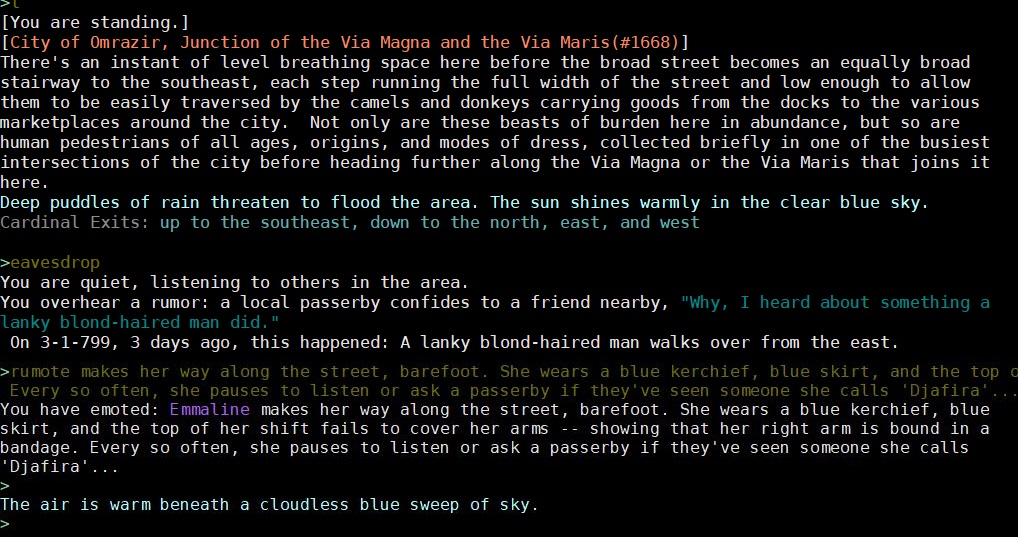
It appears that Djafira went to sit on the bench in the garden court during the time at which Emmaline must have been headed to the White City. Since Djafira knew the hour that she had given Emmaline for her supposedly scheduled performance, she would have been aware that just then her fellow apprentice was likely in mortal peril.
Here, Emmaline learns that Djafira seemed guilty -- but was also muttering to herself, perhaps trying to assuage that guilt. It's difficult to tell through the secondhand account of the VNPC, and Emmaline still doesn't understand what Djafira's motive could have been...
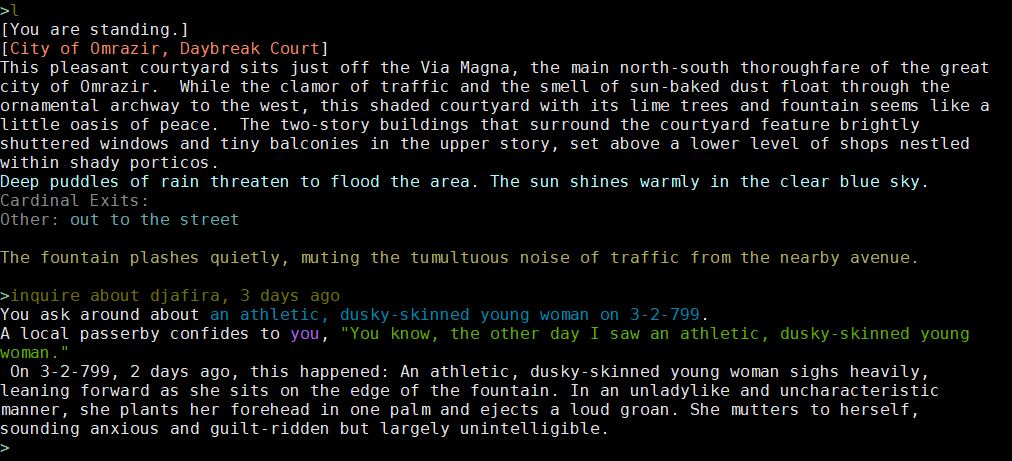
But just then, Waraqa sends Emmaline a message. She has confirmed that Djafira indeed had no scheduled performance whatsoever at the Breaking Wave! It was all a lie. Waraqa is going to arrest Djafira and wants Emmaline to stay off the streets (likely presuming that Emmaline is still in danger of being murdered somehow).
Emmaline, kind soul that she is, feels a little bad. Waraqa doesn't seem like the forgiving type, and now Emmaline has gotten her fellow apprentice in a lot of trouble. But, Djafira did try to have her killed, so at least she can feel that any consequences Djafira suffers are justified. Right..?
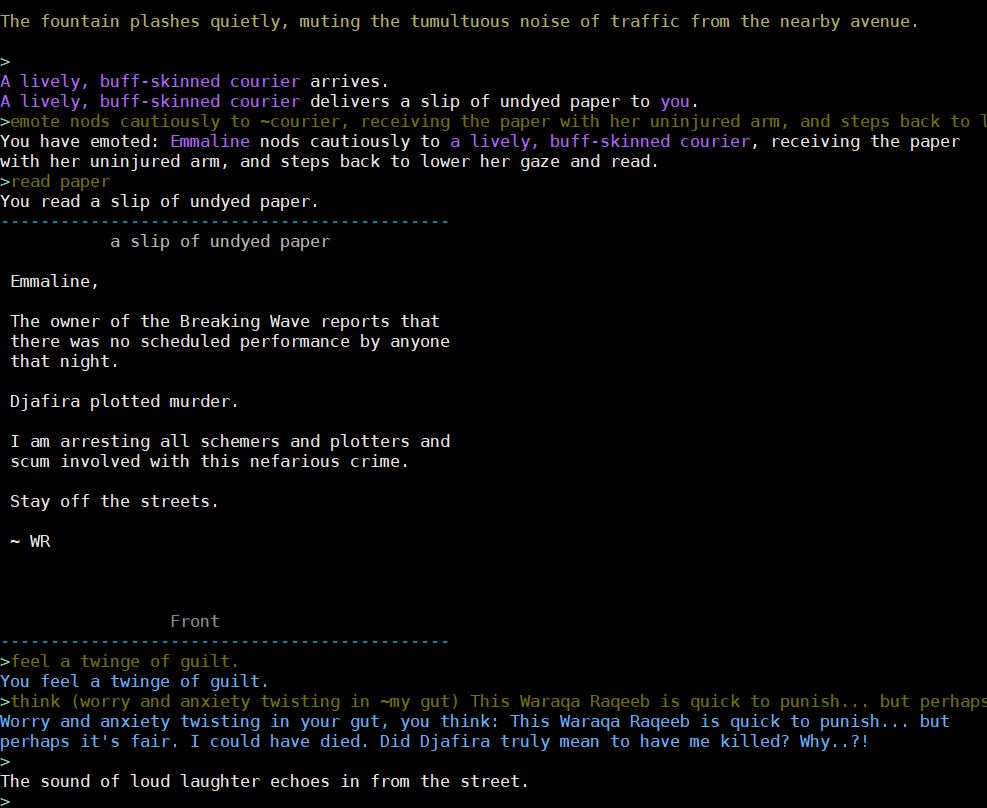
It doesn't take long for Waraqa to have Djafira arrested. This goes out in the form of a zone rumor, which means that rather than the message being confined to one room, all VNPCs over the whole Greater Omrazir Area may have heard about the warrant out for Djafira's arrest.
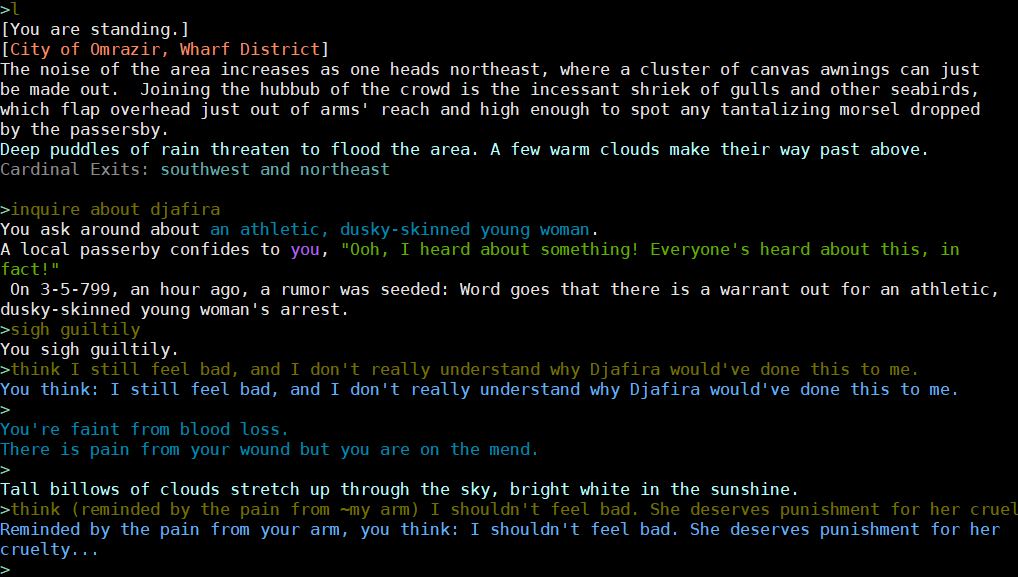
Zone-wide rumors get posted on the IC Rumors board on the Avaria forums as well. Conversely, posting on that board on the forums will create zone-wide rumors in-game, within whichever zone your character currently resides. Similarly, zone-wide rumors can be purposefully seeded by characters within the game, but in that case it will be obvious to others who has started that rumor.
We want rumors to function as story hooks, allowing more characters to get involved in ongoing plots, so we've endeavored to make them functional and easy to engage with. It's worth noting that replies to a forum post don't get posted as rumors on their own; however, the Rumors board on the forum does count as an "IC Board" which grants Presence or EXP for posting on.
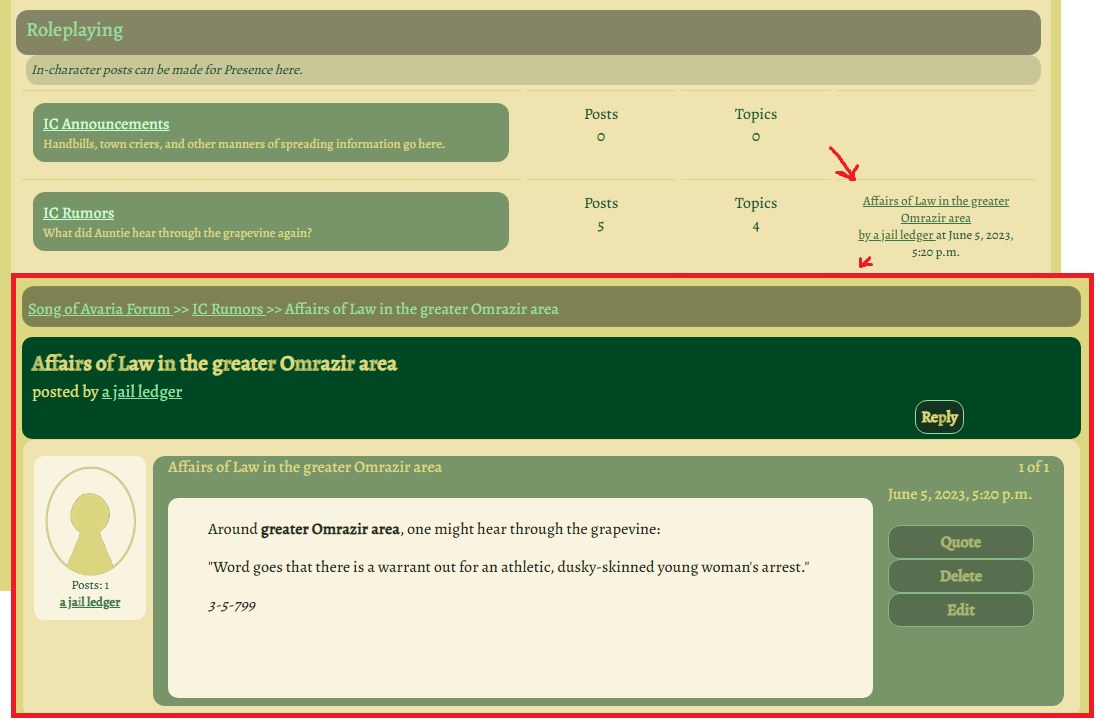
Emmaline feels as though she is safe now, but there is a nagging discomfort in the back of her mind. She still doesn't understand Djafira, and she's worried that despite her time spent in Omrazir, she knows very little of the city and the culture and she's far out of her depth.
This uneasy sense is augmented by the fact that soon after, she receives a summons from her Poet mentor Rufsahni. While couriers will not enter non-public locations, if a character is in their own locally-known living accommodations, the courier will stop by and leave any delivery in the hall (or call it through the door, if it's a verbal message).

When Emmaline goes to meet Rufsahni at Harmony Hall, she learns he is very disappointed that she chose to take her troubles to the Custom Inspectors, rather than turning to him first. In fact, he's so unhappy that he reluctantly boots her from the Poets' Guild over the entire ordeal.
The Poets' Guild is a refined institution, he explains to Emmaline. If she had brought the matter of Djafira's scheme to him directly, he could have addressed it in his capacity as their mentor as well as a person of significant clout in the city -- but now she has brought disgrace on him, and on the entire guild. The decision is not even in his hands anymore, as it is impossible for Emmaline to remain a Poet after this kind of drama.
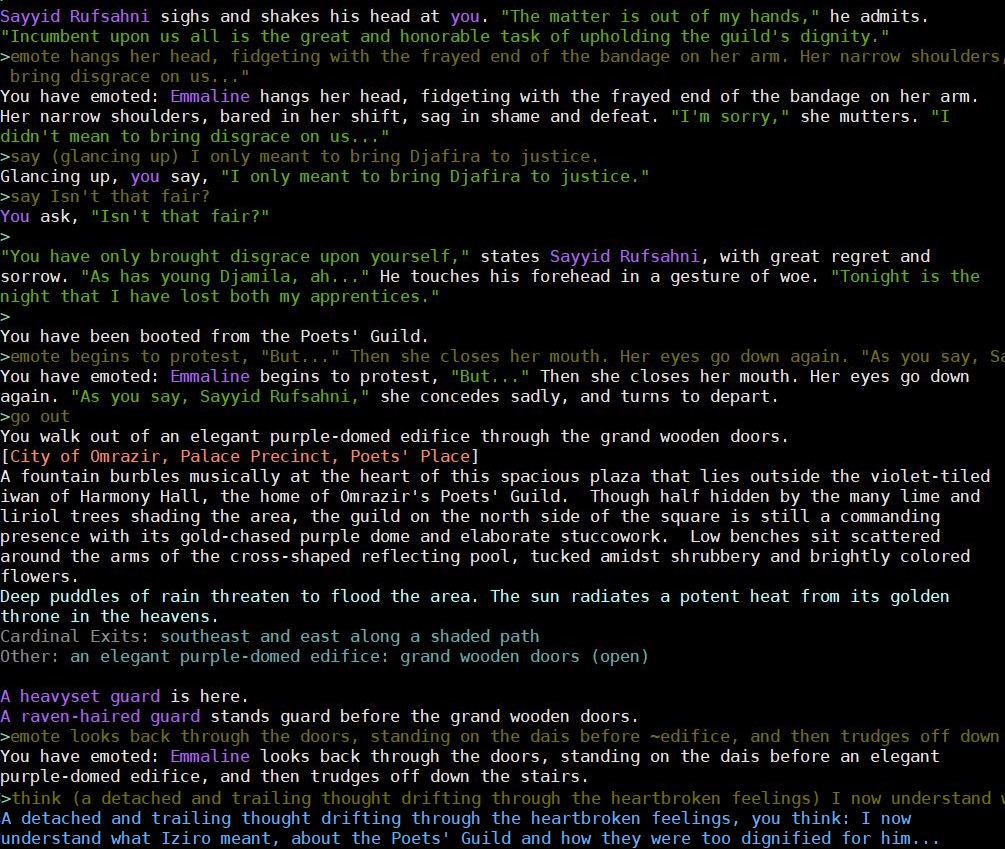
Rufsahni is very sad that he has lost both his apprentices, but Emmaline is sadder still. She is stunned, in fact, and had no idea this could be the outcome of her actions. While Emmaline is quite naive, and a narrative involving her making such mistakes is entirely sensible, it's valuable to note here that her in-character choices have resulted in another unfortunate in-character consequence. This is how organic roleplay stories work, and while sometimes the results are not what we may have planned as players, it's this unpredictability that is what makes things exciting and fun for the kinds of players who are most likely to enjoy our game.
There is a safety net in the fact that your character's story will not generally end without your consent, but other conflict may well arise. We know not everyone enjoys playing out stories that lead to conflict and difficulties, so we wanted to clearly illustrate the fact that this is part of what playing Song of Avaria is about. We certainly want players to have fun roleplaying through the various interesting problems their characters encounter (or create through their own actions!), and we hope they feel that this adds to their story rather than detracts from it. We also firmly believe nobody should be actively trying to damage another player's experience either, so we hope that any legitimate griefers will be quickly reported and dealt with through the various channels we've made available for that. But we hope everyone who comes to play in the world of Avaria agrees with us that challenges and mistakes and character-versus-character (rather than player-versus-player) conflict are all great material for interesting and meaningful stories.
Emmaline's story is played out with the goal of being dramatic, rather than avoiding conflict and bad outcomes. A more conflict- or risk-averse character would likely not have agreed to help with Djafira's strangely suspicious favor, or might been faster to escape from the muggers, or slower to act rashly in reporting the scheme to the lawkeepers.
It's certainly possible to play your character as wisely or as recklessly as you prefer. Character mistakes can make for an interesting story... but they can also lead a character straight to rock bottom. Emmaline isn't quite there yet, and hopefully she'll pick herself up before she hits it. But we will have to wait and see! For now, here's her latest story update.
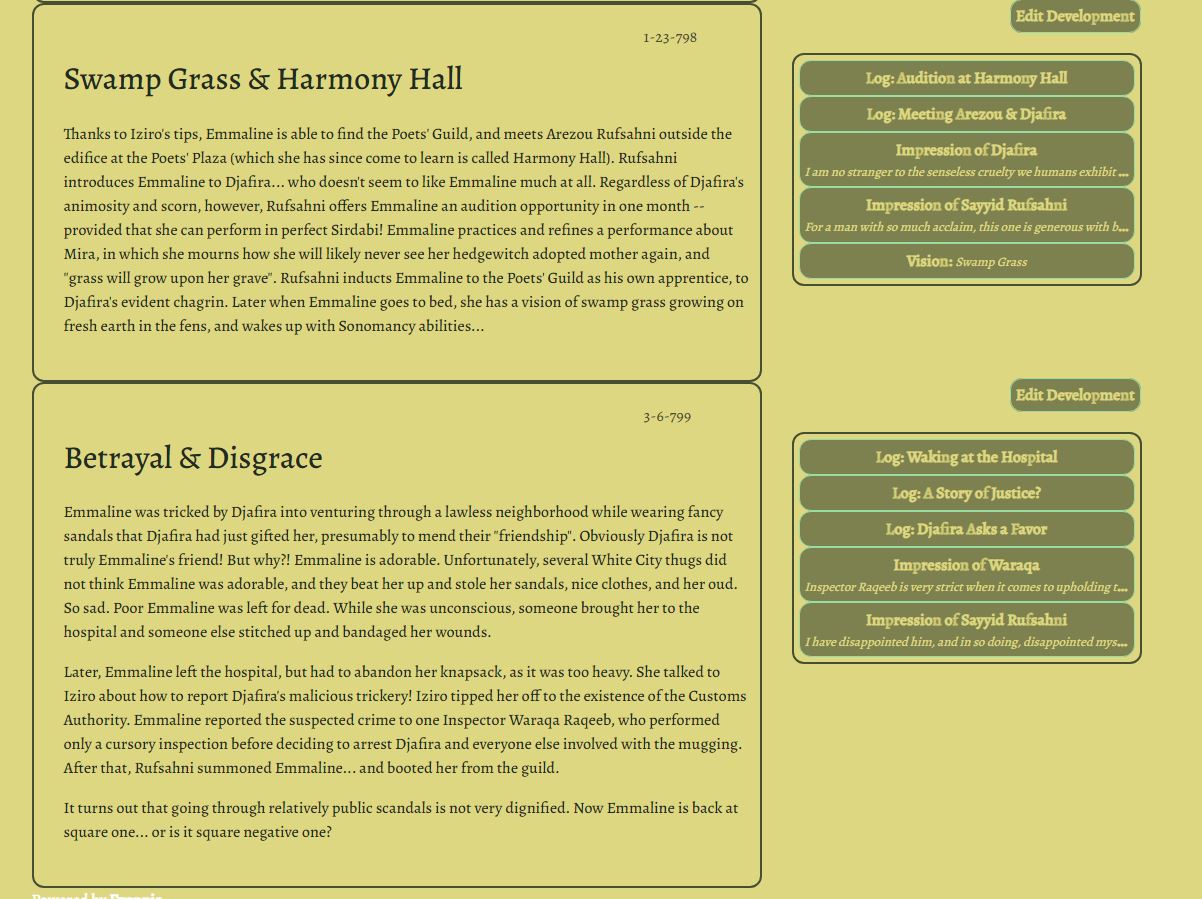
At least we're steadily accummulating experience, thanks to all these very eventful personal plot developments.
Who knows what will happen next! One thing we do know: Emmaline has lost her means of livelihood. She will need to find another job, if she wants to stay in Omrazir. And is this the end of her feud with Djafira?
Find out next time, in Chapter 8, where we'll showcase... CRAFTING!
Chapter 8: CRAFTING
-- Intro:
We're working on a new MUD called Song of Avaria, using Evennia as a base code. Hopefully, the game will be opening for a public alpha five months from now: January 2024. This is the eighth in a series of showcases to display the features of our game. In order to properly exhibit the purpose of Song of Avaria, which doesn't quite fit into the existing molds, we're going to demonstrate gameplay by focusing on the story of a character: Emmaline.
-- Chapter 8: CRAFTING
Last month, Emmaline sadly lost her apprenticeship and was booted from the Poets' Guild by her own mentor. Since then, she's had to find some other way to make a living. Dejected and upset, she's resorted to performing menial labor at subsistence-level wages for a small eatery on the north side of Omrazir. Her main concern at this point is just being able to continue to pay the rent for her private room at the caravanserai.
The Seaview Pub, on the Via Maris, at least isn't the worst place to work, and if nothing else Emmaline is able to find a measure of contentment in the garden. Unfortunately, her current pay at this job doesn't even fully cover her rent. Still, she has a little saved up in the bank and hopes to find some kind of solution to her worries soon, whether it's getting a raise or a finding a side hustle or a roommate.
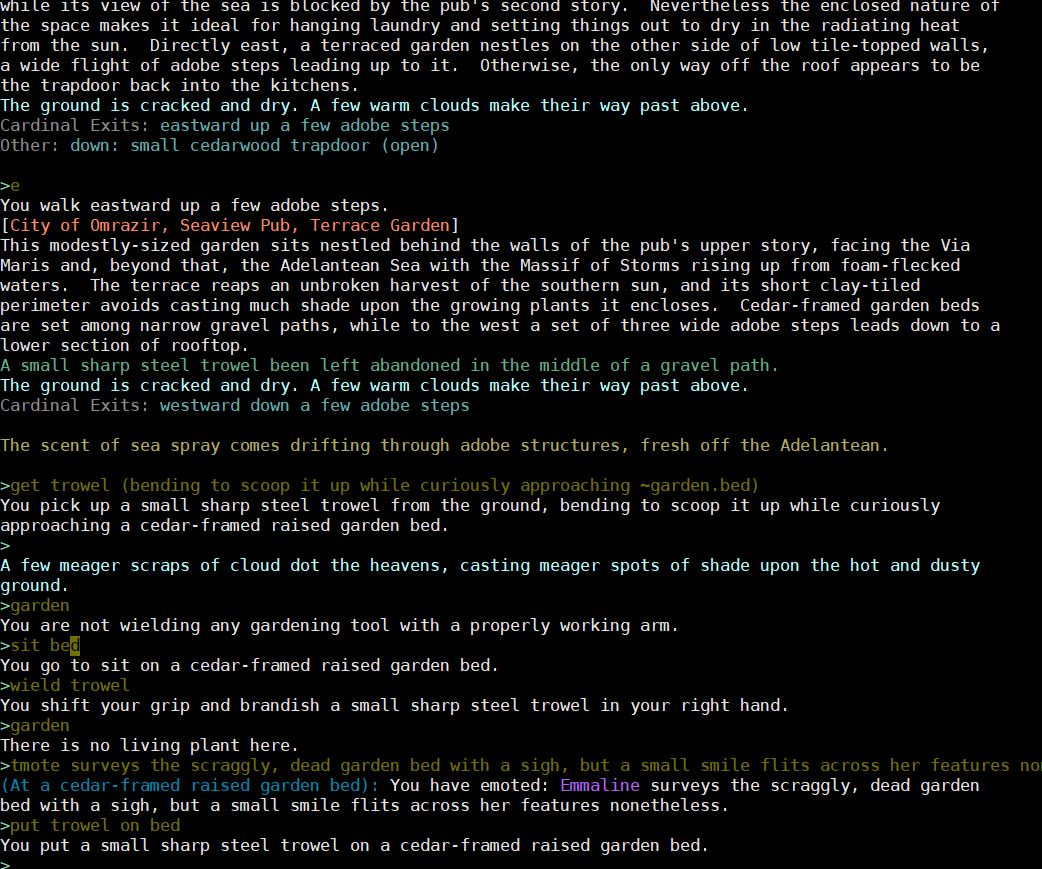
Gardening is covered by the Horticulture skill, which Emmaline is rather decent at thanks to her tutelage under Mira, the hedge witch. In Song of Avaria, plants tend to grow reasonably well in their native climates, and we did not include the necessity for basic chores like watering or weeding -- we don't want to introduce any Real Life drudgery when it comes to roleplaying a drudge in the game! The only thing a garden requires for upkeep is that someone perform any gardening ability there, at least once a month. If a garden is not upkept in this way, it will gradually decline and the plants in it will fade into the background environment, mirroring the way that wild plants exist in the background before being found through foraging attempts.
As seen in the snipped image, in order to use the GARDEN command and keep up a garden, one needs to be wielding a gardening tool of some kind, and there must be at least one living plant in the room... But while a trowel has been left in the garden here, there is nothing presently growing in the garden beds.
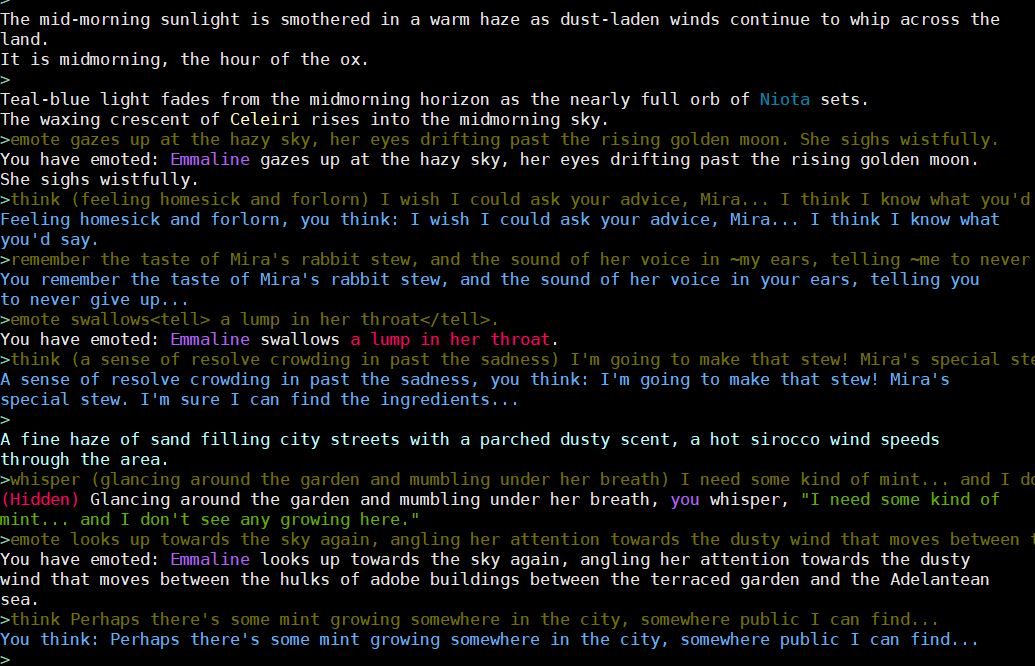
The garden is nice to have, and Emmaline would like to revitalize it, but she can't help but be reminded of her doleful circumstances. Being generally discouraged about her goals and her future makes Emmaline feel rather homesick too, and she remembers a particular stew that the hedge witch used to make. She wonders if it would be possible to make this stew even here in Omrazir. One thing is certain: the herbs that Emmaline needs do not currently grow in the restaurant garden. She resolves to go out and look for them.
As mentioned, plants can be foraged from almost anywhere, but when found in the wild, they will eventually fade back into their environment. Unless, that is, they are uprooted... and planted into a cultivated garden! Emmaline finds a plant. Normally plants that are successfully found through foraging will just have a description but no name, but they can be identified by more skilled eyes. Emmaline is able to IDENTIFY the plant, and can tell that it's mint! She decides it can be useful for her puproses, so she then UPROOTs it.
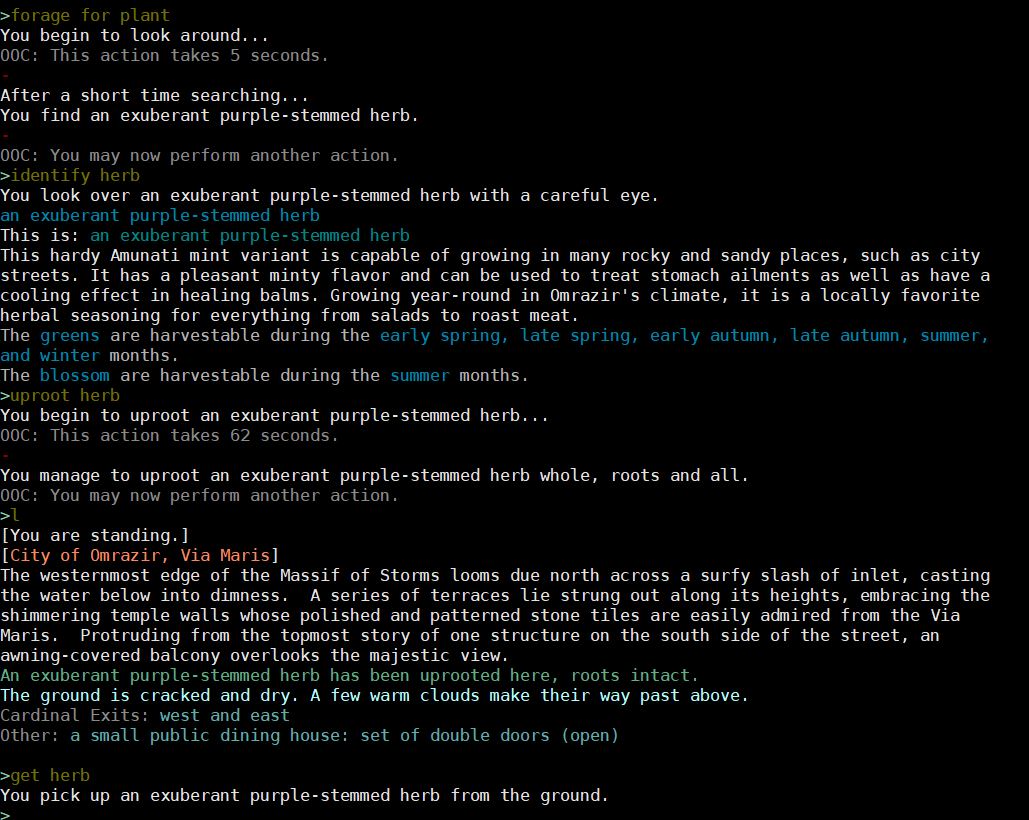
The uprooted mint could work as an herb by itself in cooking recipes, but Emmaline wants to be able to keep the plant on hand for regular harvesting. So, she brings it back to the restaurant gardens, and plants it into the soil there. Now she can GARDEN, too! Gardening successfully in an area shows the plants that you have just cultivated, which will make sure they don't fade away into the background.
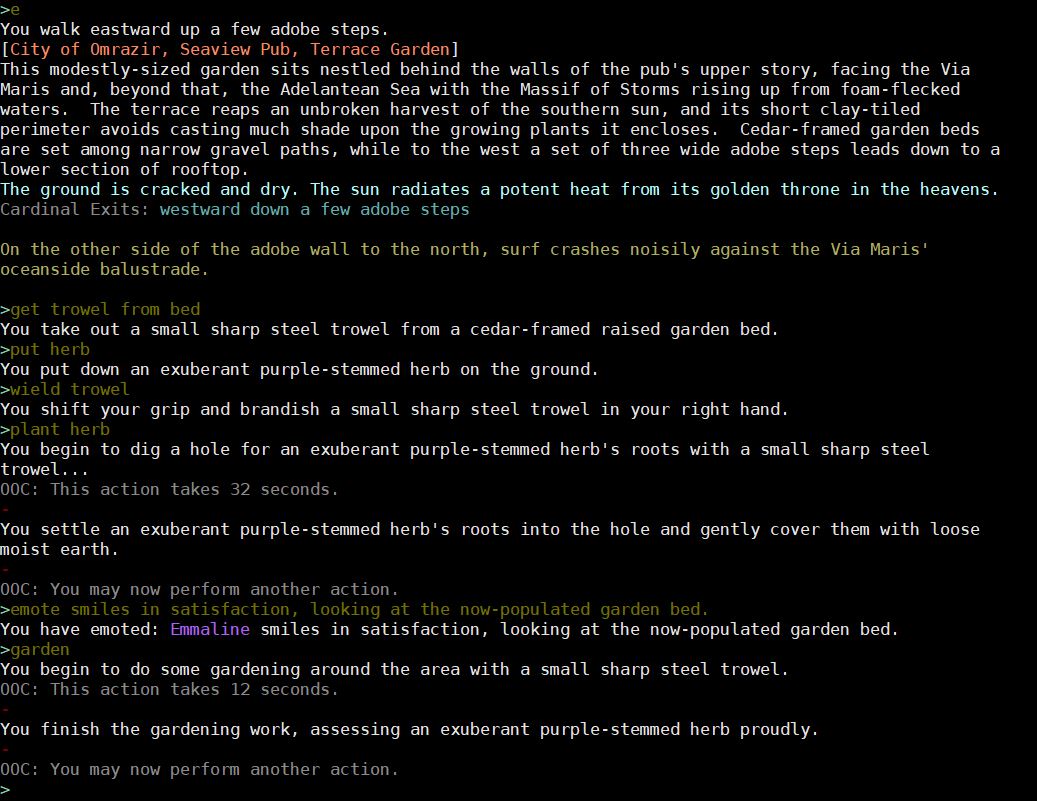
There! Now Emmaline can access her mint plant easily. When looking at a plant, the age of the plant will be evident, as its general description will differ based on age. Its seasonal products -- berries, leaves, flowers, and other such useful parts -- will display in extra lines that will be absent if those useful parts are likewise absent (whether on account of the season, or because those parts have all been harvested already). Right now, the mint plant has leaves that can be gathered, via the GATHER/HARVEST command. Emmaline gathers a few sprigs of mint leaves.
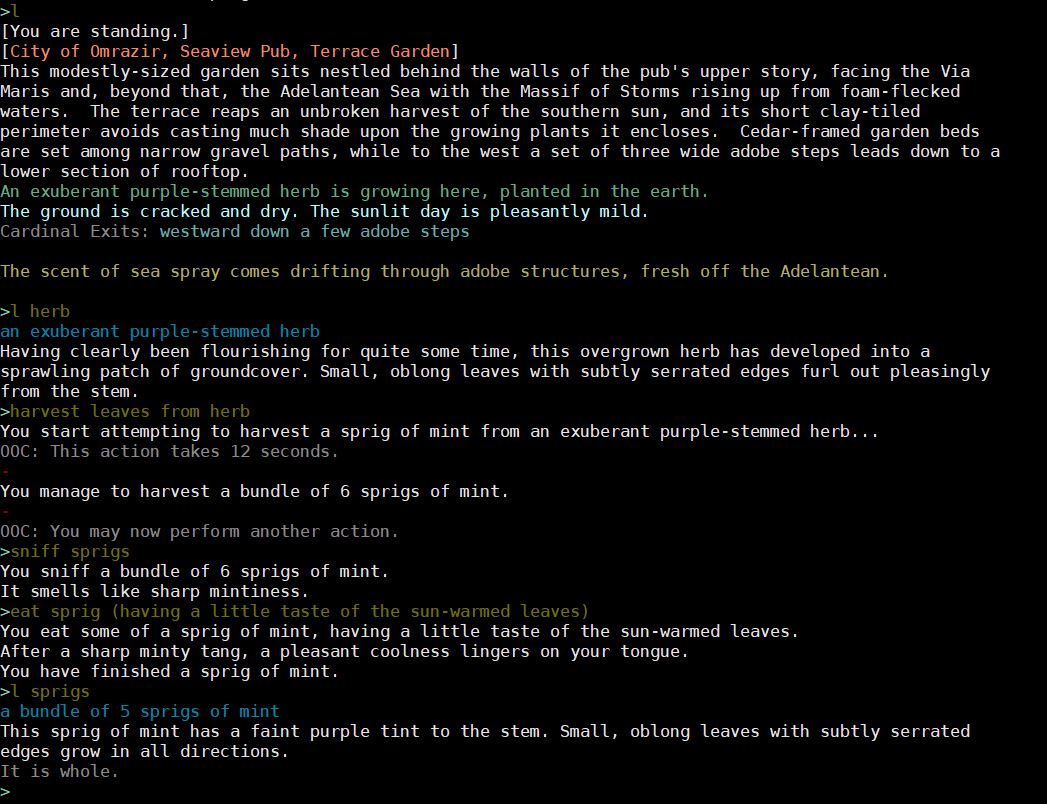
Six sprigs! That must have been a really good harvesting roll of Emmaline's dice. Depending on skill, a horticulturalist may be able to gather more parts at one time from a plant. Raw ingredients stack easily, and if they're edible, can be tasted. Most of them have their own scents as well. They can also decay over time, which makes them smell and taste differently still. Emmaline tastes one of the sprigs of mint. The mint tastes minty! Now she has five left.
With the mint, Emmaline fulfills a work errand to make some stew. This is a generic recipe that anyone can make, with a huge variety of possible items that can be used to fill the needed categories. Different ingredients will give the finished stew different tastes, and the skill of the cook also comes into play when determining how good the meal will be when it's finished. Taking a look at RECIPE VIEW STEW or CRAFT VIEW STEW will show us what this generic recipe looks like.
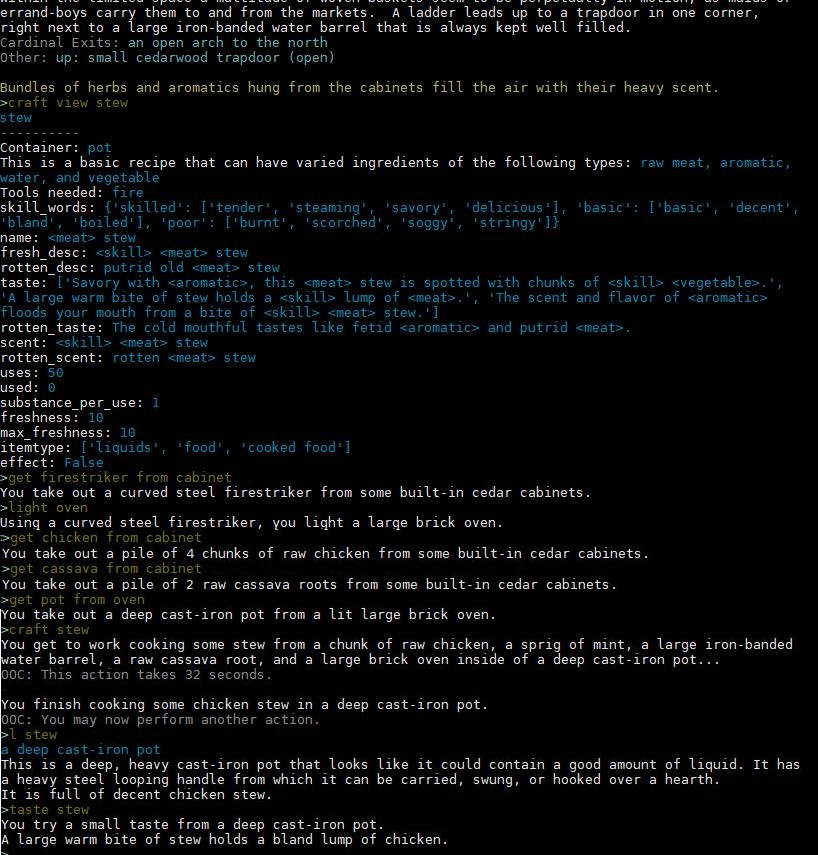
The COOK command will work for making recipes, but there are many other types of crafting designs too: blueprints, schematics, instructions, smithing dies, and so on. It can get confusing to remember so many different commands (such as CARVE, FORGE, TAN, COOK, etc) for all these different sorts of crafting. With that in mind, we've made it so that the basic CRAFT command will work with any sort of design. If someone prefers to use more immersive verbs such as "cook", that's great, but you can also just use "craft" to make anything you want if you don't remember the specific crafting command.
Checking CRAFTING shows all of Emmaline's current craftable items -- for now, they are simply all the generic possibilities that came with the cooking skill. Since Emmaline is from Ruvera, these are mainly Ruveran generic recipes that she would have learned back in her homeland. A character with Sirdabi origins would get a somewhat different starting set of recipes, and characters with certain wanderer-type heritages start with additional recipes unique to their heritage as well. Of course it's possible to learn more recipes through the course of playing out your character's story, but this is one way we chose to highlight colorful cultures in the world of Avaria.
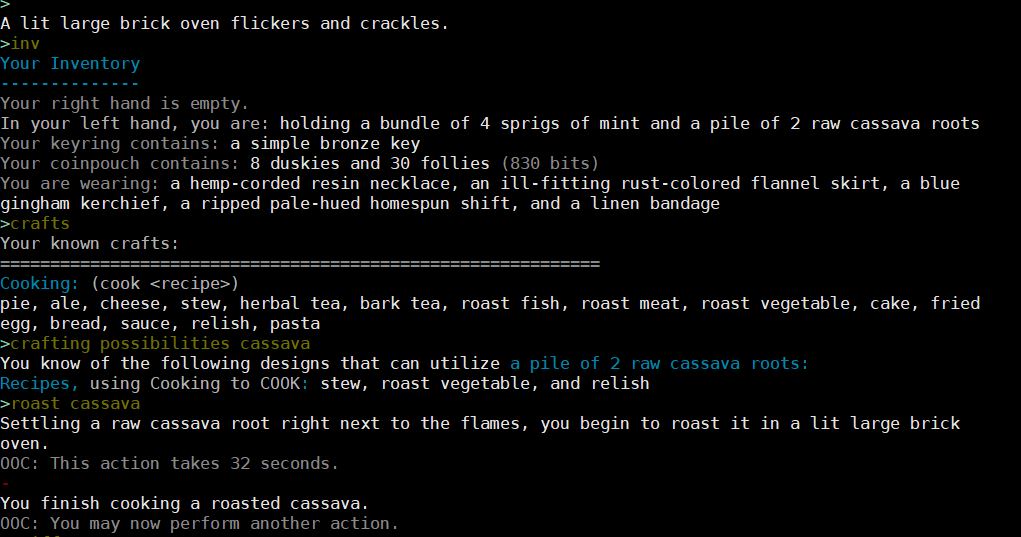
Checking CRAFTING POSSIBILITIES on the cassava also shows us all the designs (in this case, recipes) for which Emmaline could use this item. If a character has many crafting skills and a player isn't sure what they might be able to make using a particular item, CRAFTING POSSIBILITIES will furnish various ideas.
Since some characters may know multiple crafting skills, the readout will explain which skill each possible use of the item may fall under, and which unique command can be used to make it. If a person ends up somehow having two designs of the same name but for different skills (unlikely, but possible in the case of custom-made designs), they can differentiate among them by using the unique command (COOK, for example, rather than simply CRAFT).
Anyway, Emmaline is very nostalgic about Mira's particular stew, and she wants to make a special recipe that will evoke those fond memories. Cooking is a crafting skill that allows for truly custom designs, and so Emmaline begins to plan how to put together her very special recipe.
Rather than requiring simply generic types of items, a special custom design will require more particular ingredients. Emmaline decides to dry her mint first, and use the dried mint leaves in this recipe, because she wants to be able to make this stew even when she doesn't have fresh herbs on hand. The dried mint will last in her pantry longer than the fresh leaves.

Some crafting skills do not have crafting designs. Instead, they have abilities that can be used to modify items. Drying mint leaves is one such ability, and it falls under the herbalism skill. While we plan eventually to have custom crafting for herbalism as well, some fundamental resource-gathering and resource-refining skills don't take or require any custom designs. This sort of crafting ability is not about crafting a design but rather refining a resource: a dried leaf is a dried leaf, whatever herb it may belong to, and it continues to carry that herb's properties while also lasting longer in storage.
Unique combinations may result in something special when it comes to a skill like herbalism, but this is less a matter of knowing certain recipes than it is about experimenting with the abilities as they are. Right now, the mint sprigs have been laid out to dehydrate, but it will take some time before they actually are dry. We can leave them there and pick them up later when they're finished drying.
For the recipe she has in mind, Emmaline needs several other ingredients besides mint. For those, she'll go to the bazaar and simply buy them there. Once she has everything and is back at the pub kitchens, she'll start really thinking about how to make Mira's special stew... and by then, the mint should be dried!
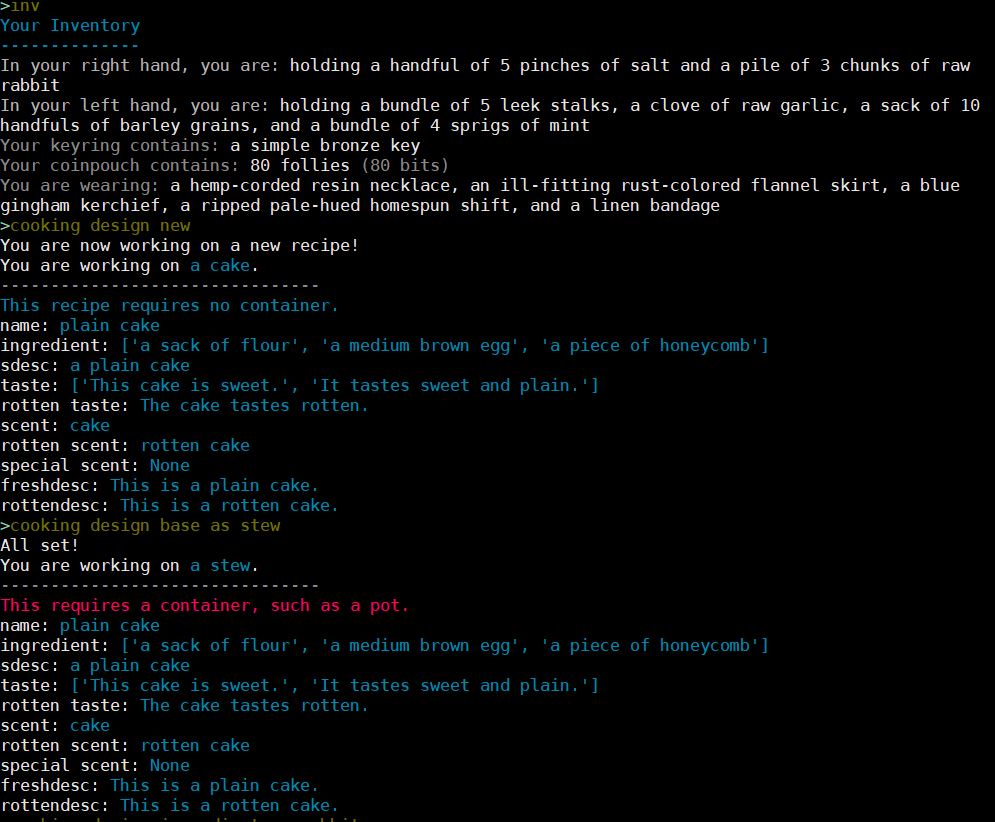
Now we have both arms full of exciting ingredients! It's time to start thinking about how to put them together.
We can use the crafting design commands by specifying the craft skill name like so: COOKING DESIGN. This starts the process whereby Emmaline is able to start conceptualizing a new custom design. (Just as a note, this design process is all virtual and out-of-character -- in-character, Emmaline is just thinking through the crafting idea in her head.) COOKING DESIGN NEW gives us a blank template, which contains a basic recipe that we can then customize according to Emmaline's wishes. For each option we can input COOKING DESIGN <template attribute> AS <new value>, to gradually build up our custom design.
When the screenreader option is toggled on, setting a new value for each part of the design will not echo the full design. We've turned that on briefly here to show what it looks like, and also to fit more of the commands into the snip without being spammed by the entire echo of the recipe-in-progress. Checking COOKING DESIGN at any point will show the current state of the design. If we want to add multiple tastes to a recipe, we can separate them with slashes, and we can add several ingredients at once by separating them using commas. If you want to include two of the same type of item, you just include it in the list twice. When finished, COOKING DESIGN SUBMIT will send the design up for admin approval.
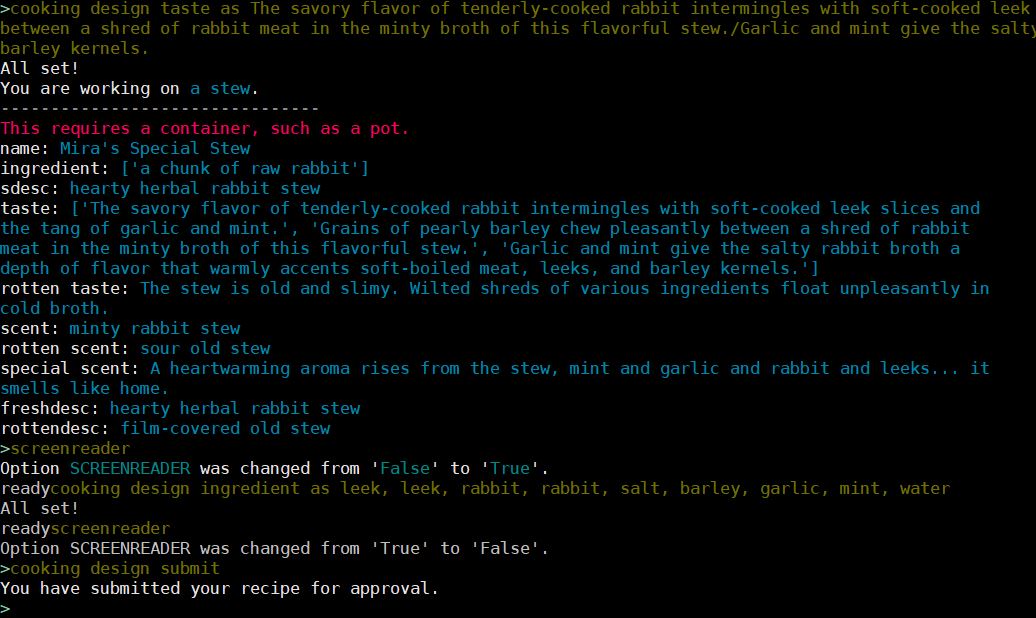
This submission of the design template puts the custom design on a list to be reviewed by staff and either approved or rejected. In order to ensure a consistent quality of writing throughout the game and to keep everything thematically on target, we've chosen to require that all custom crafts go through an approval process before becoming available to players in-game. While someday this approval process may be partly in the hands of appointed players (such as IC guild representatives), right now player-submitted craft designs are simply another category that appears on the admin task page. We anticipate that most of the time custom craft designs will be relatively quick and easy to approve, and the system has been set up in such a way as to make their creation entirely automatic with the simple click of a button on the website.
During the waiting period for approval, an acceptable in-character explanation for what's going on is that Emmaline is actually still thinking about her recipe. She's still not entirely sure whether this will be a good way to make Mira's specialty stew or not. Once the custom design is approved, then her brainstorming period is over, and she has figured the recipe out!
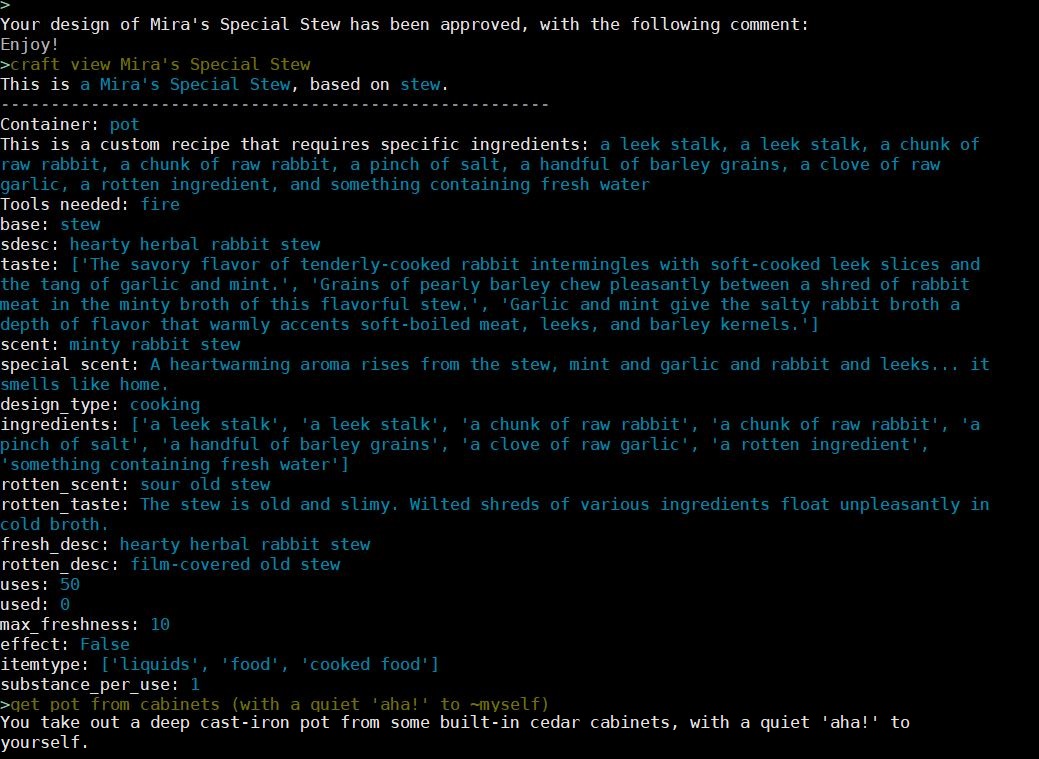
While Emmaline is at last making her long-anticipated stew, an old woman comes into the restaurant. She seems strangely familiar! And she definitely recognizes Emmaline. It turns out the old woman's name is Zreni, and she was looking for Emmaline -- because she works at the hospital, and wanted to return Emmaline's lost knapsack!

Emmaline is very grateful and relieved to have her knapsack back, and she's also intrigued to meet Zreni, who explains that she travels as a griot -- a special type of bard -- across all of Idiri, the southern continent that is roughly analogous to Africa in the real world. Zreni has an interesting stringed instrument called a kora, and she lets Emmaline have a go at it while she helps out with the cooking.
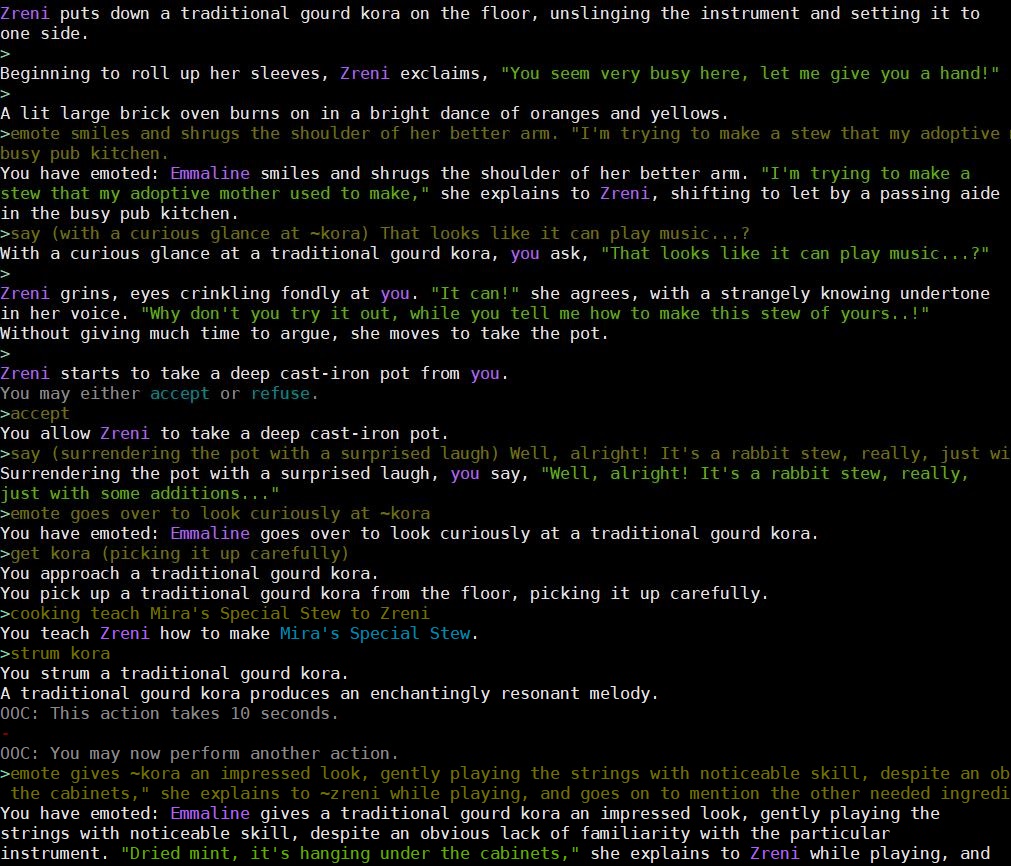
In return, Emmaline teaches Zreni how to make the special stew. Then they enjoy some of the stew together. Large containers like this pot of stew can be used to fill smaller containers, such as individual bowls or cups, depending on their capacity.
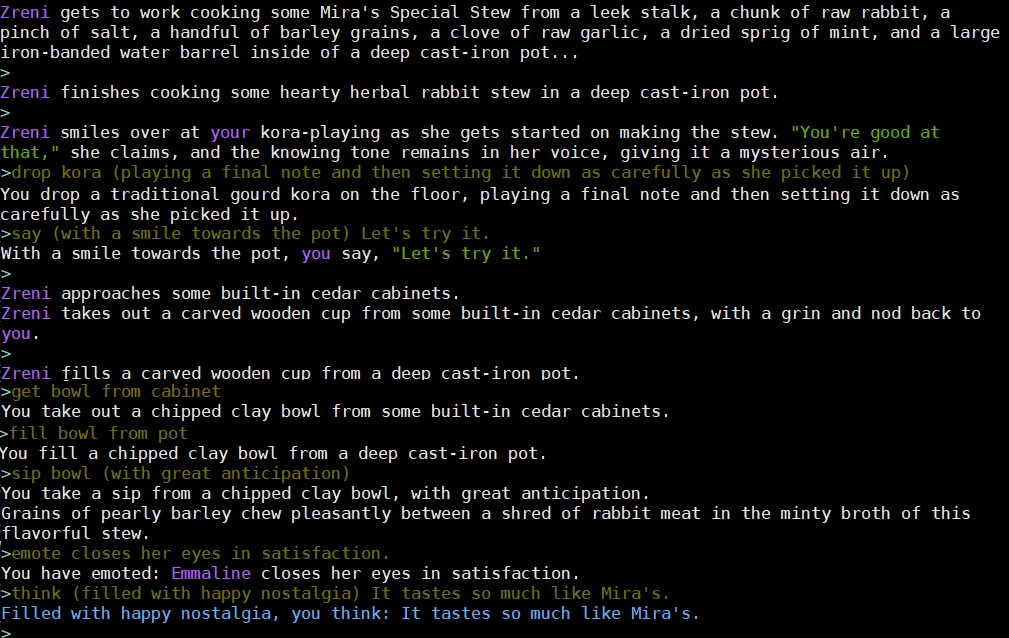
Zreni probes Emmaline with questions about how she ended up in the Jumana Bimaristan, so Emmaline explains about Djafira. Zreni advises Emmaline to speak with Djafira, and Emmaline reflects that this might be a good idea, because maybe that would allow her to finally understand Djafira's motivations and the reason why her former fellow apprentice might have wanted her dead. Emmaline decides to fill another cup of stew, to give to Djafira when she visits the other woman in the local jail.
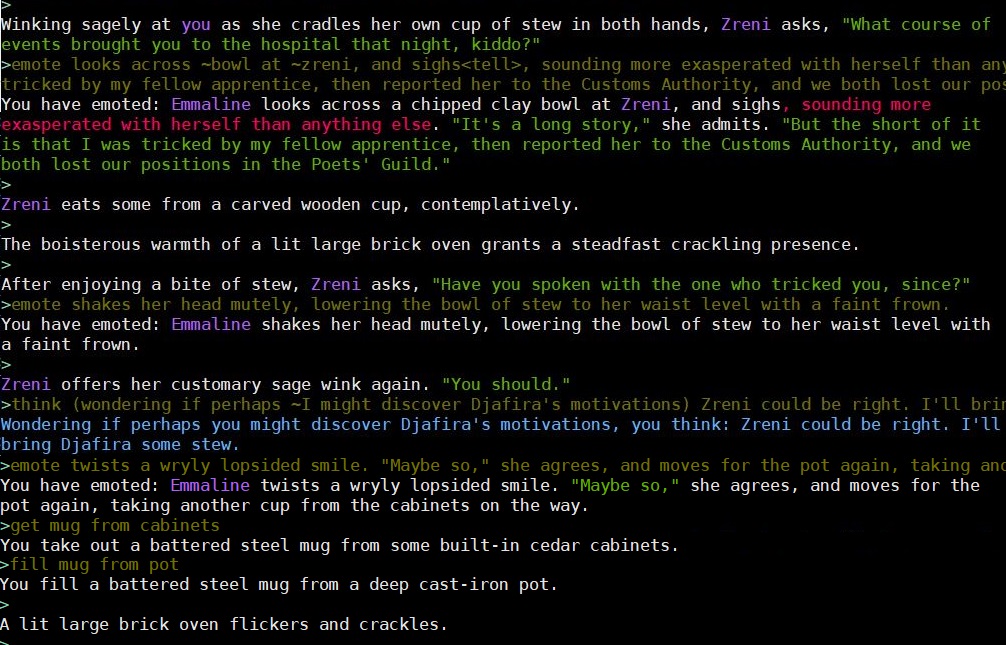
Now's the time to explain a little about the legal system, and what happened in the background when Djafira was arrested.
There are three ways that a character can end up getting arrested. The first way is getting caught in a criminal act by a guard. Guard NPCs patrol most cities, and if they witness a PC committing a crime, they will arrest that PC. Crimes have varying degrees of severity, so often the first offense of a minor crime just earns a warning. However, a PC with a criminal record can rack up progressively more offenses of differing severities, and eventually end up getting arrested. If they resist arrest, this is another offense. Killing a guard is a very severe offense indeed. If a PC's criminal record is bad enough, the guard NPCs will consider the best move to be execution on sight, so be careful!
The second way that a character could get arrested is by being accused of a crime in roleplay. Using the ACCUSE command, which entails quite a punitive roundtime (a delay of a hundred seconds before being able to act again), will allow someone to accuse another person of a crime. If an NPC guard is present, they will register this as "suspicion" of a crime, and adequate suspicion will cause them to arrest someone. This sort of case will be looked into later, either by guard PCs or game administration. NPC guards can be called to the area by any shout for help, as long as they are within earshot. On average, shouts will travel over a radius of five rooms in every direction, but with more points invested into a higher Voice stat, shouts can travel further.
The third way to get arrested is through the direct intervention of a PC guard. What Waraqa did in the case of Djafira was order a couple of guard NPCs in her organization (the Customs Authority) to follow the suspect, and then went to find Djafira herself. There, she ACCUSED Djafira -- and the guard NPCs summarily arrested Djafira, brought her to the jail, confiscated any weapons for storage in a secure location, and recorded the crime.
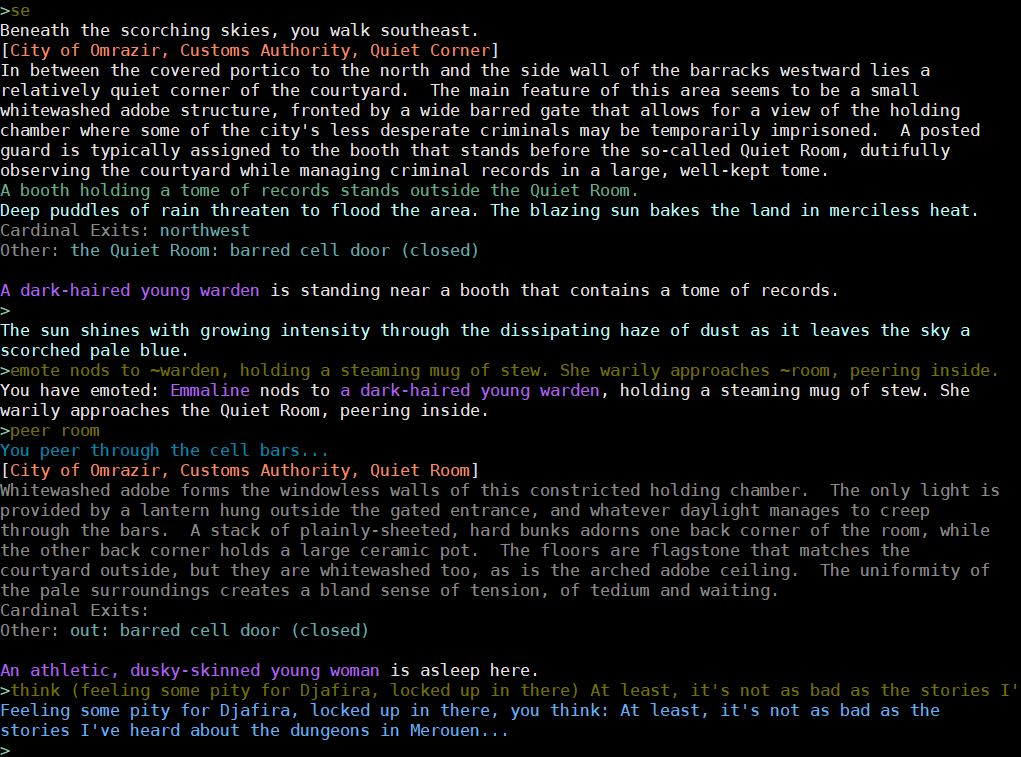
Anyone logging out in a jail cell will show as "sleeping" in that room when logged out, so that wardens can have a fair awareness of whom they have imprisoned there at the moment. (The warden here is an NPC). Since it's quite possible to break out of a jail cell, that's important to know. Right now it appears that Djafira is still in the cell, but offline. This is understandable, as the player might be bored sitting in the cell, and be playing an alt or just editing things on the website while logged out.
In this case, we want to send an OOCMail to Djafira's player saying that we'd like to play with them. While the game is intended to be an immersive experience and we'd like to minimize OOC communication regarding IC matters, this sort of use of OOC correspondence is not only accepted but encouraged -- it helps get people together for more in-game roleplay, after all! Song of Avaria is not a traditional RPI in the sense that players are expected not to communicate with one another at all. We wanted to include this example of OOC communication between players in our showcase, in order to clearly illustrate that point.
Here, we send Djafira an OOCMail through the website -- showcasing the user interface for that, since we've previously shown the in-game interface for OOCMail.
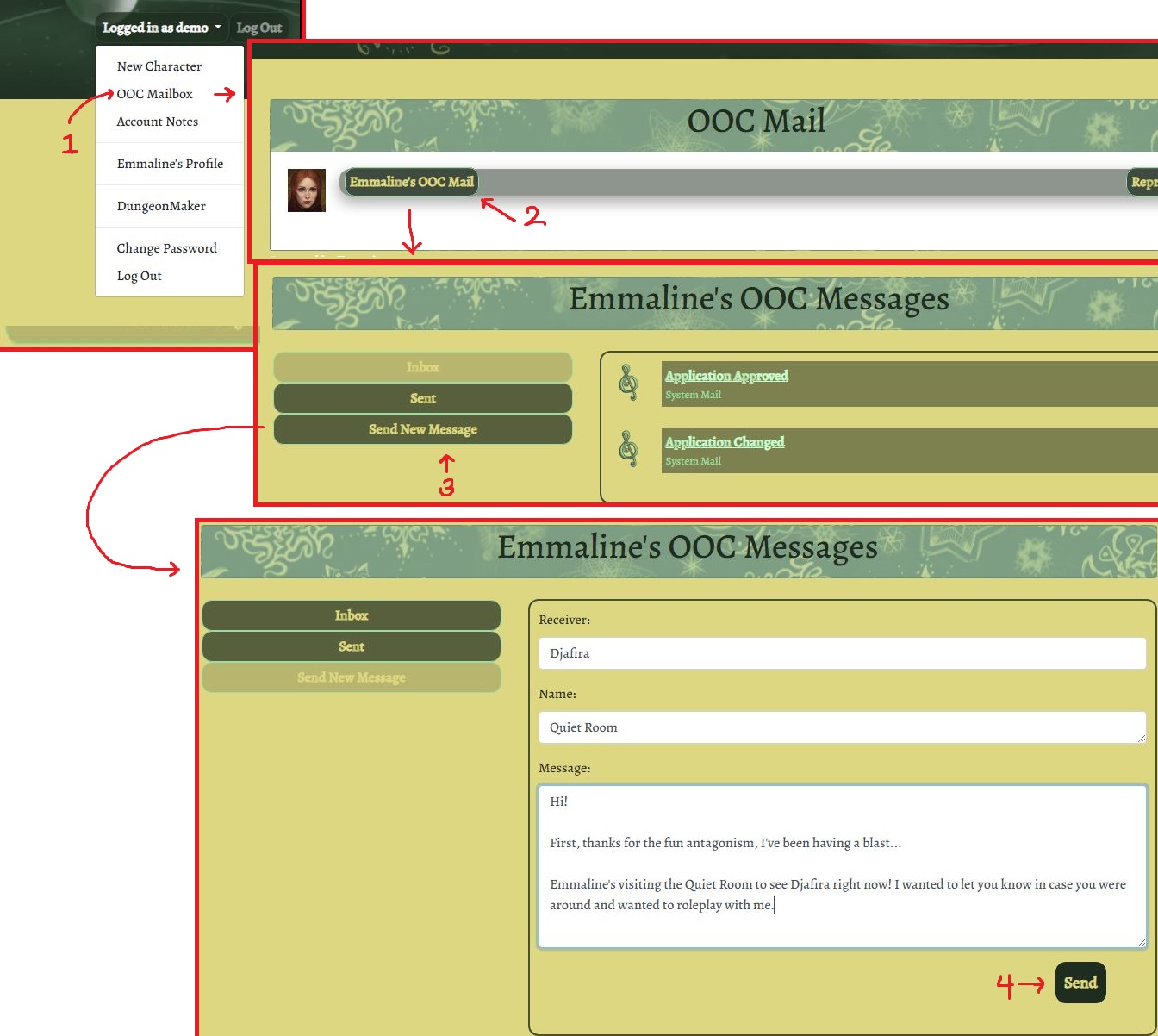
It's not long before we get a response, and Djafira wakes up in her cell. Of course in the real, non-showcase world, that might not happen -- Emmaline might have to give up and leave, and come back later to find Djafira awake another time. But for now, we're able to have Emmaline wait just a little while for Djafira to wake up and interact through the bars. Note that Djafira's player did not send any reply. If someone communicates with you OOCly, failing to reply is not a faux pas and shouldn't be considered rude. Choosing to interact with that player in roleplay should speak volumes in itself: Djafira's player enjoys this RP and wants to play with us, regardless (or even because) of character conflict -- which is how the game should be. We are not going to assume any real life malice or disdain here, just because our characters have been at odds.
In this scene, Emmaline and Djafira are actually in different rooms. However, each room is set to oversee the other, and it's possible to target characters in adjacent rooms with emotes, so the interaction works out. If they were each standing next to the exit on their side, they could speak to each other regardless of the specific room settings, and if they were using WATCH to watch a direction, they could see actions in those rooms down their line of sight, as well. At any rate, it's quite possible to interact with someone who is locked in a jail cell, so even prisoners have reasonable opportunities for roleplay.
Even the most antagonistic characters can have redemptive arcs, and it seems that is what Djafira is going through here. Zreni was right; and Emmaline is able to befriend another local. Since it's a long interaction, here is a link to the roleplay log. We've put it in HTML format, thanks to Mudlet's logging capabilities, so that its appearance to sighted players is similar to how it would appear on-screen in the game.
After this wonderful experience of having an enemy become a friend, Emmaline returns to the restaurant. Zreni is back as well, and Iziro is visiting. Feeling happy and warm in the knowledge of new friends and allies, Emmaline puts on a performance for the restaurant- goers -- and Zreni and Iziro join in.
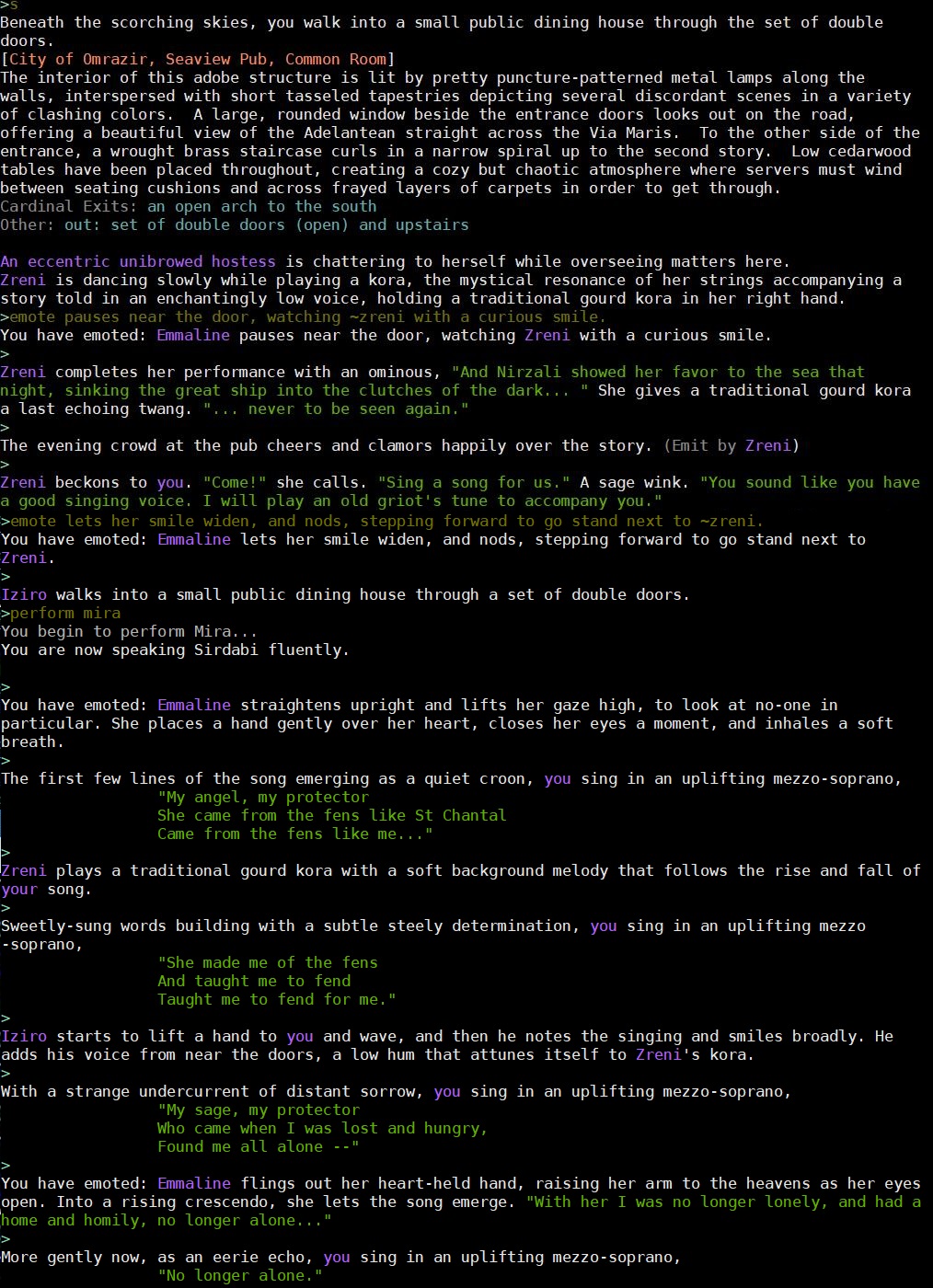
She's almost got her own band going! In the ups and downs of Emmaline's story, this is definitely an up. We will edit her story arc with the new chapter, containing her impression of Zreni and her updated relationship with Djafira. We add in some new hopes for how Emmaline's story will go: perhaps she'll learn some bardic magic from Zreni, whose griot tradition seems quite mystical and mysterious in many ways, and perhaps she'll look into whether she can retract her charges against Djafira in order to lessen her new friend's prison sentence.
Including this information in the summary gives administration an idea of what can be done in the future to address Emmaline's story and help move it along in satisfactory ways.
For now, we're fairly happy with how things are going for Emmaline. All her struggles are beginning to pay off for her in unexpected ways: she may not be rich in coins, but she's rich in friendship and warm feelings. Everything seems like it's going well for Emmaline...
...Until the next day, when she finds an intimidating package placed outside her door.
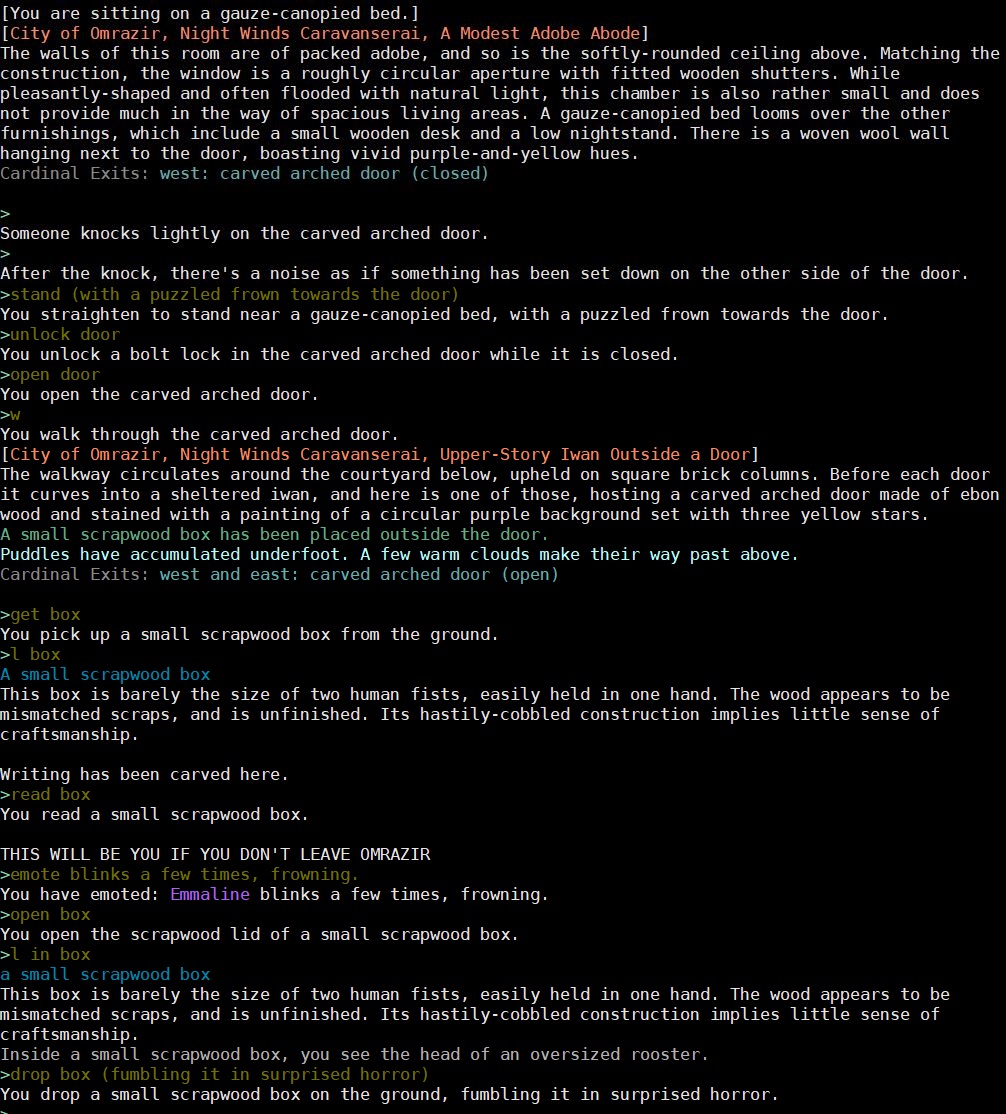
Someone is threatening Emmaline! They have cut the head off a chicken, put it in a box, and had it delivered to her door with an ominous message carved into the lid: "This will be you if you don't leave Omrazir!"
Why?! What now?!
Stay tuned for the next chapter, Chapter 9, which will be a complete surprise!
Chapter 9: DUNGEONS
-- Intro:
We're working on a new MUD called Song of Avaria, using Evennia as a base code. Hopefully, the game will be opening for a public alpha four months from now: January 2024. This is the ninth in a series of showcases to display the features of our game. In order to properly exhibit the purpose of Song of Avaria, which doesn't quite fit into the existing molds, we're going to demonstrate gameplay by focusing on the story of a character: Emmaline.
-- Chapter 9: DUNGEONS
The last thing that happened in last month's Chapter 8 was that Emmaline found an intimidating package outside her door. It was a severed chicken's head in a box! And on the box was carved a warning: THIS WILL BE YOU IF YOU DON'T LEAVE OMRAZIR! Suffice to say, Emmaline does not want to become the severed head of an oversized rooster.

Since then, Emmaline has told her friends about the threat she's received. Djafira was bailed out of jail, and Emmaline invited her once-enemy-now-friend to become a roommate. Even though the room is still in Emmaline's name, roommates can have their own keys to a shared room and pay rent for it. This way, the burden of caravanserai rent can be split between Emmaline and Djafira... neither of whom earn enough money currently to cover the cost on their own (Djafira, unable to hope for recruitment into the Lion Guard without any combat training, is working and gaining experience at a local fighting pit). But together they can handle the rent easily, and have savings to spare every month -- even without extra jobs.
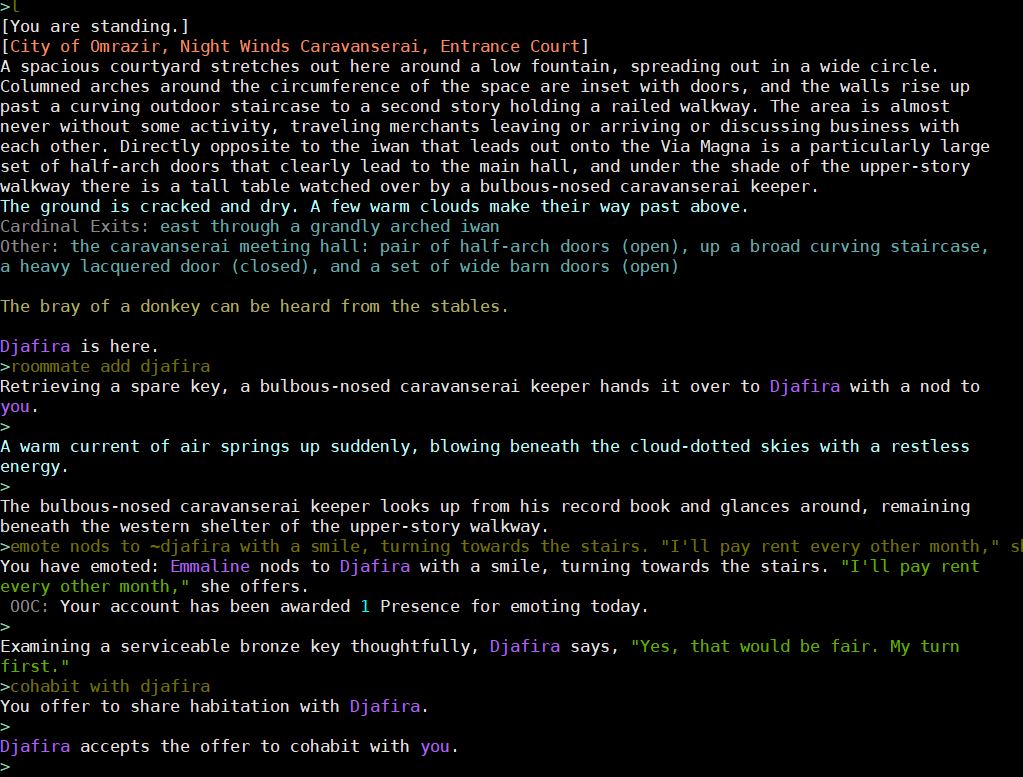
Using the ROOMMATE command while at a lodging place allows you to grant certain rooming privileges and responsibilities to another PC: namely, they will become capable of paying the rent for your room there, and will receive an extra key to the room. However, use of the command need not automatically imply being actual full-time roommates. F or a variety of story reasons, someone could be your roommate according to the lodging establishment's records, yet not actually live with you.
In order to designate someone as actually living with you or otherwise closely sharing your life, you can use the COHABIT command. One of the biggest perks of cohabiting is being able to share plot notes with one another, which is what Emmaline and Djafira are now able to do. Regarding plot notes, most are sent by automatic game systems. For instance, if you're traveling on a ship, and the ship docks while you're offline, you will get a plot note about that. Another example is if your character experiences a birthday, or a vision or a dream, or if something else momentous happens, you will receive a note about that too. If an event is run by game masters in your zone, you will get a plot note with a brief summary of what happened in the area while you were offline.
Plot notes are meant to preserve the persistence of the world without requiring you to be persistently online. The information in plot notes is considered in-character information about events which it can be assumed your character has experienced somehow, since they continued to exist in the world even while you were logged out of the game. Your character cannot die or be robbed or have otherwise personally terrible things happen to them while you are offline, but plot notes allow you to decide how they would have reacted to events happening in the world around them, and roleplay with proper knowledge of those events when you reconnect.
In this way, being able to send a cohabiting PC plot notes helps to fill in information which your character probably ought to be aware of, but which you as a player might not know without being connected to the game 24/7. For example, a cohabiting roommate should probably be aware of something like Emmaline having a lot of nightmares recently, even if the player was not online while Emmaline was roleplaying having those nightmares. Or they would know if Emmaline hasn't come back to the room at all in three days, even though there would be no way for the player to know that without being constantly connected.
For an idea of what plot notes look like, here are Emmaline's -- complete with a few cohabiting updates from Djafira:
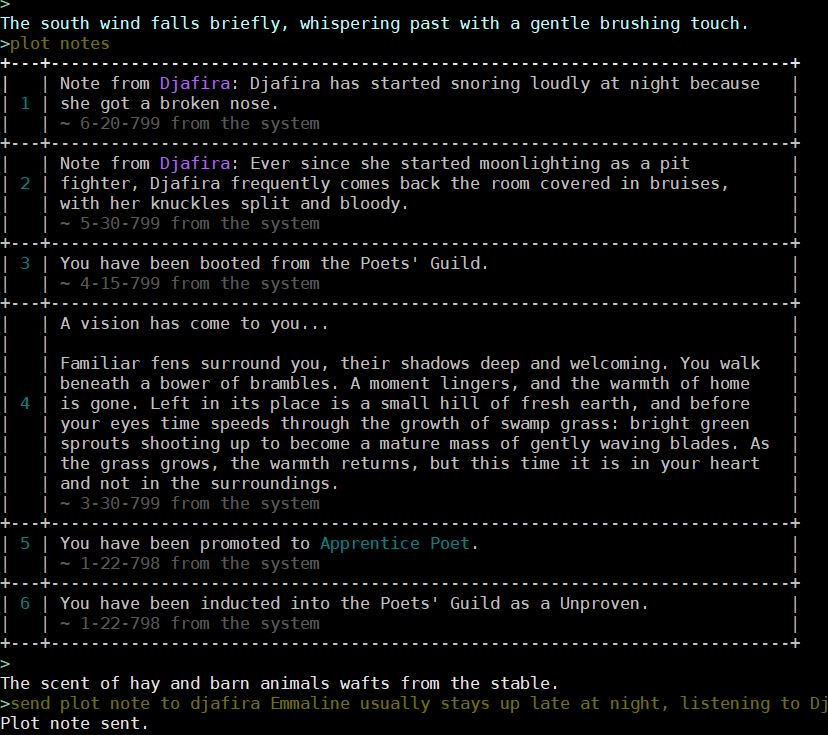
We'll send back a plot note of our own, saying that Emmaline has been songwriting most nights lately: she usually stays up late at night, listening to Djafira's snoring and writing songs while quietly humming to herself from time to time.
Maybe later sometime, Djafira will ask about Emmaline's new song that she's been working on! That's the kind of thing a roommate might have an idea about, after all.
Djafira has also been taking the time to train with Emmaline. Since someone has apparently threatened Emmaline's life, Djafira wants Emmaline to be a little better at defending herself. A brawl is a rather harmless sort of fight, often giving a multitude of small injuries that tend to heal within a few days. There are several supporting combat skills that can help a great deal in a fight, even without weaponry abilities: dodge, footwork, aim, and so on. Djafira is able to teach Emmaline some of the little she has learned so far of these skills.
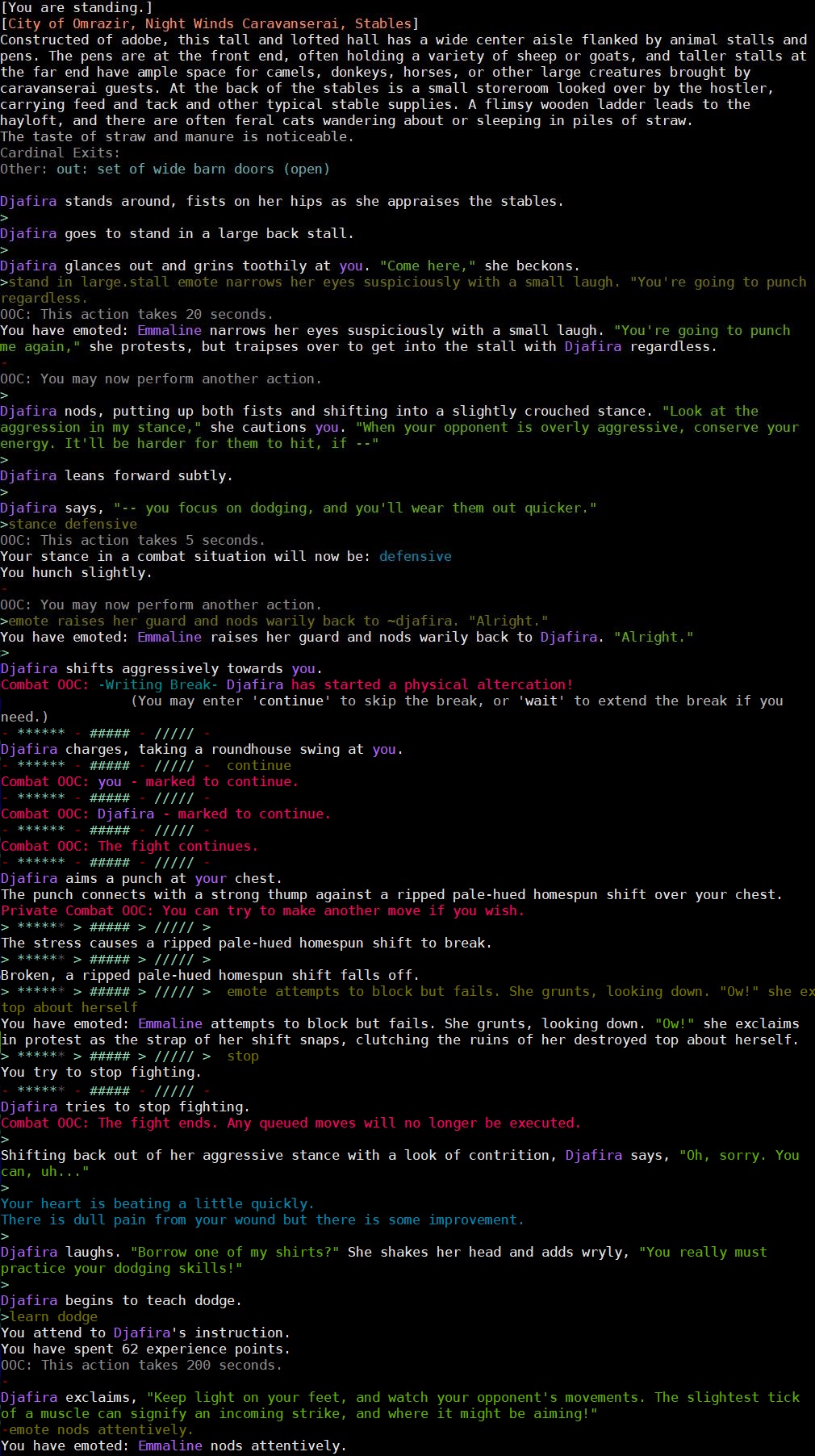
Brawling like this with a friend is also a great way to familiarize yourself with the combat system, and become more confident, without high stakes or worrisome consequences. Speaking of consequences, Emmaline's arm is still healing. She retains a degree of physical trauma from the mugging incident that makes it difficult for her to carry heavy loads still. When the injury is finally healed in full, it will no doubt leave an ugly scar. Such scars are left behind automatically if an injury takes a long while to heal.
Zreni continues to visit often, even though she claims she will be moving on from Omrazir soon in her griot travels. She lends her first aid abilities to Djafira when the fighting pit gets too rough, and continues to check on the progress of Emmaline's slowly healing arm. Furthermore, Zreni has become something of a mentor to Emmaline in terms of her more esoteric abilities...
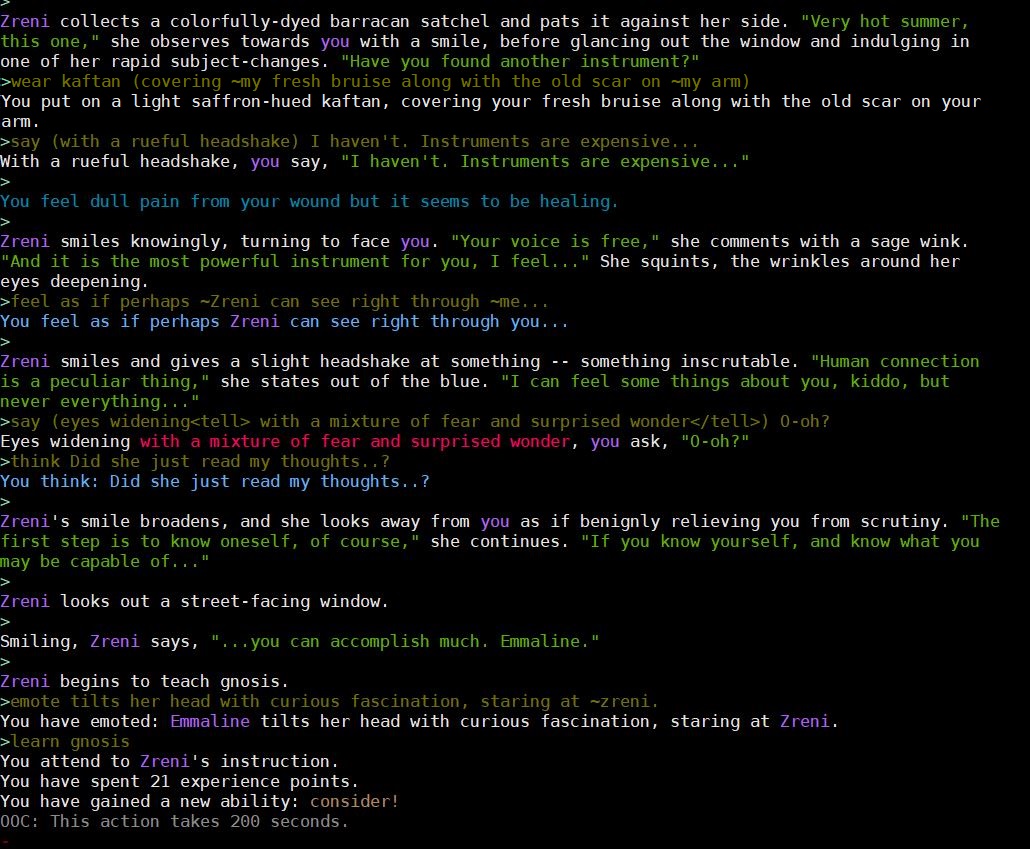
Probing in this gentle manner is a good way for a magically-trained mentor to help a student gradually acclimate to the slow loss of Grounding. Grounding is a term we've discussed in previous chapters that essentially governs magic resistance. When a character begins to learn magical skills, they end up losing their Grounding -- first, quite gradually, as they barely believe in their own abilities yet; then losing the rest abruptly and dumping the magical novice into a state of confusion. Having been stripped of their protective disbelief, but still boasting little training in their new skills, they have next to no magic resistance at all.
A mentor can help with that, and teach a student about the metaphysical realities that govern magic. Attaining more magical knowledge and ability eventually grants better magic resistance, based on a better understanding of magic itself and the development of techniques to combat and withstand its effects. Gnosis is a skill that the governs the use of all types of mental magic, and here Zreni has taught Emmaline how to be aware of her own capabilities.
Telling another person that you are capable of magic can be a good or a bad idea, depending on the person you tell -- some people may believe while others will not, and some may think you are either crazy (if they don't believe you) or frightening (if they do). But simply telling them about your magical abilities will not affect their Grounding, and even a completely Grounded character might reluctantly believe you, simply on the basis of being your good and trustworthy friend. This is the case with Iziro and Djafira, when they come over one day to discuss the ongoing threat to Emmaline's well-being.
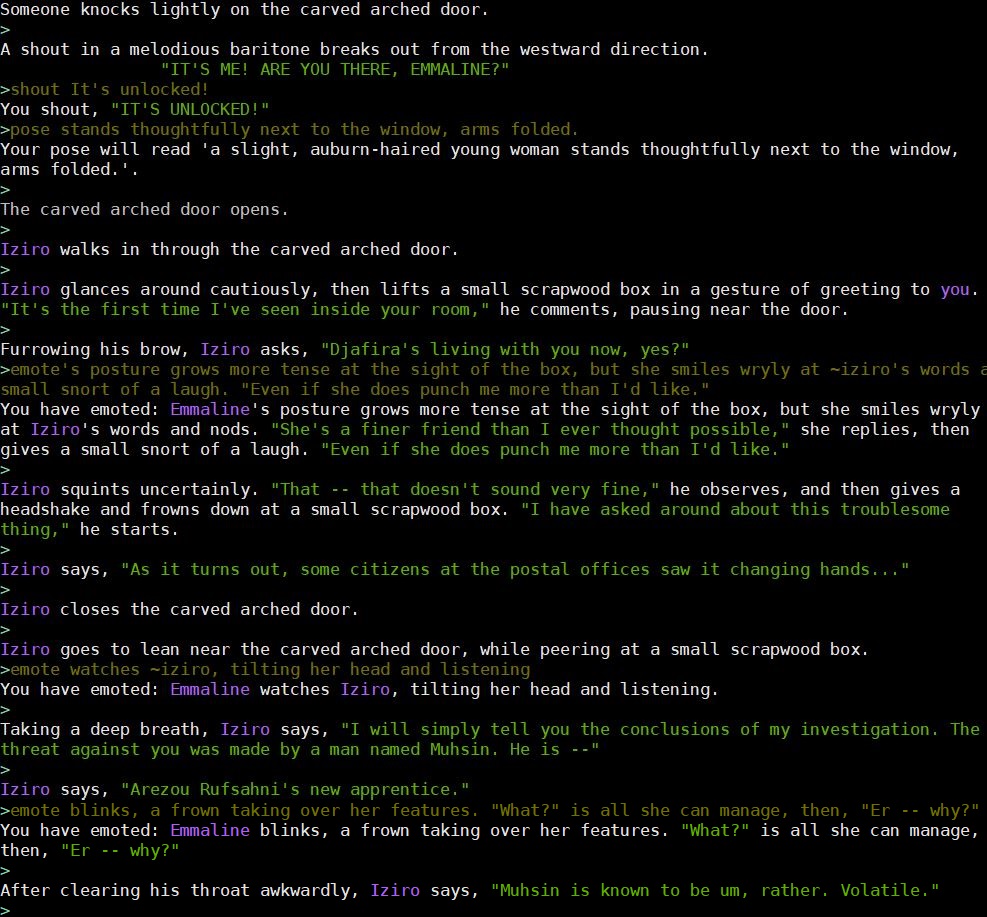
Iziro has taken the box, investigating at courier stalls and the post office, and finally discovered who had it sent based on local rumors. (We showcased these rumors in Chapter 7, where Emmaline found out that Djafira had planned to have her killed.) The person threatening Emmaline now is none other than Rufsahni's new apprentice! His name is Muhsin, and he seems to be known as somewhat insane... Poor Rufsahni doesn't seem to be having much luck with his apprentices these days.

Knowing now who the source of the threat is, Emmaline, Iziro, and Djafira plan to set a trap. They want to capture this Muhsin, interrogate him, and see if they can convince him to stop threatening Emmaline. Since the Poets' Guild is so strict when it comes to propriety, and will certainly not approve of one wayward apprentice trying to murder another (again!), they're sure they will be able to blackmail him into ceasing his aggressive behavior...
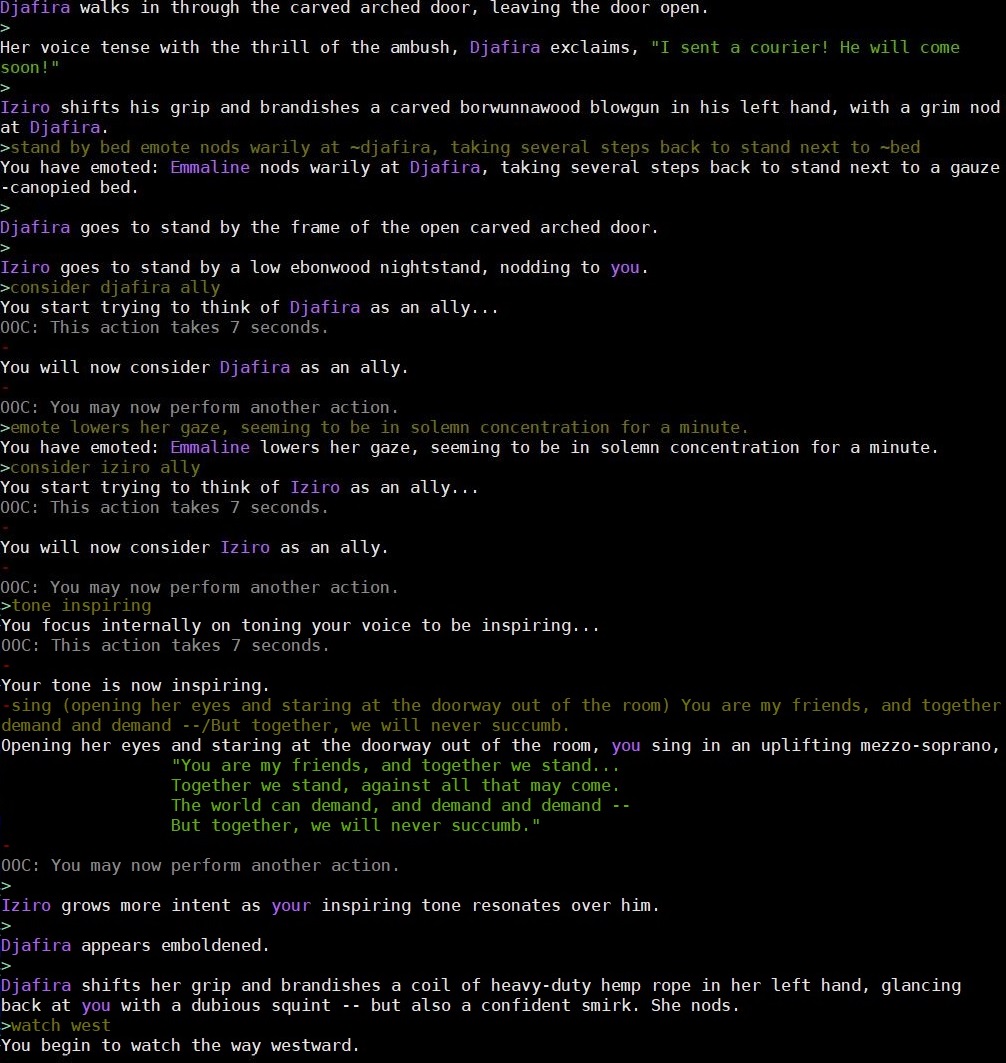
The first step of the plan is to send Muhsin a courier, inviting him to come to Emmaline's room at the Nightwinds Caravanserai in order to talk it out. It's anticipated that this talk could turn violent, so Emmaline and her friends plan to get the jump on Muhsin. Being ready for an altercation from the start, they want to lure him to her room so that no patrolling guards will happen upon the scuffle.
Here's where planned and coordinated team tactics come into play in a combat situation. Emmaline has convinced her friends that she will be capable of singing in order to boost their strength, and to weaken Muhsin. Iziro and Djafira may not fully believe in Emmaline's magical capabilities, but they trust her and have agreed on her part in the plan. So, before their target arrives, she will sing to bolster both Iziro and Djafira. Then, she will change her tune, and direct her singing towards Muhsin. Her new Gnosis ability, granted by Zreni's tutelage, allows her to mentally protect allies and exclude enemies from her area-wide beneficial magical abilities.
Emmaline needs to ensure that she has time to use her voice, and that means that she must stay back from the fight. Since her abilities can be used at range, she takes up a position far from the entrance of the room, next to the bed.
Together, the three friends WATCH the walkway outside the room's door. The door is left open, and Iziro is standing back as well, wielding a blowgun. He plans to fire a poisoned dart at Muhsin that will potentially induce a state of weakness and weariness if it strikes true. As another ranged component of their tactics, Iziro will be positioned at a different room object from Emmaline -- the nightstand.
Muhsin might choose to rush either Iziro or Emmaline, but he will still be far enough away from the other person that they can use ranged attacks easily. Watching the exit will let everyone see Muhsin as soon as he enters line of sight, which extends for two rooms outside Emmaline's door -- from the interior of her room, there's the room immediately outside (the small iwan), and then there's the second-story walkway, where Muhsin will come up from the caravanserai courtyard.
Because Iziro will start aiming at Muhsin as soon as Muhsin walks into their line of sight, this will initiate combat while Muhsin is still outside the door. That means that simply in order to get inside the room, Muhsin will need to CHARGE at the entrance, and then charge through the door. (To move between rooms in combat, it's necessary to use CHARGE, RETREAT, OR MANEUVER movement commands.)
Even once Muhsin gets inside the room, he will only be positioned right beside the door, and thus still unable to directly attack either Emmaline or Iziro with a melee move.
The only downside to this plan is that Muhsin could immediately flee. But knowing what they've learned from Iziro's intel, the group doubts Muhsin will attempt to escape. They think it's far more likely that he will crazily charge at them instead. He could be dangerous, however -- nomads in the province of Rahoum are known to be skilled with scimitars, and frequently carry weapons. Drawing a scimitar will cost him another combat turn, though, and hopefully the friends will have deployed their strategy successfully by then.
Djafira, with her fighting pit experience, is going to be standing next to the door. When Muhsin charges, she will attempt to wrestle him into submission and then tie him up with rope. Once he is restrained, the three friends will stop fighting, and attempt to interrogate their captive quarry.

Muhsin moves into sight, and Iziro aims! Aiming triggers the start of combat for both Muhsin and Iziro.
Note here that Djafira has tried to GUARD Emmaline -- visible in that protective stance she takes up as she looks back Emmaline's way. Guarding gives Djafira a chance to intercept any attacks made towards her friend. She also earlier started to BLOCK the way out, meaning she will move to try and stop anyone who is attempting to leave. Obviously, she neither wants Emmaline to be hurt nor wants to let Muhsin escape once he enters the room. But whether or not she will be capable of actually defending Emmaline or stopping Muhsin is up to rolls of the dice, along with distance mechanics regarding types of attacks and movement.
Back to the ongoing fight! Iziro's first shot misses the mark. Muhsin is a bit far away, and it's not as if Iziro is a seasoned blowgun hunter... When Muhsin charges into the room, Djafira tries to tackle him and tie him up. Unfortunately, he's too heavy for her to knock down -- but Iziro's closer shot strikes Muhsin in the neck, and the poison circulates through his body almost immediately.
Emmaline blasts her song at Muhsin. Usually a song with negative effects might be difficult to pull off, especially for a novice sonomancer against a fully Grounded individual... but perhaps Muhsin is not fully Grounded. That would explain why he's so crazy. But it's also fascinating! What sort of budding magical creature is this insane antagonist? He seems horrified, recognizing Emmaline's capabilities.
However, players get to choose how their characters will react mentally and emotionally to effects like these, and it doesn't look like Muhsin is stopping at all. Regardless, the coded physical effect of the calming tone means he will at least experience negative stat modifiers for a while -- and this will be quite useful in combat. Emmaline and her friends have planned this altercation well!
Nothing can be planned perfectly, though. Djafira looks to be having some trouble, and with the poison dart having already struck it seems that Iziro wants to join the fray! His vehemence towards Muhsin may be something to be a bit concerned about... but for now at least, he's just trying to hold Muhsin still. Djafira's first attempt to tie Muhsin up fails, as he spoils it by moving.
However, Iziro is able to wrestle Muhsin into a grip -- likely relatively easily, given the severe weakening effects of the poison he used. Poison is not an easily obtained item, and though it can be quite potent, there are many difficulties involved in its creation and application. However, it can certainly be worth all the effort to prepare for an ambush, as our heroes have learned here.
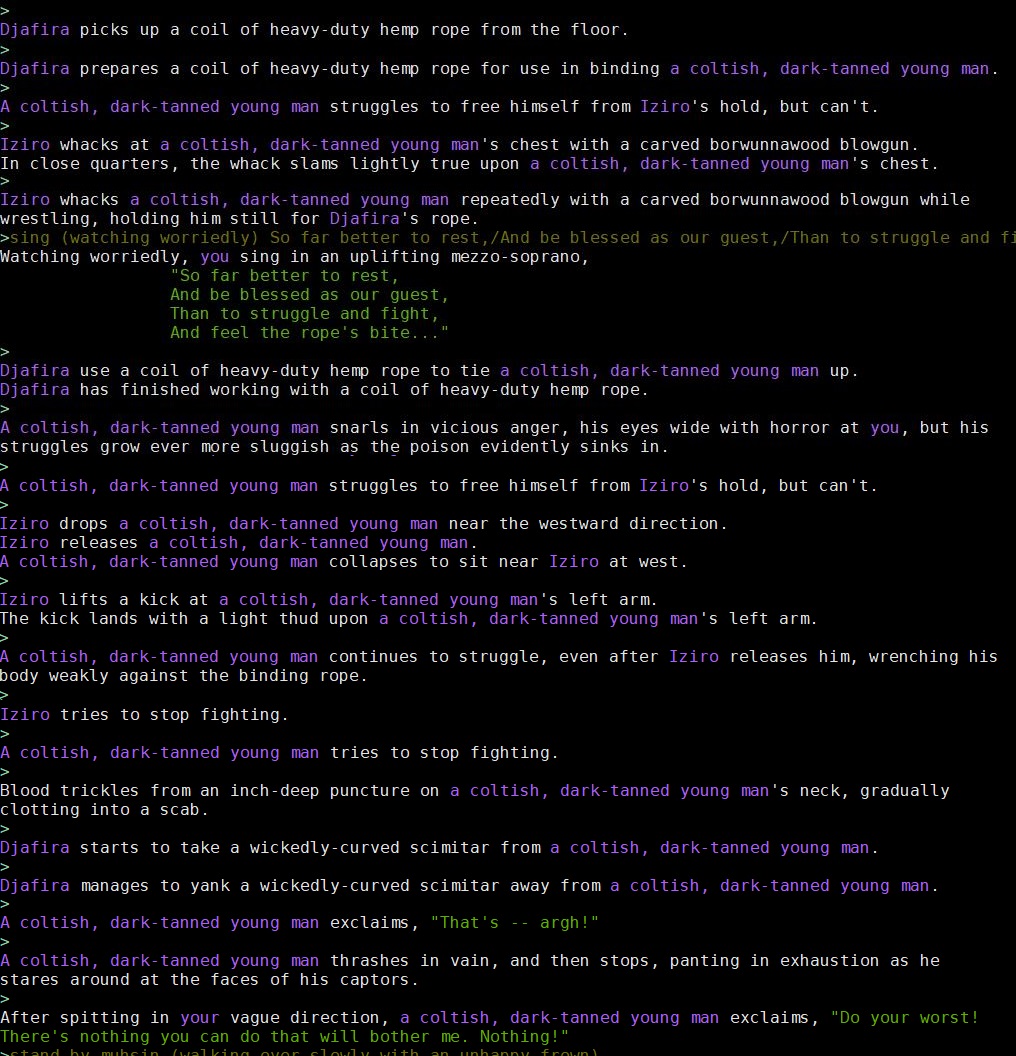
Muhsin's movements in combat are significantly weakened because of the poison. He can't escape Iziro's grip, and Djafira manages to retrieve the rope and finally secure him. She quickly snatches Muhsin's scimitar away from him -- using the TAKE command will give someone the chance to resist in various ways, but right now being both poisoned and restrained affects every option that Muhsin might have to resist the confiscation of his weapon.
Note that here you can see what happens to very small wounds that are bleeding. They don't need stitches or other such treatment, as the trickle of blood will just clot into a scab. The poison is not lethal, and will wear off after some hours, so it's quite unlikely that Muhsin will suffer any lasting damage at all from this fight.
Now Emmaline and her friends can interrogate Muhsin. It turns out that he is, indeed, very crazy... he doesn't even care about the chance of being kicked out of the Poets' Guild!
In the course of the interrogation process below, we're also illustrating the use of the X-card system. This is a feature that we expect to be used sometimes during the roleplay of character-versus-character conflict. We want all players to feel OOCly safe engaging in roleplayed conflict, and sometimes people can have different levels of comfort when it comes to graphic violence or other sorts of roleplay. An X-card is a simple way of communicating a boundary to the whole room.
Here, Muhsin's player gets a little on edge when Iziro menaces Muhsin's eye with a spoon. Issuing a yellow xcard shows that Muhsin's player is not okay with how graphic this scenario is getting! If he was okay with it, but needed a little more time to wrap his head around how to respond ICly, he could signal that with a green xcard. And if he was not okay with it happening at all, perhaps due to some horrific real life trauma involving spoon-based torture, he could use a red xcard to stop things completely and require a RETCON.
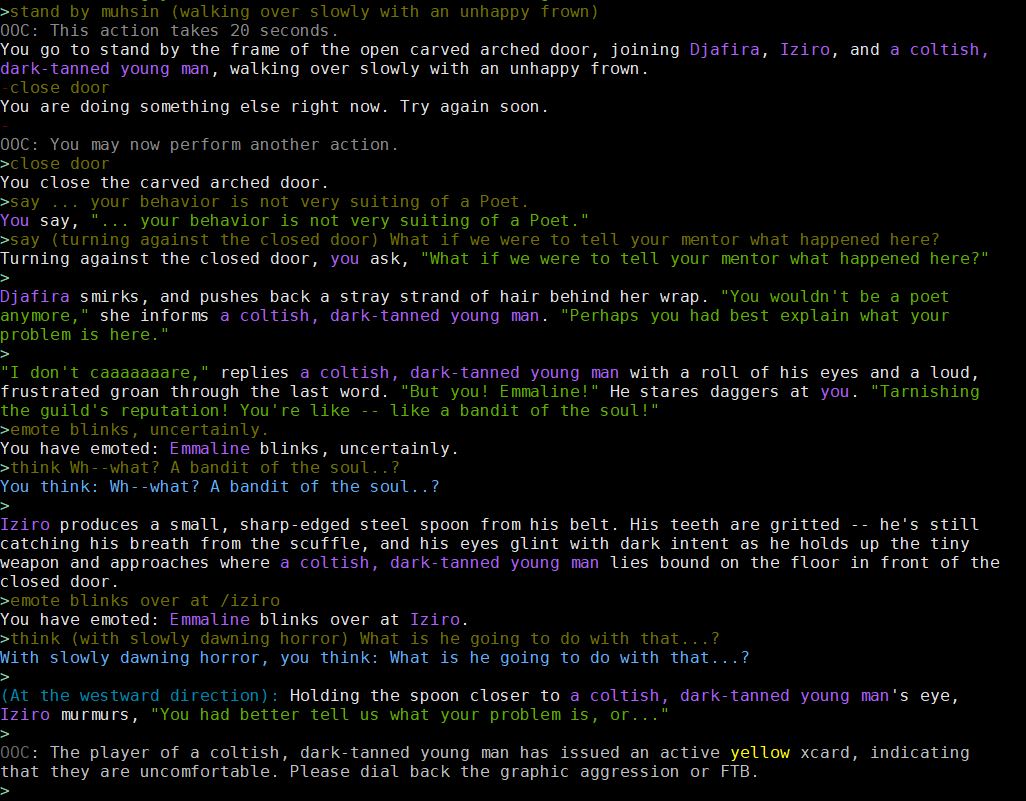
In this case Iziro's player did not want to FTB (fade to black), and it also turns out they weren't deeply attached to the idea of sharpened-spoon torture anyway. So instead, they proposed a quick retcon to their last emote. Everyone accepted that retcon, which means that all the roleplay logs involved no longer contain Iziro's spoon emote. However, a report on the situation has been automatically generated and archived, in case any staff member needs to look it up -- because of course, if these features are abused repeatedly for trivial reasons or to evade in-character consequences, that's something that should be REPORTed.
Here, Muhsin was clearly not trying to evade in-character consequences, since a FTB could have been used in such a way as to mechanically inflict damage on his eye all the same. He was just trying to avoid the out-of-character unpleasantness of having to read some graphic torture. That's a perfectly good use of safety tools, and we'll showcase the FTB command another time.
For now, Muhsin has demonstrated an alternative course of action in his next emote -- a way that Emmaline and her friends can turn his oddness to their advantage. There's something he's attached to, a goal that he values even more than his membership in the Poets' Guild! For it seems he has a mysterious crusade.... or perhaps not quite so mysterious, given he blurts it out almost immediately.
And apparently, despite being so fervently loyal to Arezou Rufsahni that he wanted to murder Emmaline for embarrassing the Poets' Guild, Muhsin is willing to change his loyalties after seeing the strength of Emmaline and her companions... because it turns out that the only thing he's truly loyal to is his own rather odd goal.
Emmaline offers to do him a favor in service to this goal, and in return, he promises to become their staunch ally.
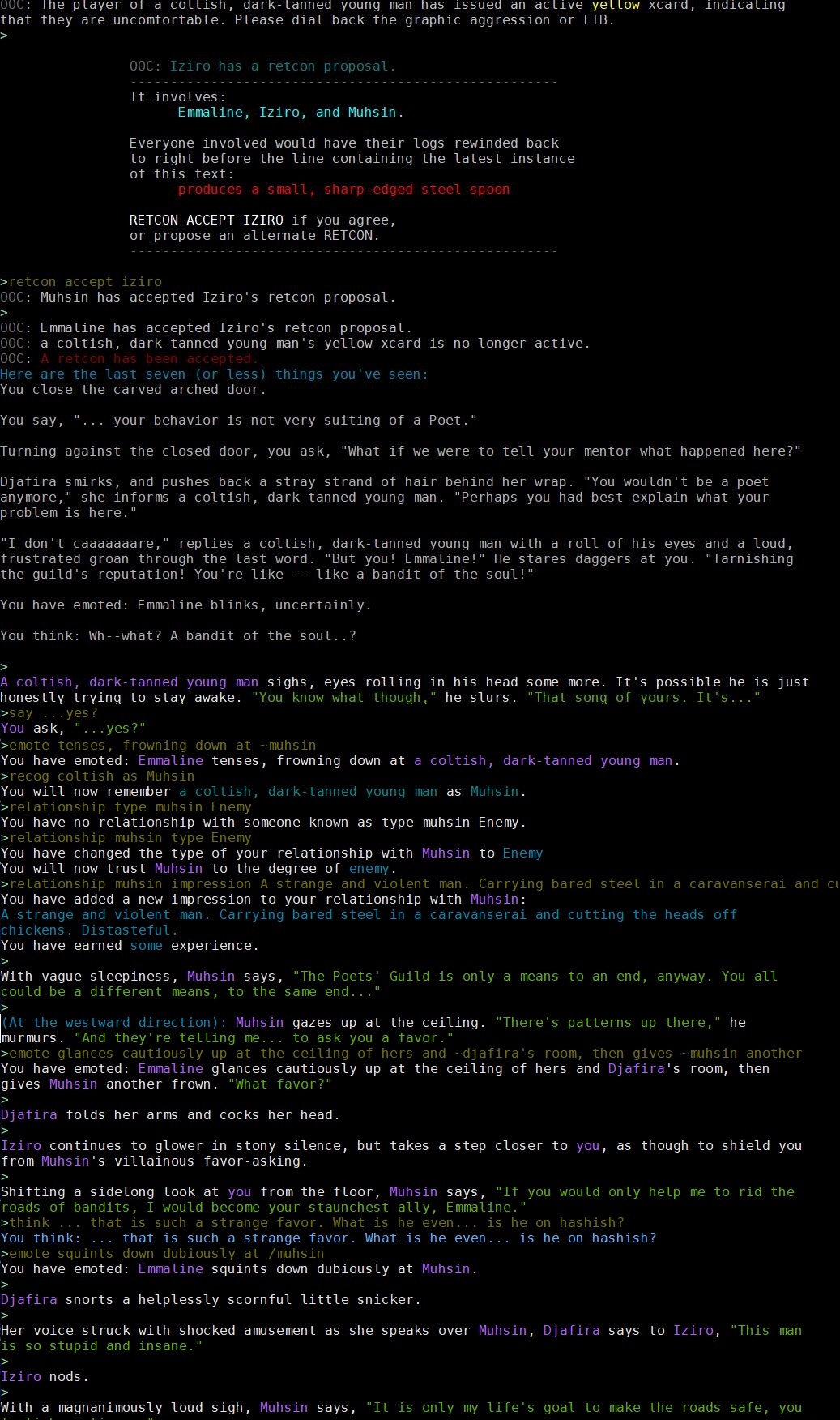
Dubiously, Emmaline confers with her friends, and finally they agree that they will attempt to help Muhsin. It's better than ending up involved in another dramatic public incident that could land them all in the Customs Inspectors' Quiet Room -- a prospect that their unstable new ally, however, doesn't seem to fear one bit.
Here's where, as a player, we're not really sure what Muhsin wants. He says there's a bandit encampment along the road near the Sharizaar Massif, and that in the past, the bandits stole his father's sword. But what does this actually entail? The OOCWhisper command was made precisely for situations like this.
Because we don't want to mar people's in-game immersion with regular OOC chatting, there is no OOC channel that goes to the whole room, and there is also no game-wide OOC paging mechanism. Instead, there is a whisper command that can be used for one-on-one OOC communication as needed, which can help deal with individual confusion as in this scenario. This command only works for those currently in the same room with you.

It turns out that the bandit encampment does not currently exist as a coded region in the game, and is only an imagined place that features in Muhsin's character's background. This is much like the personage of Mira the hedge witch, who is not a coded NPC who actually exists in the game, but simply part of Emmaline's background.
So what did we mean when telling Muhsin we'd use the DungeonMaker? As it happens, Song of Avaria has a system that allows players to build new areas in-game, complete with coded NPCs and objects -- bringing their imagined places into the actual game world.
This system, the DungeonMaker, is the final focus of today's showcase!
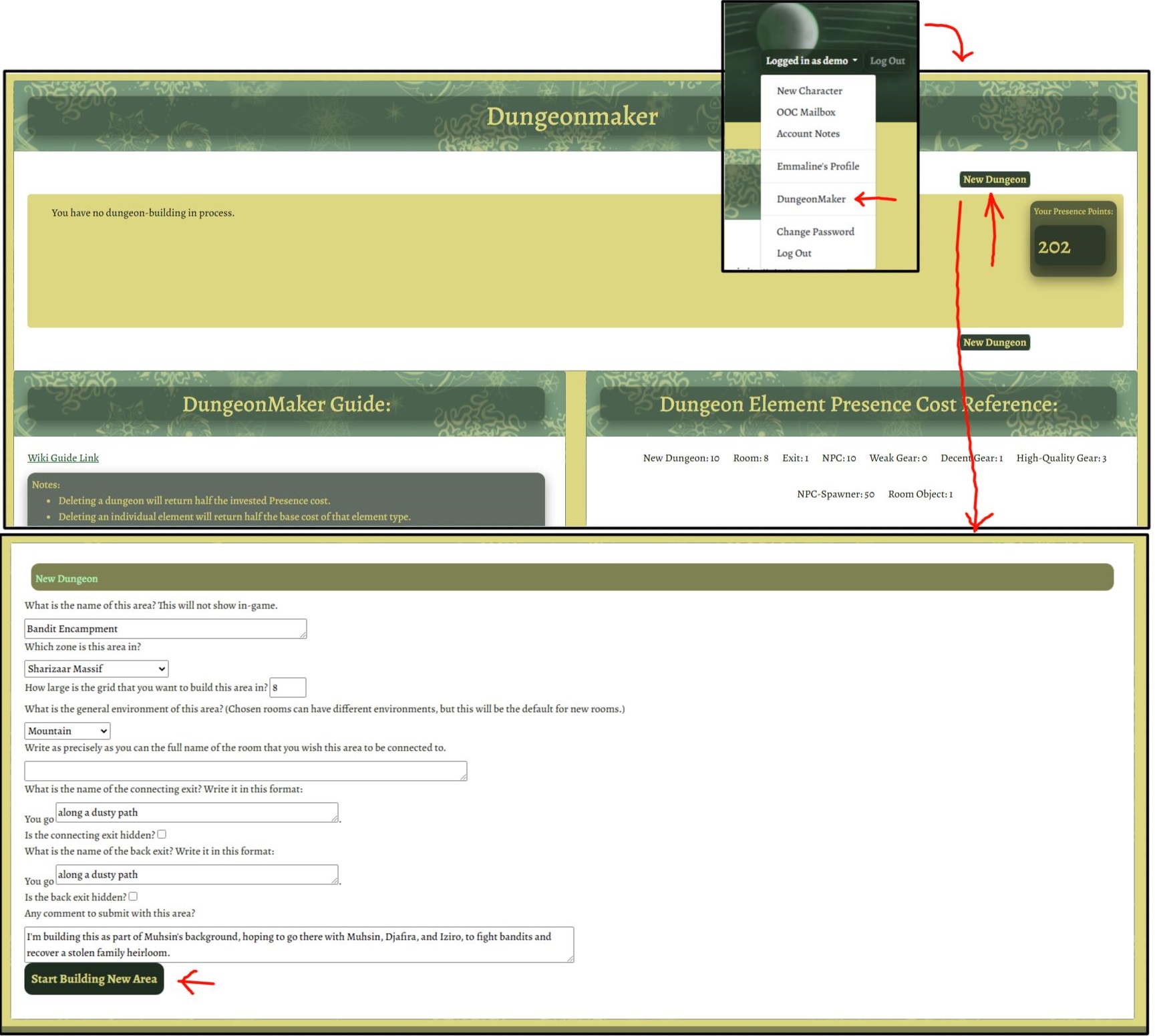
We're able to open the DungeonMaker interface through the website. You may have glimpsed the link in other chapters, whenever seeing the logged-in account dropdown menu. This brings us to a list of currently-in-progress dungeons, of which we have none for the time being. But not for long!
The area we're going to build with this tool doesn't necessarily need to be a dungeon -- it's just the name of the feature, because it allows for players to enjoy story-based campaigns with their friends, much like Dungeons & Dragons.
It's a little difficult to fill out this form, however, because we have never been to Sharizaar Massif -- a place well to the south of Omrazir, on the very edge of the current expanse of the in-game world. The form requires the name of a linking room, and this would be in the area of the Sharizaar Massif. But we have no idea how to start this up, and honestly may be a little lost in terms of what we should build that is thematically appropriate.
Here is where another form of OOC communication comes in: direct private communication with game staff, using REQUEST (or PETITION). There are multiple ways to communicate with staff, from submitting BUGs, TYPOs, and IDEAs; to raising ISSUEs with other players or REPORTing a problem in an entirely anonymous manner that doesn't even the log the reporter's identity staffside.
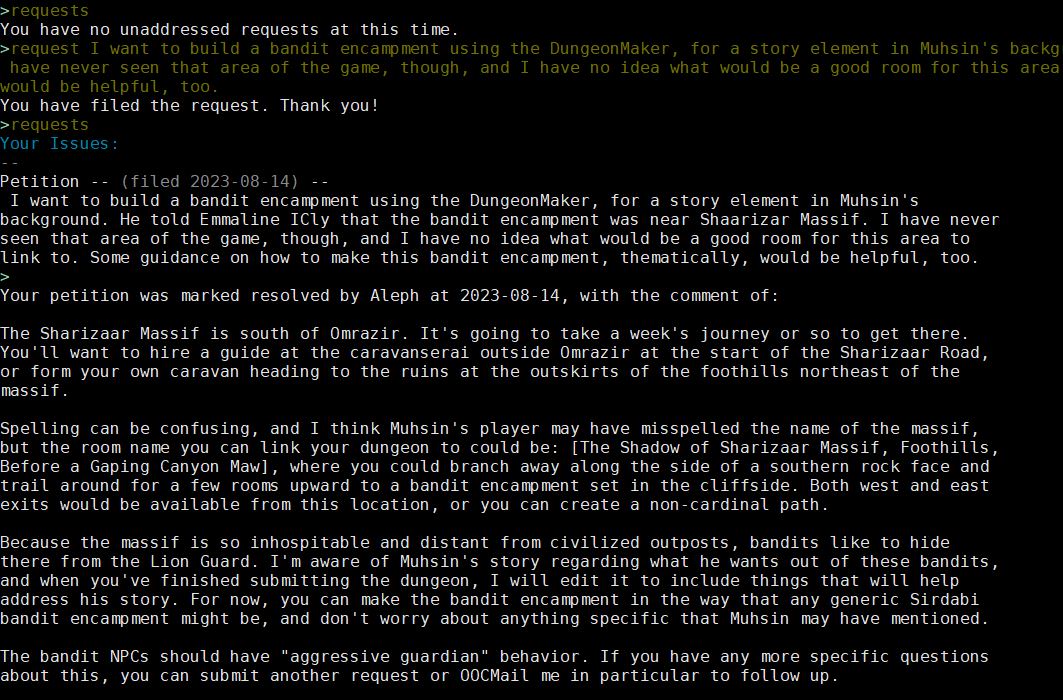
We have a resolution to our request that gives us a bit of direction for the area, so we can fill out the form with a room name. Creating a new dungeon leads us to a panel that shows a map display. Mousing over this map display and clicking on nodes will allow us to build a new room in that node, or edit a room we've already created. Clicking on the node where a link between rooms is present will allow us to edit that link.
On the right side of the screen, we can edit the room attributes, such as the room name, the description, and the environment. We can add water to the room, and set the water's type and depth. We can create links to adjacent rooms, and edit those links as well. The exits in those links can even be hidden, making them inobvious to someone just looking at the room description. There are lots of ways to customize an area, and to make it interesting to navigate through and explore. Building dungeons costs Presence, and putting specific features in the area, such as hidden rooms, costs a little Presence more.
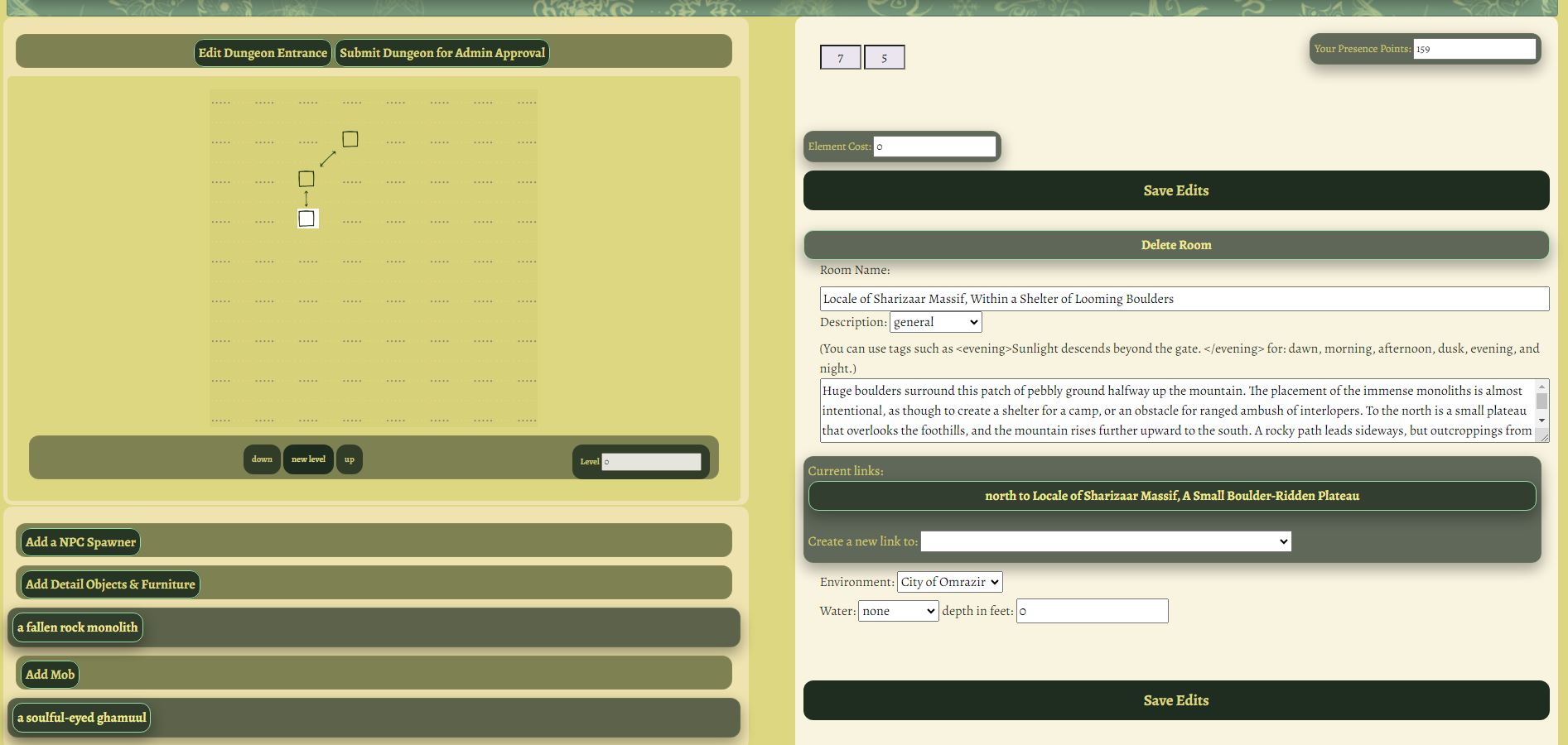
On the bottom left side of the screen, below the map, is a list of the coded objects in each room. These objects include places (like furniture, trees, fountains, or any other room object at which people can be positioned), which can be edited to have various interactions and manipulations. Such objects could also be NPCs, whose basic appearance and behavior can be edited. There is also a button here for creating those room objects or NPCs in the first place. These can all then be edited through the same interface here that is used for editing rooms and exits.
When building a dungeon, you can add one of a special type of object: an NPC spawner. For a situation like Emmaline's, there could be a large number of bandit NPCs to build -- realistically, hundreds. Designing each one individually would take a painfully tedious amount of time. For that reason, we have NPC spawners of various types, which will generate random NPCs based on an outline of guiding possibilities.
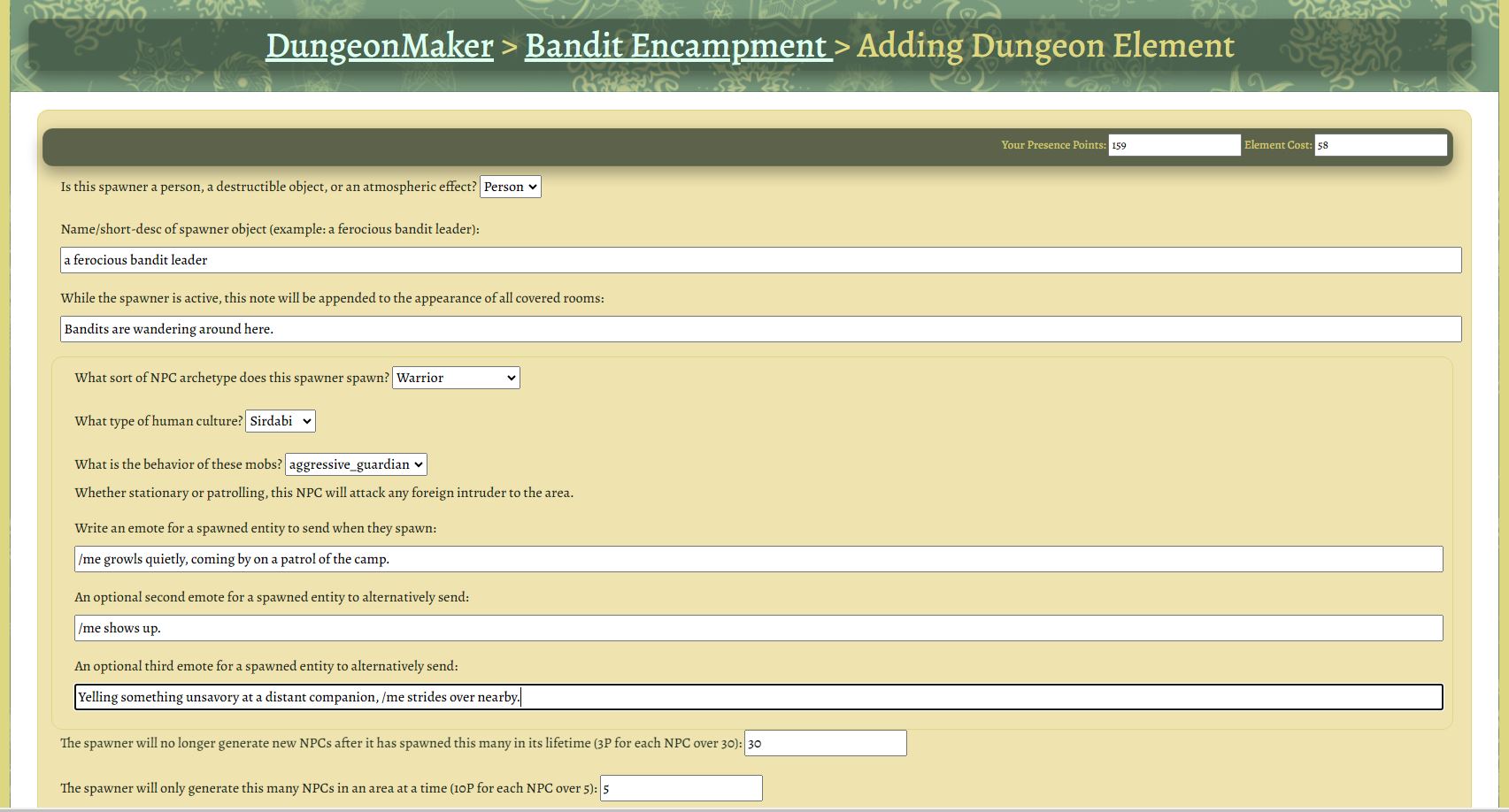
When adding an element to a dungeon, the DungeonMaker takes you to a separate page that contains a form where you enter values depending on what you want the element to be. Some of these can be edited later as well, when selecting that built element from the DungeonMaker interface. For an NPC spawner, the majority of these values have to do with the NPCs that will spawn.
At the end of the form, there's an extra spot to put in special comments or requests. We're going to put in a request for an option related to being able to infiltrate bandit camp -- we'd like for the bandits to have some kind of signifying accessory that we can potentially steal, and use to disguise ourselves to look like we belong in the camp.
While this may sound a little far-fetched it's actually a very doable request, because uniforms that mark organization membership already exist in the game, and it's possible for NPCs to exhibit different demeanors towards characters who are recognizably part of specific organizations. While this option is not currently hardcoded into the DungeonMaker, it might be someday, and for now it's a very reasonable thing we can ask for.

An NPC spawner is the most costly element of a dungeon to add, and depending on its metrics, it will cost more Presence. Besides being a small measure of player investment, Presence acts as a constraint for some game features that we want to be limited, whether for reasons of lore or mechanics. While it's very important to us that players are able to build their own spaces and have the freedom to tell their stories out in the world, it's also the case that our complex and immersive world can use up a lot more overhead processing than a very basic MUD engine would. So while we're constantly looking to streamline and improve the efficiency of our code, it's a technical reality that adding thousands of NPCs patrolling at once could slow down the server painfully! Requiring Presence for creating and customizing dungeons helps to measure out that kind of growth carefully, and simultaneously ensures that a fair amount of thought, consideration, and roleplay lies behind the creation of every dungeon. We will discuss the various uses of Presence more thoroughly in the next chapter!
For now, we'll build a second level by clicking "New Level" right below the map in the interface, and selecting for the level to be placed upward from the current rooms. We'll build a trail around the cliff face that leads eventually south through a rock arch, into the main encampment -- a collection of rude shelters around a central meeting point. We'll situate a small cave at the top, where we'll describe a storage area for the bandit encampment. And in this storage we'll place a room object that acts as a treasure chest -- most likely containing Muhsin's family heirloom that was looted by the bandits in the past!
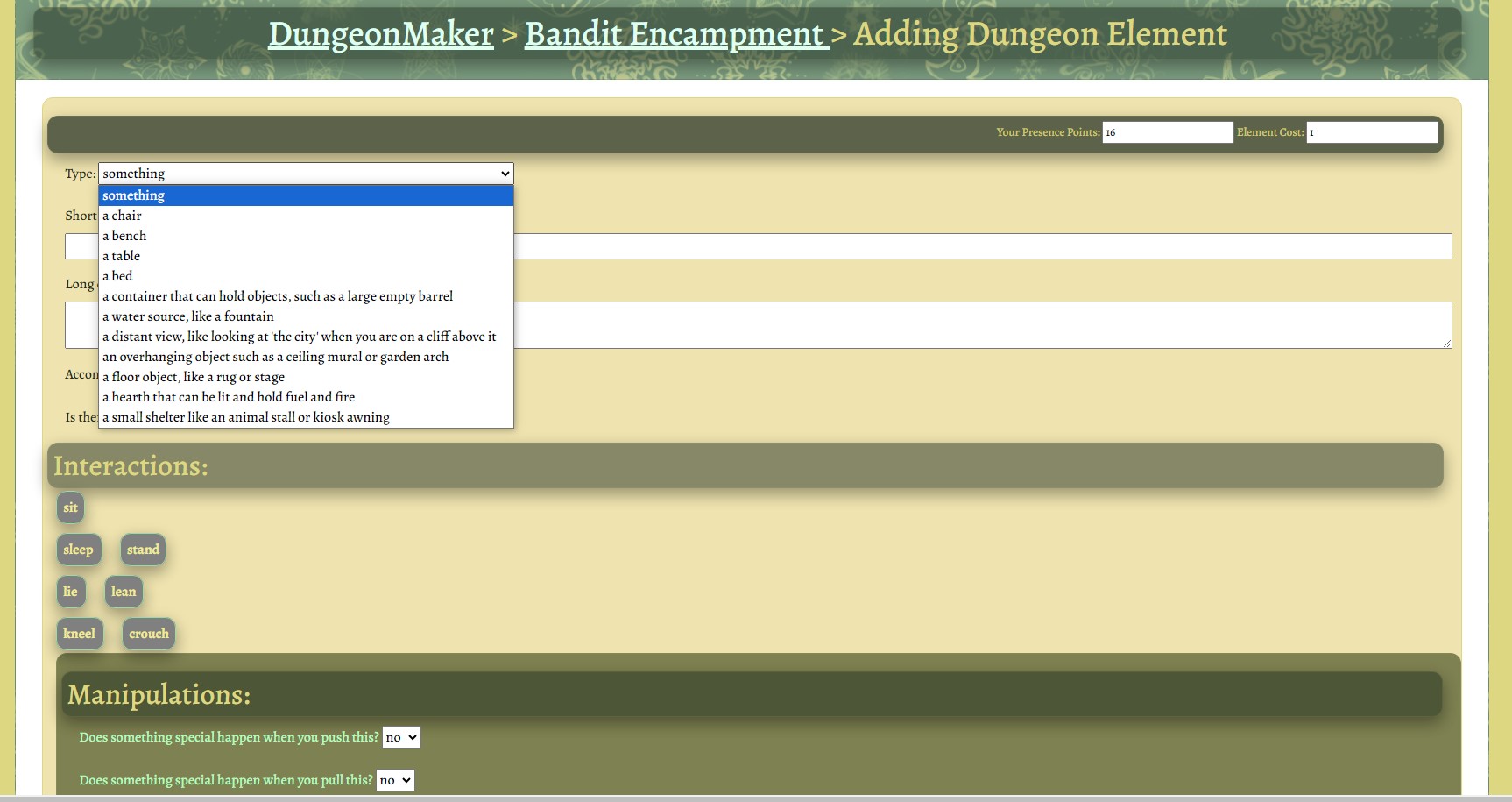
This "treasure chest" is going to be a square wooden crate that you can also sit on! Now we'll make a firepit object in the middle of the camp, and a couple of lean-tos that can act either as shelter from the weather or tactical positions for combat, and then submit our dungeon for staff approval.
It costs no extra Presence to make room objects engaging and fun, and there are a great variety of types that can be added, with different behaviors and custom interactions and manipulations. We hope that players will take their time with this process and enjoy it, especially if they're building places from their own character backgrounds -- such as their ancestral home, potentially taken over by monsters, but with the chance of exciting reclamation!
The possibilities are very extensive, and if there is something special that you would like to see coded into your dungeon, but it's not yet available in the DungeonMaker tool, you can edit the comment before submitting the finished project for approval. Here, once we've submitted our dungeon it still shows up in our list, but the status is "Submitted" and it cannot be edited by us anymore.
As it is, there is a great deal that dungeon-builders can do directly from the existing DungeonMaker interface -- from making engaging puzzles or traps via object manipulations, to simply describing beautiful and thematic areas that characters can make their own in an immersive, organic way.
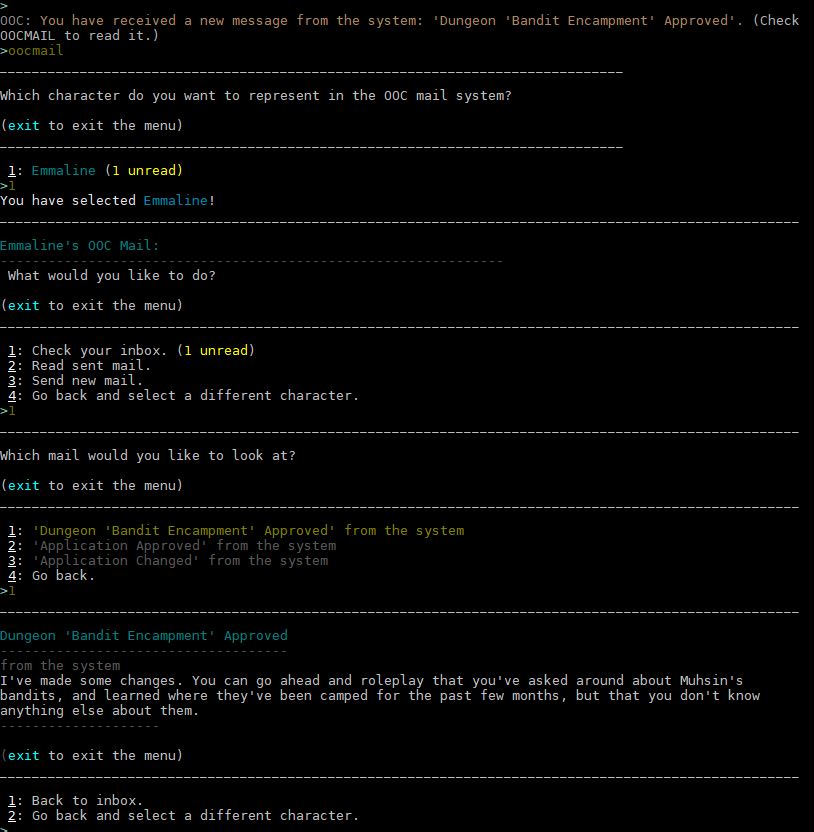
Our dungeon is approved (we can see this by viewing OOCMail from the in-game menu) and now we know that it's out there present in the game world, connected to the map at the location we defined. Although we designed and built it, it doesn't belong solely to us. If someone else happens upon the area and steals the treasure before we get a chance, that's not something we have the right to retcon. We can roleplay about what has happened, however, and find in-character ways to deal with whatever occurs in the game world.
The staffer that approved the dungeon gave us a way to roleplay about how we now know where it is. In some cases, it may be possible that your character really has no idea of a new area's location -- simply building a dungeon does not make its whereabouts in-character knowledge. In other cases, the area might be a place from your character's own background that they know about in great detail. Remember, the DungeonMaker is an OOC tool, and shouldn't be used as an IC one under the guise of roleplaying that your character is building, clearing, or cultivating an area themselves. There are IC abilities to cover activities like those, which should be used for those purposes instead of the DungeonMaker.
Often, if someone is trying to build something that belongs to them, they will make it in an area that only they are able to access (such as, for example, Arezou Rufsahni making a hidden closet that takes him from his own personal office into Narnia), or hidden in such a way that only they know how to gain entry (such as by setting up a tricky puzzle directly at the area's entrance that uses obscure room object manipulations), or else the area may just be so rife with danger that it will take coordinated effort to pass through.
In this case, the bandit encampment that we built is rife with danger indeed! Tune in again next month for the adventurous Chapter 10, when our brave band of friends will venture forth to see if they can overcome those dangers, and secure their future!
Chapter 10: FELLOWSHIP
-- Intro:
We're working on a new MUD called Song of Avaria, using Evennia as a base code. Hopefully, the game will be opening for a public alpha three months from now: January 2024. This is the tenth in a series of showcases to display the features of our game. In order to properly exhibit the purpose of Song of Avaria, which doesn't quite fit into the existing molds, we're going to demonstrate gameplay by focusing on the story of a character: Emmaline.
-- Chapter 10: FELLOWSHIP
Last month, we showcased the DungeonMaker system to illustrate the creation of a new in- game area built by a player in order to help them pursue their own storyline. As part of our ongoing saga, a crazy guy named Muhsin had threatened Emmaline by sending her the severed head of a chicken, and so Emmaline and her friends laid a trap for him -- but after the trap was spring, Muhsin promised to leave her alone so long as they all help him do one thing...
And that's the thing we'll do today! Emmaline is going to help Muhsin retrieve his family heirloom from the bandits who stole it. Of course, Iziro and Djafira are going to help. But Emmaline is about to receive some additional help from an unexpected quarter...
First, however, we want to revisit the concept of Presence as discussed briefly in the last chapter. So far, if you've been following the showcases, you've seen that Presence is awarded daily for things like logging in, emoting, and generally engaging with the game. It's relatively easy to get a handful of Presence points a day simply by playing the game normally, and players can also earn Presence points by competing in playtesting rankings (submitting bugs, typos, and ideas), posting on the forums, and so on. It's also possible for players to express ESTEEM for one another, which gives another player Presence. Finally, staff can award Presence at their discretion, generally to encourage good player storytelling and roleplay.
These points go into the player's account, and can then be invested in a number of possible ways. They can be put into Story Arcs (to increase their priority for being addressed that month), invested into a particular character (to increase their Presence level, which can unlock special abilities that we want gated behind responsible roleplay), or used to raise the player's account level (higher account levels can unlock more heritage and origin options in character generation). Whenever there's a feature that we want to put in the hands of players, but at the same time we want it to be used in a more limited fashion and with a sense of responsibility, we will likely make it depend on Presence in some way. The DungeonMaker system showcased in the previous chapter is a feature where Presence can be spent on out-of-character building methods.
When balancing anything, including Presence costs, we try to consider the time investment of an average player with healthy playing habits. In the case of last month's DungeonMaker, for example, Emmaline would have been playing for eight months. If she was playing possibly two hours a day, three days a week, by that point she would have racked up about 200 Presence points simply from ordinary automatic rewards. As we saw, that was plenty of points to allow her to build a multi-room bandit encampment with an NPC spawner and some interesting atmospheric objects.
Now, Emmaline is sitting in the women's sauna at the Nightwinds Caravanserai, cleaning herself up after a mishap with a camel in the stables. And then, Zreni the griot comes in...
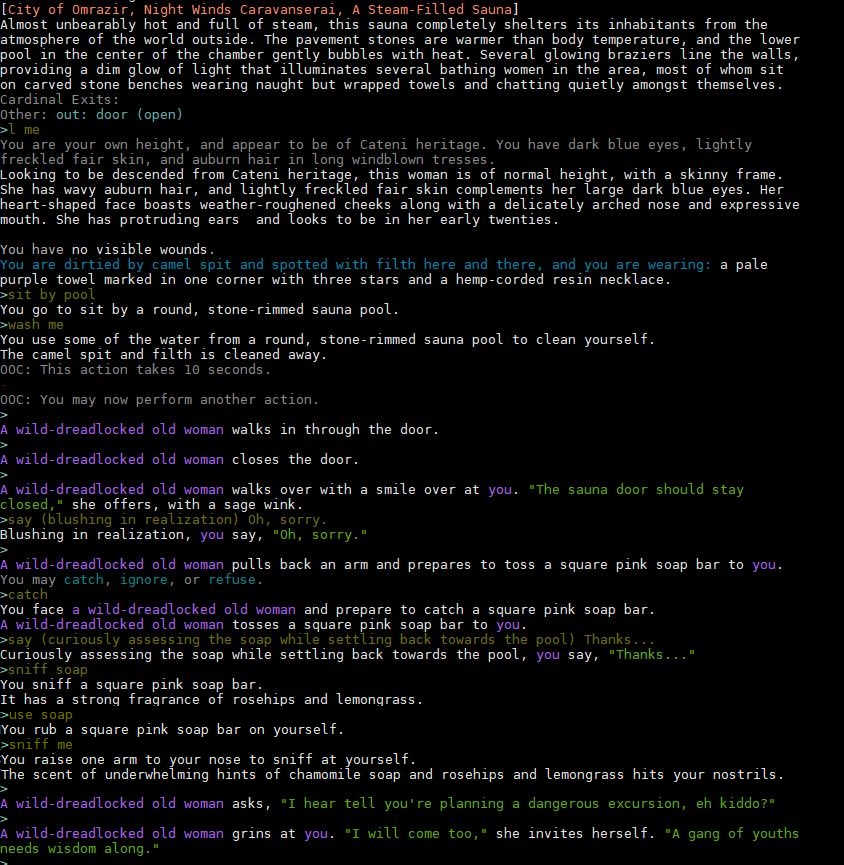
Well, it looks like Zreni is coming to fight bandits. You can see the use of the TOSS verb here, which can be used as an alternative to GIVE, and also the use of scented objects and messes.
Every physical object in the world is capable of accumulating scents as well as messes of various kinds, most of which can be washed off. Some scents might be pleasant ones we actually want on our things, while others we want to wash off -- like camel spit!
You may remember from character generation that you can assign a personal scent as part of your character concept. Personal scents don't have to be put in only at character creation, but can be added later as you become more familiar with your character and their habits. Maybe they smell like something from a job or hobby -- wood shavings and glue for a fletcher, for instance -- or maybe they always carry the scent of smoke from camping outdoors all the time. There are all kinds of possibilities. In any case, this smell tends to rub off on whatever a character handles or wears for any great length of time, and it's one of the in-character ways that you might be able to track someone's recent activity or presence. You don't have to actually go around sniffing at people to know what they smell like -- you can simply INHALE with a person as a target, or with them nearby, and you'll catch a whiff of their scent. Messes as well as scents are useful for tracking previous activity -- if you know someone's personal scent well, you might be able to recognize that they've worn a shirt for a while by sniffing the abandoned garment, and if the shirt also has blood spatter on it you might have suspicions that something bad has befallen your friend.
Bath perfumes and detective work aside, it's important to prepare adequately for a large undertaking like a journey. The bandit camp is at the Sharizaar Massif, which is a few days' travel from Omrazir. The amount of time it takes to make a significant journey in-game tends to be a bit less than it would realistically take if you calculated out the actual on-the-map distances and applied pre-modern rates of travel. But we wanted journeys to feel impactful while still remaining fun, so most will take at least a few days while allowing players to roleplay about their trip along the way, especially with any traveling companions they may have.
Journeys, over either land or sea, also expose characters to a plethora of possible risks as well as some limitations. Post offices and courier outposts may not always be readily available while traveling, and one's usual habits of eating and drinking become dependent upon the supplies stocked with one's caravan. Traveling more quickly than one's endurance allows, or through particularly bad weather, can become risky and travelers may get sick -- forcing the whole caravan either to halt or to abandon their lagging companion. Wild animals, bandits, and other such perils may plague the roads. Major travel is both an adventure and a hazard!
Sharizaar Massif isn't such a long journey that we need to worry about too much of that, though (and there will be many nearby locales in the game that people can walk to in the ordinary way, without needing to use the journey system at all). Here we see Emmaline forming a caravan and inviting along Iziro, Djafira, Muhsin, and Zreni. We'll also hire a guide, who will help with any troubles we face in addition to bringing a tent and campfire supplies.
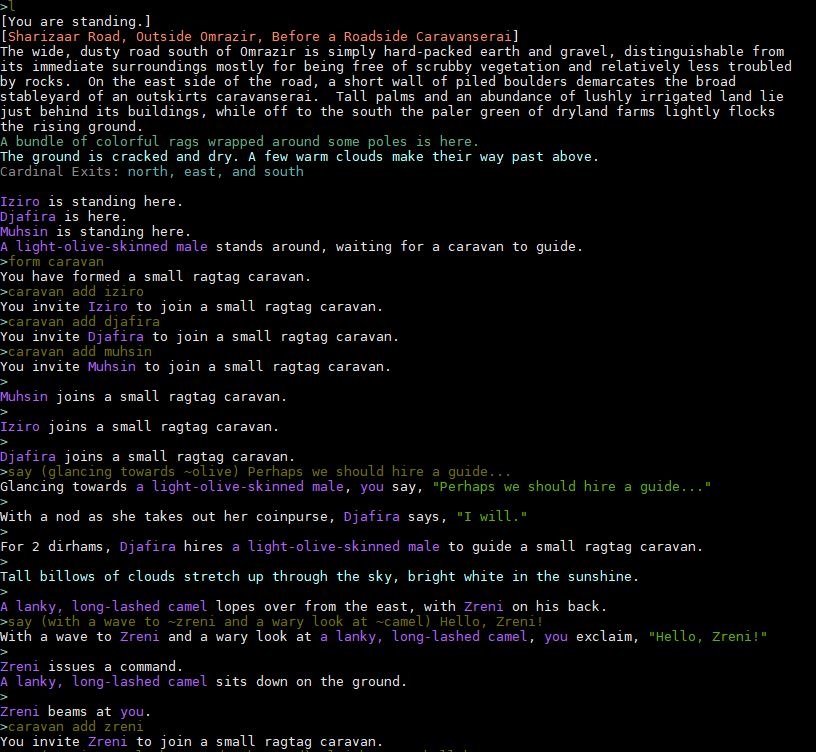
Adding other characters to the caravan is done through the CARAVAN ADD command, which gives that character the chance to accept or refuse the invitation. The same command can be used to add a guide to the caravan. Charging a one-time hiring fee, the guide is an NPC who will accompany the caravan and provide some security from various journey-related risks.

Anyone who has been invited into the caravan can add things to it, including tents and animals. Zreni is one person who is bringing some extra possessions, as someone accustomed to doing much traveling of her own. She adds these to the caravan herself: her camel, which she rides, and a tent just for her.
Once the caravan is put together to everyone's liking, the caravan leader (the person who formed the caravan in the first place) can use the CARAVAN GO command to set a destination and put the caravan in motion. The leader can also stop, disband, or change the direction of the caravan at any time.

The caravan moves along across the overland map. We can use commands to stop and go, and to check out the caravan's status. At night, the caravan will come to a halt, while the guide sets up the tent and builds a campfire. Any tents which are packed up as part of the caravan will also be pitched at this point. All of this provides an ideal atmosphere for roleplaying out the journey, whether walking along with the caravan during the day, or talking around the fire before bedding down in the tent for the night.
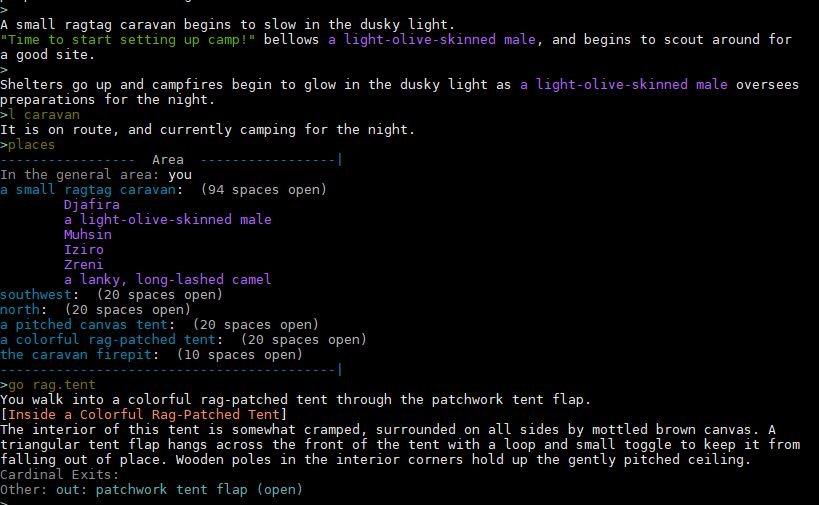
Logging out will not delay a journey; the caravan will keep moving even while some or all of the people in it are offline. Any momentous event that occurs on a journey will get OOCMailed as a plot note, and the caravan will continue along until it reaches its destination. The caravan, as you can see from this experience, is not really a physical object so much as an organized group of travelers moving along together and sharing resources for a journey. It does function as a vicinity, however, so that two caravans on the same node in the route will have their own sort of space to occupy.
And here is where our particular caravan is going:
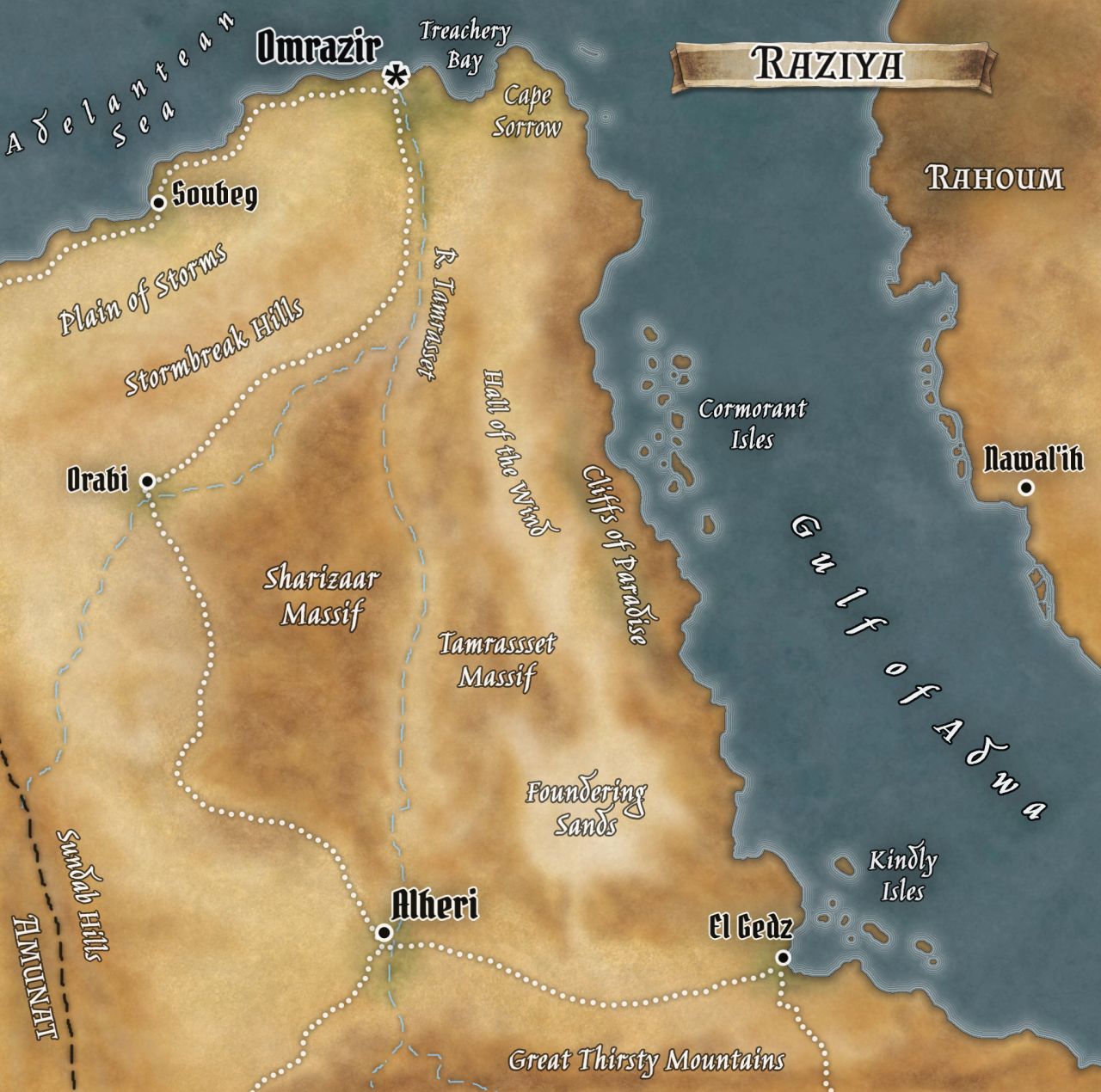
On the game wiki we have several of these overworld maps, showing parts of the different continents and the various provinces, kingdoms, or other regions that lie within them. The map of Raziya (the Sirdabi province in which Omrazir is located) shows us that the Sharizaar Massif isn't really too far from Omrazir. Emmaline and her friends are journeying along the dotted white line on the map, which represents one of the province's major routes of travel. (The dashed blue line is the River Tamrasset, which largely flows underground but waters the oasis around the city.) The Sharizaar Road goes from Omrazir to Orabi and then points further south, but there's a stop on the way where one might head off to the massif itself.
Here's an image of what the route looks like in-game. All of the rooms on this route are connected via journey-exits, which take a longer time to move between than normal exits do, and can be travelled while offline -- if you set out on an eastward journey, for instance, you'll eventually get there whether you're logged in or not. While a caravan aims at a particular destination along the full route, and will keep carrying you forward until you get there, a solo trip will let you travel room by room, making a smaller journey between each one.
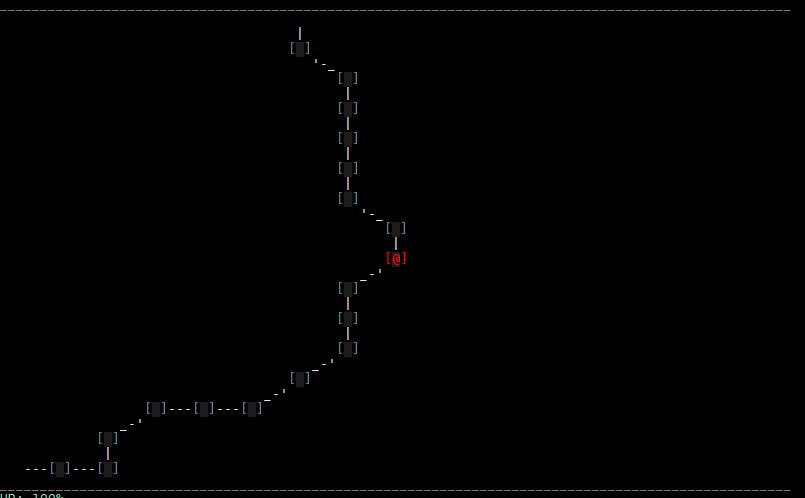
We want journeys to feel like stories and to capture a sense of the largeness of the world, so that's why we prefer not to completely gloss over the time spent on them. It's highly recommended to take long journeys with others, rather than alone, unless you really enjoy roleplaying by yourself for a potentially long time.
This journey takes just a couple of days. We can roleplay around the firepit or in the tents in the evenings, and roleplay while traveling during the daytime. When the journey finishes, we'll be at our destination. Before too long, we get this plot note that states we've arrived.

So, we'll log in. It looks like everyone's online -- how fortunate! In reality, your entire party might not be present when you log in, but you'll see them in the caravan status from the CARAVAN command, and you can just roleplay that they're traveling along with you in the background.
Right now, we'll disband our caravan, which causes our guide to depart. This means we no longer have the guide's tent and campfire to use as our base of operations while laying a strategy to deal with the bandit encampment. But that's all right, because we can set up our own camp with our own items, and using the general outdoor-survival type craft abilities that are available to everyone.
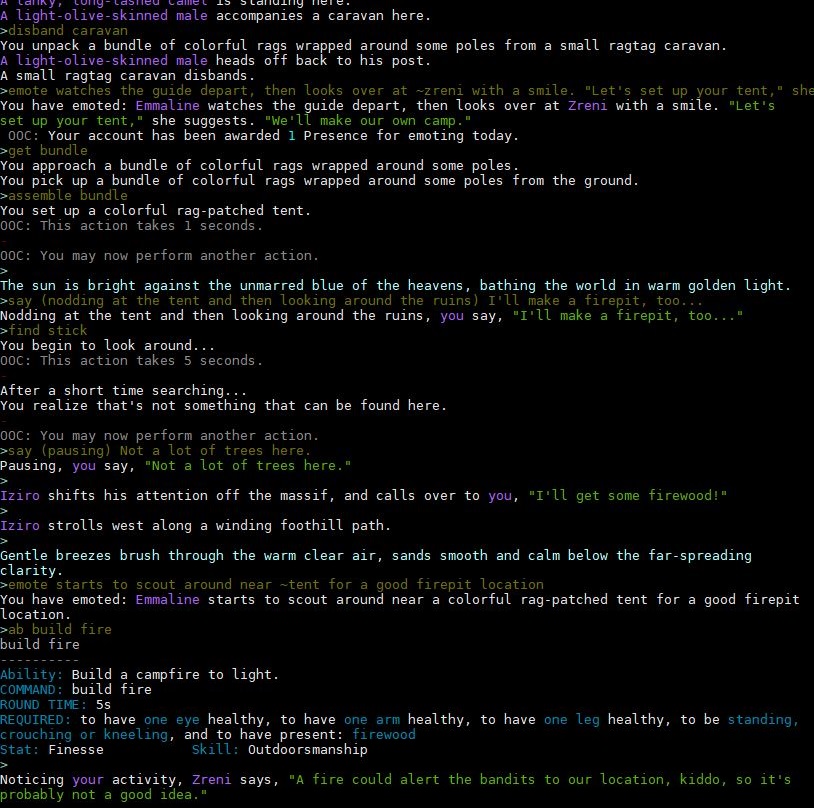
Emmaline starts to make a campfire before Zreni points out it's probably not a good idea to light a fire near a bandit camp. We don't want to alert any hostile parties to our distant presence! Attracting nearby enemies with a fire is not currently a coded mechanism, but it just makes sense to consider in terms of roleplay. Still, we can certainly pitch a tent. Hunkering down in the old ruins in the foothills, our heroes discuss how to strike at the bandits.
Iziro returns after having gone off in search of firewood, and claims he's scouted out the bandit camp! Huh! He seems to have some stealthy skills that might cause one to wonder about his history, not to mention those sinister spoon-torture inclinations which he showed after Muhsin's capture... Anyway, he says the camp is full of bandits, and there's no way he can imagine getting through unscathed while stealing back the bandits' treasure.
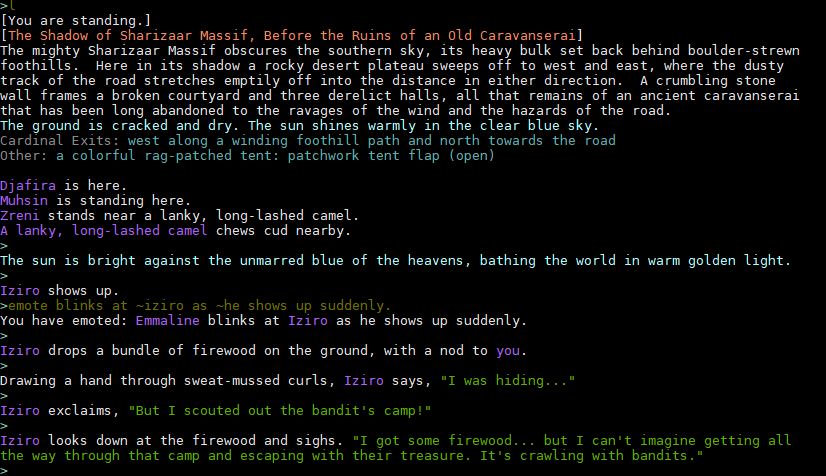
And now is a good time to discuss our game philosophy when it comes to things like potentially slaughtering one's way through entire areas full of mobs. We feel this to be a very gamey convention which isn't very realistic for most characters to carry out, either physically or emotionally. The mobs are, in the world of the game, fellow living beings, and most characters would probably have at least a few ethical scruples about murdering them en masse -- besides the probable difficulty of actually accomplishing that. So, when characters are faced with an obstacle like a camp full of bandits, we prefer to offer some dynamic mechanical possibilities that will allow for more interesting ideas on how to handle those obstacles.
Zreni has one such interesting idea. As you might have guessed from the last showcase, she thinks it could be possible to disguise the party as bandits themselves! The main issue, in that case, will be mugging enough bandits for everyone to dress up convincingly. Through this conversation, the elderly woman also makes an enigmatic reference to the Bardic Fellowship, which draws Emmaline's attention.

Emmaline resolves to ask Zreni about the Bardic Fellowship later. For now, they have bandits to rob. Like most hostile attackers, the bandits can be lured one by one away from the encampment, where Djafira ties them up and our fellowship of friends confiscate their bandit bandanas.
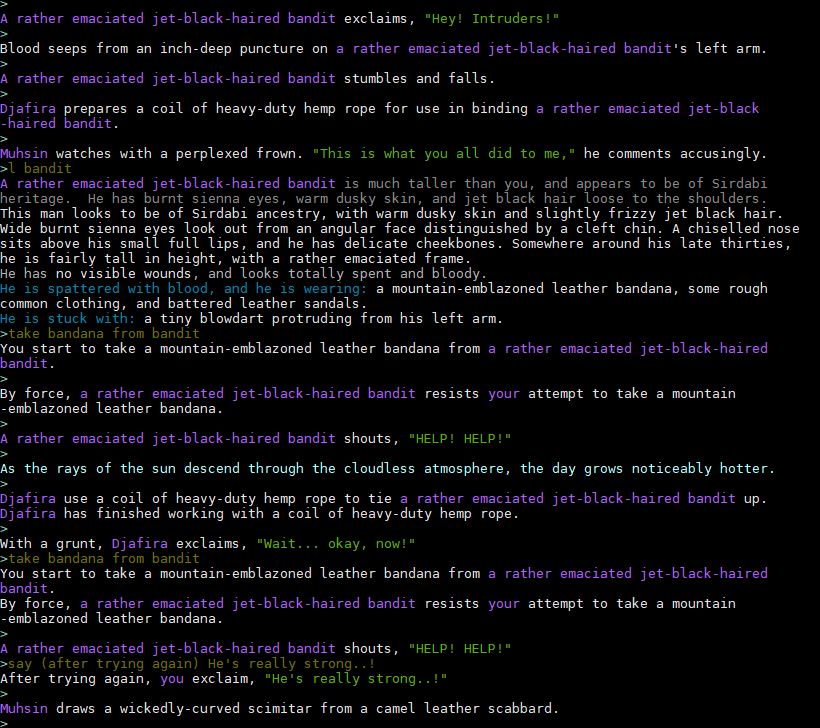
Even though Iziro still has some poisoned darts, a few of these bandits might be strong enough to resist the theft of their items. However, getting them away from the encampment ensures that at least their cries for help won't be answered by their friends... and beating them up can sap their strength enough that even Emmaline, who isn't especially strong herself, is able to wrestle away a bandana.
Wearing the bandanas actually changes our shortdesc, and gives us a new persona -- if someone recognized Emmaline by name before, they will not see her by her name now, but instead as an auburn-haired bandit!
Disguises offer a multitude of different personas, spanning genders, organizations, and other changeable aspects of one's appearance. We'll recognize our friends as the bandit versions of themselves right now, so that we'll be able to quickly notice if their personas change back to normal, while still easily recognizing them.
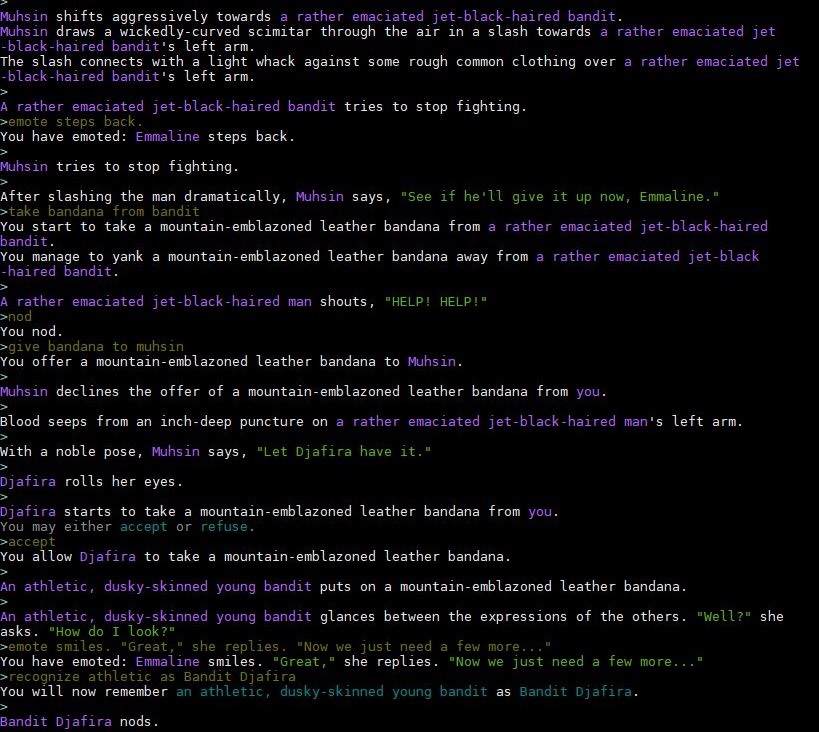
For now, Emmaline and her friends are able to infiltrate the bandit encampment -- with Iziro taking the lead, as he already scouted out the area. They walk along while trying to keep themselves relatively inconspicuous, affording the chance for some amusing roleplay, and at last come upong the cave where bountiful bandit booty is stored.
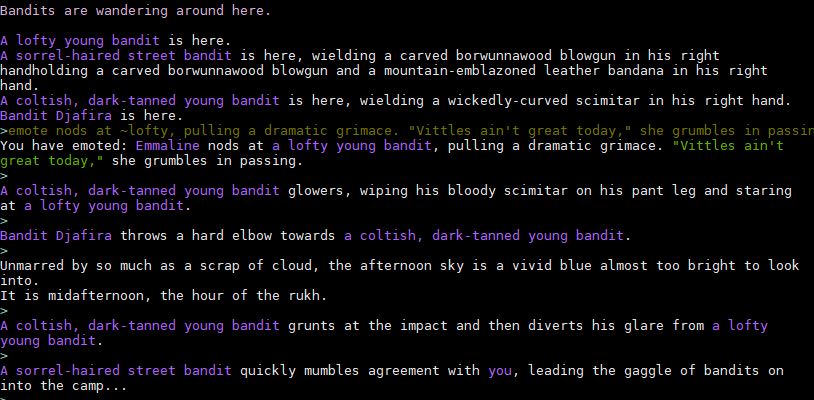
It's worthwhile to note that Emmaline, as a player, would have built this very cave. When exploring an area that you yourself built, it's a good idea to let others go ahead while you take a figurative backseat. The staff member who approved the area could certainly have changed it enough that it would be challenging even for you as the builder to figure out, but it's far better not to rely on that possibility, and to let others take the lead. This can provide a much more rewarding and enriching experience for everyone, including you, as you can see what becomes of the things you made and enjoy how your fellow players react to them ICly.
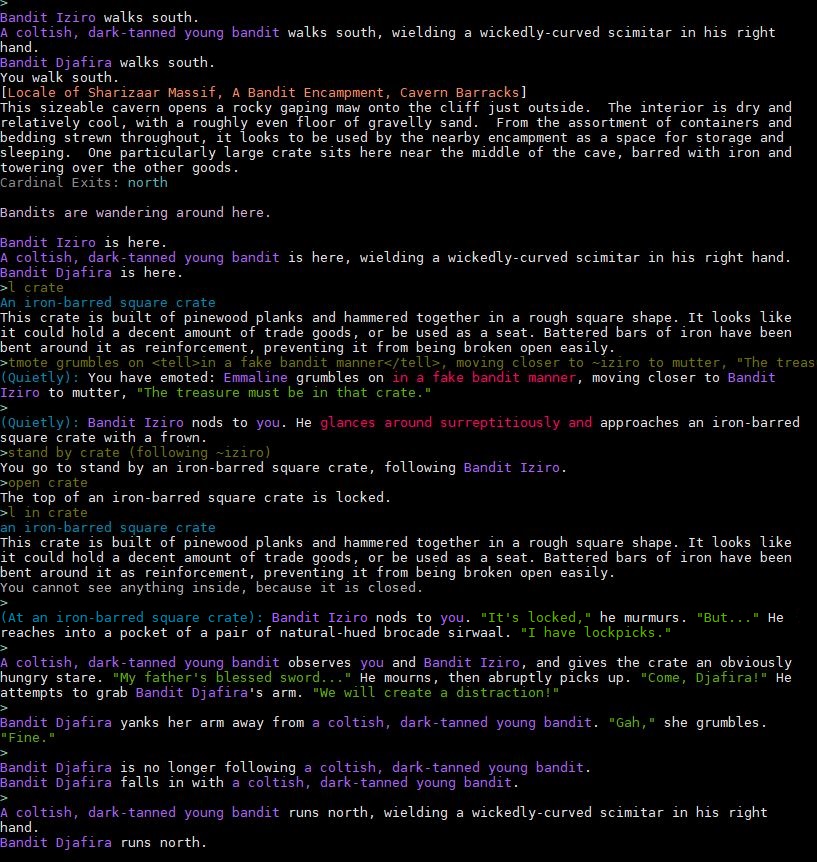
But now we encounter an unforeseen obstacle: the crate of treasure is locked! The fun thing about obstacles in a story is that they are opportunities in many ways, and Iziro is the person affected most by this one -- because he ends up revealing some possible criminal roots when he shows his lockpicking skills. But while Iziro has the ability to pick the lock on the crate and open the chest, he needs a distraction...
Djafira and Muhsin go off to create just that, raising a ruckus on the other side of the camp and drawing the eyes of any bandits over there. Shouting will draw the attention of guards, including the "aggressive guardian" type of NPC. If one of them saw Iziro picking the crate lock, they would consider him to be robbing their organization and treat him accordingly -- whether recognizing him as one of them or not. Not even a bandit is allowed to steal their own treasure!
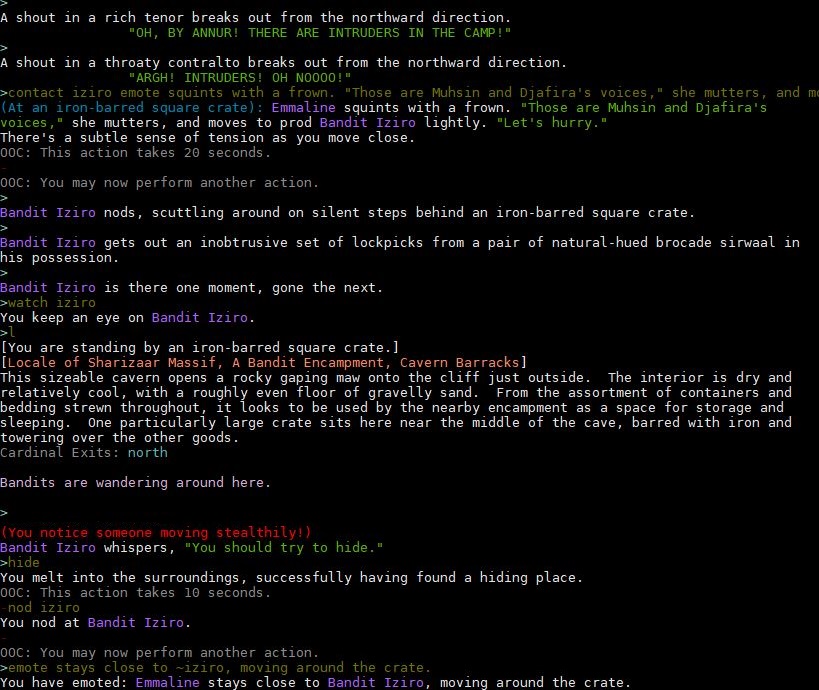
Iziro hides before getting to work, because then there's still less of a chance of being noticed even if a bandit does somehow happen along despite the distraction on the other side of the encampment. He starts to pick the lock while Emmaline keeps watch. She knows he is there because she's moved into CONTACT with him, meaning that she is in his immediate vicinity, and there they can whisper to each other while always noticing the other's hidden actions.
Then, Iziro uses the lockpicking abilities -- first he puts his picks in the lock, and next he has to figure out what combination of directional jiggles will work for this particular lock. The number of directions that the picks must be jiggled towards, in the correct order, rely on the toughness of the individual lock, and the lock stores these directions. So it is definitely possible to practice picking a certain lock over and over in order to memorize it.
In the end, Iziro gets the crate open. There's more inside it than either he or Emmaline expected! .. including a pretty gross random trophy. They both grab what they can carry and creep out of the camp...
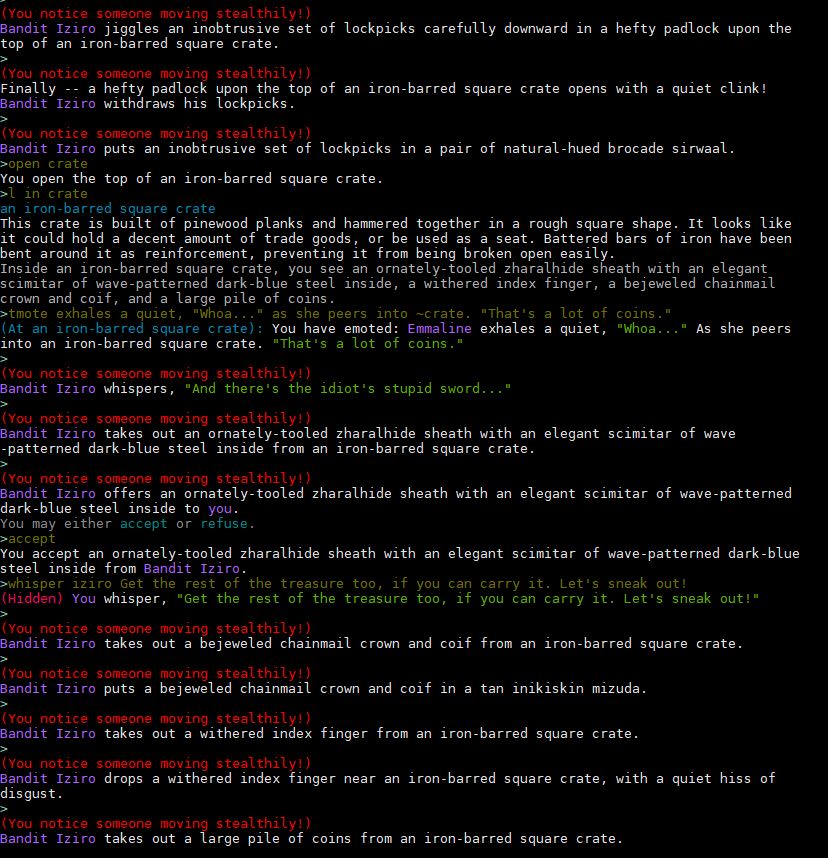
Having successfully managed their escape, Iziro leaves Emmaline with Zreni and the camel at the campsite, handing over his mizuda full of bandit loot. Then, Iziro sneaks back to check on Djafira and Muhsin and help them evacuate too.
Emmaline waits anxiously with Zreni for her friends to return to their campsite. She also looks into the mizuda and notices that all the coins are gold. That is a veritable fortune! Zreni mentions the Bardic Fellowship again, and Emmaline is very interested, expressing that didn't know that the Bardic Fellowship had chapters in Idiri. Zreni tells her that it's a relatively new thing, and there is no chapter in Omrazir -- but suggests with her sagely winking manner that perhaps Emmaline should help to found one.
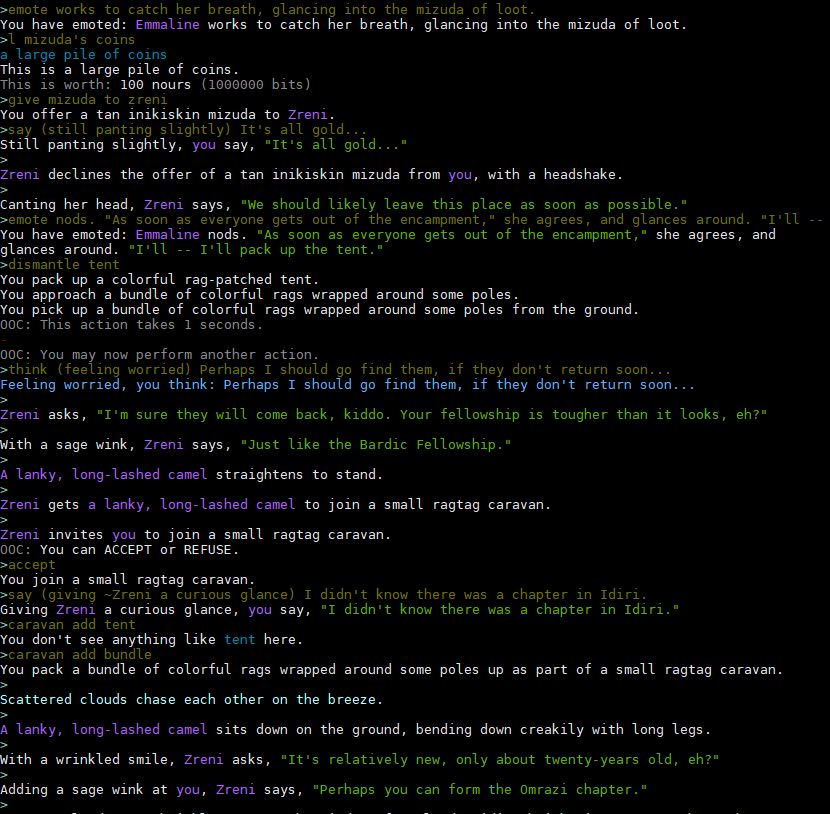
Emmmaline thinks about going back to the encampment to find out what happened, but finally Iziro, Djafira, and Muhsin return. They're battered and bloody enough that it's clear they had some trouble getting away, but for now the friends are just grateful to be reunited.

As the fellowship of friends endure their significantly more bedraggled but very much enriched caravan journey back to Omrazir, Emmaline deeply considers the possibility of founding a chapter of the Bardic Fellowship right here, in her new home, with her new friends.

And there's our story update from the past couple chapters! Tune in next month for Chapter 11, the penultimate installment of this showcase series, when we cover asynchronous roleplay, in- character building methods, and the founding of a PC-led organization. Until then!
Chapter 11: CUTSCENES
-- Intro:
We're working on a new MUD called Song of Avaria, using Evennia as a base code. Hopefully, the game will be opening for a public alpha two months from now: January 2024. This is the eleventh in a series of showcases to display the features of our game. In order to properly exhibit the purpose of Song of Avaria, which doesn't quite fit into the existing molds, we're going to demonstrate gameplay by focusing on the story of a character: Emmaline.
-- Chapter 11: CUTSCENES
We last left off with Emmaline dreaming of establishing a chapter of the Bardic Fellowship in Omrazir. This month we'll see how she actually does that! But along the way, let's imagine that due to some tumultuous events in our uncooperative real life, we're unable to actually log into the game as much as we had been...
Here's where cutscenes come in! What we call a "cutscene" is an asynchronous web-based roleplay feature that allows play-by-post content and dice rolls. This is the main feature that we'll be showcasing today. Cutscenes can be accessed from the main website menu. Clicking on that button brings a player to the cutscene hub, where they will find a list of ongoing scenes.
In fact we can see that there is already an active public scene going on. We could join in there if we wanted to, because it's public and therefore open to everybody. However, what we want right now is to start our own private scene with just Iziro and Djafira. Other people's private cutscenes will not be visible on the hub to anyone but the people invited, and finished cutscenes will not show either -- when they end they simply become roleplay logs (and forum posts, if they're public).
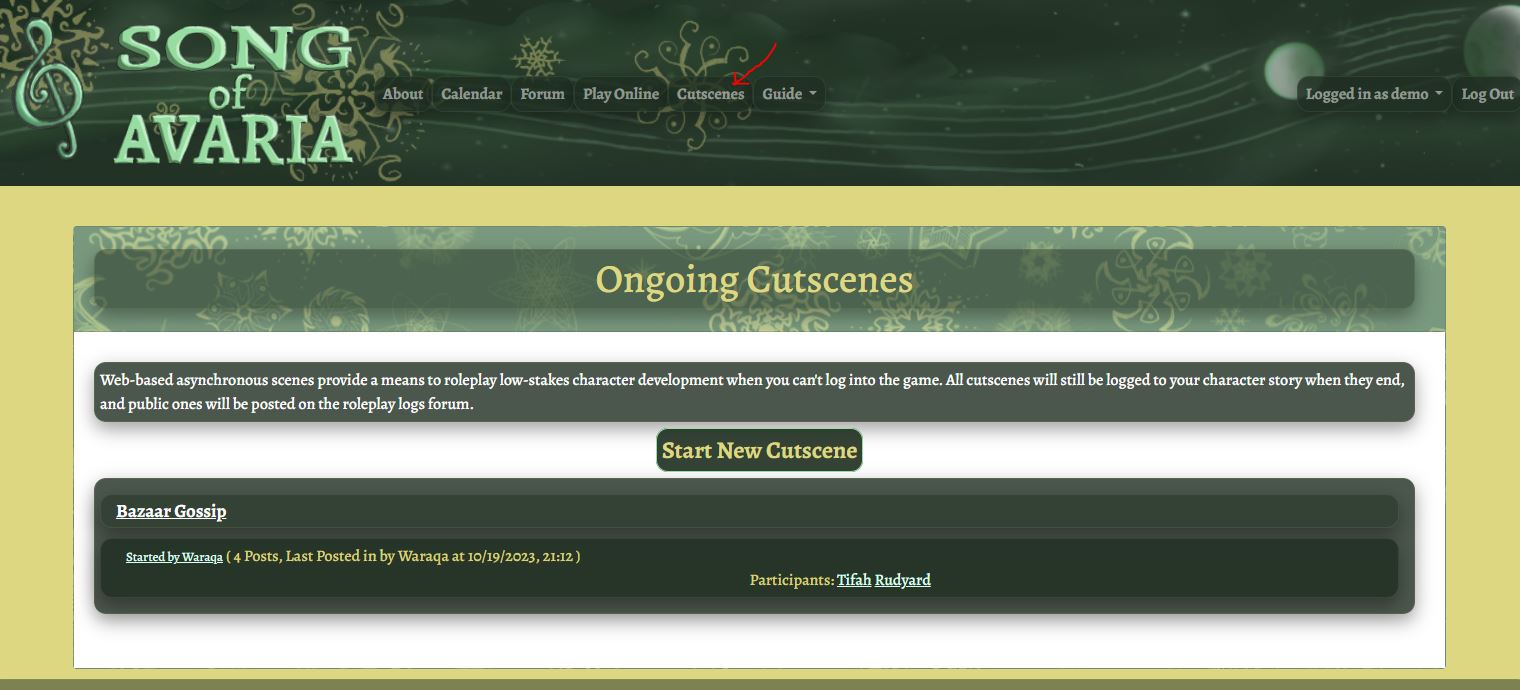
To begin a new cutscene, we start by entering some basic information about the setting and theme. Locations and times are not hardcoded, so there is a lot of flexibility in terms of what can be played out here. Someone might make a cutscene to act out an incident from their character's past, to contain an exchange of letters, to cover a series of disconnected exchanges in the bazaar, or whatever they might wish within the scope of the game world. It's a very versatile feature, but it doesn't support most coded systems such as combat, languages, journeys, stealth, crime, crafting, and so on. For that reason, it's best to use cutscenes for low-stakes situations where none of those systems would be expected to have much bearing on the roleplay involved.
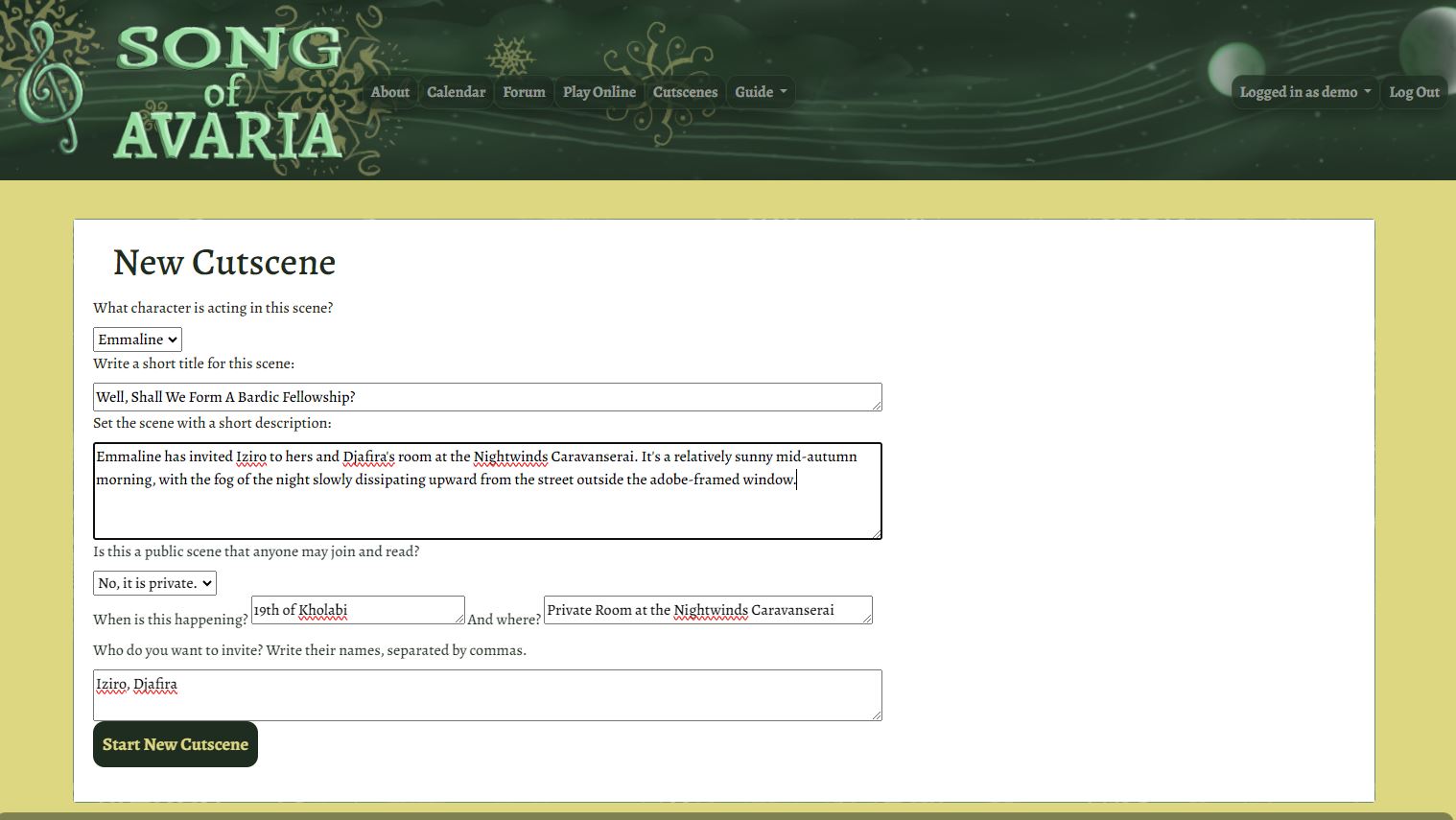
Here, we start a private cutscene. Those who have been invited will receive an OOCMail alerting them about it, but nobody besides the invitees will see the private cutscene on the list. If one of the invited people chooses not to participate, they don't need to.
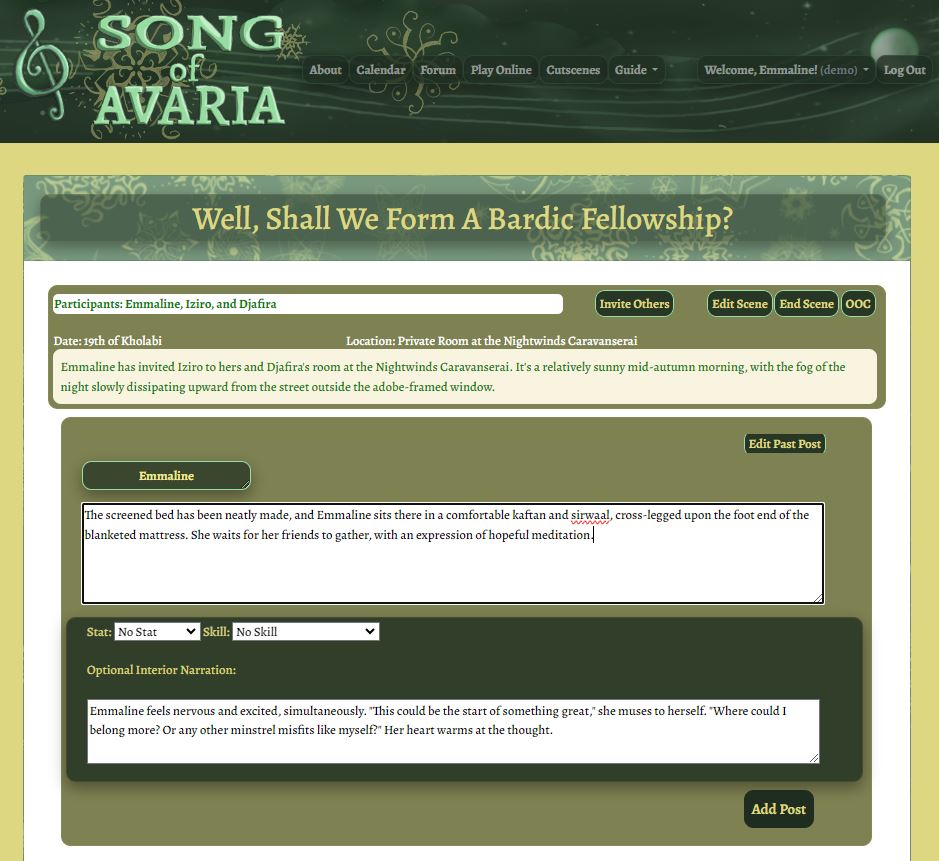
When posting in a cutscene, we do have the option to make stat or skill dice rolls which we can use to influence the course of the action if we like. We can also add interior narration like thoughts, feelings, and recollections. Now, we'll make our post and await the posts of others! If there is no activity in a cutscene for a week, it will simply close out automatically. If at any point we have some information we need to convey OOCly to our fellow cutscene RPers, or if anyone has a question about something, we can also use the OOC chat tab to post messages to scene participants.
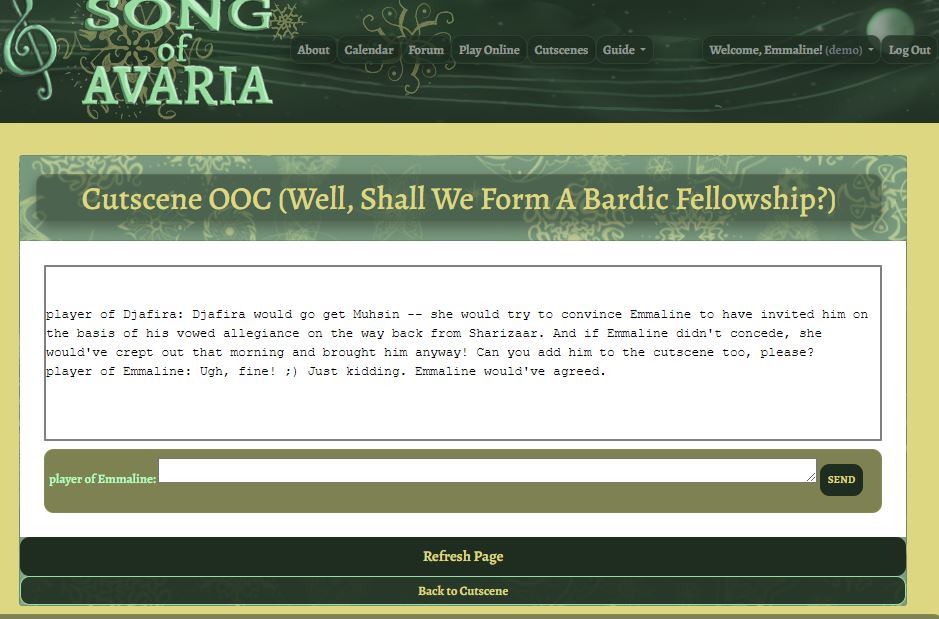
Note that only the person who started the scene is able to invite new people. So, Djafira is asking OOCly for us to invite Muhsin.

Even after a cutscene has begun, we can still invite new people. However, when latecomers join a cutscene-in-progress, they will have very little idea what is going on! They will not see any of the earlier posts when they enter the cutscene, only those posted from the moment after they join. Therefore, the form for inviting new participants gives a small reminder to write a post for the them when they enter, describing the current situation in the scene. This could also be quickly summarized in OOC chat if preferred.
Because cutscenes are asynchronous and available even while logged out of the game, we've tried to make the feature readily accessible from a mobile interface. This means there is an easy way to skip to the end of the page to find the latest posts, and everything is formatted so as to be easily read from a narrow screen.
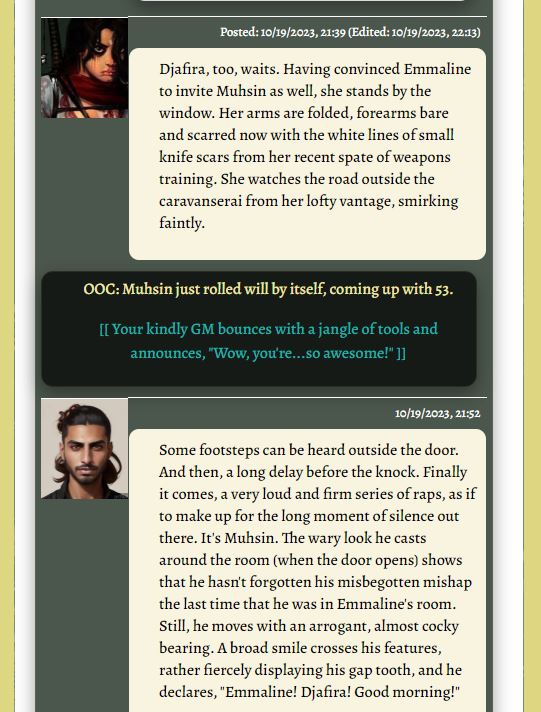
Note that while we can see our own interior narrations (thoughts, feelings, and the general elaboration of our character's inner world), those of other characters won't be visible to us. The other participants may or may not be posting any, since this is completely optional, but even if they are we won't see them. Only admin-played characters who have been invited to the cutscene (or started one themselves) can see the interior narrations of other characters. If you make a dice roll, you'll get a message from the "GM" (our unofficial toolbox mascot last seen in the Faded Zone) indicating whether your roll was a relatively good or poor one. Unlike your own interior narration, the dice rolling message will be visible to all players in the scene.
Once there has been sufficient interaction in the cutscene, an extra button will appear at the top of the page, allowing us to leave relationship impressions of the other participating characters. We'll have the opportunity to make an impression for each of them every several posts or so. This means we can theoretically make multiple changing impressions for a cutscene, if it goes on for long enough. Writing these impressions over the website still gives experience rewards (1 point per day per character, just like in-game impressions), and sends an OOCMail about the impression if the other character involved is offline.
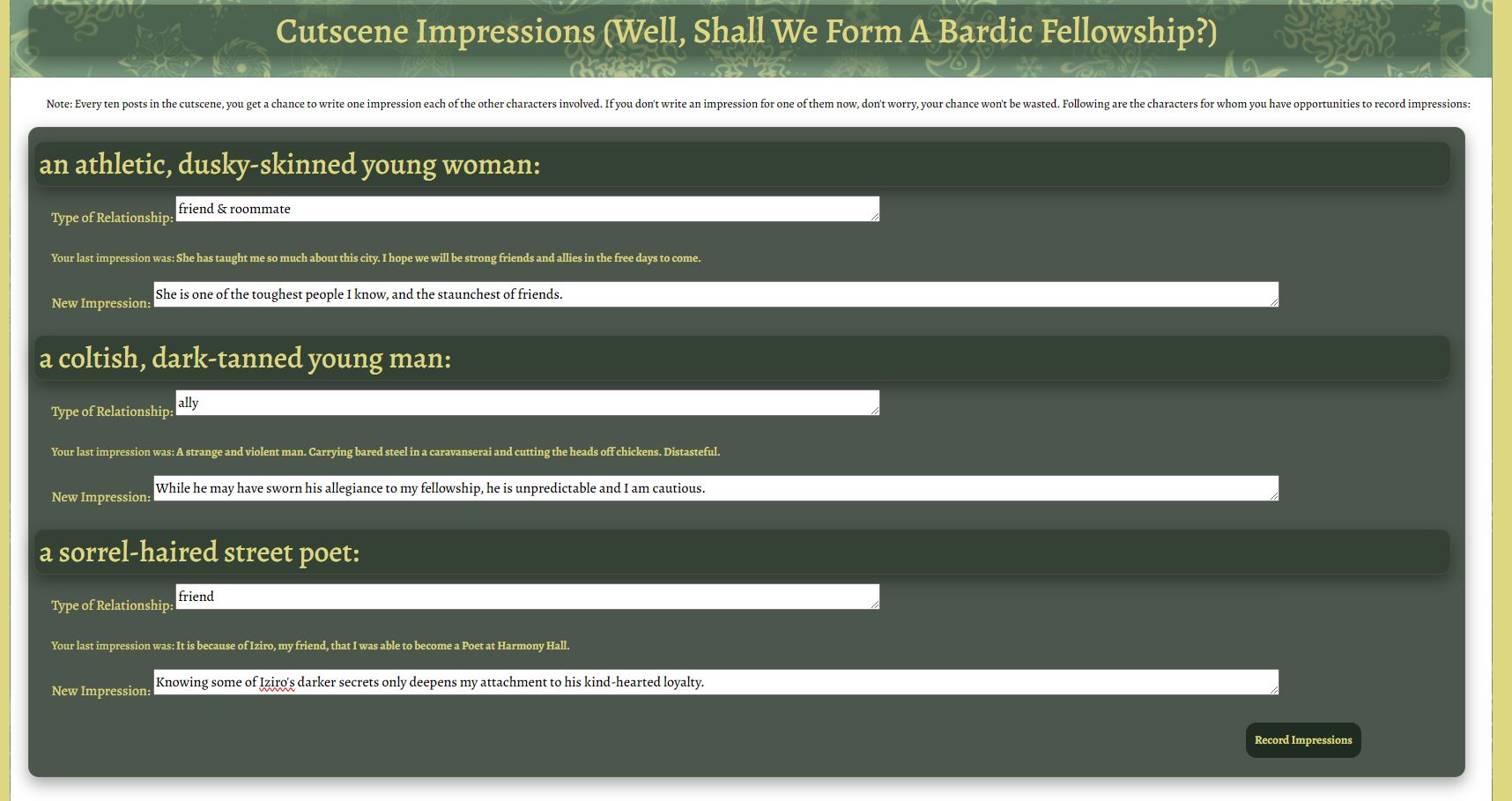
When we're ready to finish the scene, we'll click the End Scene button. This will put the cutscene into a short waiting period before it actually closes out. If another person posts in the scene before the end of the waiting period, that will prevent the scene from ending, until someone once again clicks End Scene and then all participants allow the scene to end.

At this point, all of our group has concluded that they would indeed love to form the Omrazir chapter of the Bardic Fellowship together. They've also decided that they want to hire a Razmani builder whom Iziro knows to build them a structure of their own.
So, we'll log into the game when we're able and send that builder a letter via courier. While some places in the world may have a less-lettered populace, it's taken for granted that most people in Omrazir have a basic education that involves having learned how to read. Emmaline's literacy isn't the same oddity for a commoner that it was in the backwaters of Merouen!
After getting in touch with the builder, she arranges a meeting to discuss the construction of the Fellowship guildhall.
This brings us to the set of skills that govern the creation of player-made structures in the game world. These fall under the Construction crafting skill. Most people with this skill would be capable of constructing small buildings typical for their origin, such as a small adobe courtyard dwelling, a log cabin, a stone hut, and so on. However, those who also possess points in the Education skill are able to draft blueprints to make more specialized custom structures.
The building of a structure takes some time, and includes the collection of materials and an ongoing construction site. Construction isn't allowed just anywhere in the city, so a would-be builder will have to scope out locations where a new structure might be permitted.
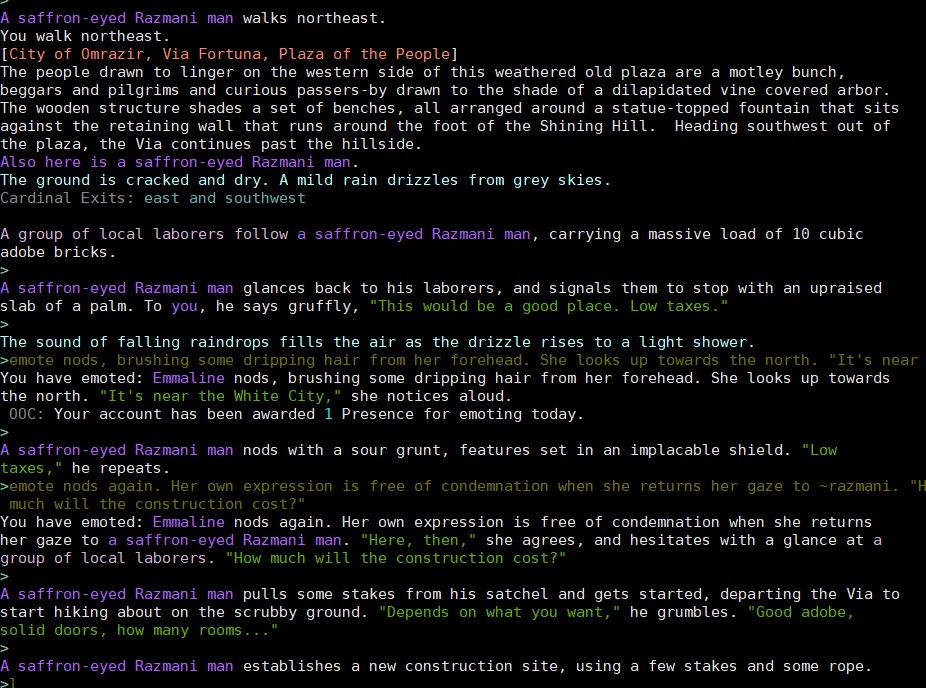
Construction is a rather specialized and expensive crafting skill to pursue, and we haven't fully developed it yet. So at this point you might imagine the player behind this Razmani builder setting up the construction site, gathering materials, and discussing blueprints with his clients, but rather than solely using coded abilities to complete the structure, he is in communication with game admin via the petitions feature. When we've completed development on this skill it will still take staff approval to complete a structure, but otherwise nearly the entire process will be completed mechanically within the game.
The first step in construction, however, is to establish a site. Materials used for construction can be stored on the site, along with accessories such as doors, windows, locks, and bells. Furniture can also be purchased from an appropriate crafter and added to the site.
Many types of construction material may be so heavy that one person cannot carry them easily. Furniture pieces may also be quite heavy. Or perhaps someone has a large crate and has loaded it with all their belongings as they move to a new home, and that crate is also far too heavy for them to lift. In these cases, one of the simplest things to do is hire a group of NPC laborers to carry your things for you.
Here we see that the Razmani construction manager, Yasir, has hired a group of laborers to carry around a load of large adobe bricks. He pays them to set the bricks down, then stores the bricks at the site. Nobody else can take things stored at a construction site, as the assumption is that laborers might be around at any time and would stop any attempted theft of building materials.
While Yasir doesn't seem to have very refined people skills, maybe that suits the crafters and laborers whom he primarily works with. Still, it's generally important to be able to communicate with clients and crafters as a construction manager. Here we see that there is some discussion with Emmaline about how to build the new organization's hall.
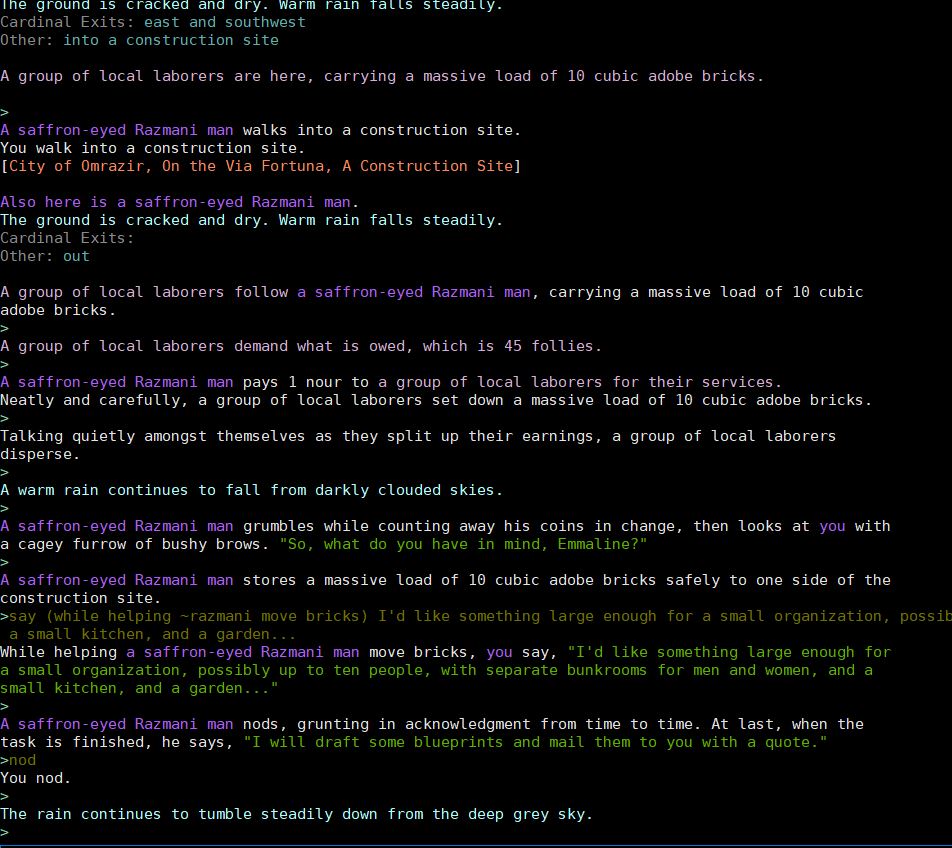
The second step is either to attempt the building of a generic structure, or to draft new blueprints for something more complex. The building is erected based on these blueprints, and then elements such as doors, windows, locks, bells, and so on will later be installed by either the construction manager, a hired carpenter, or the client themselves. It takes only a little Carpentry skill to be able to install a door within an exit opening, or a window into an aperture -- but the number of apertures on a room and exits between rooms are defined by the blueprints.
When Yasir tells Emmaline that he'll send her a quote, this probably takes into account the price of materials, the fees for paying laborers, and the cost of his own time. Deciding upon the price of one's work is another quite variable element of being a construction manager or architect character. Some characters may be able to obtain very low prices for materials -- perhaps they moonlight as miners, and know where to find a great alabaster quarry. Or maybe they can blow glass, and can make beautiful stained glass windows for a very affordable price. Perhaps the player is simply an amazing writer who can craft gorgeous room descriptions, and this sense of style might be something considered worth paying more for ICly. Ultimately there is a great deal of flexibility involved, and complexity as well -- construction is a trade that is founded on many different skillsets, requiring a network of contacts and a lot of communication.
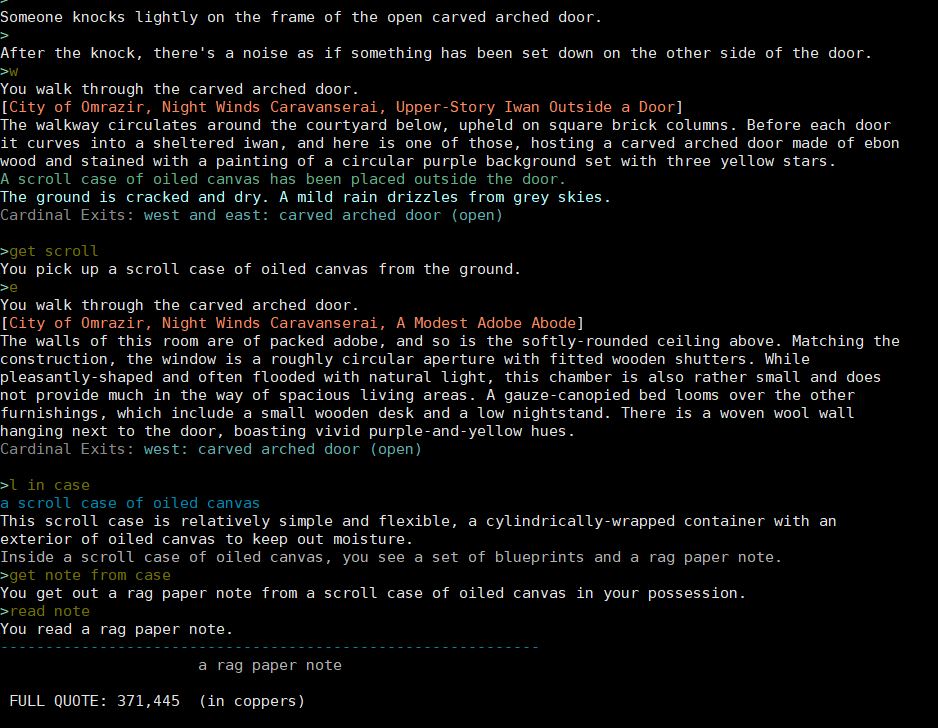
Emmaline receives the blueprints from Yasir, who has sent them in a case along with a note that includes the quote.
-- IMAGE: 12_looking_at_blueprints
Looking at blueprints might be a little confusing for a person who isn't familiar with them, just like in real life. They're not a real area you can explore, or a map you can click around on like the DungeonMaker. Blueprints are an in-character convention, but at the same time, you can literally read the room descriptions -- so they're far more enlightening about the space than a series of drawn lines and symbols. The full set of blueprints object is like a book, allowing you to turn pages and read. The first page describes the structure as a whole, while consecutive pages each stand for a room within the structure.
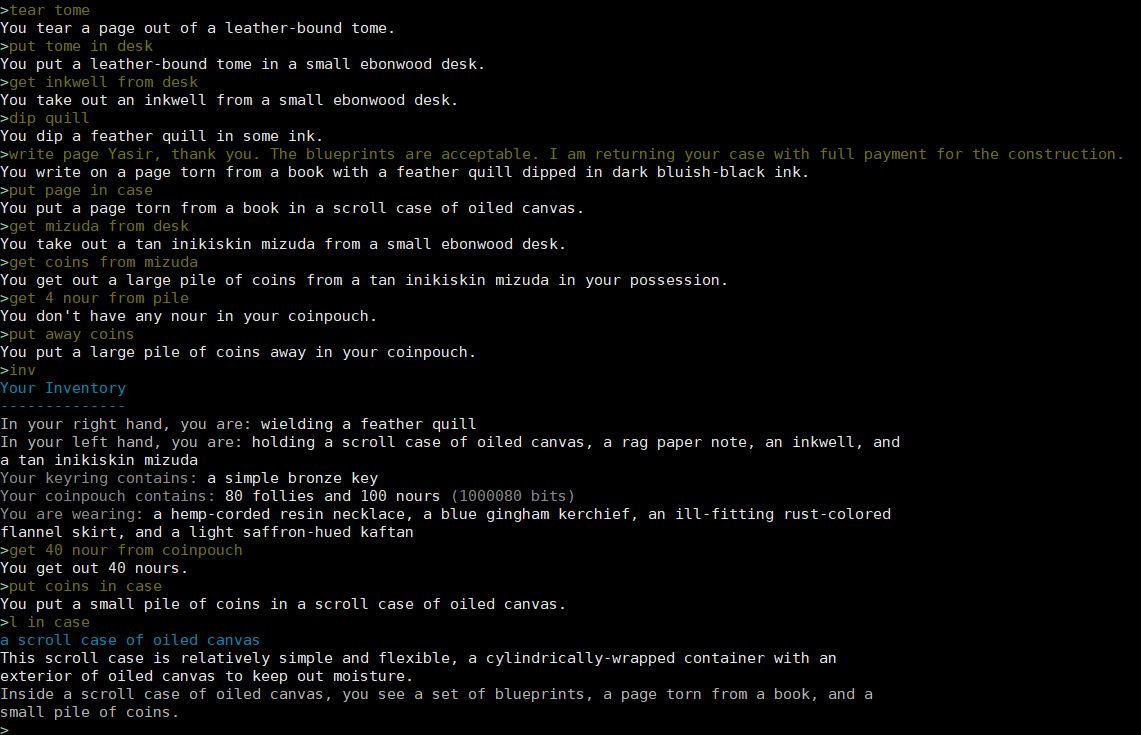
Emmaline returns the blueprints to Yasir with a letter of her acceptance and payment for the construction. While the quote isn't the entirety of the gold that her fellowship "liberated" from the Sharizaar bandits, she recognizes that it's also going to be important to buy furniture and supplies to stock the organization hall with, and that will probably take up all the rest of their funds. In addition to that, the organization will have a till -- like its own bank account -- from which it pays things like taxes, salaries, and anything else that the organization leader might want to set up as a recurring transaction. With all this in mind, it'll be good to have a cushion of gold set aside there to make sure that the Bardic Fellowship of Omrazir will flourish.
Regardless of the specifics of its construction, a dedicated structure provides many advantages over a rented room. While Emmaline won't need to pay rent at the Nightwinds Caravanserai anymore, she will need to pay annual taxes to the neighborhood in which her building has been erected. This money goes towards maintaining the neighborhood itself, and some might take pride in a well-maintained neighborhood and not resent paying such taxes at all!
Eventually it may even be possible to hire organization guards and other NPCs, but for now, we've already consigned our full windfall of gold coins. Construction is an ICly expensive undertaking, and will be developed further in our alpha stage.
At any rate, we've now got a headquarters building in progress, and we're well on the way to forming the Bardic Fellowship's Omrazi chapter. This would end up being a player-formed organization. We can propose that through a web form found via the online request tool.
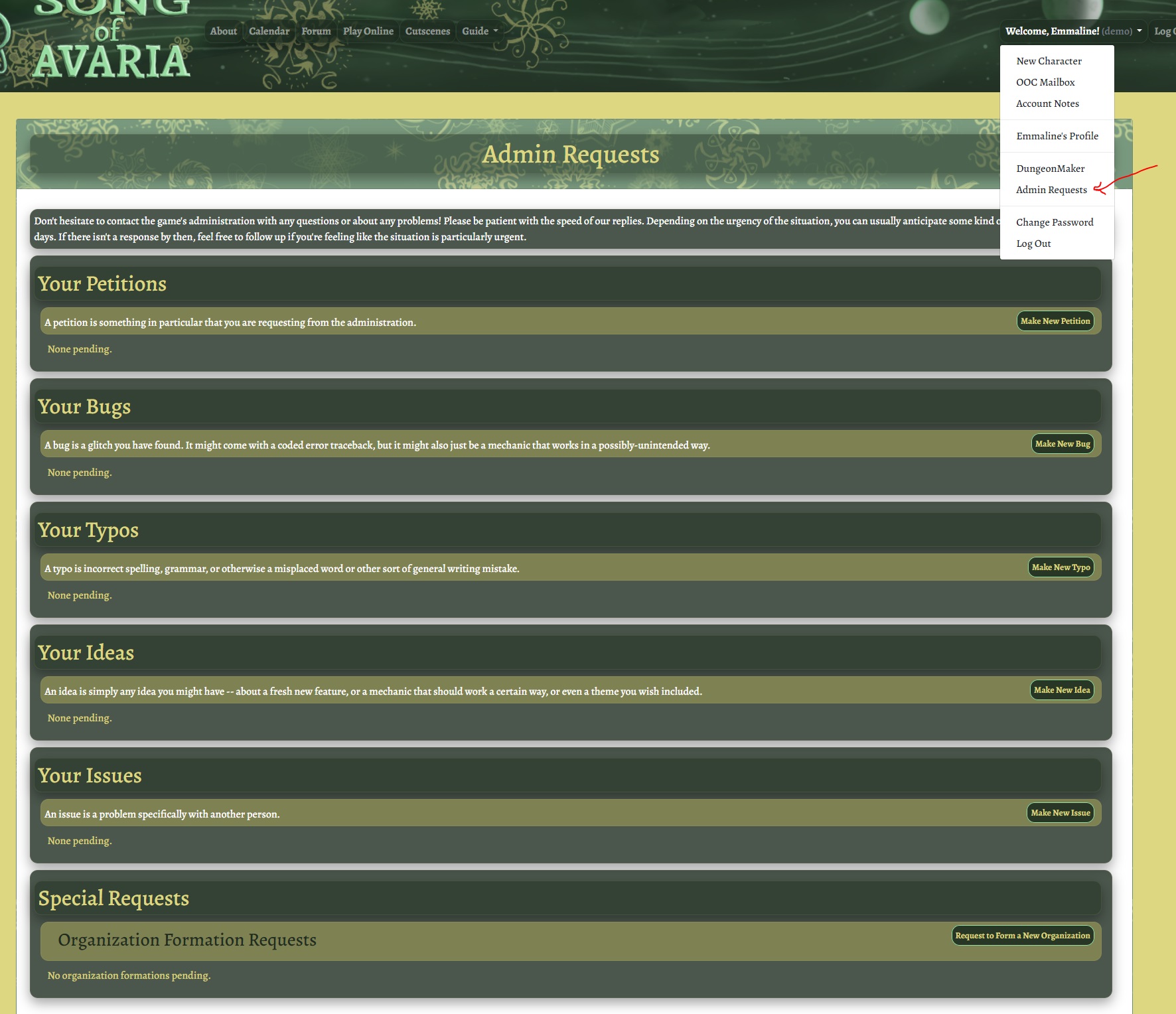
Under the logged-in dropdown menu, online requests can be accessed. At the bottom of the following webpage are special requests, including the formation of a new organization. Clicking on that brings us to a form, which we can fill out and submit from there.
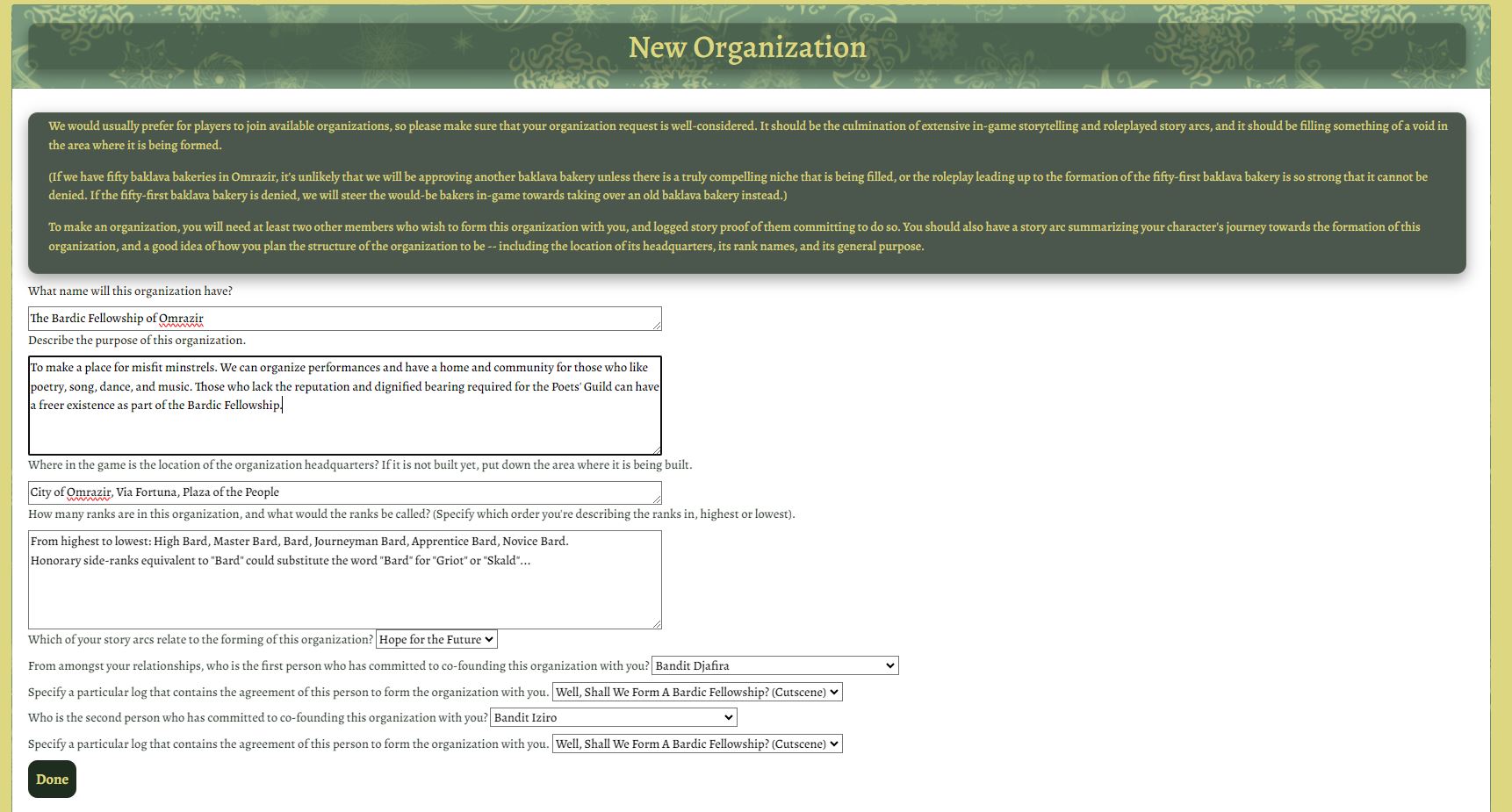
The description of the organization in this form is for the sake of justifying the existence of this new organization to the administration, and won't show up anywhere in-character. So, if you have a secretive purpose for your organization while you're planning its public face to be a baklava bakery, feel free to put that here without any concern about whether anyone might see the description somewhere and realize you're actually a hidden society of baklava-baker assassins.
While the form only requires two other initial members, we can arrange the organization to our liking once it's been completed. Since the cutscene about forming the Fellowship has ended and was recorded as one of Emmaline's roleplay logs, we're going to use it as our documentation regarding who wants to join the organization we have in mind.
Much later, Emmaline logs in and finds their guildhall completed. The formation of the new Bardic Fellowship organization has also been approved -- hooray! (Note that staff may make suggestions and alterations to your submission, much as in chargen.) Emmaline is the organization leader, and therefore automatically assigned its highest rank. She inducts Muhsin while promoting both Djafira and Iziro, and then sends the latter on an errand to get her building key copied for himself and their other allies.
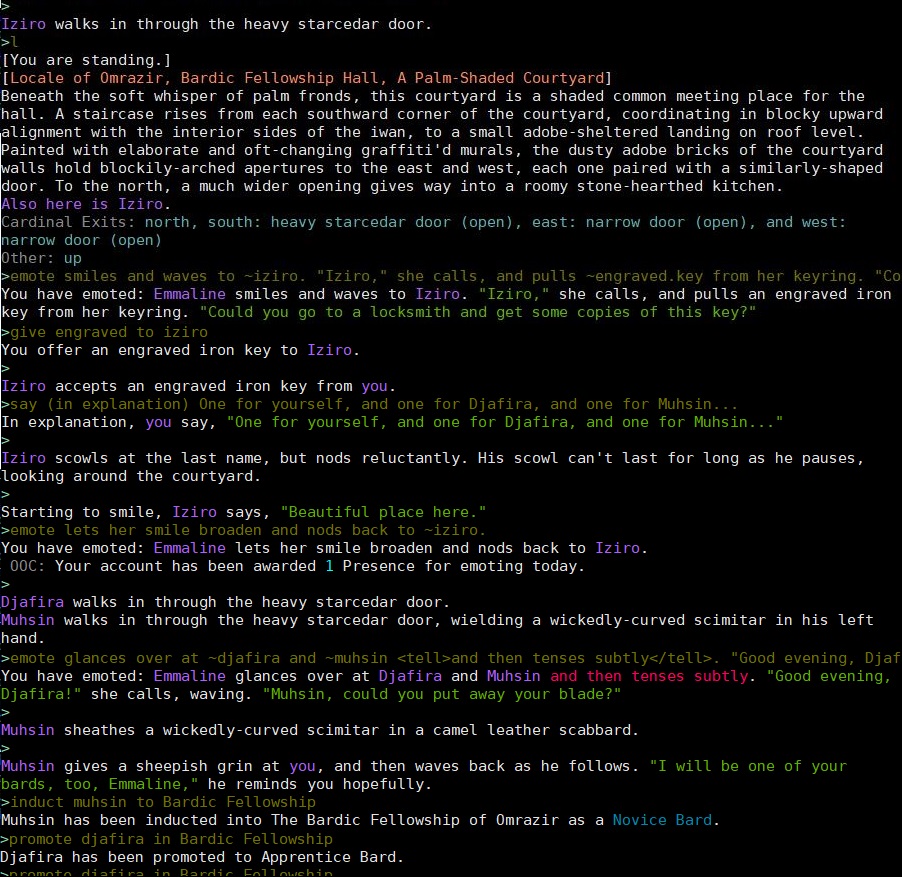
Locksmiths are just one of the many types of crafters that could end up working together with those skilled in construction, since they can make locks for doors and copies of keys. At some point, we might also want to get furniture, glass windowpanes, curtain doors, or other such fittings for the organization hall -- and for those things, we'd need to coordinate with other crafters. If there are no PC crafters available to do what we want in a given area, we could address this as part of an ongoing storyline -- sending a letter to an NPC crafter, adding this to a story arc, and maybe eventually having that NPC animated by staff to help us out with our custom-craft-related request. If all else fails, some more basic items will be available for purchase from an NPC shop.
There are still plenty of things to do for our budding organization, but at least now the Bardic Fellowship of Omrazir has been established -- thanks to Emmaline and her band of similarly misfit friends. Almost a year after her arrival, Emmaline has cemented (or adobe plastered) her concrete (mud-brick) belonging in this foreign city!
Tune in next month for the last chapter of this showcase, A NEW BEGINNING. And after that, we'll hopefully have a new beginning of our own with the start of the new year!
Chapter 12: EVENTS
-- Intro:
We're working on a new MUD called Song of Avaria, using Evennia as a base code. Hopefully, the game will be opening for a public alpha one month from now: January 2024. This is the twelfth (and last) in a series of showcases to display the features of our game. In order to properly exhibit the purpose of Song of Avaria, which doesn't quite fit into the existing molds, we're going to demonstrate gameplay by focusing on the story of a character: Emmaline.
-- Chapter 12: EVENTS
In the last chapter, Emmaline founded a new organization with her friends: the Bardic Fellowship of Omrazir. Now, she's planning a public event in order to invite people to the grand first performance of the fellowship.
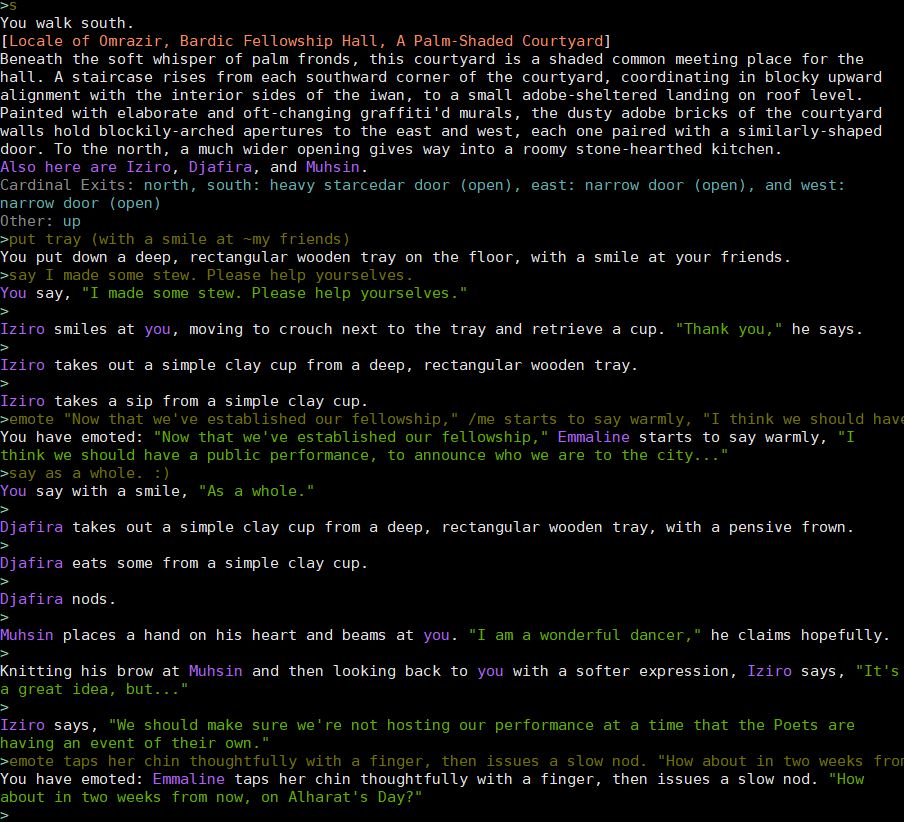
Most event planning will start with in-character discussion of the event. Sometimes, of course, it's necessary to communicate OOCly in order to coordinate the schedules of the players involved, but it's always preferable for as much of the planning as possible to be in-character. Besides just keeping things immersive, there can be a lot of interesting character development and interaction that goes on even in something as simple as planning for an event. Whether it's getting ready for a party, plotting out a research experiment, or preparing for a grand expedition, there is a lot of roleplay potential involved -- from sharing news and gossip to exploring how well characters work with one another. Too much OOC communication can eliminate a lot of the organic interactions that make a game into an immersive world!
Illustrating some of the interesting interpersonal development that can happen, here we see that there is an ongoing personality clash between Muhsin and Iziro. However, they are gradually and grudgingly learning to resolve it, and this is something that Emmaline is helping to mediate -- while Djafira finds it amusing to egg them on.
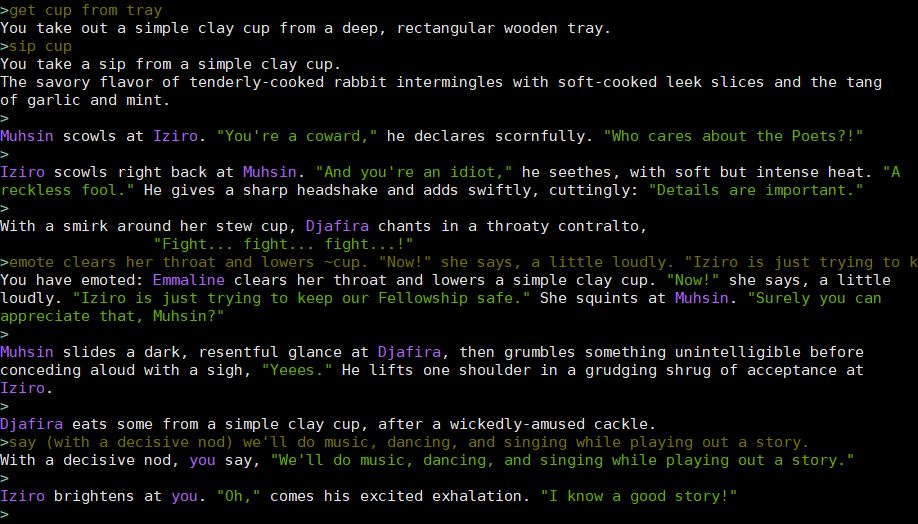
Once we've gotten the event planned out, the next step is to schedule it. Just from our roleplay we have already worked out and shared most of the necessary details, and there's no need to OOCly review players' schedules. This is one of the advantages of having a 1:1 time ratio! However, because the world of Avaria does have its own unique names for months and days of the week, and the numbering of the months is different as well (the New Year being in spring, rather than in winter), we have included a handy in-game command to quickly translate dates between the real world and Avarian time.

We're completely certain of what day we want this event to be on, then. On the website, we can navigate over to the Calendar tab, and schedule the event mechanically! It's a public event, but we can still invite specific people.
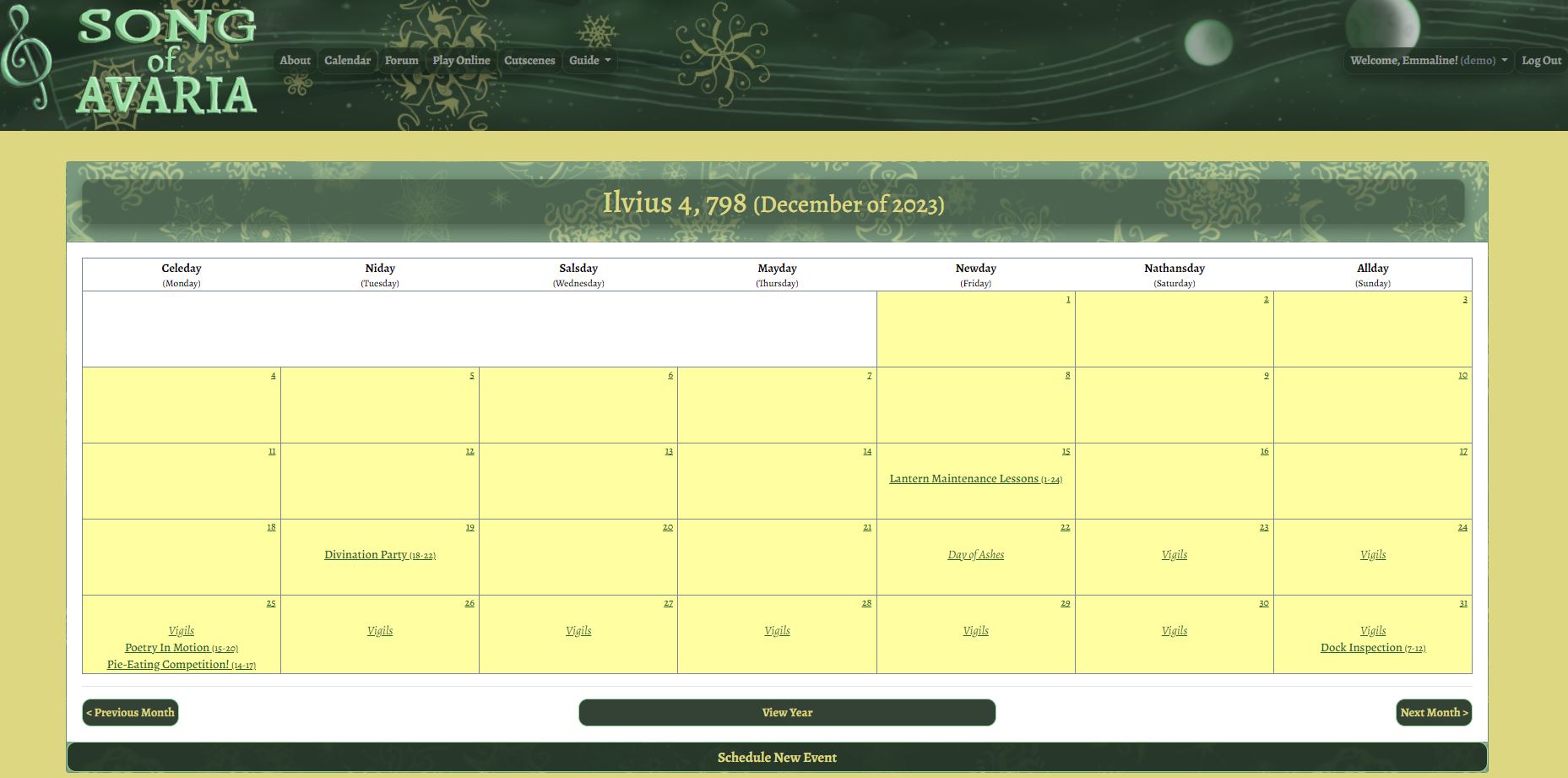
The calendar can be toggled to show a yearly, monthly, or daily view. Here we'll click on the day that we want, so that we can take a closer look. There is another event scheduled that day, but it's earlier in the morning and if people want to attend both that event and the Fellowship concert, they can always arrive a bit late to ours. And it's not a Poets' Guild event, so we don't have to worry too much about stepping on the toes of our "rivals"!
Some background events show in italics without hours posted. These are holidays! Because Emmaline is originally from the continent of Ruvera and we're embodying her to view the website, the calendar currently shows the dates of those well-known Ruveran holidays that she would readily remember and recognize.
Now, we'll click the large Schedule New Event button at the bottom of the page to schedule our performance.

There's a lot of flexibility in terms of what kind of event we'd like to create. We might have a parade that starts at one location and ends at another, or a set of celebrations intended to encompass the whole city, or we might have a simple stationary event that takes place in a single locale. Any explanation of location will go in the event description, rather than in its own specific location field, and the event is tied to a time period rather than any one location in the game world.
When inviting people to the event, we can invite them by name. We can also invite a whole organization by putting in the name of the organization after the marker 'organization:'. If we want to invite the whole Bardic Fellowship of Omrazir, we'll put in 'organization: The Bardic Fellowship of Omrazir'.
Once we've set up the event, we'll finalize it. We can also optionally go to the game forums and announce the event there with more details. Note that while we can post information on these boards supplying some in-character context for learning about the event, the forums themselves are obviously an out-of-character construct. If we want to actually spread the rumors in-game, we can do so using the rumor system. However, suggesting how a character might have ICly come by the information about the upcoming event is reasonable enough on its own.
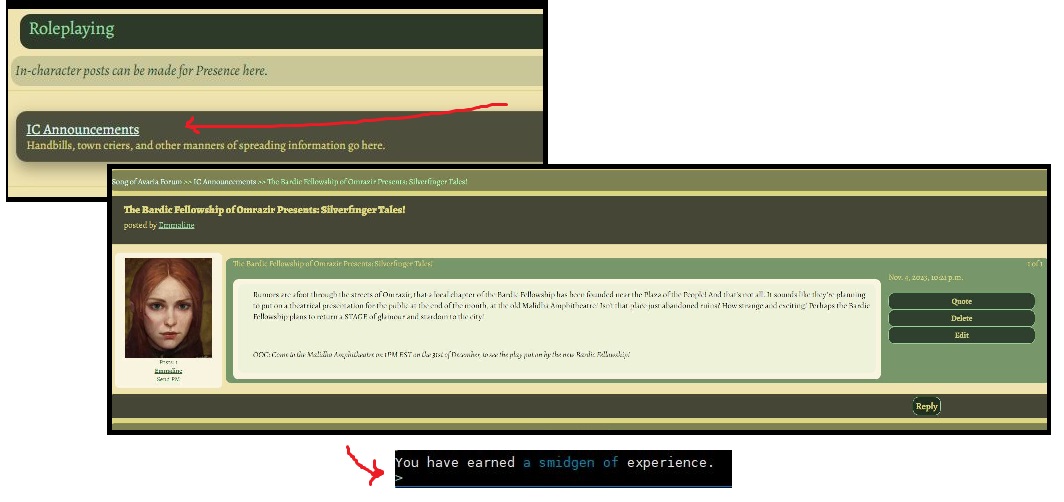
For posting on the RP forums, we get an in-game reward! It's just a little bit of XP. But still, we're encouraged to post there! We can also post the event log from our perspective here later, in order to get another small reward. Even though characters who weren't present for the logged event can't know everything that happened there, reading logs like these can be interesting and inspiring for other players, and serve as an impetus for further roleplay.
Now that the event is posted, we can click on it in the day view on the calendar.
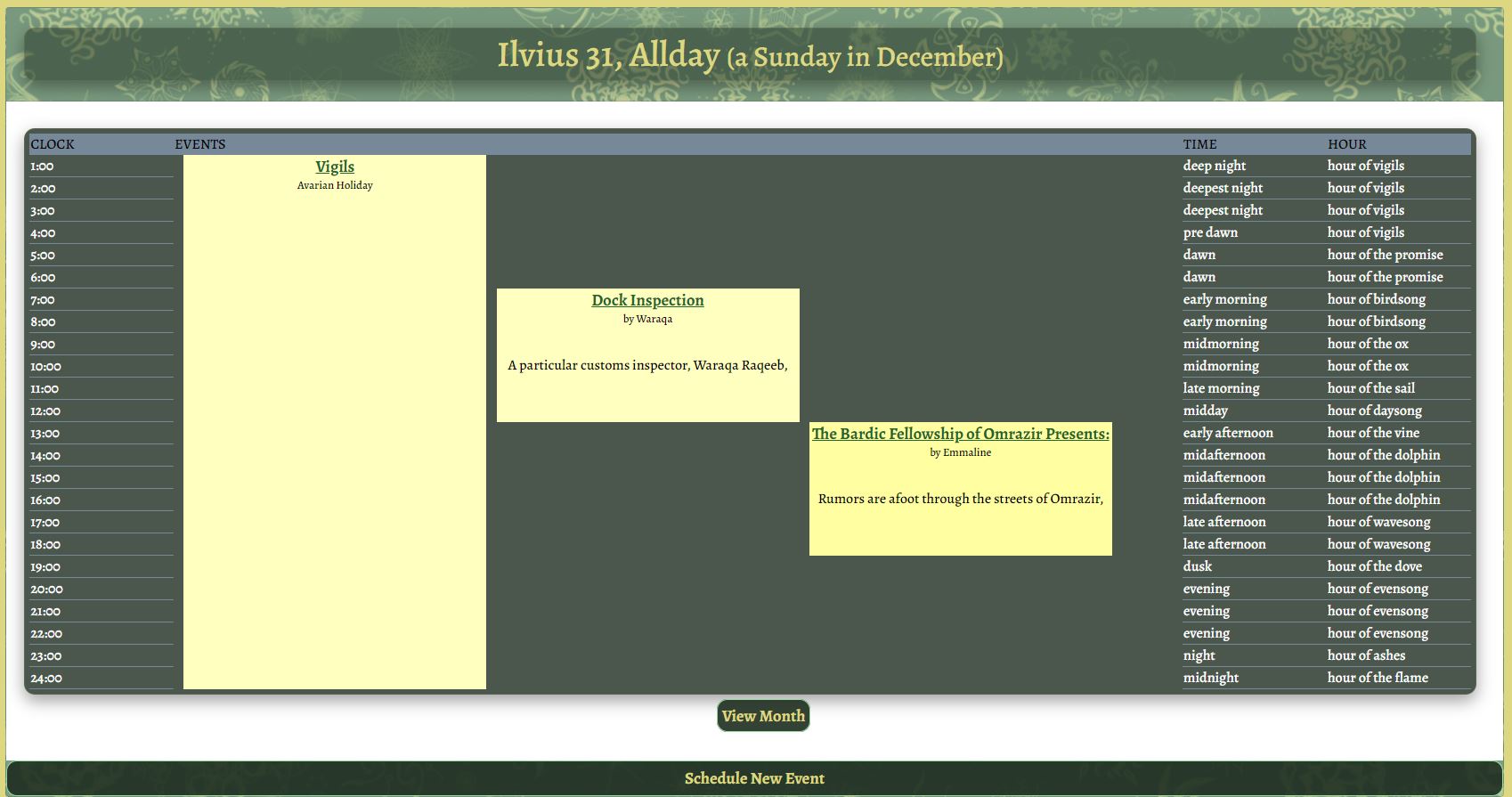
Clicking on the event itself shows all its related details. Anyone who has set themselves a reminder for an event (as well as the host of the event) will also get a reminder. If an event is private and a person has not been invited to it, they will just not see the event on the calendar at all.
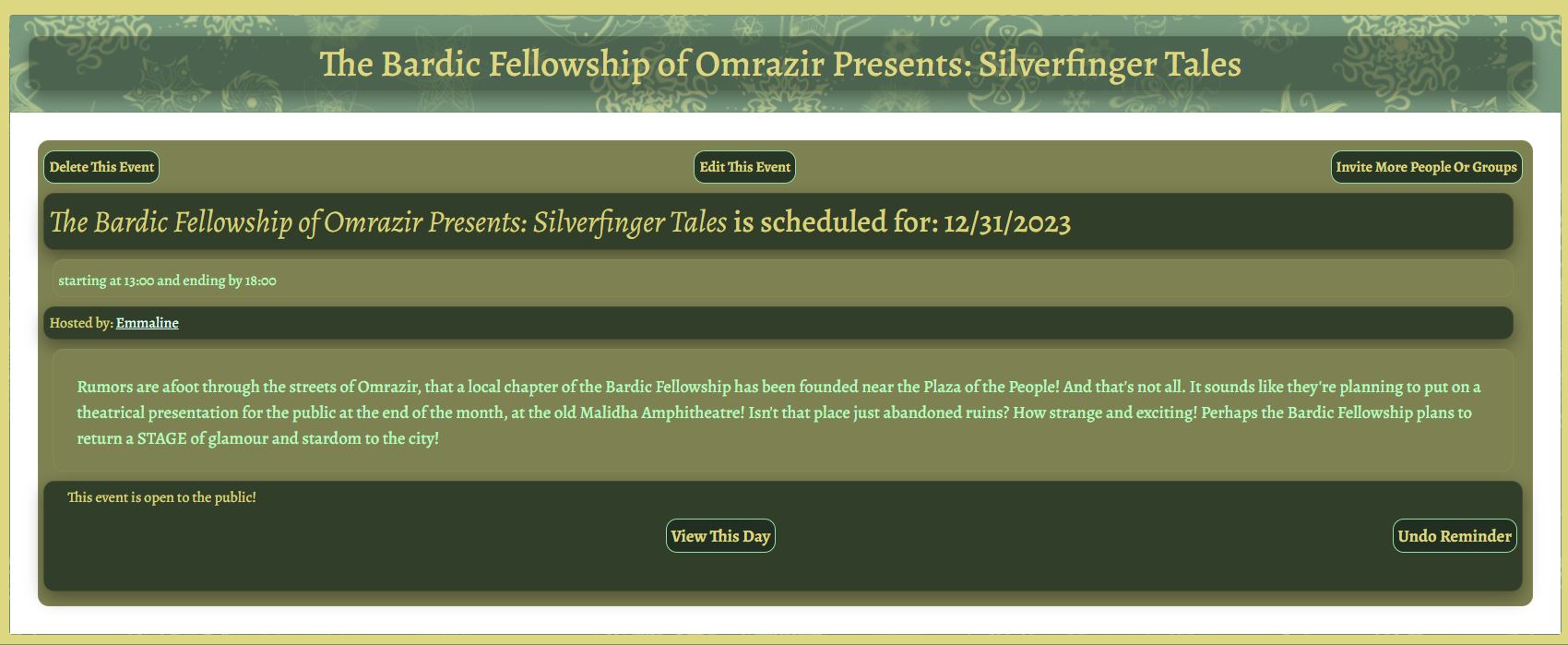
If we're logged in before the event starts, we'll get a little reminder of it a short while beforehand, and then another reminder once it begins. We'll also set up another event, a private one that works as a rehearsal for just our fellowship.

We'll have our rehearsal in our own courtyard, and essentially pass out the script based on Iziro's story. Naturally, there will have been even more roleplay ahead of this rehearsal, with each member of the fellowship taking part in helping to produce the script, weighing in with ideas and thoughts, getting costumes together from tailors, and so on. It's a big deal!
While such an event may not be an extremely impactful occurrence that will alter the fabric of the game world, we anticipate that a large amount of the roleplay in Song of Avaria will be centered around character growth and personal stories of various kinds. The big changes to the world will tend to be built from the substance of many smaller personal actions, even if each one might not on its own be enough to catalyze greater events on a global scale. For the most part, people will be making their own plot based on their own characters' goals. Those goals may be as small or as vast as suits the character!
Emmaline's goal has been relatively humble from the beginning. She wanted to find belonging in the city, a safe home and friendship, and she has largely accomplished that goal. A good way to complete this story arc is for the Bardic Fellowship of Omrazir to broadcast their existence in the city, by putting on an exhibition of their varied talents for anyone who might be curious.
So, we'll stay ahead of planning this event, and make sure that everything will be in place once guests begin arriving! Emmaline plans to use the old ampitheatre to stage a play. Muhsin, Djafira, Iziro, and herself all have roles to act. Afterward, they will bring out refreshments and have a pleasant time mingling with the audience.
Who knows what political undercurrents may be at work against Emmaline and her friends in the city? The Poets' Guild might not be altogether happy with this upstart group of outcasts, undermining the cultured status of guilded poets and musicians. Criminal factions could target the Fellowship, due to the closeness of their headquarters to the derelict White City. Or perhaps the opposite will happen, and Emmaline will be seen as a representative of those who have long been denied expression through the creative arts...
Regardless, this is not an ending to Emmaline's story, but rather the beginning of a new chapter. We will develop her arc one last time with this final chapter before archiving it... and then we can start a new chapter in her life.
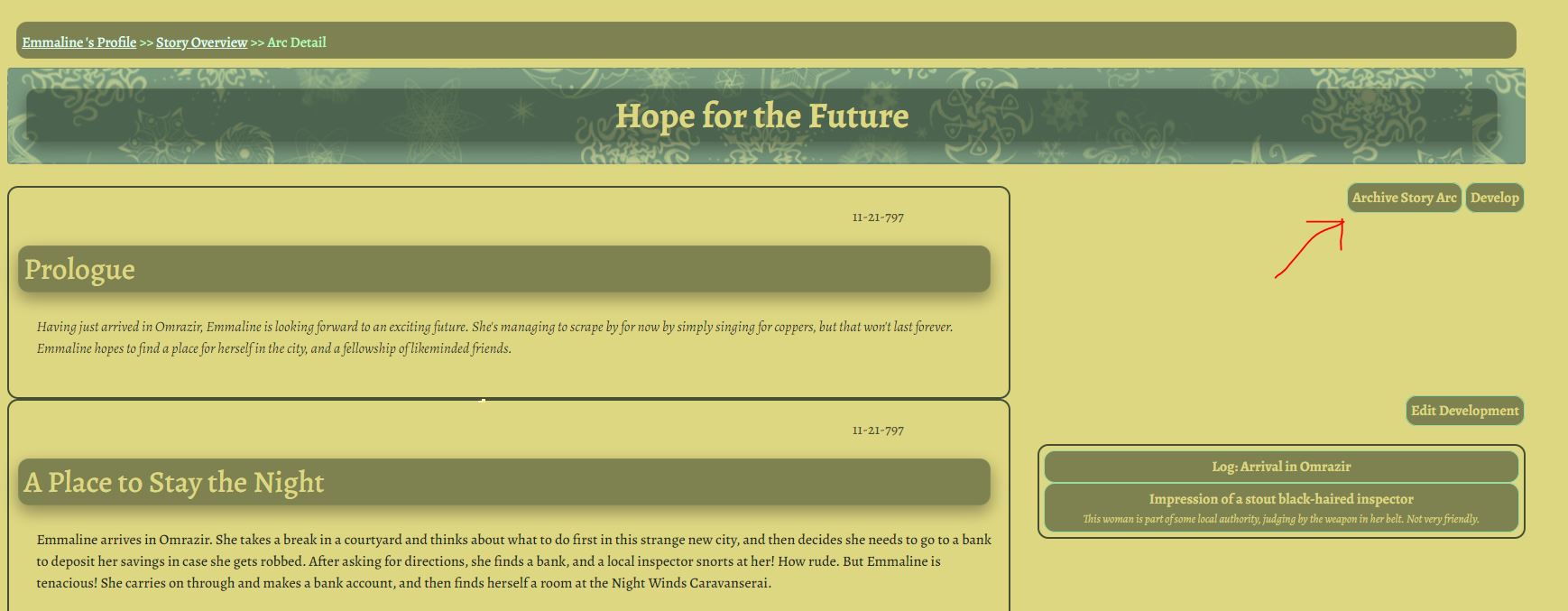
What's next for Emmaline? Well, there are multiple possible future story arcs! Perhaps she'd like to work on establishing a stronger organizational foundation for the Bardic Fellowship. Uniforms? An expansion of a second story of the building? Their very own stage, out in the courtyard? Hired guards at the door? There are so many things to consider.
Also, Emmaline wants to cultivate friendship among the locals in the White City! She'll have to make sure not to appear like a good mugging target when she goes there the next time, but it's not like she's so attached to wearing expensive clothes, anyway.
Whatever the future holds, there's plenty to explore! We can make a new story arc for both of these different plot threads.
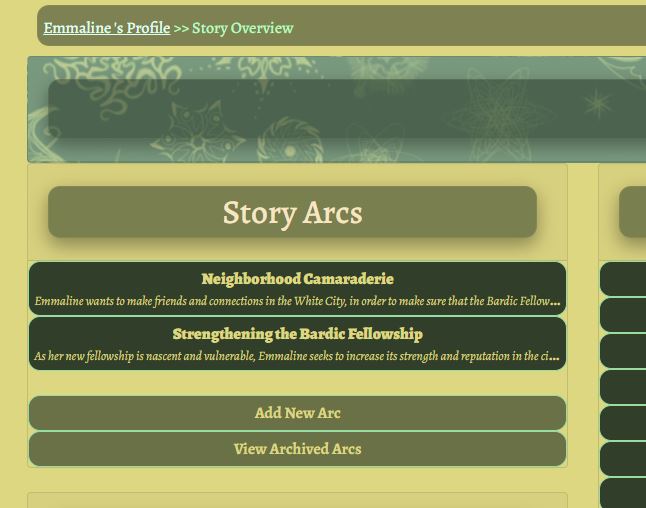
Now, Emmaline's story may go on...
But this is the final chapter of our showcase.
Next month, we'll hopefully be inviting interested alpha testers to start the first chapter of their own character stories. We look forward to it immensely! We'll be opening in mid-January, to leave some time for people to settle in after the holidays. Look for our opening post on January 20th!
